UCD Archives features a different document from our collections every month on our website homepage. The links below will enable you to explore every document posted since we began this feature in 2015. The documents are chosen to mark anniversaries, highlight items of general or topical interest, and introduce newly available collections.
If you use our collections and have come across a document during your research that you think might be of interest to a general (or specialist) audience and deserving of greater attention, please email us at archives@ucd.ie.
- February 2026: Letter from Fr John Blowick to Dr Theo Dillon, 11 February 1938
- January 2026: Letter from Julius Pokorny to Eoin MacNeill, 6 November 1935
- December 2025: Letter to Timothy Smiddy regarding a parcel of pheasants sent as a Christmas present from His Majesty King George V, 18 December 1930
- November 2025: Letter from Harry Boland to James Ryan, 15 November 1916
- October 2025: Letter from Daniel Cohalan, Bishop of Cork, to Mary MacSwiney, expressing condolences on her brother's death, 26 October 1920
- September 2025: Letter from Rev. Thomas Gavan Duffy to Scoil Bridghde, 29 February 1920
- August 2025: Making Hay at the Albert Agricultural College, early 1900s
- July 2025: Photograph of President Hillery on the Set of The Great Train Robbery, July 1978
- June 2025: Poem by Tom Kettle ‘To My Daughter Betty’ 4 September 1916
- May 2025: Correspondence between Mabel Fitzgerald and George Bernard Shaw, 28 November-1 December 1914
- April 2025: Commercial Benefits from Irish Development Aid, 1–8 December 1981
- March 2025: Press-cuttings concerning the Save the German Children campaign, 17-18 October 1945
- February 2025: Fianna Fáil Election Poster captioned "Young People! Fianna Fáil has plan for you", [1954?]
- January 2025: Note from Taoiseach Garret Fitzgerald to Gemma Hussey, 24 February 1982
- December 2024: Programme for Irish Pantomime at the Abbey Theatre: “Muireann agus an Prionnsa”, December 1945
- November 2024: Replies to Questionnaire for Proposed history of Cumann na mBan, November 1972-February 1973
- October 2024: Gulf Peace Committee launches details of Dublin rally for peace in the Gulf, 10 January 1991
- September 2024: Letter from Córas Iompair Éireann to Sighle Humphreys, 6 August 1952
- August 2024: Meeting between Dr Derek Freedman and Barry Desmond, Minister for Health, 21 March 1983
- July 2024: Kathleen O'Connell, Holiday Photographs, July 1931 and [1955]
- June 2024: Death of St. Colm Cille (Columba), 9 June [592 / 597?]
- May 2024: Letter from William Wentworth Fitzwilliam to Henry Addington, 27 July 1817
- April 2024: Records of the Republican Soldiers’ Casualty Committee – Arthur Weekes, 24 May 1928
- March 2024: Letter to James Lenigan regarding recurrence of potato blight, 15 July 1847
- February 2024: Petition for employment of female doctor, October 1913
- January 2024: Pioneer Total Abstinence Association Golden Jubilee – Memorabilia, 26 June 1949
- December 2023: Downing Street (Joint Declaration), early draft, 29 March 1993
- November 2023: Mary MacSwiney’s Hunger Strike and Holy Communion, 5 November [1922]
- October 2023: Proposed Terms of Agreement, 7 May 1923
- September 2023: Letter from Nancy Browne O’Rahilly, Long Island, to Anna O’Rahilly, 23 December [c. 1919]
- August 2023: Cox Family Cycling Register, July 1900-June 1903
- July 2023: In Memoriam Commandant Seán Finn, 30 March 1921
- June 2023: "Order to Detain Sighle Humphreys under the Public Safety (Emergency Powers) Act, 1923"
- May 2023: “Cease Fire – Dump Arms” order, 24 May 1923
- April 2023: Correspondence between Marion K. O’Malley and Desmond Fitzgerald, May 1923
- March 2023: Civil War Self-Defence Scheme for Dublin Area [1922/3]
- February 2023: Destruction of property, 1923
- January 2023: Annals of the Four Masters
- December 2022: Letter from Eamon de Valera to Joseph McGarrity, June 1923.
- November 2022: Statement by Hugh Kennedy describing republican opposition to the Anglo-Irish treaty by [Cumann na mBan], [1923]
- October 2022: Letter from Eamon de Valera to Major John E.B. Loftus, 31 October 1922
- September 2022: Statement from women prisoners in Kilmainham Jail, 1923
- August 2022: Conditions of Republican Prisoners [1923]
- July 2022: Letter from Liam Lynch to Kathleen Barry, 22 November 1922
- June 2022: Letter from Kevin O’Higgins to his wife Brigid O’Higgins (née Cole), 27 June 1922
- May 2022: Memorial cards of Cathal Brugha, Harry Boland and Liam Mellows
- April 2022: Letter from irregular Chief of Staff to O/Cs all Battalions, November 1922
- March 2022: Letter from Ernie O’Malley to the C/S (1923), and associated documents.
- February 2022: Annals of the Four Masters: St Brigid
- November 2020: Notification by the Poor Law Commission to poor houses re vaccination of the general public,1863.
- January 2022: Letter from Mary Spring Rice to Dorothea Knox, 10 March 1922
- December 2021: Letter from Eamon de Valera to Mary MacSwiney, 1922
- November 2021: Letter from Mary MacSwiney to Eamon de Valera, September/October 1921
- October 2021: Letter from Stephen Mary O'Mara to Harry Boland, 15 February 1922.
- September 2021: New Flag for the Irish Republic, 6 December 1921
- August 2021: Anglo-Irish Treaty Negotiation Plenipotentiaries, 1921
- July 2021: Death of Patrick White, Spike Island, 1921
- June 2021: 'Bianconi Coaches'
- May 2021: The Legend of 'Throwing the Ball of Fat'
- April 2021: Illustrations of Lough Erne shrines
- March 2021: Dancing on St Patrick's Day
- February 2021: Arbour Hill Prison Routine, c. 1934
- January 2021: Photograph of Erskine Childers and Eamonn Duggan, 1921
- December 2020: Training memo issued by the Director of Training, CHQ, on how to use the German Mauser automatic pistol (Peter the Painter), 1921
- October 2020: Notification of the death of Terence MacSwiney to his sisters by Fr Dominic O’Connor, 1920
- September 2020: Letter from Terence MacSwiney to Cathal Brugha, 1920
- August 2020: Letter from Padraig Pearse to Professor William Magennis, 1910
- July 2020: Notice to the L&H from the Censorship of Publications Board, 1959
- June 2020: Letter from T.W.T Dillon to John Dillon, 1922
- May 2020: Speech by Dr Tiede & Mrs Elisabeth Herrema, Áras an Uachtaráin, 1975
- April 2020: Photographs of Ernie O'Malley, [1921]
- March 2020: International Women's Day
- February 2020: Commemorating the Holocaust
- January 2020: Letter from H.F, Los Angeles, to Margaret Burke, 11 January 1917
- July 2019: Diaries of John and Arthur Oram, 1858–98
- December 2019: It's Beginning to Look A Lot Like Christmas!
- November 2019: Map of Four Courts and Surrounds, [1922]
- October 2019: Papers of Frances-Mary Blake, 1980s
- September 2019: GAA Tickets, 1915
- August 2019: Apollo 11 Moon Landing, 20 July 1969
- June 2019: NUWGA letters to Red Cross re relief of Hungarian University women, 1957
- May 2019: Cumann na nGaedheal Election Poster, [1932]
- April 2019: Declaration of Ireland as a Republic, 18 April 1949
- March 2019: A Case of Benign Osteosarcoma, 1844
- February 2019: De Valera's Escape from Lincoln Gaol, 1919
- January 2019: Photo postcard and printed list of members of the first Dáil Éireann, 1919
- December 2018: 1918 General Election
- November 2018: Documenting WWI
- October 2018: UCD War List, 1919/20
- September 2018: Royal Telegram on the Death of Michael Moynihan, 1918
- August 2018: Lemass on Ireland's EEC Membership
- July 2018: Constitution of Ireland, 1937
- June 2018: Anti-Amendment Leaflet, 1983 Referendum
- May 2018: Letter from Lily O'Brennan, April 1923
- April 2018: Letter to Mary MacSwiney, November 1922
- March 2018: Eithne Coyle O'Donnell's 'Historia Vasca', [1930]
- February 2018: Equal Parliamentary Suffrage Granted in 1922
- January 2018: Liam Cosgrave Addresses the L&H Society, 1972
- December 2017: Christmas Cease Fire, 1922
- November 2017: Programme of Kabuki and Noh, 1990
- October 2017: Death of Thomas Ashe, 1917
- September 2017: Correspondence about Roger Casement's Diaries, 1966
- August 2017: Letter by Michael Moynihan, 7th (Res.) Battalion, 1917
- July 2017: Letter by Harry Boland, HM Prison Lewes, June 1917
- June 2017: Eamon De Valera's Account of Conditions in HM Prison Dartmoor, 1916
- May 2017: Letter from Lord French to General Maxwell, 3 May 1916
- April 2017: The E.E.C Roadshow, 22 July 1978
- March 2017: Cumann na mBan executive, 5 February 1922
- February 2017: Letter to Seán Lester, 1933
- January 2017: First Spokesperson on Women's Issues, 1980
- December 2016: Christmas in Prison, 1918
- November 2016: Letter from Terence MacSwiney in Brixton Prison to Cathal Brugha, 1920
- October 2016: Description by Michael MacWhite of Life at the Front, WWI, 1916
- September 2016: Tom Kettle's Field Message Book [1916]
- June 2016: Minute Book of the Belgian Refugees' Committee, 1914-15
- May 2016: Letters Concerning Bernard O'Rourke's Imprisonment, 1916
- April 2016: Letters re Imprisonment of Desmond FitzGerald, 1916
- March 2016: Studio Portraits of Patrick and Willie Pearse
- February 2016: Invitation to Jim Dooge to Chair the Ad Hoc Committee on Institutional Affairs, 1984
- January 2016: The Oram Diaries, 1854–1919
- December 2015: Bronowski Christmas Cards
- November 2015: 'Childhood in Derry' Brian Friel Remembers, 1964
- October 2015: Governing Body Minute Books 1914–16
- September 2015: Letter from Pamela Travers to Vera and Joseph Maunsell Hone, 1942
- August 2015: Note from Patrick Hillery to Edwin Fitzgibbon, 1974
- July 2015: Letter from Ezra Pound to Desmond FitzGerald, 1926
- June 2015: 1916 'Half-Proclamation'
February’s document of the month is a letter from Fr John Blowick to Dr Theo Dillon, dated 11 February 1938 (UCDA P126/192). Dr Theo Dillon, born Theobald Wolfe Tone Dillon in 1898, was at this time Professor of Pharmacology and Therapeutics in UCD. He had an ongoing interest in religious concerns and appears to have requested information on Irish missionaries abroad.
Fr John Blowick was one of the co-founders of the Maynooth Mission to China, now The Missionary Society of St Columban. The Society was formally launched in 1918 and the first Columbans went to China in 1920. Gradually the vision widened to the Philippines (1929), Korea (1933), Burma (Myanmar) (1936), and Japan (1948).
In the letter Blowick regrets that he cannot give any information concerning missionaries outside of his own order, suggesting where Dillon can find such information and attaches a list of the missions and numbers of priests and Sisters of St. Columban.
UCDA P126/192 Letter from Fr John Blowick to Dr Dillon, 11 February 1938


Eoin MacNeill was born John MacNeill in Glenarm, County Antrim in 1967. He was educated at St Malachy’s College, Belfast and the Royal University of Ireland. His interest in early Irish history began while he was working as a law clerk in the Four Courts. A founder member of the Gaelic League in 1893 of which he was vice-president and editor of its official paper, he founded the Feis Cheoil the following year. He was appointed the first Professor of Early including Medieval Irish History in University College Dublin in 1908, a position he held until 1941.
Commander in Chief of the Irish Volunteers after the split with Redmond, he was unaware of the planning for the Easter Rising and on the Sunday Morning he issued an order countermanding the mobilisation. Arrested and sentenced to life imprisonment, he was released in the general amnesty of 1917.
Elected Sinn Féin M.P. for Derry City and the NUI in the 1918 general election, he served successively as Minister for Finance and Minister for Industries in the First Dáil. He supported the Treaty, was Ceann Comhairle during the Treaty debates, Minister without Portfolio in the Provisional Government, and Minister for Education in the Executive Council of the Irish Free State, 1922–25. He was appointed Free State representative on the Boundary Commission on its foundation in 1924. Despite his resignation and refusal to accept the Commission’s report, he came under intense pressure for the report’s failure to recommend changes in the border. He resigned his ministerial position and lost his seat in the general election of 1927. He was the first chairman of the Irish Manuscripts Commission founded the same year and devoted the remainder of his life to scholarship, publishing prolifically.
Throughout his career MacNeill kept up regular correspondence with other academics engaged in the study of Irish language and Celtic studies. One of these was Julius Pokorny. Pokorny (1887–1970), Indo-European philologist and Celtic scholar, was born in Prague, but was brought up in Austria. He attended Vienna University and graduated with the degree of Doctor of Philosophy in 1912. He was appointed Lektor in Irish at the same university that year and became Dozent in Celtic philology in 1914. He was given the chair of Celtic at the University of Berlin in 1920. After the rise of the National Socialist government in Germany, he was suspended from his post and later dismissed (1935) because of his Jewish background. He sought asylum in Zürich, where he remained for the rest of his life.
The MacNeill Papers include Correspondence relating to the suspension of Pokorny from his chair in Berlin University (due to the passing of the Nuremburg laws of 1935 by which Jews lost their citizenship). Included is a letter to MacNeill in which Pokorny asks for his help stating ‘I am a true Catholic, have always been one and also my parents before me. My grandparents, no less! are the unfortunate culprits’.
UCDA LA1/K/70 Letter from Julius Pokorny to Eoin MacNeill, 6 November 1935
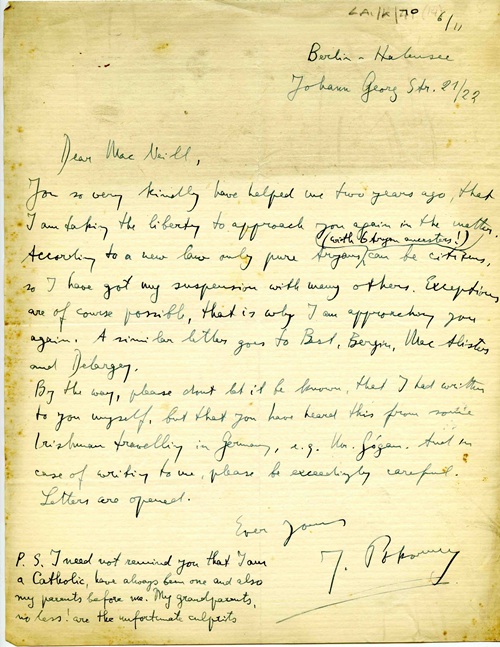
6/11
Berlin-Halensee
Johan Georg Str. 21/22
Dear Mac Neill,
You so very kindly have helped me two years ago, that I am taking the liberty to approach you again in the matter. According to a new law only pure Aryans (with 6 Aryan ancestors!) can be citizens, so I have got my suspension with many others. Exceptions are of course possible, that is why I am approaching you again. A similar letter goes to Best, Bergin, MacAlisters and Delargey.
By the way, please don’t let it be known that I had written to you myself, but that you have heard this from some Irishman travelling in Germany, e.g. Mr Gógan. And in case of writing to me, please be exceedingly careful. Letters are opened.
Ever yours,
J. Pokorny
P.S. I need not remind you that I am a Catholic, have always been one and also my parents before me. My grandparents, no less! are the unfortunate culprits.
Timothy Smiddy (1875–1962), economist, academic, and diplomat, was born 30 April 1875 in Cork. He was educated at St Finbarr's College, Cork, at QCC, at Saint-Sulpice, Paris, and at the Handelshochschule, Cologne, where he was awarded his MA degree. In 1909 he was appointed professor of economics at UCC; he held this position until 1923. By 1923 he was dean of the faculty of commerce at UCC and warden of the Honan hostel, and had unsuccessfully stood for the presidency and registrarship of the college in 1919.
A close friend of Arthur Griffith and Michael Collins, Smiddy was an economic adviser to the treaty delegation in London in 1921. In March 1922 he was sent by Collins as the envoy and fiscal agent of Dáil Éireann to the US, and remained in Washington until 11 January 1929. On 7 October 1924 he was appointed Ireland's envoy extraordinary and minister plenipotentiary to the US. He was the first diplomatic agent officially appointed by the Irish Free State, and the appointment was important in raising the profile of the Irish Free State in the US as an independent state.
He was appointed Irish high commissioner in London on 5 February 1929, and held the post to 14 December 1930, on the basis that the appointment was always going to be temporary. While in London he represented Ireland at the 1930 London naval conference.
Source: Dictionary of Irish Biography
The letter featured in this December’s Document of the Month is dated just days after Smiddy’s departure from London.
UCDA P319/52 Letter to Timothy Smiddy regarding a parcel of four pheasants sent as a Christmas present from His Majesty King George V, 18 December 1930. The letter is signed by W. Hynes, Secretary to the High Commissioner, informing Smiddy that he sent the parcel to 6 Cadogan Court, and formally acknowledged their receipt.
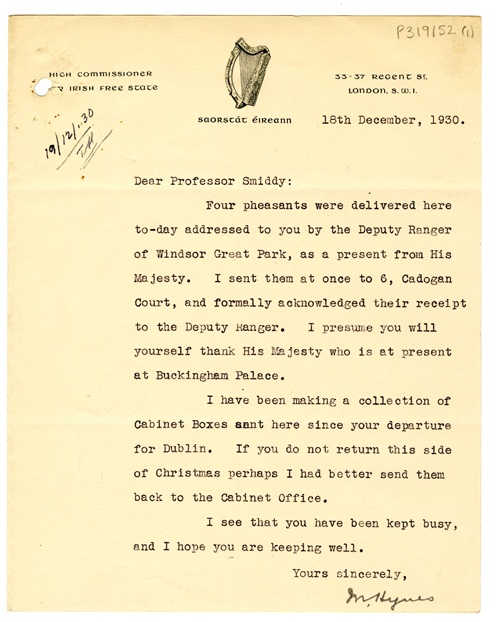
Born near Taghmon, County Wexford, the youngest of a political family, James Ryan was educated at St Peter’s College, Wexford, Ring College and University College Dublin where he studied medicine. While at College he joined Sinn Féin and the Volunteers, was in charge of the medical unit in the GPO during Easter Week, 1916, and was subsequently interned in Stafford and Frongoch. Elected Sinn Féin MP for Wexford in 1918, he was interned on Spike Island during the War of Independence, opposed the Treaty and was interned in the Curragh. He was a founder member of Fianna Fáil and served in every Fianna Fáil government from 1932 until his retirement in 1965, as Minister for Agriculture, 1932–47, Minister for Health and Social Welfare, 1947–48 and 1951–54, and Minister for Finance, 1957–65.
Included in the collection are letters received after Ryan’s release from those still in prison in late 1916. One of these letters is from Harry Boland, dated 15 November 1916. The letter describes a [Halloween] celebration in the camp 'several turned up in fancy dress, and we had three "ladies for a night" who were very much sought after ... ', belief that he and the other prisoners will not be released in the near future: '…we are now settled down for what appears to be a long stay' and his delight that Phyllis [Ryan's sister] received her Science degree.
UCDA P88/39 Letter from Harry Boland to James Ryan, 15 November 1916
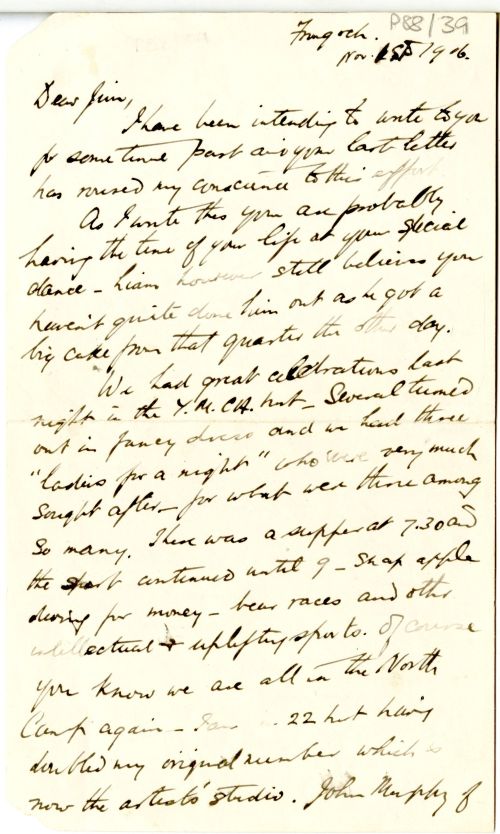
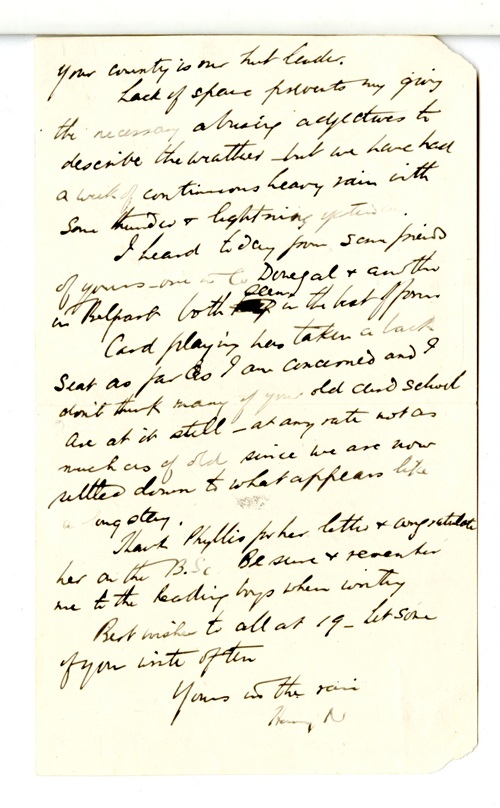
Transcription
Frongoch
Nov 15th 1916
Dear Jim,
I have been intending to write to you for some time past and your last letter has roused my conscience to this effort.
As I write this you are probably having the time of your life at your special dance – Liam however still believes you haven’t quite done him out as he got a big cake from that quarter the other day.
We had great celebrations last night in the Y.M.C.A. hut – Several turned out in fancy dress and we had three “ladies for a night” who were very much sought after – for what were three among so many. There was a supper at 7.30 and the sport continued until 9 – snap apple [… ] for money – bear races and other intellectual and uplifting sports. Of course you know we are all in the North Camp again – I am in 22 hut having doubled my original number which is now the artists’ studio. John Murphy of your county is our hut leader.
Lack of space prevents me giving the necessary […] adjectives to describe the weather but we have had a week of continuous heavy rain with some thunder and lightning yesterday.
I heard today from some friends of yours – one in Co Donegal and another in Belfast both seem in the best of form.
Card playing has take a back seat as far as I am concerned and I don’t think many of you old [card] school are at it still – at any rate not as much as of old since we are now settled down to what appears like a long stay.
Thank Phyllis for her letter and congratulate her on the B.Sc. Be sure and remember me to the Reading boys when writing.
Best wishes to all at 19 – Let some of you write often.
Yours in the rain
Harry B
Born in Cork and educated at North Monastery Christian Brothers’ School and the Royal University of Ireland, Terence MacSwiney was a founder member of the Cork Celtic Literary Society in 1901 and, with Daniel Corkery, of the Cork Dramatic Society in 1908, for which he wrote several plays. A principal figure in the formation of the Irish Volunteers in Cork in 1913, he was employed as a full-time organiser from 1915 and elected to the First Dáil as member for Mid-Cork.
After the murder of Tomás MacCurtain in March 1920, MacSwiney was elected Lord Mayor of Cork. Arrested under the Defence of the Realm Act in August 1920 and sentenced to two years imprisonment, he embarked on a hunger strike in Brixton Jail and died on 24 October. A book of essays, Principles of Freedom, was published posthumously in New York in 1921.
This collection, P48b, is part of a larger collection of papers deposited in UCD Archives by Máire MacSwiney Brugha (MacSwiney’s daughter) and her husband Ruarai Brugha in November 1979. The collection has been divided into three parts. P48a consists of the papers of Mary MacSwiney, P48b of the papers of Terence MacSwiney, while P48c include the working papers and correspondence of Terence MacSwiney's biographers, Etienette Beuque and Moirin Chevasse.
P48B/630 Letter from Daniel Cohalan, Bishop of Cork, to Mary MacSwiney, Sister of Terence MacSwiney, expressing condolences on his death, 26 October 1920
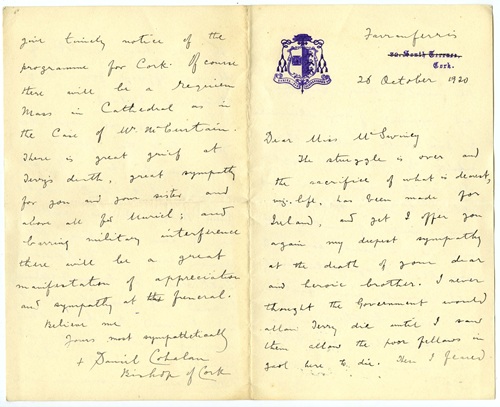
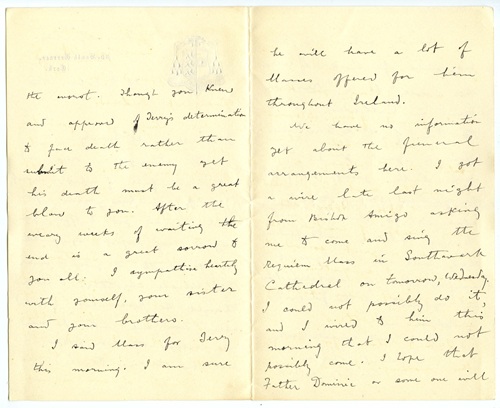
Transcription:
Farranferris
Cork.
26 October 1920
Dear Miss McSwiney [sic]
The struggle is over and the sacrifice of what is dearest, viz. life, has been made for Ireland, and yet I offer you again my deepest sympathy at the death of your dear and heroic brother. I never thought the Government would allow Terry die until I saw them allow the poor fellows in gaol here to die. Then I feared the worst. Though you knew and approved of Terry’s determination to face death rather than submit to the enemy yet his death must be a great blow to you. After the weary weeks of waiting the end is a great sorrow to you all. I sympathise heartily with yourself, your sister and your brothers.
I said Mass for Terry this morning. I am sure he will have a lot of Masses offered for him throughout Ireland.
We have no information yet about the funeral arrangements here. I got a wire late last night from Bishop Amigo asking me to come and sing the Requiem Mass in Southwark Cathedral on tomorrow, Wednesday. I could not possibly do it, and I wired to him this morning that I could not possibly come. I hope that Father Dominic or some one will give timely notice of the programme for Cork. Of course there will be a requiem Mass in Cathedral as in the Case of Mr McCurtain [sic].
There is great grief at Terry’s death, great sympathy for you and your sister and above all for Muriel; and barring military interference there will be a great manifestation of appreciation and sympathy at the funeral.
Believe me
Yours most sympathetically
+ Daniel Cohalan
Bishop of Cork
UCD Archives holds a number of small collections. One of these is Records of Scoil Bridghde. It consists of a photocopy of a scrapbook containing lists of pupils, photographs, programmes for school plays, newspaper cuttings, and letters. The scrapbook was found among LA22 Papers of R. Dudley Edwards.
Scoil Bridghde (Scoil Bhríde) was an Irish speaking school for girls, founded by Louise Gavan Duffy and Annie McHugh in 1917. The school was originally located in St Stephen's Green, Dublin and moved to Pembroke Road in 1921. It is now in Ranelagh, Dublin 6.
Included in the scrapbook are two letters from Rev. Thomas Gavan Duffy (1888 - 1942) thanking the school for their contributions to his missionary school in India (29 February 1920, and 6 October 1924)
UCDA P86 Records of Scoil Bridghde. Letter from Rev. Thomas Gavan Duffy to Scoil Bridghde, 29 February 1920
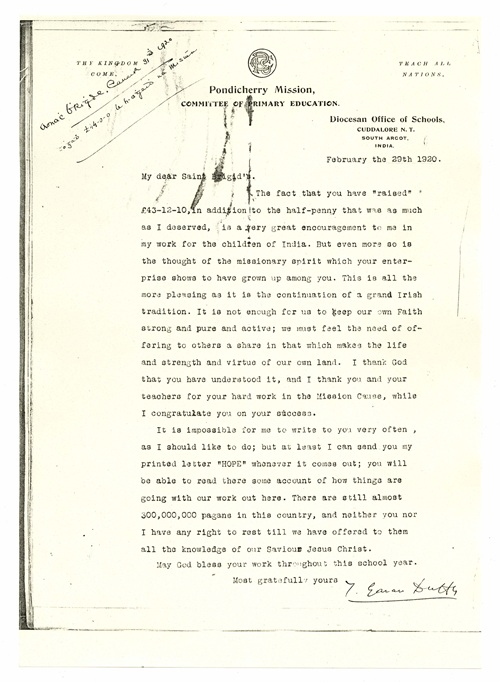
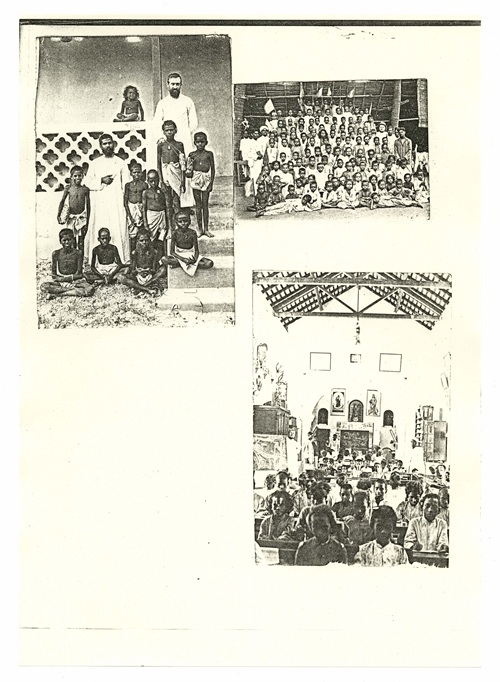
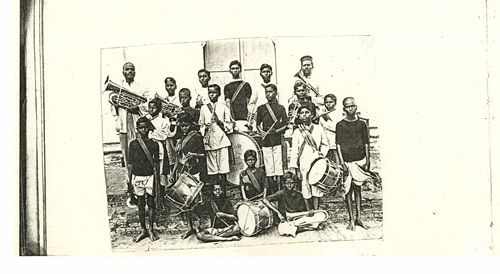
The Albert Agricultural College began life as the Glasnevin Model Farm in 1838 becoming the Albert National Agricultural Training Institution in 1853 after a visit by Prince Albert. The name Albert Agricultural College first appears in the 1902–3 Report of the Department of Agriculture and Technical Instruction. Its foundation was an important event in the history of Irish agricultural education, whose primary function in its early years was the provision of instruction for primary school teachers to teach agriculture and meet the requirements set down by Board of National Education in Ireland.
The Board extended its policy of primary-level agricultural education by establishing twenty Model Agricultural Schools and provided many National Schools with small holdings or gardens. From 1850 the Board adopted a policy of teaching agriculture in the workhouse schools. Despite its success, the Board met opposition from members of all religious denominations as one of its aims was to establish non-denominational education and various accommodations had to be made.
The Board was forced to discontinue support for the workhouse schools in 1863 and in 1874 disposed of most of the model farms. The Albert Agricultural College survived, as it also carried out research work in new crop varieties, farming methods and breeding livestock. In 1890 the college pioneered the use in Ireland of a French method of treating fungal infection. This turned out to be the first successful treatment for potato blight.
Under the Agricultural and Technical Instruction Act, 1899, a Faculty of Education was established at the Royal College of Science. Most of the teaching was carried out in the Albert Agricultural College and the college continued to teach courses of its own as well.
Following the signing of the Anglo-Irish Treaty the Department of Agriculture was established in 1922. Under the University Education (Agriculture and Dairy Science) Act, 1926, a Faculty of Agriculture was set up at University College Dublin and the Albert Agricultural College and the Royal College of Science for Ireland were taken over by UCD. In 1979 the Faculty of General Agriculture’s new building at Belfield was opened and the Albert Agricultural College site was finally closed.
The Albert Agricultural College Collection consists of Bound volumes (journals and registers) and photographs concerning students (their origins, studies, behaviour and careers after leaving the college). The collection includes information on college life, the curricula, disciplinary matters and pastimes. The photographs show pupils and staff, the college’s buildings, land and livestock.
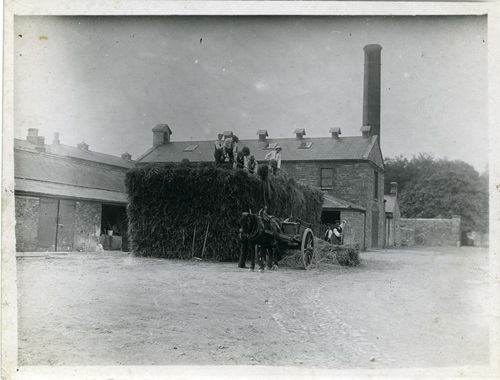
UCDA AAC1/81 Black and white photograph of students of the Albert Agricultural College building a haystack, [early 1900s]
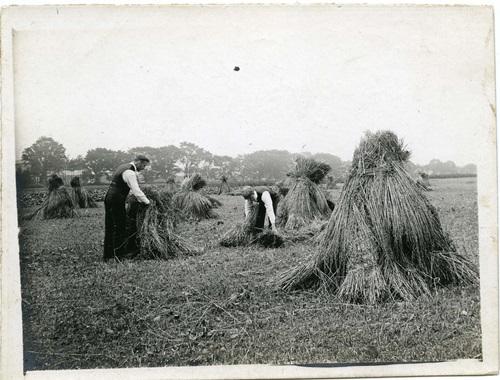
UCDA AAC1/85 Black and white photograph of students of the Albert Agricultural College sheaving, [early 1900s]
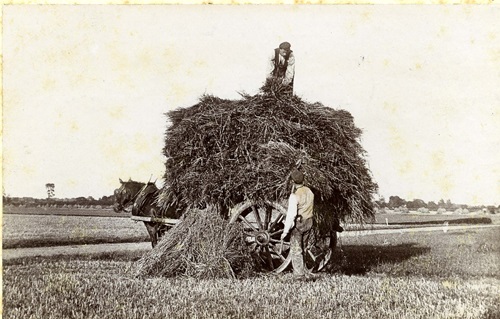
UCDA AAC1/138, Black and white photograph entitled “The Last Load” of students of the Albert Agricultural College loading hay-wagon, 24 June 1908
Dr Patrick Hillery was born in Miltown Malbay, County Clare on 2 May 1923. In 1939, he entered UCD to study medicine graduating in 1947 with first class honours.
In 1951 Hillery was nominated as a Fianna Fáil candidate for the Clare constituency winning the third seat to become a TD in the 14th Dáil Éireann. Initially Hillery continued to practice medicine combining this career with his constituency and Dáil commitments.
In 1959 Hillery was appointed Minister for Education where he was responsible for developing and facilitating a number of initiatives including the formation of comprehensive schools outside the jurisdiction of the Catholic Church; the OECD Pilot Study on Investment in Education; and the establishment of the Belfield campus by University College Dublin.
In 1965 Seán Lemass appointed him as Minister for Industry and Commerce and a short while later to a new Ministry for Labour. Here he faced considerable challenges involving the trade unions, strikes and industrial relations.
Following the general election in June 1969 Hillery was appointed as Minister for External Affairs, later Foreign Affairs. Within weeks of his appointment Hillery found himself facing a worsening security situation in Northern Ireland. He travelled to the UN in an attempt to gain agreement for a peacekeeping force in the North, a move strongly resisted by Britain and the US. Hillery was involved in strenuous lobbying in diplomatic circles to further Ireland’s wish to become a member of the EEC. He led the negotiations for Irish accession, and the successful constitutional referendum resulting in the signing of the Treaty in January 1972.
In 1972 Hillery was offered, and accepted, the position of Ireland’s first Commissioner to the EEC. He resigned his Dáil seat in January 1973 to take up his new post as Vice President of the Commission and Commissioner for Social Affairs.
Following the resignation of Cearbhall Ó Dálaigh as President in October 1976, Hillery accepted the Fianna Fáil nomination. The government parties had already announced that they would not contest an election and Hillery was declared elected as Ireland’s sixth President on 9 November 1976. He went on to serve a second term as President, re-elected unopposed in November 1983.
Hillery retired from office in November 1990 marking the end of an extraordinary public career as government minister, European Commissioner and President of Ireland. Hillery died on 12 April 2008, a few weeks before his eighty-fifth birthday.
The Dr P.J. Hillery Papers held in UCD Archives cover his long career in public office. They include a large number of photographs covering all aspects of his public career as government minister, European Commissioner and President of Ireland 1961–90 as well as photographs of his family and early career as an intern and doctor, 1920s– 40s.
File P205/186 includes black and white photographs of Hillery visiting the set of the film The Great Train Robbery in the Phoenix Park in July 1978. Also photographed are Prince Rainier and Princess Grace of Monaco who were visiting Ireland at the time as well as the actor Sean Connery, the director of the film Michael Crichton and the Managing Director of Ardmore Studios Sheamus Smith.
UCDA P205/186-003-01 Black and white photograph of President Hillery on the Set of The Great Train Robbery, July 1978. L-R Prince Rainier of Monaco, Sheamus Smith (Managing Director of Ardmore Studios), President Patrick Hillery, Michael Crichton (author and director), Princess Grace of Monaco.
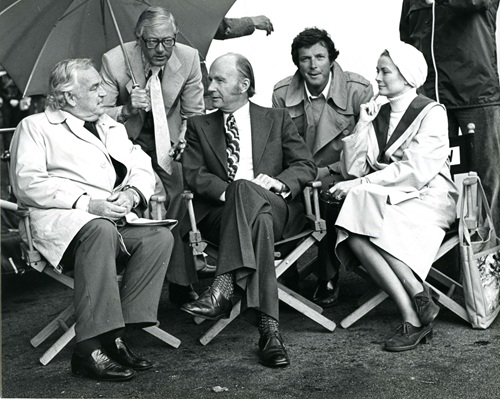
P205/186-003-03 Black and white photograph of President Hillery on the Set of The Great Train Robbery, July 1978. L-R Unidentified, Sean Connery (actor), Sheamus Smith (Managing Director of Ardmore Studios), President Patrick Hillery
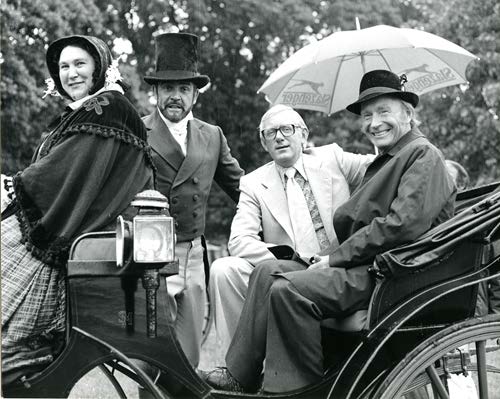
Thomas Michael Kettle was born in 1880, at Artane in North County Dublin. His father, Andrew J. Kettle, was a farmer, and unsuccessful parliamentary candidate, closely associated with the Parnellite wing of the Irish Parliamentary Party.
Tom Kettle was educated at Clongowes Wood College and later at University College Dublin, where he took a degree in Philosophy. At this time, he played an active part in the Young Ireland branch of the United Irish League. He also founded and edited The Nationist, a short lived ‘review of Irish thought and affairs’, aided by Francis Sheehy-Skeffington.
In 1906, Kettle was elected as Nationalist MP for East Tyrone and went on an American tour of the United Irish League. In the House of Commons, Kettle was the chief financial spokesman for the Irish Parliamentary Party and was a consistent critic of the cost of the British administrative establishment in Ireland. Kettle was also favourably disposed towards the Suffragettes, with whom his wife, Mary Sheehy, was associated.
Outside parliament, he was concerned to achieve a broad consensus of Nationalist pressure-groups, and to deflect Sinn Féin from the path of unconstitutional development. Although he was returned again for East Tyrone in the 1910 Election, internal feuding in the party forced Kettle to resign his seat.
In 1910 Kettle was appointed Professor of National Economics at University College Dublin. At UCD he sat on the Dublin Industrial Peace Committee, which acted as a conciliation service during the 1913 Lock-Out.
Tom Kettle was a member of the National Volunteers, and in 1914 went to Belgium to buy arms for them. Whilst there, war broke out, and he became convinced of the justice of the Allied cause. He returned to Ireland, and made a series of recruiting speeches, which effectively alienated him from the Nationalist movement. Kettle then joined the Royal Dublin Fusiliers. After the Easter Rising and the death of Francis Sheehy-Skeffington he asked to be sent to the Front, and was killed on the eve of the Battle of Ginchy, 9 September 1916. His body was never recovered.
Kettle’s writings include The Open Secret of Ireland (1912), Poems and Parodies (1916) and two posthumous publications, The Ways of War (1917) and The Days Burden (1918).
UCDA LA34/404-405 shows the development of one of Kettle’s final poems ‘To my daughter Betty’ from a short manuscript draft to a copy of the complete text.
UCDA LA34/404 Manuscript draft by Kettle of poem ‘To my daughter Betty’, 4 September 1916
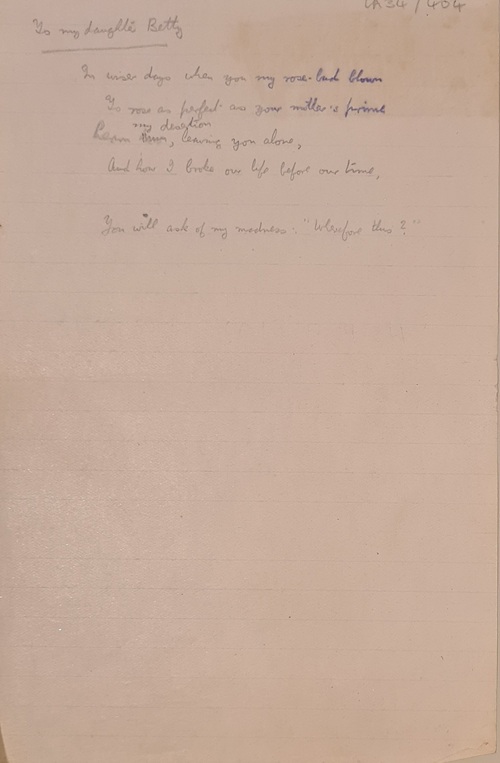
UCDA LA34/ 405 Copy of complete text of ‘To my daughter Betty’, 4 September 1916
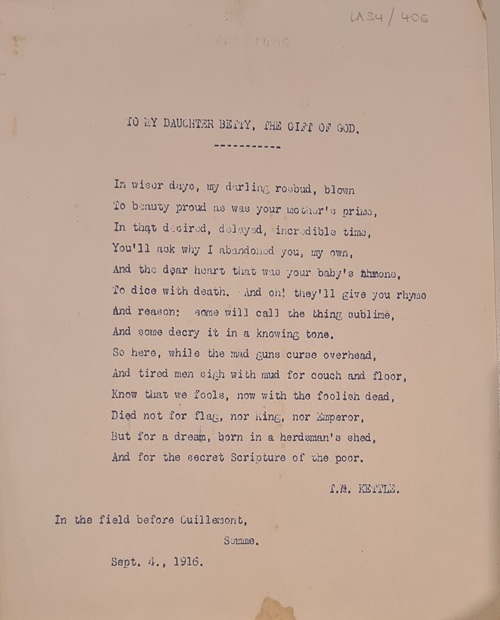
Mabel Washington McConnell was born in Belfast on 4 July 1884. Her interest in politics and Irish nationalism, demonstrated initially as a student in Queen’s University Belfast, was reflected in her joining the Gaelic League while working in London. In 1909 she worked as secretary to George Bernard Shaw for several months. She continued to remain friends with Shaw and his wife, maintaining a correspondence for a number of years
It was at the Gaelic League in London, where she met her future husband Desmond Fitzgerald. Desmond and Mabel were married in 1911. In 1913, Desmond and Mabel moved to Irish–speaking west Kerry, where their knowledge of the Irish language was extended further and political links were established with figures such as Ernest Blythe and The O’Rahilly. In January 1915, Desmond was expelled from county Kerry, having convinced the Royal Irish Constabulary that he was signaling to German submarines from his home on the western peninsula.
While in Kerry, Mabel Fitzgerald corresponded with her former employer George Bernard Shaw. In a letter (P80/1551) dated 28 November 1914, she writes to Shaw urging him to turn his attention to the campaign against the National Press in Ireland. ‘I would like to see you moved by a flash of revelation to shake the dust of England off your feet and to put yourself in touch with all that is most advanced in Nationalism here, to work as Roger Casement is doing to make Ireland a Nation before Europe.’ She refers to her opposition to the recruitment of Irishmen to the English army, the speaking of Irish by her son as his native tongue and their residence in an Irish-speaking district; ‘of that I know you won’t approve but you see I haven’t changed a bit since I was with you.’
Shaw’s response (P80/1552) dated 1 December 1914 , details his belief that Ireland should be on the Republican and democratic side in the war and thus against the Prussian military machine. He refers to his writing to the Irish newspapers with the intention of reducing pro-German propaganda in Ireland and suggesting to the British Government better ways of encouraging recruitment to the English army than the suppression of the Irish Nationalist papers. Fitzgerald’s encouragement of her son to speak Irish is decried. ‘As an Ulster woman, you must be aware that if you bring your son up to hate anyone except a Papist, you will go to hell.’ Shaw requests her to continue her correspondence with him should she so wish. ‘I can at least assure you that your letters will never be unwelcome.’
UCDA P80/1551-1552 Correspondence between Mabel Fitzgerald and George Bernard Shaw, 28 November-1 December 1914
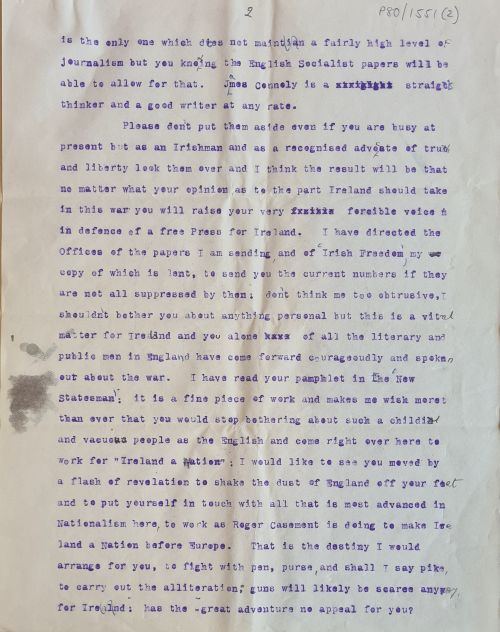
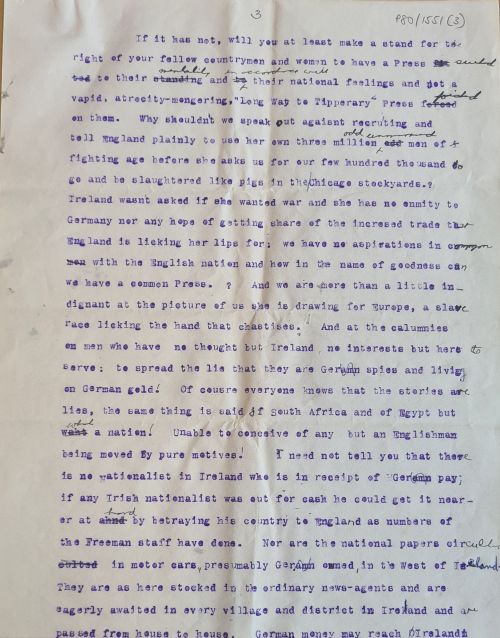
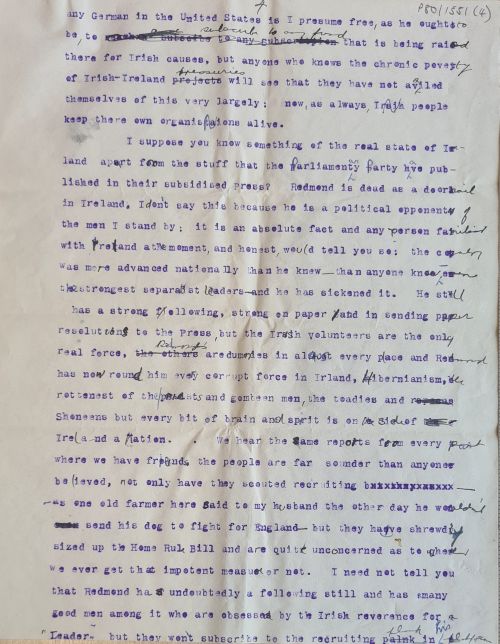
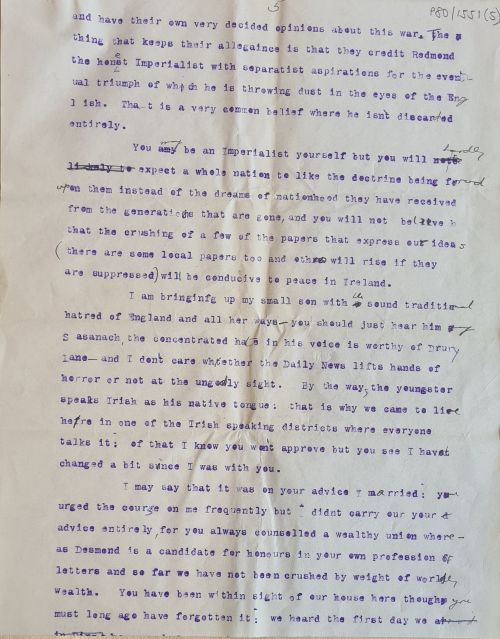
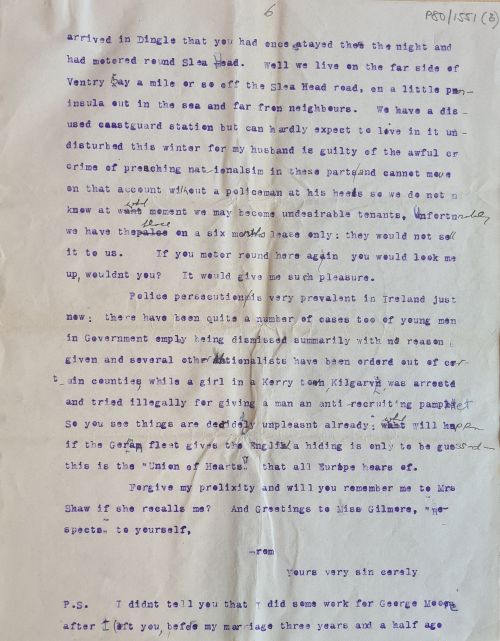
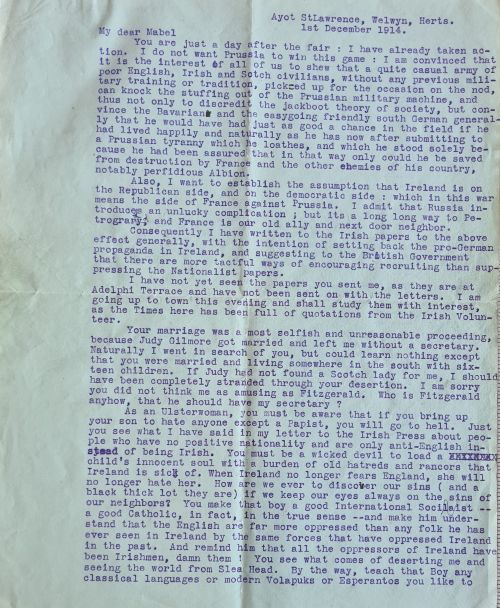
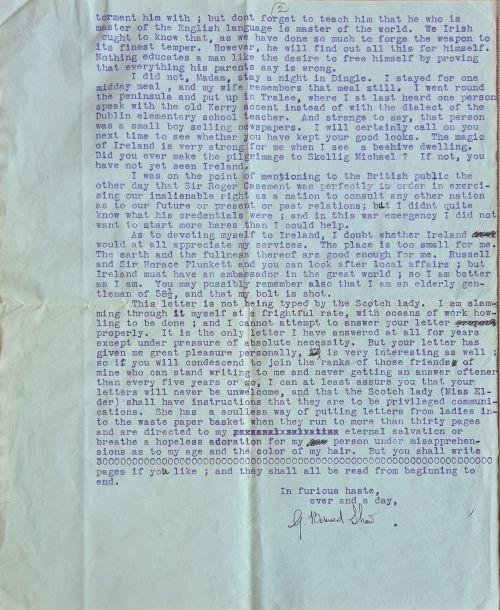
James Dooge was born in Birkenhead, England in 1922 and died on 20 August 2010. After his family moved to Dublin, Dooge studied in University College Dublin. Once qualified as an engineer, Dooge worked firstly with the Office of Public Works and then, in 1946, with the Electricity Supply Board. A period of study at the University of Iowa in the mid-1950s led to an MA. In 1958, Dooge became Professor of Civil Engineering at University College Cork and in 1970, he moved to University College Dublin. In the 1980s Dooge also spent time working at the Department of Engineering Hydrology at University College Galway. As well as being an engineer and hydrologist, he was also a climatologist and served as the chairman of the Scientific Advisory Committee of the World Climate Impact Advisory Committee.
Apart from his illustrious academic career, Dooge led an active political life. From 1961 to 1977 he was a Senator, also serving as the Seanad’s Cathaoirleach (1973-77). Dooge was an influential member of the Fine Gael Party and a close associate of Garret FitzGerald’s, working closely with him in the reorganisation of the Fine Gael Party during the late 1970s. As Cathaoirleach, Dooge was one of the three members of the Presidential Commission, and was called upon (along with the Chief Justice and the Cathaoirleach of the Dáil) to serve the powers of the President twice during his term: first with the death of Erskine Childers in 1974, and then with Cearbhall Ó Dálaigh’s resignation in 1976.
Dooge announced his retirement from politics in 1977 to devote more time to his academic career. In 1981, however, he returned to the Seanad. He was a member of the Fine Gael team that negotiated the coalition deal with the Labour Party in 1981, and was subsequently appointed by FitzGerald as Minister for Foreign Affairs. This was short-lived as the 22nd Dáil lasted for only 252 days. Dooge declined appointment to the new coalition formed in the 1982 general election.
In 1984, Ireland’s Presidency of the European Community coincided with a renewed interest amongst member states for further European integration. At a meeting at Fontainebleau, France in 1984, the decision was made to form an Ad Hoc Committee on Institutional Affairs, to have representatives from all member states to convene and look at potential avenues and methods for European integration. FitzGerald appointed Dooge to this Committee, not only as Ireland’s representative but as chairman. The Committee met throughout late 1984 and early 1985 before producing a final report, often referred to as the Dooge Report, in March 1985. This report is credited with paving the way for the Single European Act and the Maastricht Treaty.
Dooge maintained his commitment and enthusiasm for European integration after the Ad Hoc Committee with his longstanding membership of the Irish Council for the European Movement, of which he became Honorary President.
Professor Dooge deposited his papers in UCD Archives in five tranches between 1987 and 1989, with the sixth and final tranche deposited by his family in 2012.
Within the collection is a series of papers relating to Dooge’s tenure as Minister for Foreign Affairs, 1981–82. These include Department of Foreign Affairs papers regarding Irish development aid. P270/411 is a file relating to the commercial benefits from Irish development aid. It includes two reports from the Development Cooperation Division on the spinoff benefits of Irish aid overseas, using examples such as Aer Lingus’s business in Zambia. Also includes a note on possible reductions in 1982 Bilateral Aid.
UCDA P270/411 Papers of Professor James Dooge. Commercial Benefits from Irish Development Aid, 1–8 December 1981
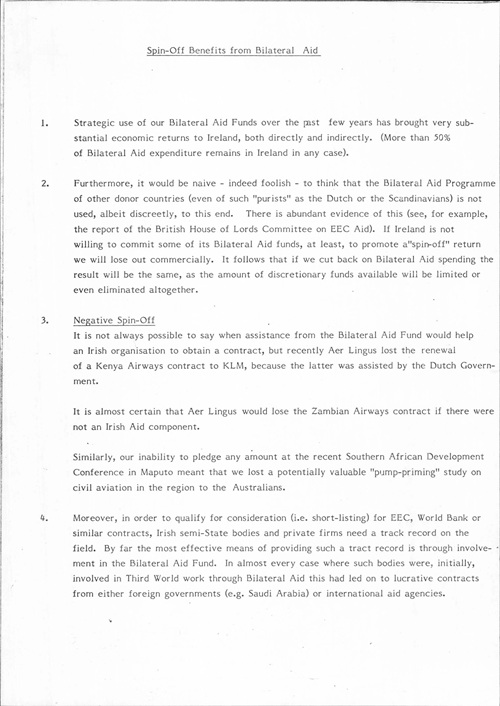
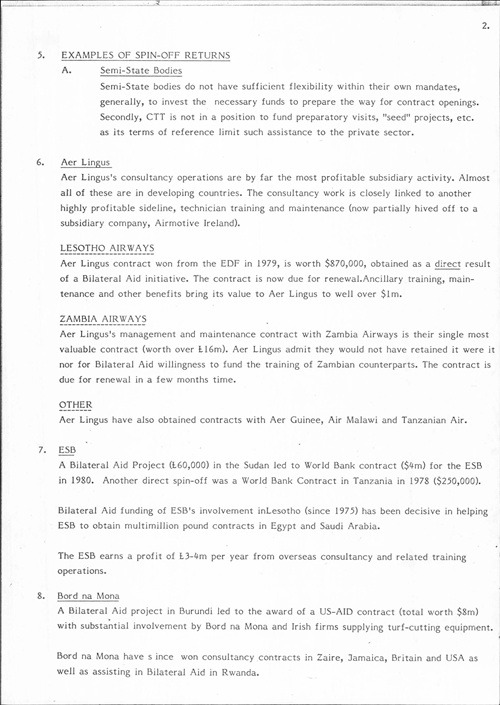
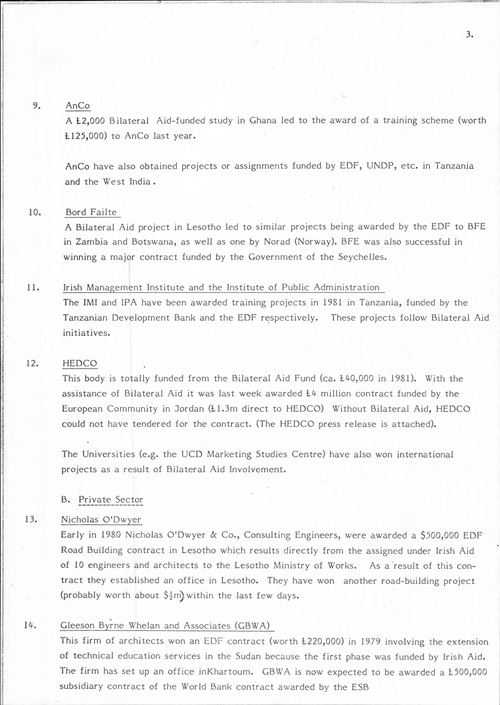
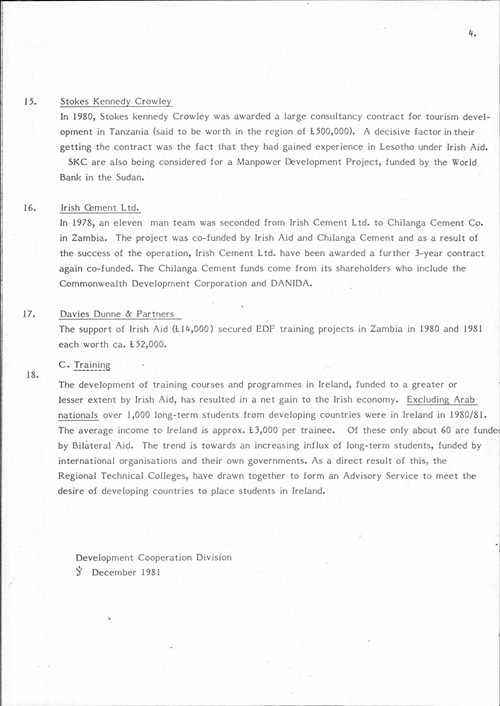
Kathleen Murphy was the daughter of Dr Cornelius Murphy, a former Republican activist. She qualified as a doctor in University College Dublin, and during her studies she was elected captain of the branch of Cumann na mBan in the college. During World War II, she tirelessly campaigned to raise funds for German children orphaned because of the war. She founded the Save the German Children Society (or Saor an Leanbh) and succeeded in bringing over many young German orphans and settled them with Irish families. As a result of her efforts, she was decorated with the Cross of Merit by the German Government. She married Paul Farrell, an actor, and had four children. She died in December 1970.
UCDA P115 consists of a copybook containing press-cuttings concerning the 'Save the German Children' campaign in Ireland during World War II. Cuttings mainly of articles and 'Letters to the Editor' written by Dr Kathleen Murphy about the campaign which she founded. Also includes pamphlets advertising the campaign, as well as an account sheet showing revenue collected by the society through its screening of the first showing of the 1936 Olympic Games in the Mansion House (13 August 1948) for the Drumcondra-Glasnevin Branch.
Cuttings include an interesting exchange of 'Letters to the Editor' of the Irish Times, between Vincent Brittain and Dr Murphy. In a letter dated 17 October 1945 Brittain criticises the first meeting of the Save the German Children Society held on the 16 October to enlist aid for the children of Germany: “this meeting is merely a thinly veiled excuse for the dissemination of fascist propaganda, and pious exclamations about Christian charity are mingled with statements of such vicious hate”. Dr Murphy’s reply on the 18 October states “As Charman of the Save the German Children Society it is my duty to protest very strongly against the accusations made against us by your correspondent Mr Vincent Brittain”.
UCDA P115 Dr Kathleen Farrell (née Murphy) Papers. Press-cuttings concerning the Save the German Children campaign, 17-18 October 1945
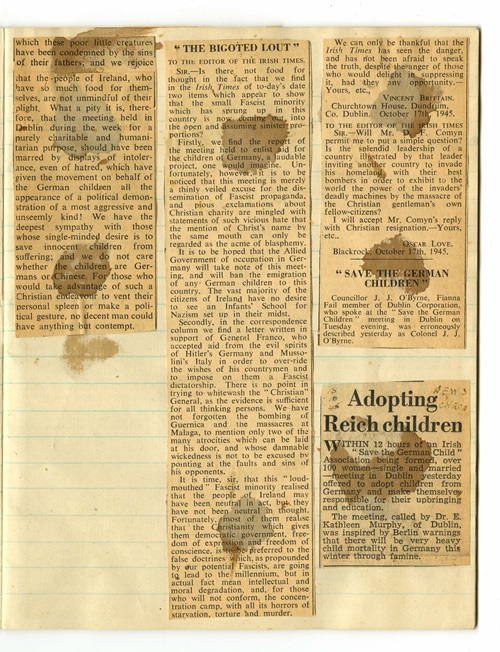
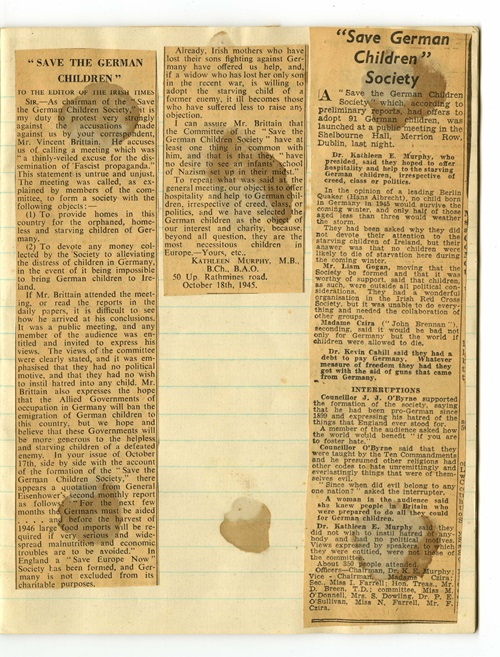
The inaugural meeting of Fianna Fáil took place on 16 May 1926. The new party was launched by Eamon de Valera, who up to this point, had been the president of Sinn Féin. Once the party of all republicans fighting for Irish freedom, Sinn Féin found its power slowly dwindling after 1922 as it refused to enter the Dáil of the Irish Free State. At the 1926 Sinn Féin Ard Fheis, de Valera proposed a motion that the party should work to have the main stumbling block to entry, the oath of allegiance to the English Crown, removed. The motion was narrowly defeated, prompting de Valera’s resignation. His new party, however, came quickly to eclipse Sinn Féin, as it took much of its membership and gained broad support throughout the country.
Fianna Fáil’s excellent showing in the two general elections of 1927 left the party’s future uncertain, as it had not succeeded in getting the oath removed. The party now had to consider whether to take the oath and enter the Dáil or remain in the wilderness. An intense debate followed, and many left the party over its eventual decision to take the oath. Fianna Fáil’s entry created the first effective opposition in the Dáil in the history of the Free State. The party had a succession of bye-election victories and its first general election victory in 1932. Fianna Fáil was asked to form a government and continued in office for sixteen years, until 1948. The party was to find itself in government again throughout much of the 20th century and into the 21st century.
In 2020, after a number of months of political stalemate following the general election, Fianna Fáil agreed with Fine Gael and the Green Party to enter into an unprecedented coalition, with the leaders of Fianna Fáil and Fine Gael rotating between the roles of Taoiseach and Tánaiste.
In the aftermath of the 2024 general election it is interesting to look back on the party’s approach to past elections. The running of election campaigns was carefully controlled from the top, right down through directors of election and to ordinary members canvassing from door to door.
The archives of the Fianna Fáil Party were deposited in UCD Archives in May 2000. In the Papers of the Fianna Fáil Party, files on election campaigns are supplemented by a large collection of election posters from 1932-1990. The posters present a potted history of the party from the Civil War rhetoric of its early campaigns, to focusing on its achievements, to the slick electioneering of its more recent campaigns.
UCDA P176/1225 is a General Election Poster captioned "Young People! Fianna Fáil has plans for you", with an estimated date of 1954. The poster outlines Fianna Fáil achievements to date and promises more new houses, schools and employment, as well as improved health services.
Fianna Fáil Election Poster captioned "Young People! Fianna Fáil has plan for you", [1954?]
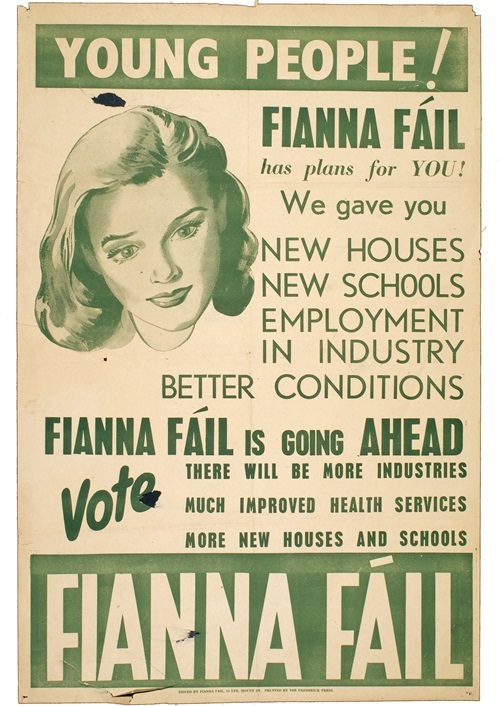
Gemma Hussey, nee Moran (11 November 1938 – 26 November 2024) was a trail blazing figure for women in Irish politics. She was a campaigner for more women in public life and became the second woman ever to be appointed to the cabinet, serving in Garret FitzGerald’s 1982 to 1987 government.
Hussey founded the Woman’s Political Association in 1973 and was chair of the organisation from 1973 to 1975. She went on to become a member of the Council for the Status of Women. She also served on the board of the Abbey Theatre from 1974 to 1978.
Hussey served as a Senator elected by the National University of Ireland panel from 1977 to 1982. During her first term she sat as an independent. In 1980 she joined the Fine Gael Parliamentary Party and became the party’s first spokesperson on Women’s Affairs. She went on to become the Government Leader in the Seanad.
Hussey was elected to Dáil Éireann as a TD for the Wicklow constituency in February 1982 having narrowly missed out on a seat in the general election held in June 1981. She was appointed as the opposition spokesperson on Broadcasting, Arts and Culture. She held her seat at the next general election in November 1982 and was appointed in the Fine Gael-Labour coalition government as Ireland’s first female Minister for Education from 1982 to 1986. After a cabinet reshuffle she briefly served as Minister for Social Welfare and Minister for Labour.
The government lost office in 1987 and while Hussey held her seat, she did not contest the next election in 1989. She published her diaries “At the Cutting Edge - Cabinet Diaries 1982-1987”, and became actively involved in the European Women’s Federation, encouraging women in former Eastern-bloc countries to become active in politics for the first time.
The Gemma Hussey Papers held in UCD Archives include papers relating to Hussey’s time as a TD and Minister for Education. P179/143 consists of a file of correspondence, letters, notes telegrams and cards from family members, friends, community groups, fellow politicians, local businesses and public institutions congratulating her on her election to Dáil Éireann for the Wicklow constituency. Included is a note from the Taoiseach, Garret FitzGerald congratulating Hussey on her remarkable victory in the elections for the Wicklow Constituency (24 February 1982, 1p).
UCDA P179/143 Note from Taoiseach Garret Fitzgerald, 24 February 1982
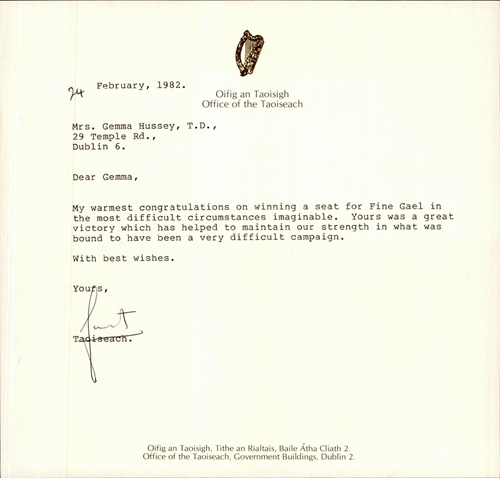
P179/190 Black and white photograph of GH sitting at her desk, possibly in her constituency office, Not dated [1982-1986?]
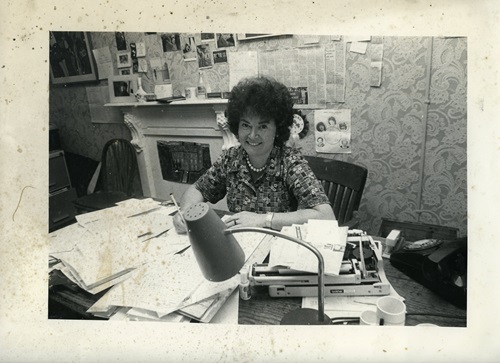
UCDA P179/191 Black and white photograph of Gemma Hussey with the Taoiseach Garret FitzGerald, [1982]
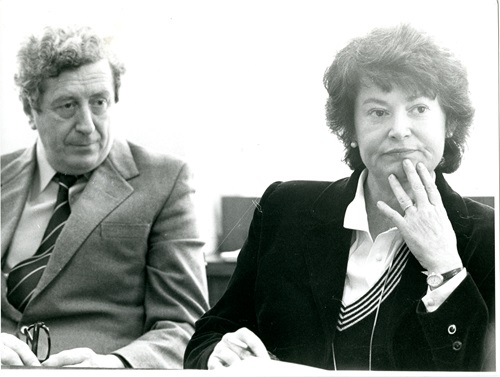
Ernest Blythe (1889–1975), was by turns a revolutionary, politician, government minister, managing director of the Abbey Theatre, and Irish-language revivalist. He played several very separate roles in the course of his adult life. The one continuous link over those years was his total commitment to promoting the revival of the Irish language as the language of everyday life.
Following his political career, he found employment as Secretary of Clondalkin Paper Mills from 1937 to 1941. In 1941 he commenced what would be his longest period of continuous employment with a single employer, becoming Managing Director of the Abbey Theatre, a position he held until 1967. During his time as director he actively promoted Irish-language plays and pantomimes.
For more information see Dictionary of Irish Biography.
The papers of Ernest Blythe held in UCD Archives consist of material relating to Blythe's political and ministerial career, his activities as Secretary to Clondalkin Paper Mills, Managing Director of the Abbey Theatre, and member of the R.T.E. Authority, as well as personal affairs.
Material relating to Blythe’s time as Managing Director of the Abbey Theatre include Articles of Association; minutes; reports; accounts; casts for plays; Architect's plans for the new theatre building; Programmes for Ordinary performances, Special performances and Irish pantomimes.
To put us in the festive mood is the programme below for the Irish Pantomime “Muireann agus an Prionnsa”, performed on St. Stephen’s Day 1945 and the evenings following.
UCDA P24/850 Irish Pantomime Programmes 1945-46: “Muireann agus an Prionnsa”, December 1945
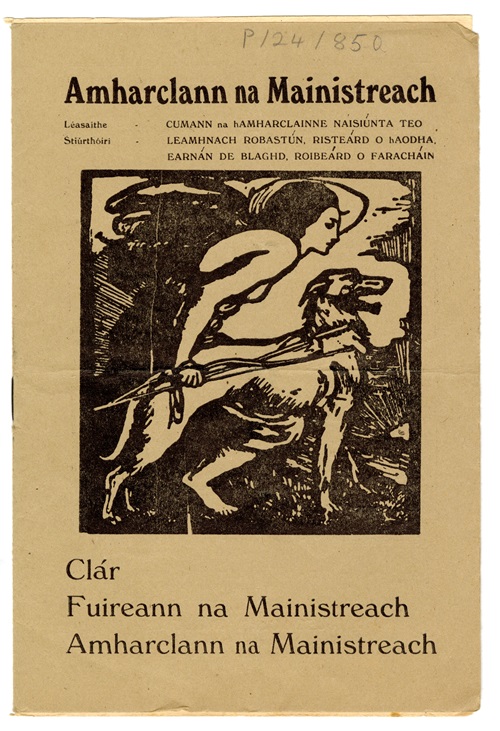
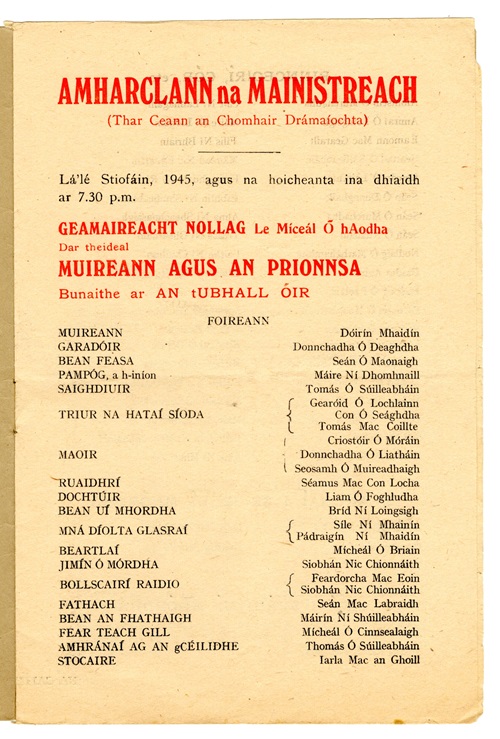
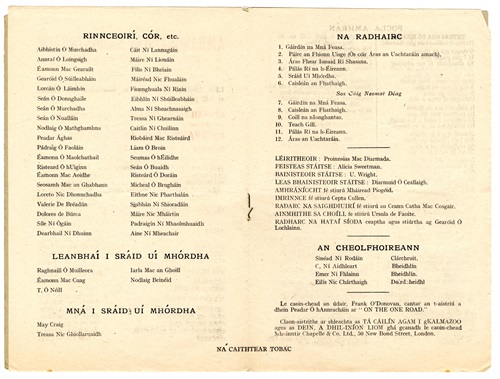
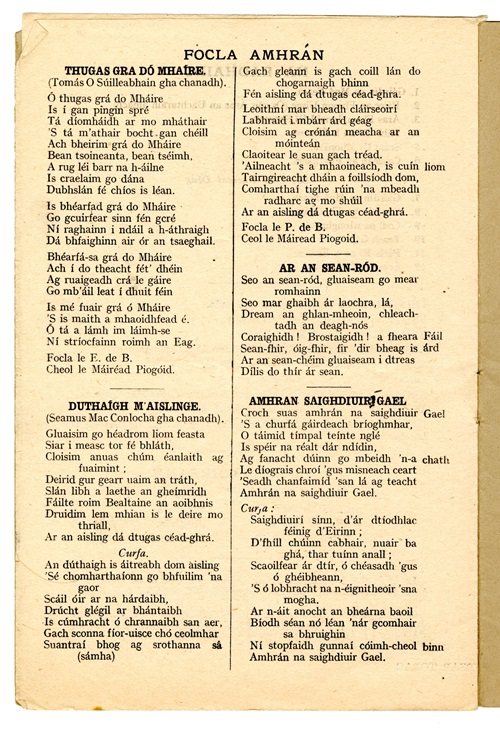
Eithne Coyle O’Donnell was born near Falcarragh, County Donegal, into a farming family with strong republican sympathies, her brother Donal was a Commandant in the 1st Northern Division of the Volunteers/IRA. She joined Cumann na mBan in 1918, carried arms and acted as a courier and was eventually arrested organising in county Roscommon. Sentenced to one year in prison under the Defence of the Realm Act in January 1921, she escaped from Mountjoy Jail in October with three others including Linda Kearns. An Anti-Treaty supporter, she was arrested in November 1922 and interned until late the following year. Eithne was elected President of Cumann na mBan in 1926. She married Bernard O’Donnell, an IRA activist from Donegal, in 1935.
In the 1970s, as part of her research for a proposed history of Cumann na mBan, Coyle O’Donnell circulated a questionnaire to surviving members. The questionnaire covers the period 1914 to 1923 and includes the following questions: name of branch; names of members alive or dead; numbers in the branch district council; names of officers; who founded your branch; what year; general activities civil and military; nature of help given to local volunteers; carrying arms and despatches; branch help given to Dáil Éireann administration.
Replies include representatives of most Dublin branches; branches in Carlow; Kerry; Dundalk and Glasgow. Manuscript accounts were also attached to the circular questionnaires indicating personal involvements in Cumann na mBan by many members. One of these members was Mary Doyle (nee Byrne) who was a member of the Iniginidhe Branch from 1915. Doyle states that she carried out the mobilisation for her branch on Easter Monday, 1916 and she was on duty from 23 April 1916 to the surrender on 30 April 1916 “rendering First Aid to the wounded Volunteers and carrying out the duties of Second Commander”. She recounts her experiences during the War of Independence and Civil war and states she was Captain of the branch during the Black and Tan period.
UCDA P461/4 Replies to Questionnaire for Proposed history of Cumann na mBan, November 1972-February 1973
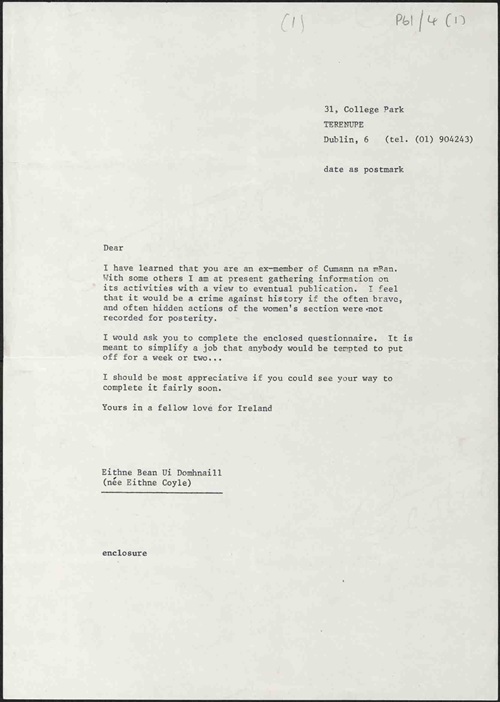
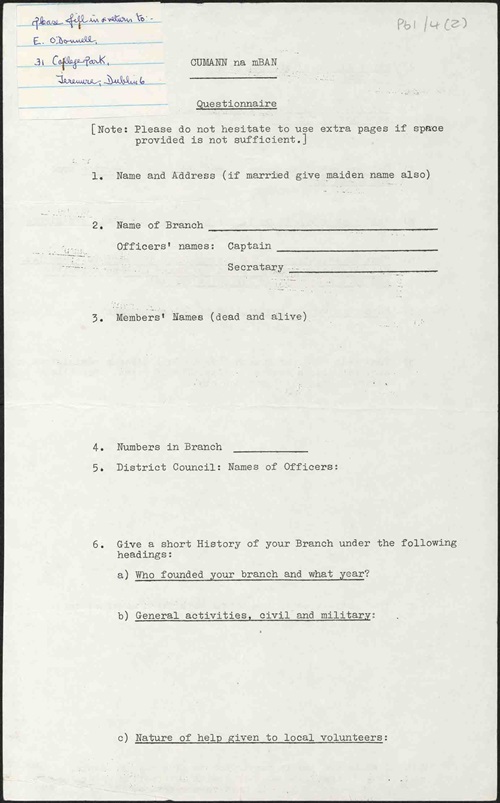
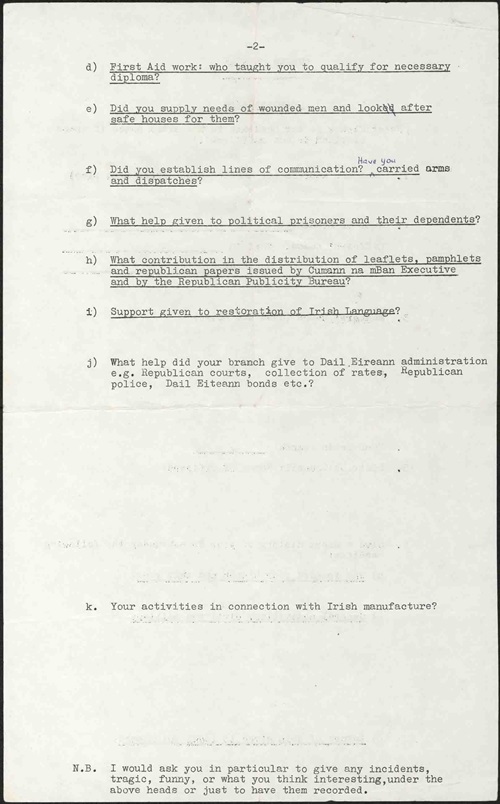
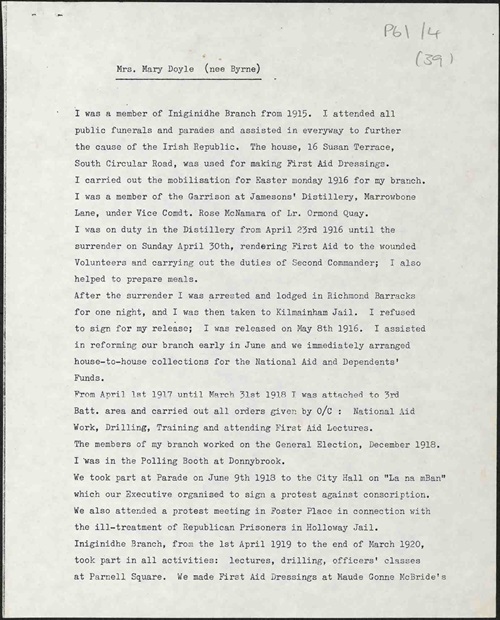
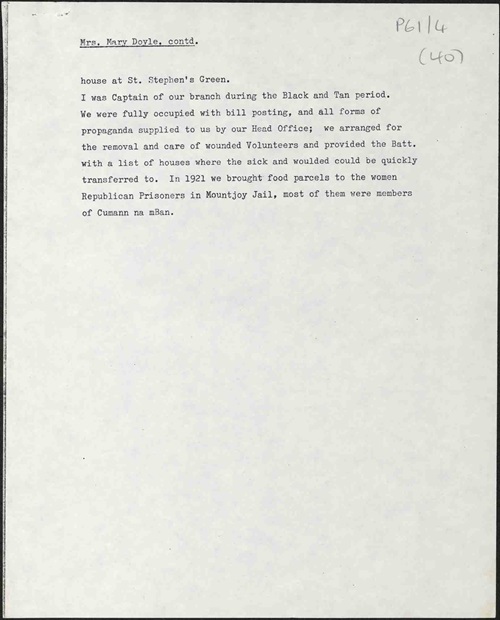
The Tony Heffernan Papers represent his long association with the Workers’ Party, from his appointment as the party’s press officer in July 1982 to his appointment as Assistant Government Press Secretary, as the Democratic Left nominee in the Rainbow Coalition government between 1994 and 1997. Following the merging of Democratic Left with the Labour Party, Heffernan was appointed Press and Parliamentary Director for the Labour Party in 2000 remaining in this position for eleven years. He retired from the Oireachtas in April 2011 after 29 years. He is one of the longest serving backroom political staff members. He continues to work as a media and communications consultant in the private sector.
The papers provide a significant source for the history of the development of the Workers’ Party and its policies through the comprehensive series of press statements issued over many years.
In early January 1991, in the context of imminent war between Iraq and an international coalition led by the United States, the Gulf Peace Committee was established in Dublin, The Committee was a broadly based body of organisations and individuals opposed to a war in the Gulf. Operation Desert Storm began on 17 January 1991 with the aerial bombing campaign against Iraq and came to a close with the American-led liberation of Kuwait on 28 February 1991.
UCDA P180/124 includes a press statement summarising the details of a press conference on the 10 January 1991 (incorrectly dated as 10 January 1990), at which the Gulf Peace Committee announced plans for a Dublin rally for peace the following weekend. Also included in the file is a full list of participants in the committee.
UCDA P180/124 Press Statements – 1991, Gulf Peace Committee launches details of Dublin rally for peace in the Gulf, 10 January 1991.
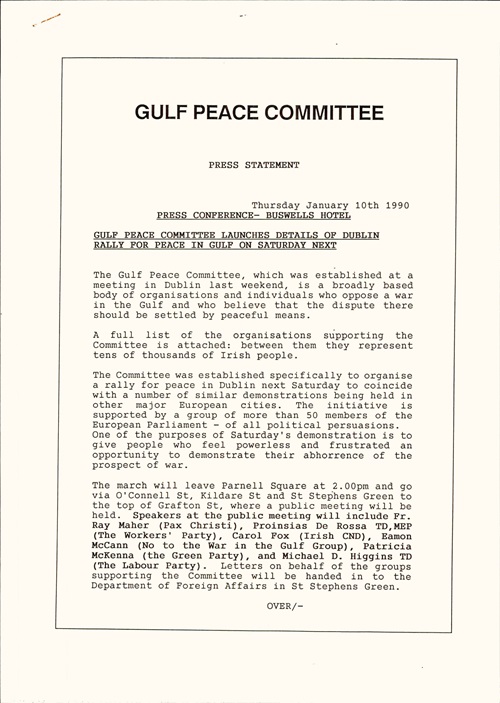
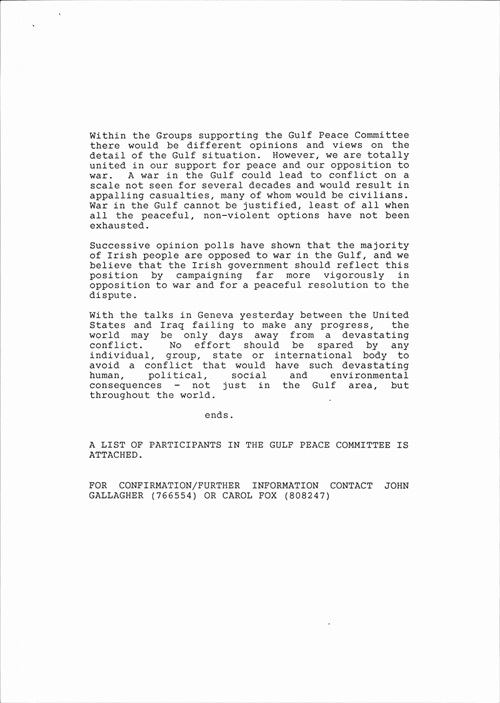
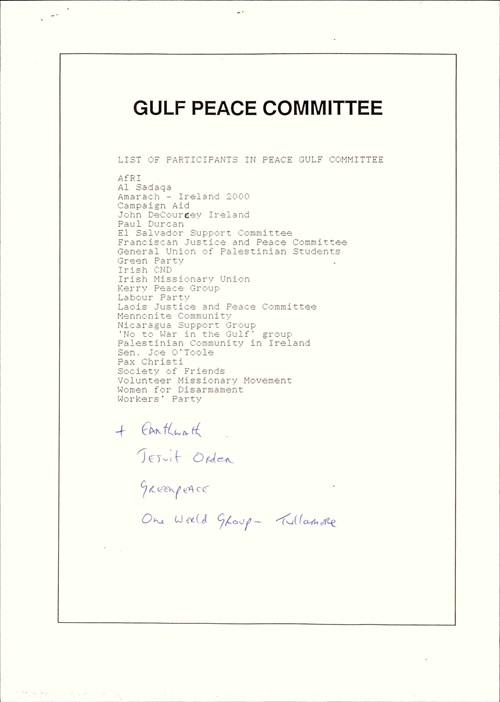
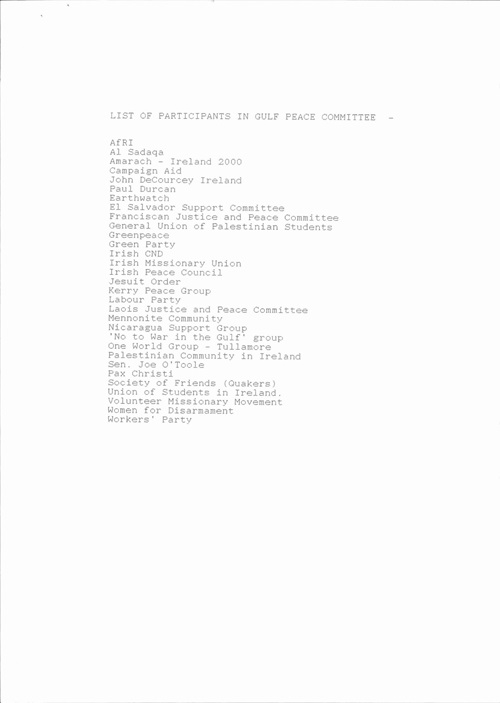
The papers of Sighle Humphreys held in UCD Archives contain documents relating to the O’Rahilly, Humphreys and O’Donoghue families, as well as documents relating directly to the life and activities of Sighle Humphreys.
Humphreys, was born 26 February 1899 in Limerick city, only daughter of David Humphreys, medical doctor, and his wife, Nell (Mary Ellen; née Rahilly). After her marriage she was also known by the Irish name Sighle Bean Uí Dhonnchadha (O'Donoghue). Humphreys learned Irish in early life, becoming a fluent speaker.
Humphreys joined Cumann na mBan in 1919 and was active throughout the war of independence and opposed the treaty. On 4 November 1922 Ernie O'Malley was captured at the Humphreys house after a shootout in which Sighle Humphreys fired on the Free State forces. The whole family were arrested. Humphreys was imprisoned, spending three months in solitary confinement after participating in a protest; she was released in November 1923 after a hunger strike.
In 1926 Humphreys became director of publicity for Cumann na mBan and was its leading Dublin activist for a decade thereafter. She participated in the February 1926 republican protest against the Abbey Theatre's production of ‘The plough and the stars’ by Sean O'Casey. In 1928 Humphreys smashed the windows of shopkeepers who flew union flags during the Tailteann Games, and composed threatening leaflets, which were sent to jurors in political cases as part of an intimidation campaign organised by Cumann na mBan and the IRA. She was imprisoned in Mountjoy for these activities from December 1926 to February 1927 and for six months from May 1928.
In 1931 Humphreys was a founder member of the short-lived republican-socialist group Saor Éire. She was jailed for two months by a military tribunal in December 1931. In 1932–3 she was a leading member of the Boycott British League. In April 1934 she was a founder member of the Republican Congress but left the organisation in July 1934 after the IRA refused it endorsement.
On 19 February 1935 she married the prominent IRA activist Donal O'Donoghue (1897–1957). In the 1940s and 1950s the O'Donoghues were active in Clann na Poblachta.
Humphreys campaigned against Irish entry to the EEC, she was active in the Irish Sovereignty Movement in the 1970s and 1980s. In the 1970s she campaigned for more frequent celebration of the mass in Irish and served on the Dublin Housing Committee, a radical pressure group. She refused to pay her television licence in 1976–7 in protest against poor-quality Irish-language programming, and was fined £8, which she refused to pay. During the 1970s and 1980s she corresponded with republican prisoners and worked for their dependents; she endorsed Sinn Féin and the H-block campaign.
Sighle Humphreys died 14 March 1994
Source: DOI: https://doi.org/10.3318/dib.004157.v2
UCDA P106/684 consists of correspondence between Sighle Humphreys and others on a wide variety of topics, including, in the case of the letter below, the bus service between Dingle and Tralee. Public transport in Ireland has always attracted its fair share of criticism, so a nice counterpoint is a letter from R. McElheron, Assistant Public Relations Officer at Córas Iompair Éireann (CIE) to Sighle Humphreys. The letter is dated 6 August 1952 and is in response to a letter from Humphreys. Humphrey’s letter is unfortunately not included in the file, but McElheron states he is “very much obliged for your letter of appreciation of the satisfactory driving of one of our bus drivers”. He goes on to note that her “kind remarks” will be conveyed to the employee in question and the letter will be published in the CIE weekly newsletter. It is interesting that a letter of appreciation was considered noteworthy enough to merit publication.
UCDA P106/684 (46) Papers of Sighle Humphreys. Letter from CIE to Sighle Humphreys, 6 August 1952.
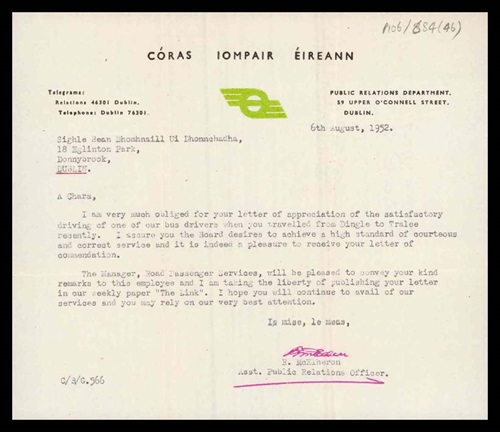
The sale and importation of contraceptives was outlawed in the Republic of Ireland in 1935. In the 1970s, the law surrounding contraceptives came under increased scrutiny as loopholes allowed for their possession and use but not their sale. The legal position drew heavy criticism particularly as contraceptives were widely available in Northern Ireland at the time. Responding to the increasing pressure, Charles Haughey, then Minister for Health, introduced the Health (Family Planning) Bill which was enacted into law in 1979. The law was dubbed 'an Irish solution to an Irish problem' as contraceptives were only made available via medical prescription 'for the purpose of "bona fide" family planning' and could only be sold through physicians and pharmacies. Under this law, physicians and pharmacists were not obliged to supply members of the public with prescriptions or contraception if they held any moral objection.
Dr Derek Freedman, a genito-urinary physician, was involved in the establishment of Family Planning Services Limited. The company was established for the provision of information and family planning services to the public. Initially, this involved the use of "non-medical" methods of contraception but they were eventually able to provide medical contraceptives, family planning advice, psychosexual consultations and to offer surgical procedures, such as vasectomies and the insertion of I.U.D.s. The first Family Planning Services clinic was opened at 67 Pembroke Road, Dublin followed by the establishment of other medical centres at Bawn Og/Bawnogue, Clondalkin and at 78/79 George's Street, Dun Laoghaire in 1984.
Members of the Board of Family Planning Services, in cooperation with the Association of Irish Family Planning Clinics and the Irish Family Planning Association, were particularly critical of the restrictions of the Health (Family Planning) Act and were involved in lobbying the Minister for Health, Barry Desmond who succeeded Charles Haughey in 1982, for amendments to facilitate more open distribution of contraception in the Republic.
The Papers of Dr Derek Freedman include a series of documents, with opinions, questions and correspondence gathered by Derek Freedman relating to the Health (Family Planning) Bill, 1978 and the subsequent Act passed in 1979, their impact on the sale and distribution of contraceptives in Ireland and the implications for Family Planning Services. This series includes the memorandum below to Board Members of Family Planning Services outlining a meeting between Freedman and Barry Desmond, Minister for Health, on the 21 March 1983, discussing the provision of family planning in Ireland and proposed changes to the Health (Family Planning) Act 1979.
UCDA P276/2 Papers of Dr Derek Freedman. Meeting with Barry Desmond, Minister for Health, 21 March 1983
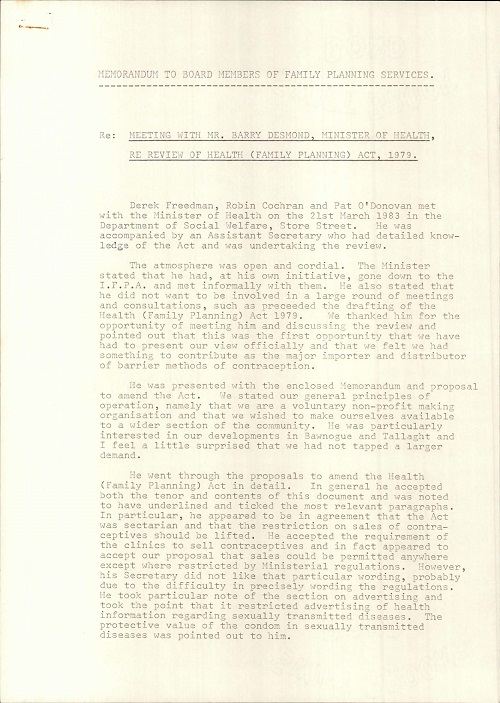
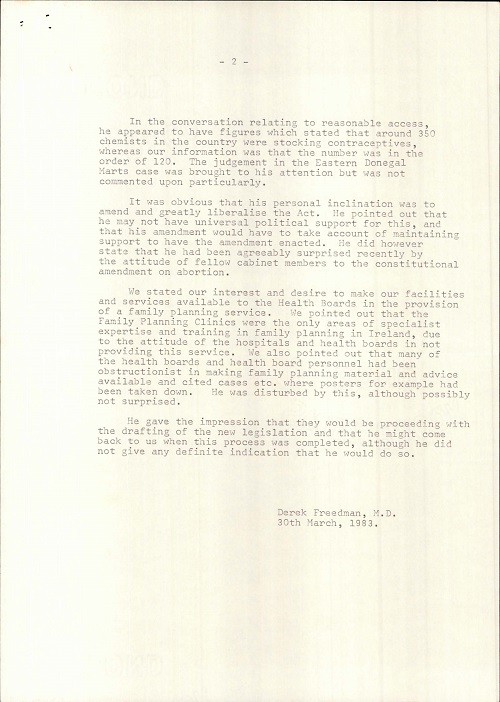
Kathleen O’Connell was born on 5 October 1888 at Caherdaniel, Co. Kerry, one of eleven children of John O'Connell, farmer, and Mary Ann O'Connell (née O'Sullivan). Educated locally, she emigrated to America in 1904 and trained as a secretary in Chicago. In 1912 she became secretary to the American delegation of the Gaelic League in New York. In response to news of the Easter rising she joined Cumann na mBan in the US and became active in collecting aid for the dependants of the men killed and wounded.
On 2 October 1919 she was requested by Éamon de Valera to join the ‘consular staff’ of his tour of America. Throughout the tour she worked closely with him, travelling the country dealing with his public and private correspondence and assisting with his speeches. Returning to Ireland with de Valera in November 1920, she immediately went into hiding. Arrested with de Valera on 22 June 1921, they were released the following day. She joined the delegation to meet Lloyd George in July 1921 and was later to share de Valera's views of the treaty.
She followed de Valera loyally throughout the civil war and was present on the platform in Ennis at his arrest in August 1923. During his imprisonment she acted as his agent and messenger throughout the country. Devoted to the cause of Ireland, she identified service to the nation with service to de Valera.
Through opposition and government she was a constant at de Valera's side, both nationally and internationally. Forced to retire in 1954 because of a cancer-related illness, her position was taken by her niece Maire O'Kelly. She died 7 April 1956 and was buried at Glasnevin cemetery.
(Source: Dictionary of Irish Biography)
The Kathleen O’Connell papers in UCD Archives relate overwhelmingly to O’Connell’s association with Eamon de Valera. However, the papers also include a series of photographs spanning over forty years from 1912–1956. O’Connell was well travelled and the collection includes images from her travels both in Ireland and throughout Europe. The first photograph below is dated July 1931, taken by Kathleen O’Connell while holidaying in Bruge, Belgium, with the author Annie M.P. Smithson. The scene is of a cobbled square, tall buildings at back, a man leading a large dog pulling a small cart to the front. An annotation in Kathleen’s hand records that she sent the photograph to the Irish Independent which published it and gave her 10/-. The second photograph is of O’Connell herself, taken during her final holiday in Caherdaniel, Co. Kerry before her death. She is in the hills above the village, sitting looking directly at the camera, with the sea visible in the background.
UCDA P155/242, 282 Papers of Kathleen O’Connell, photographs taken in Bruge, Belgium and Caherdaniel, Co. Kerry.
UCDA P155/242
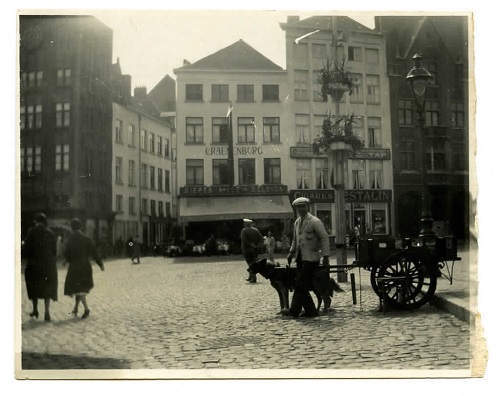
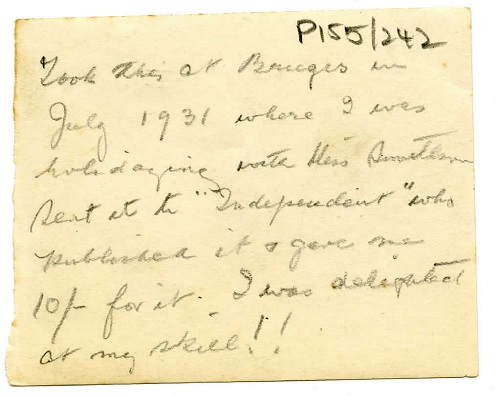
Reverse side of photograph: “Took this at Bruges in July 1931 where I was holidaying with Miss Smithson. Sent it to “Independent” who published it and gave me 10/- for it. I was delighted at my skill!!”
UCDA P155/282
![Papers of Kathleen O’Connell. Photograph taken during Kathleen O’Connell’s final holiday in Caherdaniel, [1955]](/archives/t4media/P155-282-500w.jpg)
Photograph taken during Kathleen O’Connell’s final holiday in Caherdaniel, [1955].
Columba, Colmcille, or Colm Cille (7 December 521 – 9 June 597 AD) was an Irish abbot and missionary evangelist credited with spreading Christianity in what is today Scotland at the start of the Hiberno-Scottish mission He founded the important abbey on Iona, which became a dominant religious and political institution in the region for centuries. He is the patron saint of Derry. He was highly regarded by both the Gaels of Dál Riata and the Picts, and is remembered today as a Catholic saint and one of the Twelve Apostles of Ireland. Source Wikipedia. For more information on Colm Cille see Dictionary of Irish Biography
This month’s Document of the Month is taken from the Annals of the Four Masters and recounts the death of Colm Cille, recorded as having taken place on the 9th June 592. This differs from the accepted historical record which puts his year of death as 597.
"The Annals are a chronicle of Irish history from A.M. 2242 to A.D. 1616 and contain records under successive years of the deaths of kings and other prominent persons, both ecclesiastical and lay, along with accounts of battles, plagues, etc. They end with the death of Hugh O’Neill, earl of Tyrone, in 1616. The compilation was largely derived from older manuscripts, many of which have not survived.
Two complete autograph copies were made: one for Fearghal Ó Gadhra, Lord of Coolavin and Member of Parliament for Sligo in 1634, and one for the Franciscans at the Irish College of St Anthony, Louvain. The autograph manuscripts are all now in Dublin, in three separate archives.
- M. 2242-A.D. 1169: University College Dublin UCD-OFM A 13
- M. 2242-A.D. 1171: Royal Irish Academy C iii 3
- D. 1170-1499: Royal Irish Academy 23 P 6
- D. 1500-1616: Royal Irish Academy 23 P 7
- D. 1334-1605 (and 1616 fragment): Trinity College Dublin 1301
The volume in UCD (Franciscan A 13) and two in the Academy (RIA 23 P 6-7) are considered to constitute the Louvain set."
Text from RIA blog: Annals of the Four Masters.
Annals of the Four Masters, UCD-OFM MS A13 | C17th | Paper | 28cm × 19 cm | f257r. Reproduced by kind permission of UCD-OFM Partnership.
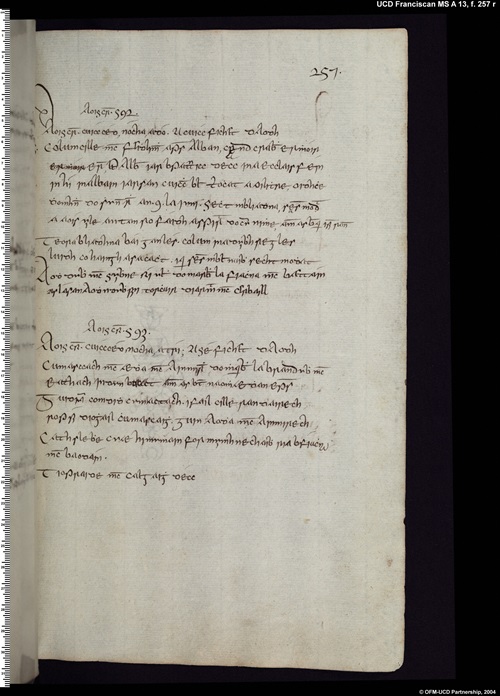
Image: ISOS
Irish Text
Aois Criost, cuig céd nochat a dó.
A cúig fichęt d'Aodh.
Colum Cille, mac Feaidhlimidh, apstal Alban, ceann crabhaidh ermhoir Ereann, ⁊ Alban iar b-Pattraicc, d'écc ina ecclais fęin in h-I i nd-Albain, iarsan c-cúicceadh bliadhain triochad a oilithre, oidhce domhnaigh do shundradh an 9 lá Iunii. Seacht m-bliadhna seachtmoghatt a aois uile an tan ro faoidh a spiorait dochum nimhe, amhail as-bęrar isin rann:
- Teora bliadhna bai gan lés
Colum ina Duibhreglés,
Luidh go h-aingli asa chacht
iar seacht m-bliadhna seachtmoghat.
Dallán Forgaill dixit hoc do bhás Choluim Cille:
- Is leighes legha gan les
is dedhail smera re smuais
Is abhran re cruit gan chéis
sinde d'éis ar n-argain uais.
Aodh Dubh, mac Suibhne, rí Uladh, do mharbhadh la Fiacha, mac Baettain. As lasan Aodh n-Dubh-sin torchair Diarmaitt mac Cearbhaill.
Annals of the Four Masters CELT Project
English Translation
The Age of Christ, 592.
The twenty fifth year of Aedh.
Colum Cille, son of Feidhlimidh, apostle of Alba Scotland, head of the piety of the most part of Ireland and Alba, next after Patrick, died in his own church in Hy, in Alba, after the thirty fifth year of his pilgrimage, on Sunday night precisely, the 9th day of June. Seventy seven years was his whole age when he resigned his spirit to heaven, as is said in this quatrain:
Three years without light
was Colum in his Duibh-regles;
He went to the angels from his body,
after seven years and seventy.
Dallan Forgaill composed this on the death of Colum Cille:
Like the cure of a physician without light,
like the separation of marrow from the bone,
Like a song to a harp without the ceis,
are we after being deprived of our noble.
Aedh Dubh, son of Suibhne, King of Ulidia, was slain by Fiachna, son of Baedan. It was by this Aedh Dubh Diarmaid Mac Cearbhaill had been slain.
Annals of the Four Masters CELT Project
The Fitzwilliam family were a very wealthy British family. William Wentworth Fitzwilliam, 2nd (4th) Earl Fitzwilliam, inherited the Wentworth estates in England and Ireland when his uncle, Charles Watson-Wentworth, 2nd Marquis of Rockingham, died in 1782. He subsequently became one of the richest members of the nobility.
The papers of the Fitzwilliam Family held in UCD Archives consist of a collection of papers mainly arising from or associated with Fitzwilliam family finances, probably accumulated by an auctioneer or bookseller. The main Fitzwilliam Collection, under the title the Wentworth Woodhouse Collection, is housed in the Sheffield Archives
One of the more interesting items in the collection is a letter from William Wentworth Fitzwilliam, to Henry Addington, Viscount Sidmouth, dated 27 July 1817, reporting his impressions of the current situation in York following two linked armed risings in Huddersfield and Sheffield. These small risings took place on the night of 8-9 June 1817 and became known as the Folly Hall and Pentridge risings. Fitzwilliam seeks to reassure Viscount Sidmouth, stating “In no part of the Riding can I discover any symptom of conspiracy or revolutionary combinations”.
UCDA P3/17 Papers of the Fitzwilliam Family. Letter from William Wentworth Fitzwilliam to Henry Addington, 27 July 1817.
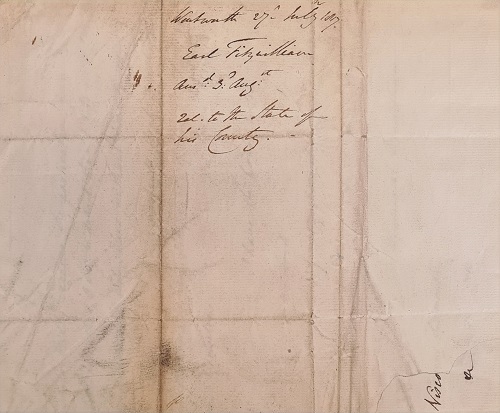
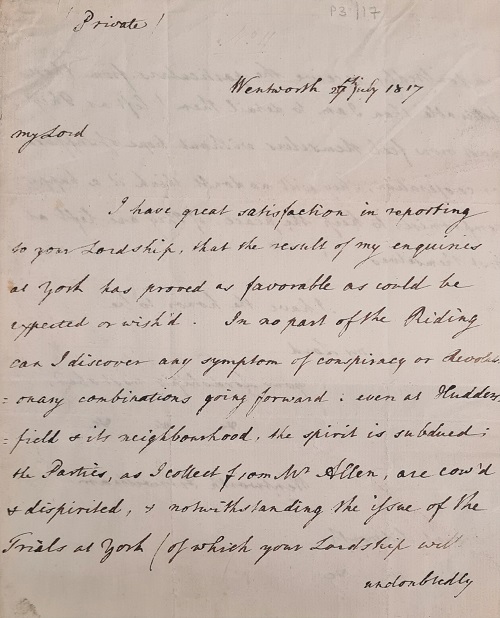
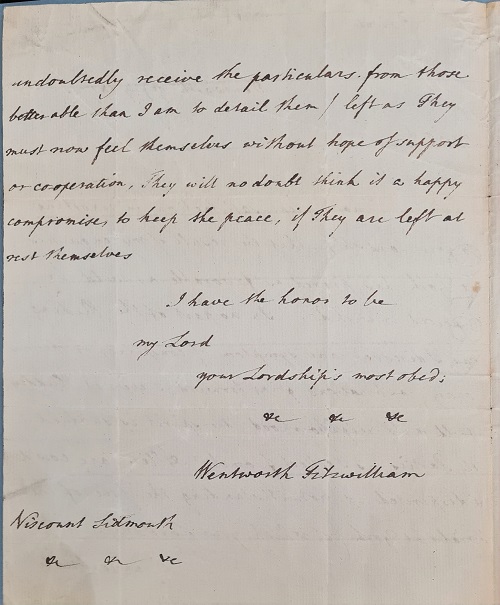
Wentworth 27th July 1817
Earl Fitzwilliam
Arr’d [sic] 3rd Aug’st
[sal?] to the State of his County.
Private
Wentworth 27th July 1817
My Lord
I have great satisfaction in reporting to your Lordship, that the result of my enquiries at York has proved as favorable as could be expected or wish’d [sic]. In no part of the Riding can I discover any symptom of conspiracy or revolutionary combinations going forward, even at Huddersfield and its neighbourhood, the spirit is subdued; the Parties, as I collect from Mr Allen, are cow’d [sic] and dispirited, and notwithstanding the issue of the Trials at York (of which your Lordship will undoubtedly receive the particulars from those better able than I am to detail them) left as They must now feel themselves without hope of support or cooperation. They will no doubt think it is a happy compromise to keep the peace, if they are left at rest themselves.
I have the honor to be my Lord
your Lordship’s most obed. [sic]
Wentworth Fitzwilliam
Viscount Sidmouth
The Records of the Republican Soldiers’ Casualty Committee held in UCD Archives consist of 72 completed forms presented to the Committee for members of the Irish Republican Army (IRA) in the 1st Dublin Brigade Area killed throughout the period from the 1916 Rising to the aftermath of the Civil War. They relate mainly to members of the 2nd Battalion but forms for some Friendly Citizens and members of the Irish Citizen Army and Fianna Éireann are also included. Forms include personal details, a summary of military record, and particulars of the date, place and circumstances of death. The forms were submitted to the Committee in July 1928.
An interesting example is the form of Arthur Weekes (Neill). Weekes had an address in Norwich, England and was a German by birth. He worked as a chef at Shelbourne Hotel and belonged to the German Communists Party and Irish Socialist Party. He joined the Irish Citizen Army in November 1915 and was killed in action in Moore Lane at the evacuation of General Post Office on 29 April 1916.
UCDA P156/66 Records of the Republican Soldiers’ Casualty Committee. Form for Arthur Weekes, 24 May 1928
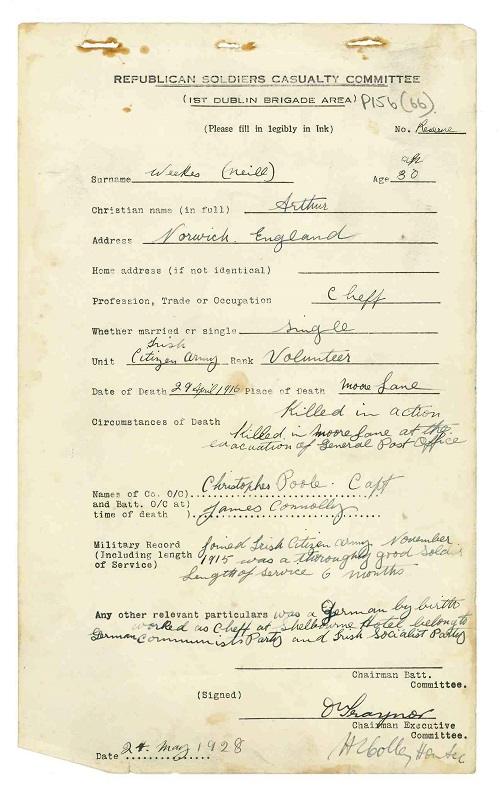
REPUBLICAN SOLDIERS CASUALTY COMMITTEE
(1ST DUBLIN BRIGADE AREA)
(Please fill in legibly in Ink)
No.
Reserve
Surname
Weekes (Neill)
Christian name (in full)
Arthur
Address
Norwich, England
Home address (if not identical)
Profession, Trade or Occupation
Cheff [sic]
Whether married or single
Single
Unit
Irish Citizen Army
Rank
Volunteer
Date of Death
29 April 1916
Place of Death
Moore Lane
Circumstances of Death
Killed in action. Killed in Moore Lane at the evacuation of General Post Office
Names of Co. O/C and Batt. O/C at time of death
Christopher Poole Capt., James Connolly
Military Record (Including length of Service)
Joined Irish Citizen Army November 1915 was a thoroughly good Soldier. Length of Service 6 months.
Any other relevant particulars
was a German by birth. Worked as Cheff [sic] at Shelbourne Hotel belong to German Communists
Party and Irish Socialist Party.
Chairman Batt. Committee.
(Signed)
Chairman Executive Committee. Oscar Traynor
Harry Colley Hon. Sec.
Date
24 May 1928
James Lenigan was a Tipperary landowner, resident in Castle Fogarty, near Thurles. At the time of Griffith's Valuation, Lenigan's estate was located in the parishes of Ballycahill and Moyaliff, barony of Kilnamanagh Upper. In the 1870s Lenigan owned 1,604 acres in county Tipperary.
There are a number of small collections in UCD Archives and the James Lenigan collection must be one of the smallest. It consists of a letter from John Molloy, Castle Fogarty, Thurles, County Tipperary, to James Lenigan [also of Castle Fogarty], Umberslade Hall, near Hockley Heath, Birmingham (15 July 1847, 3pp & transcript). He describes early indications of the recurrence this season of potato blight and encloses samples of plant leaves.
'A week will tell much. I have heard many other bad accounts this evening but will state nothing but what comes under my own eye. If the potato goes this year, Ireland will never never recover.'
UCDA P146/1 Letter to James Lenigan, 15 July 1847
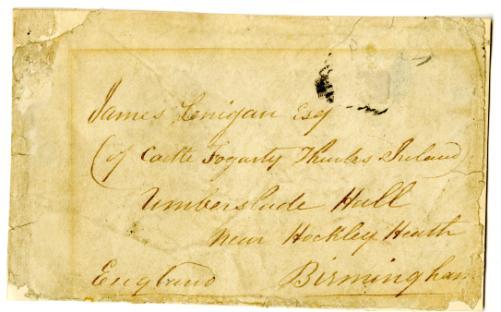
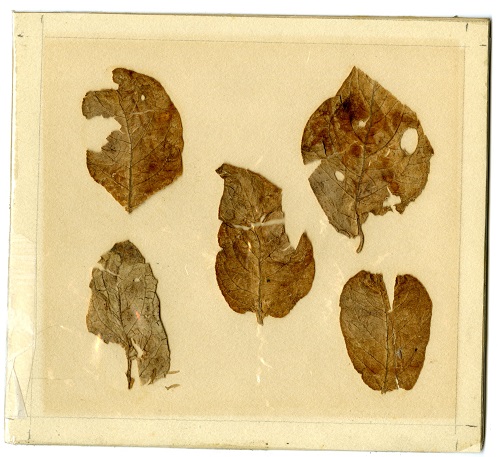
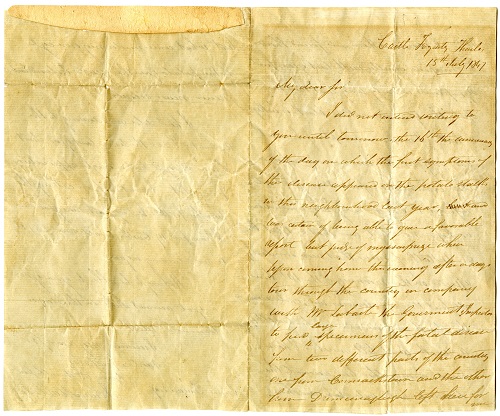
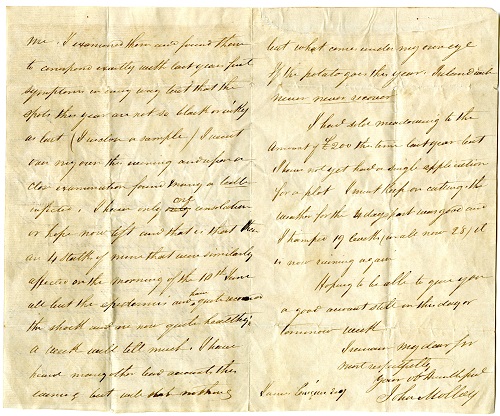
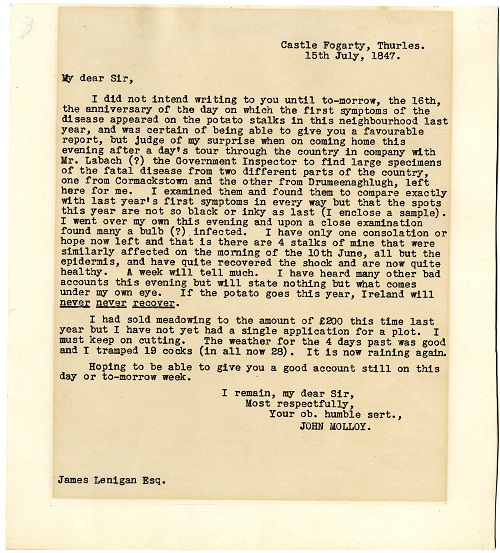
The records of the National University Women Graduates' Association [NUWGA] document the foundation, policies and correspondence of the Association from 1902-1982.
NUWGA was founded in 1902 and originally called the Irish Association of Women Graduates and Candidate Graduates [IAWG & CG]. Its initial mission was to improve the rights of women in and through education and broadened to include campaigning with other women’s organisations against legislative measures discriminating against women. The IAWG & CG was affiliated to the Federation of University Women, London in 1909. It was decided in 1914 to divide the association—which until then had included all university women—into three associations: Dublin University, the National University of Ireland and Queen’s University, Belfast.
The three associations joined to form the Irish Federation of University Women in 1925 which affiliated to the International Federation of University Women in the same year. The members of the Association at their meetings considered questions regarding employment for women graduates; they also held social meetings and meetings at which papers on various subjects were presented and discussed.
From the beginning, the Association was concerned with issues in regard to the employment of women graduates in Government Departments, Hospitals and Schools. Included in a file titled “Equal Opportunity: Letters and petitions”, is a petition from the Cork NUWGA Centre to the Secretary of the Medical Staff of Victoria Hospital for diseases of women and children. The petition requests “the placing of a duly-qualified medical woman on the staff of all Women’s Hospitals”. The petition further states that “it is now generally acknowledged that women, in time of sickness, should if they choose, have the privilege of being attended by a woman”.
UCDA NUWGA1/3 Papers of the National University Women Graduates’ Association. Equal Opportunity: Letters and Petitions, October 1913.
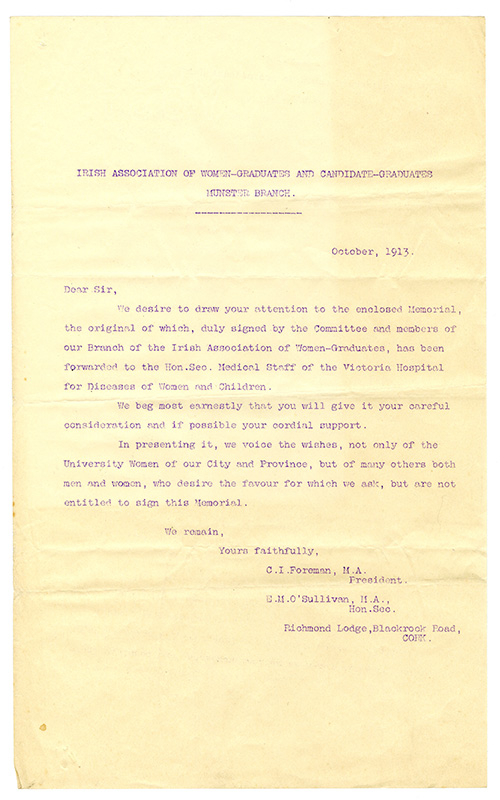
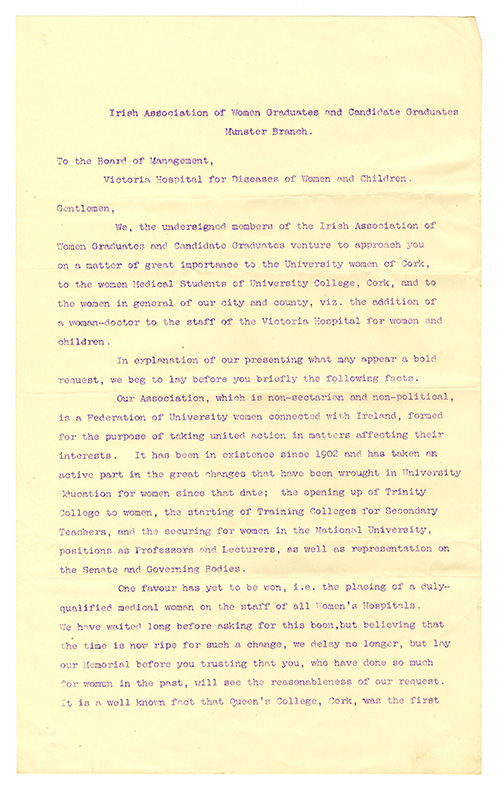
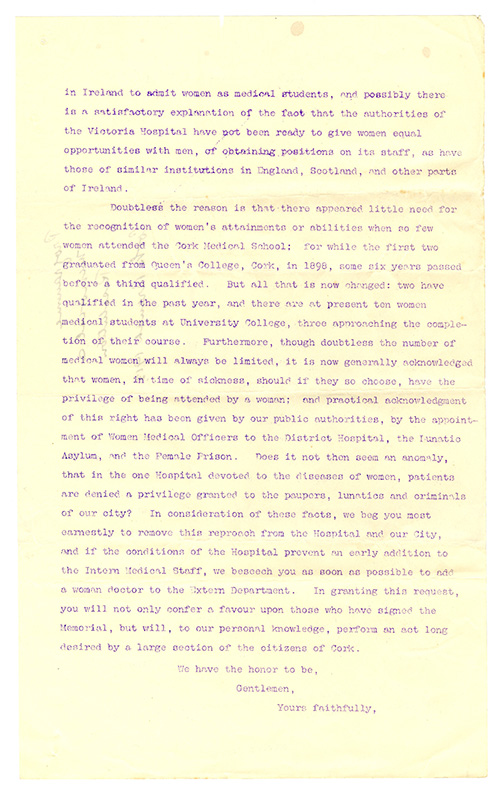
The Pioneer Total Abstinence Association (PTAA) was founded in Dublin in December 1898 by Fr James Cullen SJ. The Association would grow to become one of the prominent Catholic movements in the first half of the twentieth century in Ireland. An essential component of the Association was devotion to the Sacred Heart with a focus on the spiritual element in the work of the PTAA.
The Association was based on the parish unit with a spiritual director overseeing the activities of each centre. Overall control was administered by a central council based in Dublin. Membership of the Association was based on a probationary period of two years after which full membership was granted. By the end of 1914 membership of the Association had reached an estimated 280,000 and by the 1950s this figure had risen to almost 500,000 members. By 1918 there were Pioneer centres in existence in England, Scotland, the USA, Australia, South Africa and Switzerland.
The association was initially funded through the sale of Pioneer pins. As the Association began to grow and expand, efforts were made to increase the its profile and promote its message. To this end a weekly column simply entitled ‘Pioneer Column’ appeared for the first time in 1912 in the Irish Catholic. It became one of the longest running regular columns in Irish newspaper history. In 1948 the Association began to publish a magazine to act as the official organ of the PTAA. ‘The Pioneer’ continues to be published today.
The popularity of the PTAA remained steady throughout the 1940s and 1950s during which the Association celebrated two major milestones, the Golden and Diamond Jubilees. Croke Park hosted the celebrations on both occasions. Official figures estimated that approximately 100,000 people attended the Golden Jubilee in 1949.
The papers of the PTAA held in UCD Archives contain a series of documents relating to the Golden Jubilee celebrations in 1949. Included is a file containing programmes, tickets and black and photographs depicting the procession to Croke Park and the crowds in Croke Park on 26 June 1949.
UCDA P195/96 Papers of the Pioneer Total Abstinence Association. Golden Jubilee—Memorabilia, 26 June 1949.
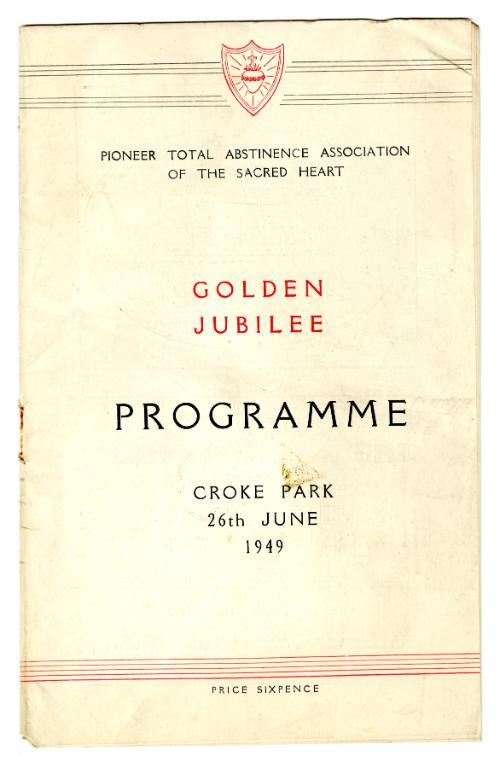
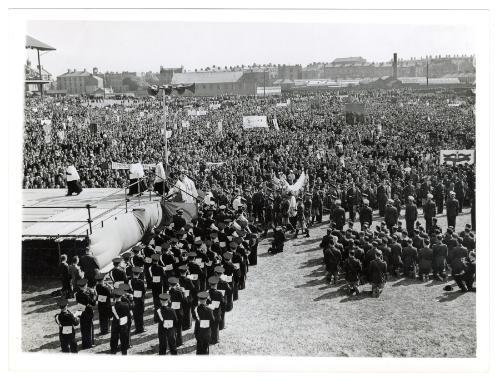
Nally, Dermot (1927–2009), civil servant, was born in Dublin on 10 December 1927. In 1952 he joined the Department of Local Government. In 1973, he was transferred to the Department of the Taoiseach, and was appointed as secretary to the government in 1980.
Over the course his career Nally worked with ten governments, reporting directly to five Taoisigh, He reported to the Taoiseach of the day on a wide range of matters, including Northern Ireland and European affairs. He also served on the cabinet's highly confidential security committee, and was note-taker at all meetings between Taoisigh and other heads of government, notable UK Prime Ministers.
Nally was deeply involved in confidential discussions about the possibility of a joint Anglo–Irish declaration to help to secure a paramilitary ceasefire and advance a peace process. When Albert Reynolds became Taoiseach in February 1992, Nally was asked to delay his retirement and participate in the ongoing negotiations. After his official retirement later in that year, Nally was retained on a consultancy basis by Reynolds to advise on the negotiations leading to the declaration. Nally was one of four principal drafters of the document.
The Downing Street Declaration papers are a series of papers within the Nally Collection amounting to 1 box of material. The papers relate to talks between the UK and Irish Governments that culminated in the Downing Street Declaration (Joint Declaration) issued on 15 December 1993 by John Major and Albert Reynolds, at 10 Downing Street.
Papers in this series include multiple draft declarations; notes of meetings between Reynolds and Major; notes of meetings between UK and Irish officials led by Nally and his UK counterpart Robin Butler; briefing documents for Reynolds and Irish negotiating team; and correspondence between Reynolds and Major. The document below is a photocopied early draft of the Downing Street Declaration with handwritten comments and annotation by Nally.
UCDA P254/4 Papers of Dermot Nally. Downing Street (Joint Declaration), early draft, 29 March 1993.
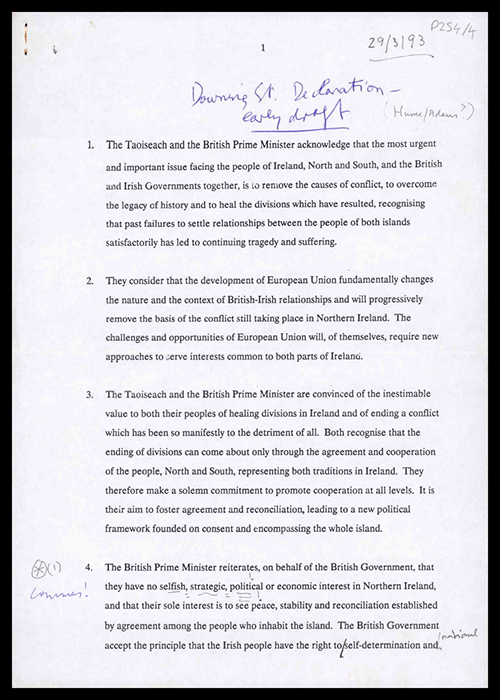
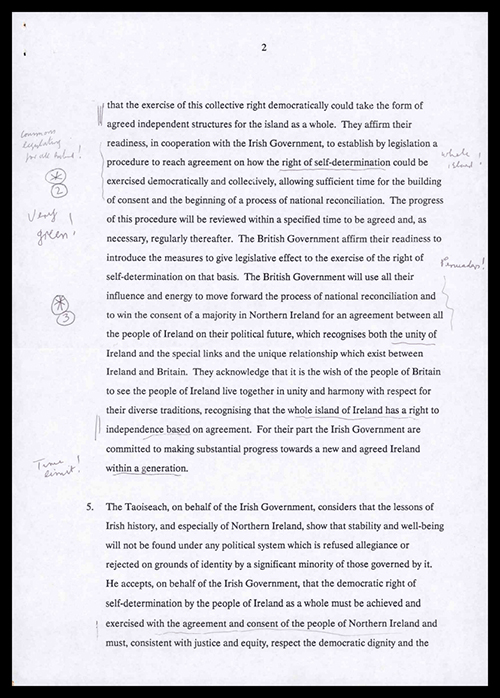
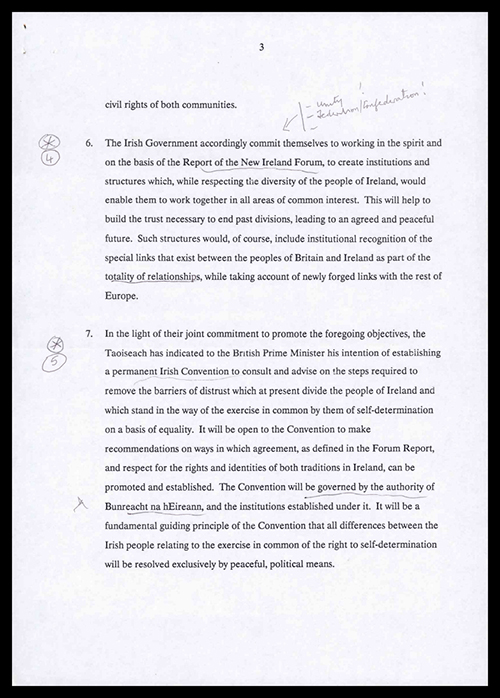
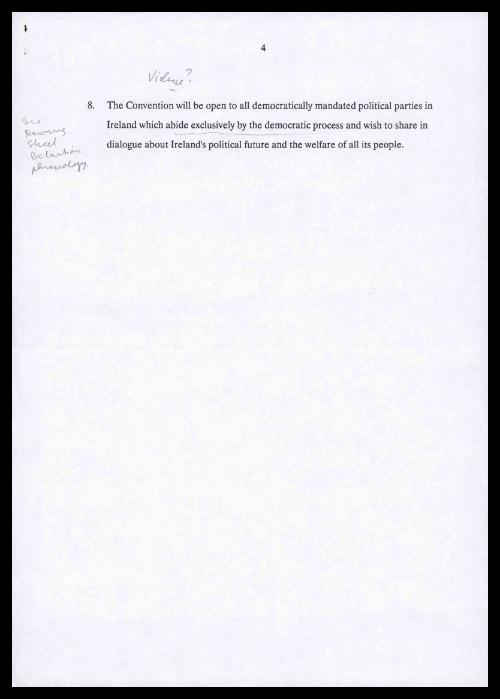
MacSwiney, Mary (1872–1942), was born in London on 27 March 1872. She returned to Ireland with her family when six years old and was educated locally in Cork. She worked briefly at private schools in England and France before studying for the University Teaching Diploma at Cambridge and working at Hillside Convent, Farnborough and the Benedictine Convent, Ventnor. On the death of her mother in 1904 she assumed responsibility for the maintenance of the family and took a post at St Angela’s Ursuline High School in Cork, of which she was a past pupil and where she remained until dismissed in 1916 for her republican sympathies.
She was a founder member of Cumann na mBan in Cork and was National Vice-President of the organisation for many years. After her dismissal from her teaching post in 1916, she and her sister Annie founded Scoil Íte, modelled on St Enda's School, and she remained involved with the school for the rest of her life. She represented the Cork constituency in Dáil Éireann after the death of her brother Terence MacSwiney on hunger strike, and gave evidence in Washington before the American Commission on conditions in Ireland. Virulently anti-Treaty, MacSwiney was interned and went on hunger strike twice in November 1922 and April 1923 (the former a twenty-four-day hunger strike) and succeeded in embarrassing the government into releasing her from prison. She remained true to her ideals, broke with Eamon de Valera and Fianna Fáil over entry to Dáil Éireann, and continued to promote the republican position.
The papers of Mary MacSwiney held in UCD Archives include a file P48a/193 containing letters relating to her participation in hunger strikes while imprisoned in Mountjoy prison, Dublin and the subsequent refusal of the Catholic Church to administer the Sacrament to her. The letter below, dated 5 November [1922], was written by MacSwiney on the second day of her hunger strike in November 1922 and addressed to the Archbishop of Dublin. MacSwiney protests the refusal of the prison chaplain to administer the Sacrament of Holy Communion to her and argues her case to be permitted to receive the Sacraments: “I ask your Grace, are you going to take it on your conscience to deprive me these days of suffering and in the event of my death of the help of Communion”.
UCDA P48a/193 Papers of Mary MacSwiney. Letter from Mary MacSwiney to Archbishop of Dublin, 5 November [1922].
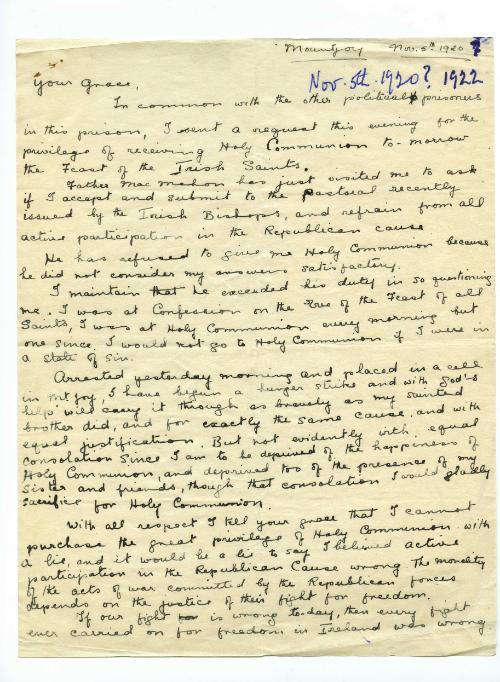
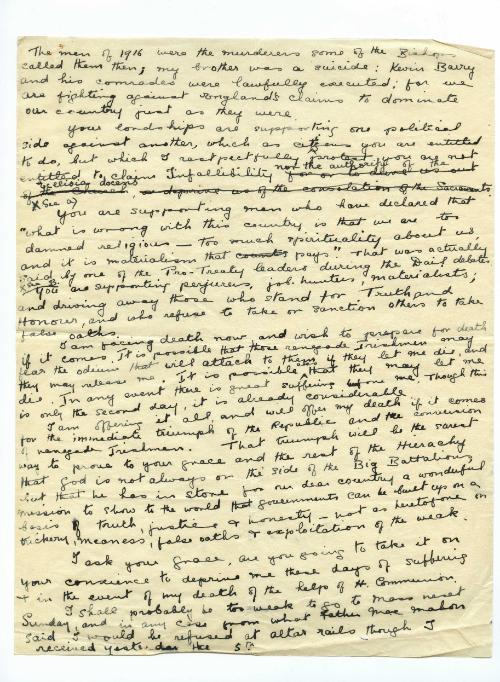
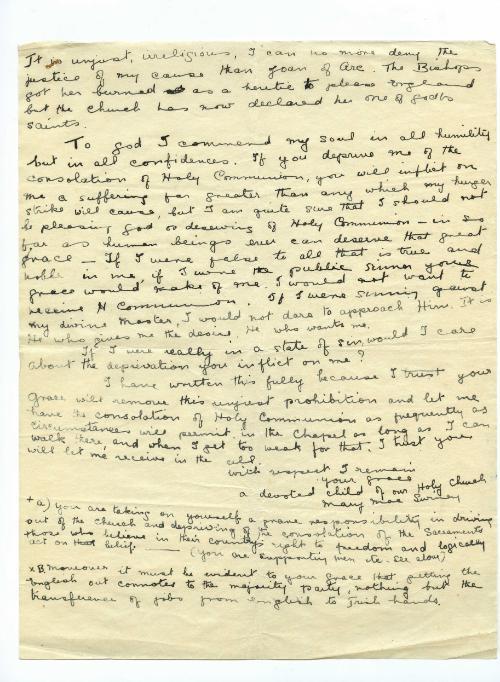
Mountjoy Nov 5th 1920 [1922?]
Your Grace,
In common with the other political prisoners in this prison, I sent a request this evening for the privilege of receiving Holy Communion to-morrow the Feast of the Irish Saints.
Father Mac Mahon has just visited me to ask if I accept and submit to the Pastoral recently issued by the Irish Bishops, and refrain from all active participation in the Republican cause.
He has refused to give my Holy Communion because he did not consider my answer satisfactory.
I maintain that he exceeded his duty in so questioning me. I was at Confession on the Eve of the Feast of All Saints, I was at Holy Communion every morning but one since. I would not go to Holy Communion if I were in a state of sin.
Arrested yesterday morning and placed in a cell in Mt Joy [sic], I have begun a hunger strike and with God’s help will carry it through as bravely as my sainted brother did, and for exactly the same cause, and with equal justification. Bot not evidently with equal consolation since I am to be deprived of the happiness of Holy Communion, and deprived too of the presence of my sister and friends, though that consolation I would gladly sacrifice for Holy Communion.
With all respect I tell your Grace that I cannot purchase the great privilege of Holy Communion with a lie, and it would be a lie to say I believed active participation in the Republican Cause wrong. The morality of the acts of war committed by the Republican forces depends on the justice of their fight for freedom.
If our fight is wrong to-day, then every fight ever carried on for freedom in Ireland was wrong.
The men of 1916 were the murderers some of the Bishops called them then; my brother was a suicide: Kevin Barry and his comrades were lawfully executed: for we are fighting against England’s claims to dominate our country just as they were.
Your lordships are supporting one political side against another, which as citizens you are entitled to do, but which I respectfully protest you are not entitled to claim Infallibility nor authority of the Ecclesia docens.
*see a)
You are supporting me who have declared that “what is wrong with this country is that we are too damned religious – too much spirituality about us and it is materialism that pays”. That was actually said by one of the Pro-Treaty leaders during the Dail debates.
*see b)
You are supporting perjurers, job hunters, materialists; and driving away those who stand for Truth and Honour, and who refuse to take or sanction others to take false oaths.
I am facing death now and wish to prepare for death if it comes. It is possible that those renegade Irishmen may fear the odium that will attach to them if they let me die, and they may release me. It is possible also that they may let me die. In any event there is great suffering before me. Though this is only the second day, it is already considerable.
I am offering it all and will offer my death if it comes for the immediate triumph of the Republic and the conversion of renegade Irishmen. That triumph will be the surest way to prove to your Grace and the rest of the Hierarchy that God is not always on the side of the Big Battalions, but that he has in store for our dear country a wonderful mission to show to the world that governments can be built up on a basis of truth, justice and honesty – not as heretofore on trickery, meaness [sic], false oaths and exploitation of the weak.
I ask your Grace, are you going to take it on your conscience to deprive me these days of suffering and in the event of my death of the help of Communion.
I shall probably be too weak to go to Mass next Sunday, and in any case from what Father Mac Mahon said I would be refused at alter rails though I received yesterday the 5th.
It is unjust, irreligious, I can no more deny the justice of my cause than Joan of Arc. The Bishops got her burned as a heretic to please England but the church has declared her one of God’s saints.
To God I commend my soul in all humility but in all confidence. If you deprive me of the consolation of Holy Communion, you will inflict on me a suffering far greater that any which my hunger strike will cause, but I am quite sure that I should not be pleasing God or deserving Holy Communion – in so far as human beings ever can deserve that great grace – If I were false to all that is true and noble in me, if I were the public sinner your Grace would make of me I would not want to receive H. Communion. If I were sinning against my divine Master, I would not dare to approach Him. It is he who gives me the desire, He who want me.
If I were really in a state of sin, would I care about the deprivation you inflict on me?
I have written this fully because I trust your Grace will remove this unjust prohibition and let me have the consolation of Holy Communion as frequently as circumstances will permit in the Chapel as long as I can walk there, and when I get too weak for that, I trust you will let me receive in the cell.
With respect I remain
Your Grace
A devoted child of our Holy Church
Mary MacSwiney
*a) You are taking on yourself a grave responsibility in driving out of the Church and depriving of the consolation of the sacraments those who believe in their country’s right to freedom and logically act on their belief _____________ (You are supporting men etc. see above)
*B) Moreover it must be evident to your Grace that getting the English out connotes to the majority party, nothing but the transference of jobs from English to Irish hands.
The Papers of Eamon de Valera held in UCD Archives contain a series of documents from 1922 and 1923 on the reorganisation of Sinn Féin, peace moves and ceasefire.
UCDA P150/1823 is a copy of draft ‘Proposed Terms of Settlement (7 May 1923) proposed by de Valera on behalf of the Combined Republican Government and Army Council’ during the peace negotiations sponsored by Senators Andrew Jameson and James Douglas. Included with the draft is a holograph covering note dated ten years later (23 September 1933) to de Valera from Frank Aiken, Minister for Defence, commenting on the enclosed copies of the draft proposals − ‘Paragraph D of attached page is the important one to stress in present circumstances. The terms of settlement were approved unanimously by the Executive of the I.R.A. who were free at the end of the Civil War. Copies were sent to all units in the country and to all jails and camps and not a single protest was received although we were in Daily communications with the prisoners’.
UCDA P150/1823 Papers of Eamon de Valera. Reproduced by kind permission of UCD-OFM Partnership.
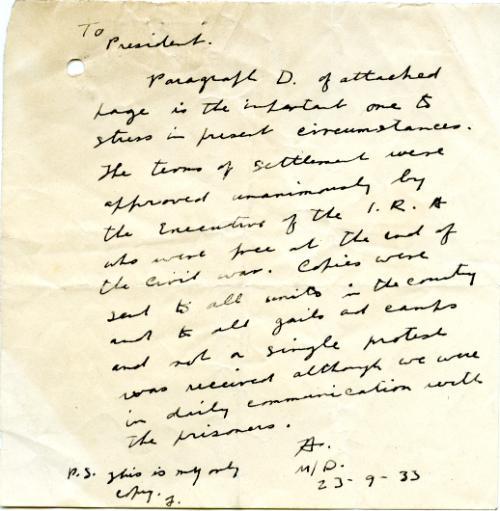
To President
Paragraph D of attached page is the important one to stress in present circumstances. The terms of the settlement were approved unanimously by the executive of the I.R.A. who were free at the end of the Civil War. Copies were sent to all units in the country and to all jails and camps and not a single protest was received although we were in daily communication with the prisoners.
A[iken]
M/D [Minister of Defence]
23-9-33
PS This is my only copy. F.
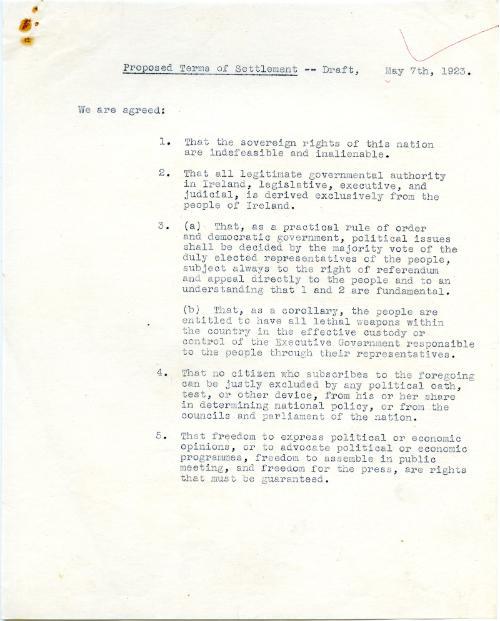
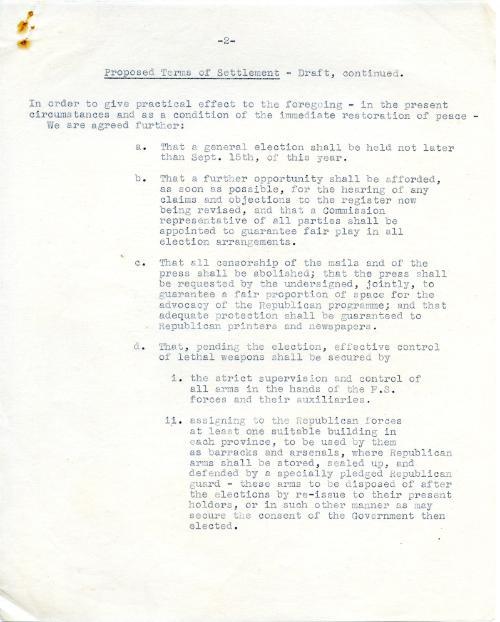
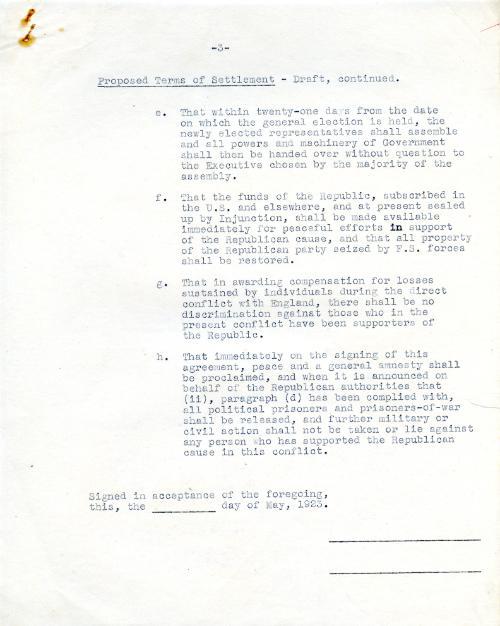
The papers of Sighle Humphreys held in UCD Archives contain documents relating to the O’Rahilly, Humphreys and O’Donoghue families, as well as documents relating directly to the life and activities of Sighle Humphreys. Within the series of documents relating to the O’Rahilly Family is the correspondence of Nancy (Nannie) Browne O’Rahilly, the American born wife of The O’Rahilly.
UCDA P106/87 is a letter from Nannie during a visit to the United States to her sister-in-law Anna O’Rahilly in Ireland. In this interesting piece of social commentary Nannie describes her stay with her sister Madeline Browne in Long Island, saying that she had an awful trip to America. She comments that her sister is now a nervous wreck because she can no longer afford a servant and must do all of her own work; and notes that the people in America live 'at such high tension'. She complains of the lengthy procedure in having to obtain signatures from the American Consul in Dublin before she could open a bank account. She notes that Eamon de Valera came to visit. He was 'so delighted to see me', she says, that 'I think he would liked to have embraced me'. She notes that she is going to give a reporter an interview about 'Cumann na mBan and a few incidents of 1916', and complains of depression, wishing she was back in Ireland again.
UCDA P106/87 Papers of Sighle Humphreys. Letter from Nancy Browne O’Rahilly, Long Island, to Anna O’Rahilly, 23 December [c. 1919]
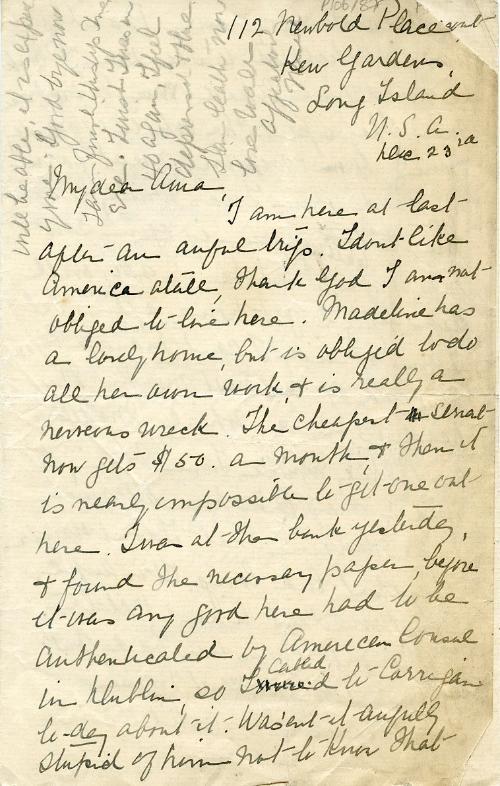
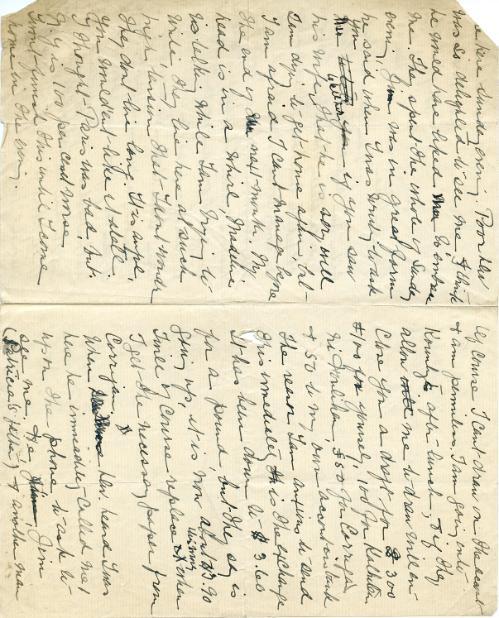
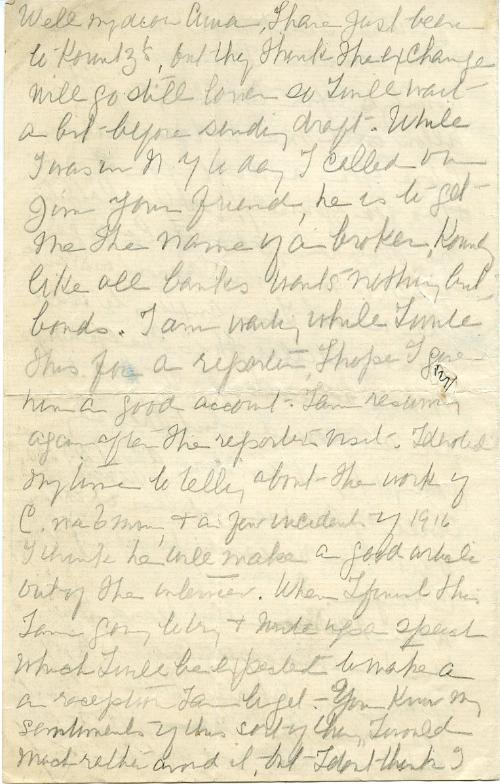
112 Newbold Place
Kew Gardens,
Long Island
U.S.A.
Dec 23ia [1919]
My dear Anna,
I am here at last after an awful trip. I don’t like America atall [sic], thank God I am not obliged to live here. Madeline has a lovely home, but is obliged to do all her own work, and is really a nervous wreck. The cheapest servant now gets $50 a month, and then it is nearly impossible to get one out here. I was at the bank yesterday, and found the necessary paper, before it was any good here had to be authenticated by American Consul in Dublin, so I called to Carrigan today about it. Wasn’t it awfully stupid of him not to know that. Of course I can’t draw on the account and am penniless. I am going into Kountz’s after lunch, and if they allow me to draw I will enclose you a draft for £300 £100 for yourself, 100 for Kathleen Ni Houlihan, £50 for Carrigan, and 50 to my own account in bank.
The reason I am anxious to send this immediately is the exchange. It has been down at $3.60 for a pound, but they say is going up, it is now about $3.90. I will of course replace this money when I get the necessary paper from Carrigan.
When Dev. heard I was here he immediately called me up on the phone to ask to see me. He, Jim (Patricia’s father) and another man came here Sunday evening. Poor Dev was so delighted to see me, I think he would have liked to embrace me. They spent the whole of Sunday evening. Jim was in great form he said when I was writing to ask you if you saw his wife to tell her that he is very well.
I am dying to get home again, but I am afraid I can’t manage before the end of next month. My head is in a whirl, Madeline is talking while I am trying to write. They live here at such high tension that I don’t wonder they don’t live long. It is awful, you wouldn’t like it at all. I thought Paris was bad, but N. Y. is 100 per cent worse. I won’t finish this until I come home this evening.
Well my dear Anna, I have just been to Kountz’s, but they think the exchange will go still lower so I will wait a bit before sending draft. While I was in N. Y. today I called on Jim your friend, he is to get me the name of a broker. Kountz’s like all banks wants nothing but bonds. I am waiting while I write this for a reporter. I hope I give him a good account. I am resuming again after the reporter’s visit. I devoted my time to telling about the work of C. na bman [sic], and a few incidents of 1916. I think he will make a good article out of the interview. When I finish this I am going to try and write up a speech which I will be expected to make […] You know my sentiments of this sort of thing, I would much rather avoid it, but I don’t think I will be able, it is expected of me. Goodbye now I can finish this up I’ll see. I wish I was now 40 again. I feel depressed and blue. [Slan Leath] now […]
Affectionately,
Nannie
Also included below is a portrait of the O’Rahilly family with The O'Rahilly, Nannie and their three sons, seated on a bench in the garden of 54 Northumberland Road.
UCDA P106/108 Papers of Sighle Humphreys. Group portrait of the O’Rahilly family, [c. 1915]
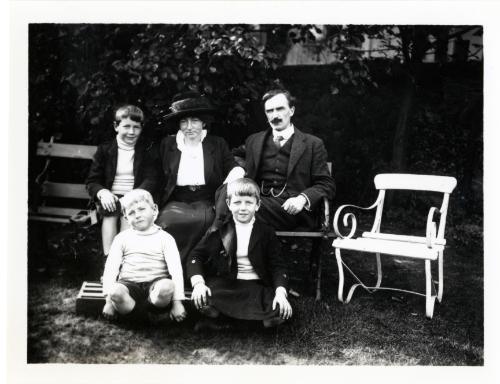
The papers of the Cox Family (1881-1978) were deposited with UCD Archives in 1998. Arthur Cox is probably the most well known member of the family. He was an eminent Dublin solicitor and founder of Arthur Cox Solicitors, and was a friend of many leaders involved in the foundation of the Irish Free State. His father, Michael Cox was also heavily involved in the politics of his day. Many of Michael Cox’s friends were in the Irish Parliamentary Party. He counted John Dillon as one of his closest friends. Michael held many positions of note, including a seat on the senate of the newly established Royal University. He was appointed a member of the Privy Council in 1911—a seat which he later resigned in protest over the failure to implement Home Rule, and in disgust at the actions of the Black and Tans in Ireland. He was a member of the Royal Irish Academy and was elected President of the Royal College of Physicians in 1922. Michael Cox married Elizabeth (Lillie) Cox nee Nolan in 1886. She gave birth to two sons: Aedan in 1887 and Arthur in 1891.
The collection consists predominantly of Michael Cox’s correspondence and some material relating to Arthur. One of the few items in the collection relating to Elizabeth Cox, is a cycling register with entries dating from July 1900 to June 1903. The register contains entries written by Elizabeth regarding cycling holidays taken by the family in Rathmullan and Bundoran, Co. Donegal and Sligo. The notebook contains sections recording those who participated in the cycling, and any observations. It also contains cartoon sketches of two men boxing.
UCDA P162/81 Cox Family Papers. Cycling Register, 31 July 1900–1 June 1903
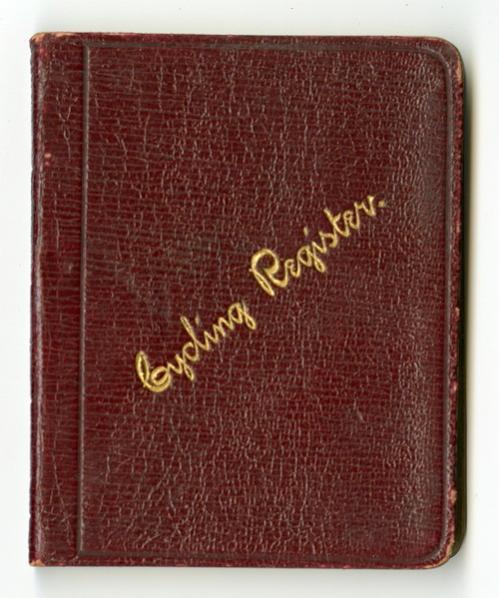
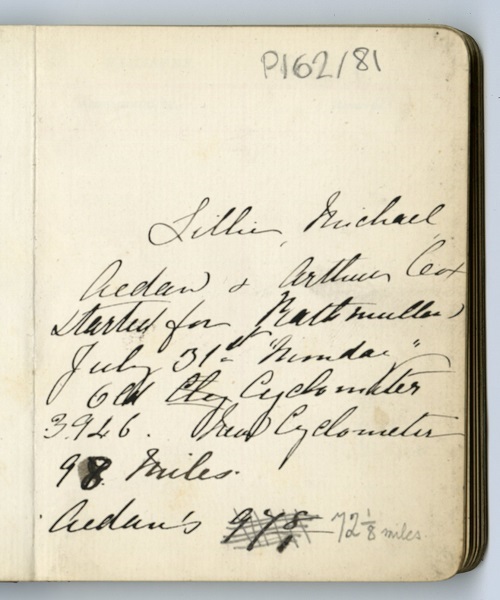
Lillie, Michael, Aedan and Arthur Cox started for Rathmullan, July 31st Monday. Old cyclometer 3.946. New cyclometer 9.8 miles. Aedan’s 72 1/8 miles.
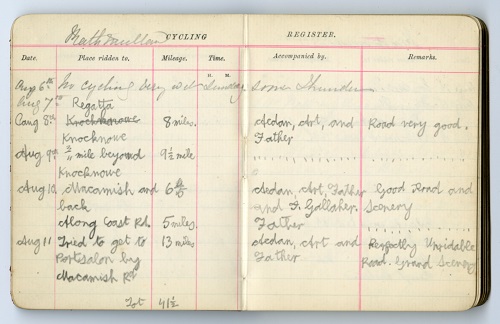
|
Rathmullan CYCLING REGISTER |
|||||
|
Date |
Place ridden to |
Mileage |
Time |
Accompanied by |
Remarks |
|
Aug 6th |
No cycling being very wet Sunday. Some thunder. |
||||
|
Aug7th |
Regatta |
|
|
|
|
|
Aug 8th |
Knocknowe |
8 miles |
|
Aedan, Art and Father |
Road very good |
|
Aug 9th |
¾ mile beyond Knocknowe |
9 1/2 mile |
|
“”””””””””””””””””””” |
“”””””””””””””” |
|
Aug 10 |
Macamish and back |
6 4/5 |
|
Aedan, Art, Father and G. Gallagher |
Good road and scenery |
|
|
Along Coast Rd. |
5 miles |
|
Father |
“”””””””””””””””””””””” |
|
Aug 11 |
Tried to get to Portsalon by Macamish Rd |
13 miles |
|
Aedan, Art and Father |
Perfectly unridable road. Grand scenery |
|
|
Tot |
41 1/2 |
|
|
|
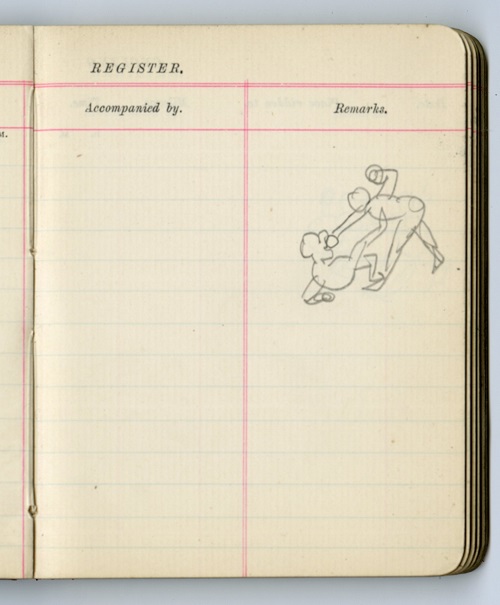
In Memoriam Commandant Seán Finn, 30 March 1921
Seán C. Finn (1889-1921), commandant of the West Limerick Brigade, I.R.A., was born in Rathkeale, County Limerick. Appointed as captain in the Irish Volunteers in 1914, he organised a number of flying columns in West Limerick. One of his numerous contacts in the area was nationalist Mary Ellen Spring Rice who provided a boat to the flying columns to cross the River Shannon. In 1918 Finn was appointed West Limerick Brigade commandant of the Irish Republican Army. On 30 March 1921, Finn was killed in action when his flying column was attacked by the Black and Tans near White River, near Mount Trenchard, the home of Spring Rice.
The small collection of papers of Mary Spring Rice held in UCD Archives contains holograph letters from Spring Rice to her cousin Dorothea Knox and a small amount of other material kept with this correspondence. UCDA P235/33 consists of two printed songs written to memorialise Commandant Seán Finn. It also includes the envelope in which Knox stored them, and on which she has handwritten the circumstances of his death on it.
UCDA P235/33 Papers of Mary Spring Rice. Memoriam of Commandant Seán Finn, 30 March 1921.
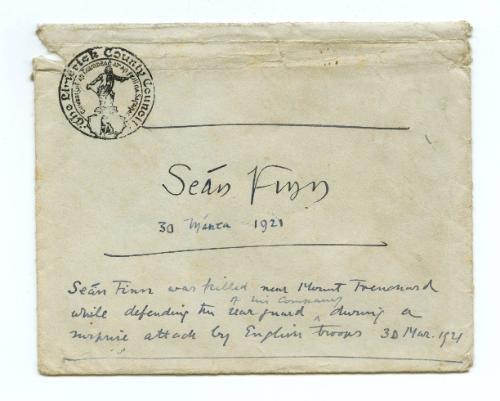
Seán Finn
20 Márta 1921
Seán Finn was killed near Mount Trenchard while defending the rear guard of his company during a surprise attack by English troops 30 Mar. 1921.
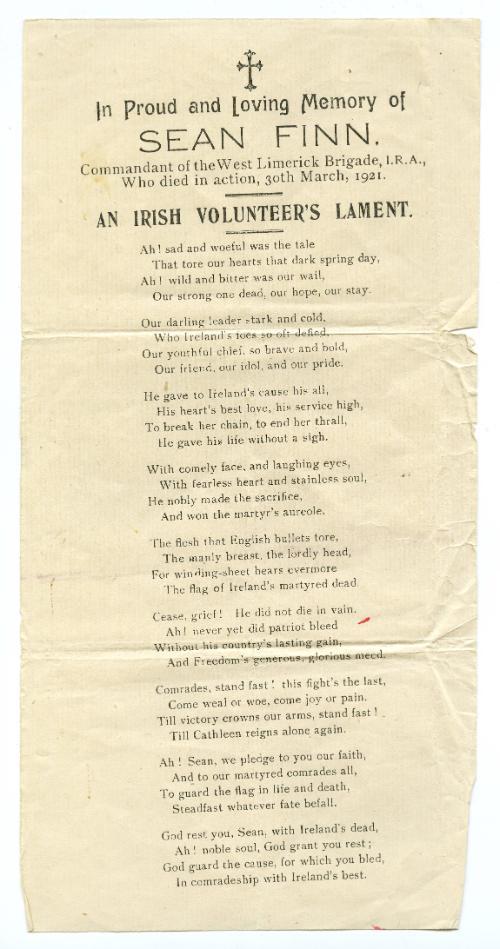
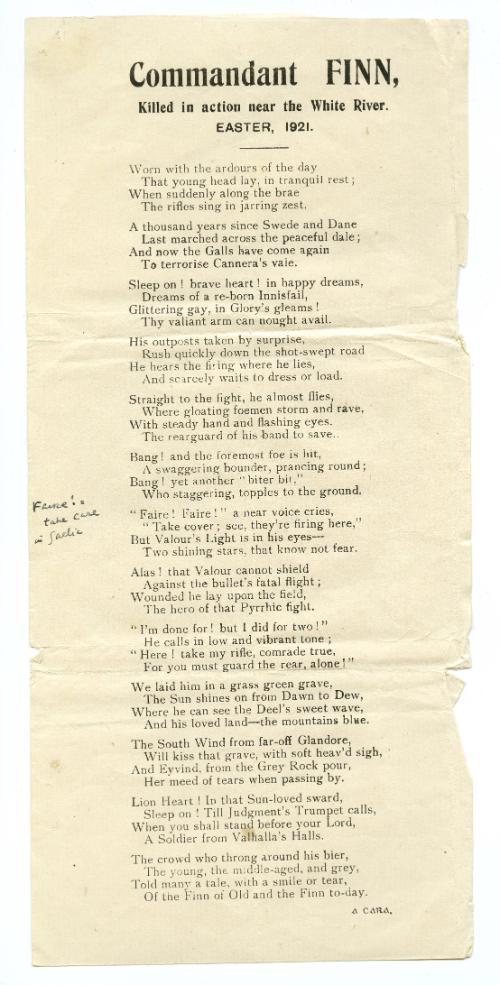
Sighle Humphreys (1899–1994), republican activist, was born in Limerick, the only daughter of Dr David Humphreys and Mary Ellen (‘Nell’) O’Rahilly, sister of Michael Joseph, (The O’Rahilly). Her father died four years after her birth. She had two brothers, one of whom was Richard Humphreys. The family background was uncompromisingly nationalist.
The Humphreys family moved to Dublin in 1909. Humphreys was educated at Mount Anville secondary school, near Dundrum, Co. Dublin, and Lower Leeson Street, Dublin. From 1919–20 she studied French civilisation at the University of Paris. Humphreys learned Irish in early life, becoming a fluent speaker; she paid regular visits to the Kerry Gaeltacht throughout her life.
Sighle's brothers joined the Irish Volunteers, and she participated in pre-1916 Volunteer activities. Humphreys joined Cumann na mBan in 1919 and was active throughout the War of Independence, acting as a courier and carrying out organisational work in Kerry in 1921. On 4 November 1922 Ernie O'Malley was captured at the Humphreys house after a shootout in which Sighle Humphreys fired on the Free State forces. The whole family were arrested. Humphreys was imprisoned in the North Dublin Union, Mountjoy, and Kilmainham, spending three months in solitary confinement for participating in a protest; she was released in November 1923 following a hunger strike.
The papers of Sighle Humphreys held in UCD Archives contain documents relating to the O’Rahilly, Humphreys and O’Donoghue families, as well as documents relating directly to the life and activities of Sighle Humphreys. Included are correspondence and memoirs from her imprisonment, 1922–3. The document below is from this period: UCDA P106/1045 Public safety (Emergency Powers Act) No.2, 1923. Order from the Minister for Defence, Richard Mulcahy, to detain Sighle Humphreys under military custody. The order states: “I am of the opinion that public safety would be endangered by the prisoner being set at liberty”.
UCDA P106/1045 Papers of Sighle Humphreys. Order from the Minister for Defence, Richard Mulcahy, to detain Sighle Humphreys in military custody, 8 August 1923.
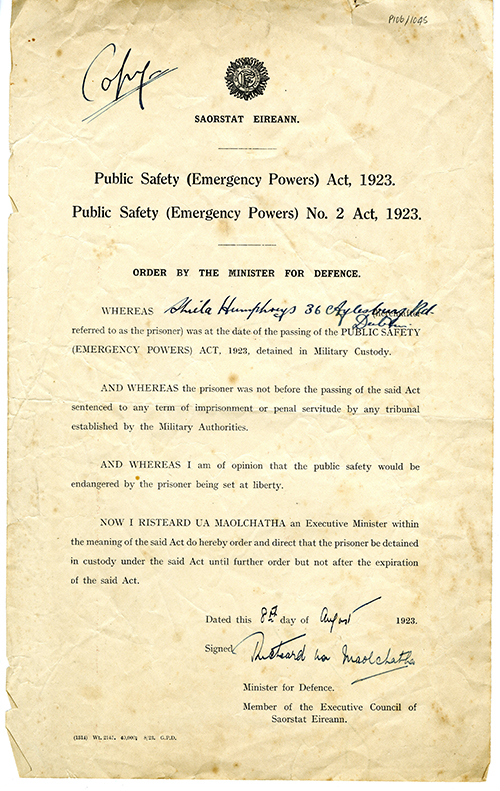
UCDA P106/1022 Papers of Sighle Humphreys. Humphreys pictured in the garden of 14 Herbert Park in [Cumann na mBan] uniform, [c. 1915].
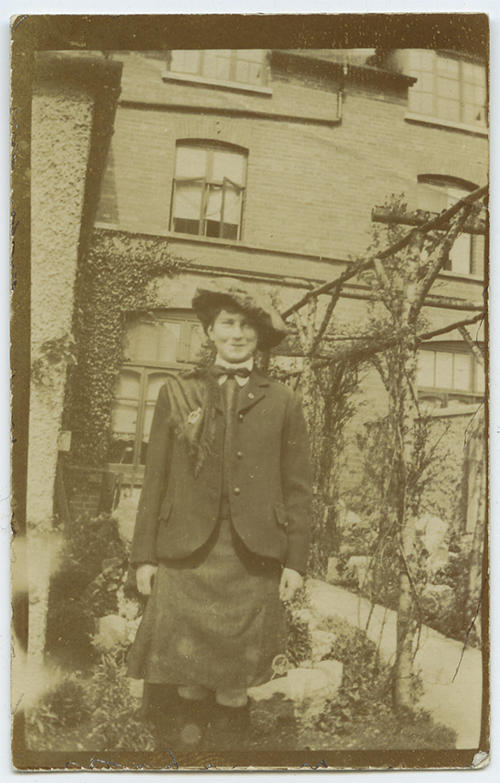
As this month marks one hundred years since the official end of the civil war, it seems fitting to choose a key document from this period.
The Papers of Moss Twomey consist largely of IRA general headquarters archives for the period 1922–36, although the overwhelming bulk of the papers comprises the archives of the Chief of Staff (C/S) and Adjutant General (A/G), 1922–26.
Among the material concerned with C/S orders and directives, the file P69/4 contains copies of general orders, special army orders and orders of the day. These mainly concern the enactment of the cease fire and dump arms orders, with directions for the supervision and checking of dumps. Included here is the order to "O/C's Commands, Divisions & Independent Brigades" entitled: ‘Ceasefire–Dump Arms’ signed by Frank Aiken, Chief of Staff, Irish Republican Army, General Headquarters, Dublin, 24 May 1923.
UCDA P69/4 Papers of Moss Twomey. “Ceasefire–Dump Arms” order, signed by Frank Aiken, IRA, GHQ, 24 May 1923.
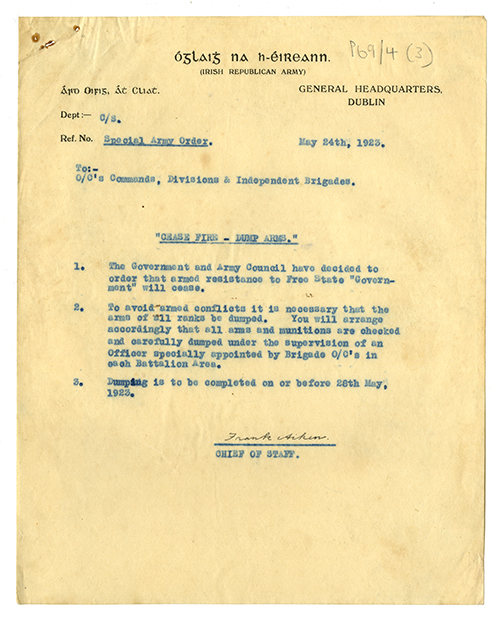
The papers of Desmond and Mabel Fitzgerald held in UCD Archives, contain several documents relating to Ernie O’Malley, assistant chief of staff of the Anti-Treaty IRA, and the Civil War. O'Malley was captured (and badly wounded) by Free State forces in Dublin in November 1922.
Imprisoned until July 1924, he was during the period of his incarceration elected as a TD for Dublin North in the 1923 general election, and was also a forty-one-day participant in the republican hunger strike later in that year.
UCDA P80/313 contains six items in total. These include a letter from Mrs Marion K. O’Malley, St Kevin’s, Iona Drive, to Desmond Fitzgerald, drawing his attention to the transfer of her severely injured son, Ernie, wounded during his capture on 4 November, from the hospital wing to A wing Mountjoy. Mrs O’Malley expresses the fear that such treatment would kill him, and asks FitzGerald to enquire into the matter.
The file also includes a copy report by the Medical Officer, Mountjoy, detailing the rapid
improvements in O’Malley’s condition; and a copy letter from FitzGerald apprising Mrs O’Malley of her son’s recovery.
UCDA P80/313 Papers of Desmond and Mabel Fitzgerald. Correspondence between Mrs Marion K. O’Malley and Desmond Fitzgerald, 15–22 May 1923.
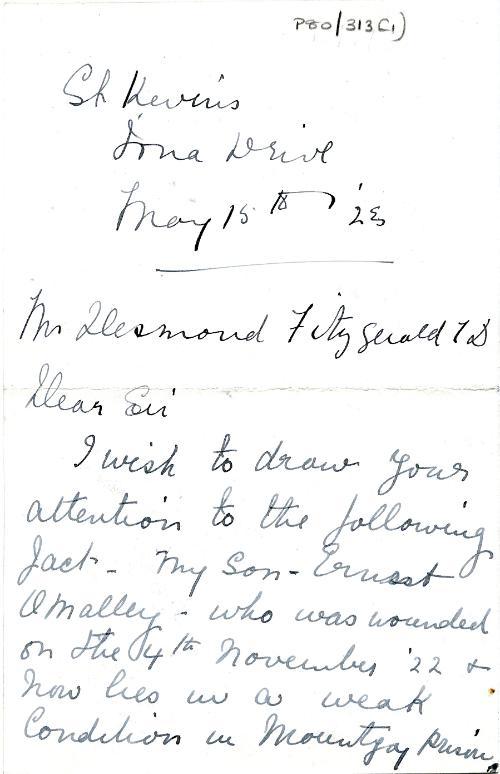
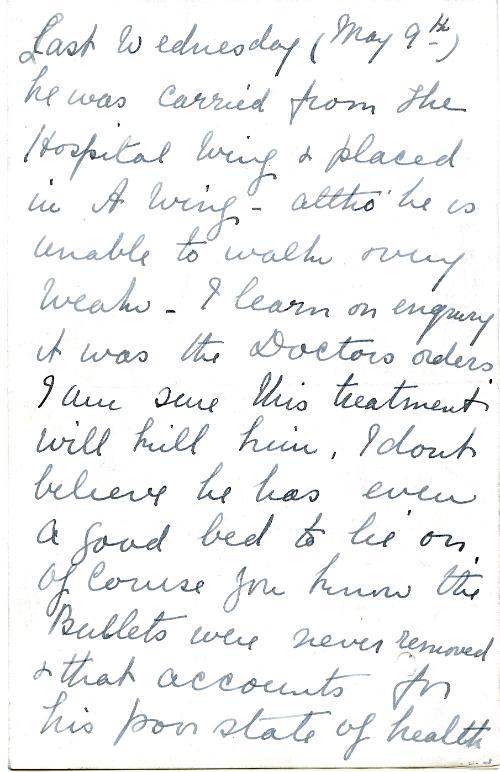
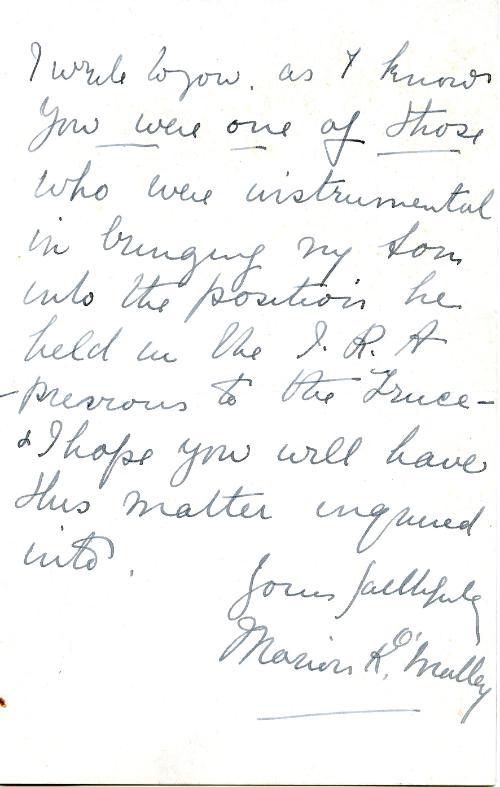
St Kevin’s
Iona Drive
May 15 th 1923
Mr Desmond Fitzgerald TD
Dear Sir
I wish to draw your attention to the following fact—my son—Ernest O’Malley—who was wounded on the 14th November ‘22 & now lies in a weak condition in Mountjoy Prison last Wednesday (May 9th ) he was carried from the Hospital wing & placed in A wing—altho' he is unable to walk & very weak—I learn on enquiry it was the Doctors orders. I am sure this treatment will kill him, I don’t believe he has even a good bed to lie on. Of course you know the bullets were never removed & that accounts for his poor state of health. I wish to know as I know you were one of those who were instrumental in bringing my son into the position he held in the I.R.A.—previous to the Truce—& I hope you will have this matter enquired into.
Yours faithfully
Marion K O.Malley
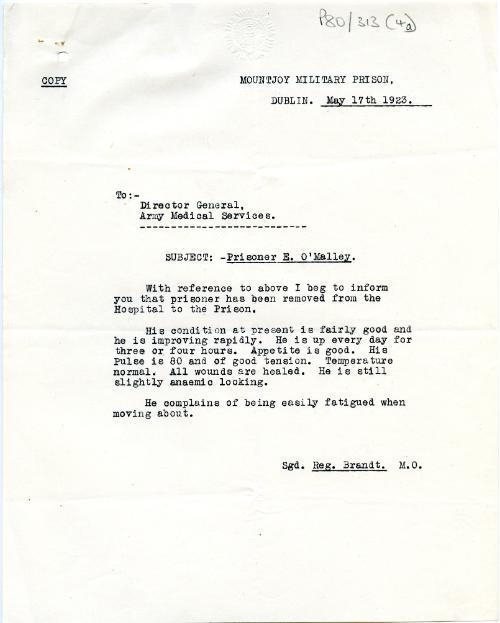
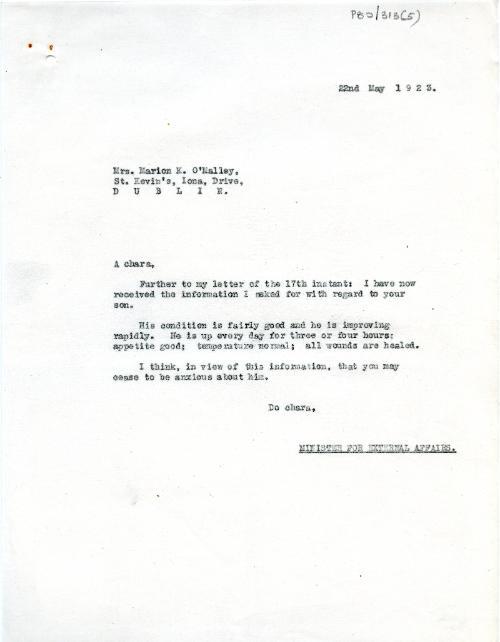
The Papers of Desmond and Mabel Fitzgerald held in UCD Archives, contain a series of documents on Government policy and the conduct of the Civil War. UCDA P80/724 is a copy of a confidential memorandum from Kevin O’Higgins, Minister for Home Affairs, sent to each member of the Executive Council. The memorandum advises that the Government was not justified in refusing to supply arms to citizens to defend themselves against attack by Anti-Treaty forces. O’Higgins advocates a trial self-defence scheme for the Dublin area, suggesting that the government place an advertisement in the press offering to consider applications for weapons from people permanently resident in the city. Applications must be accompanied by recommendations from such people as clergy, army officers, T.D.’s, civil servants and so on, and applicants must undertake to use the weapon only in protection of his (sic) own, or his neighbour’s life and property.
Included with the memorandum is a rough draft of the proposed advert.
UCDA P80/724 Papers of Desmond and Mabel Fitzgerald. Confidential memorandum from Kevin O’Higgins, Minister for Home Affairs, to each member of the Executive Council [1922/3]
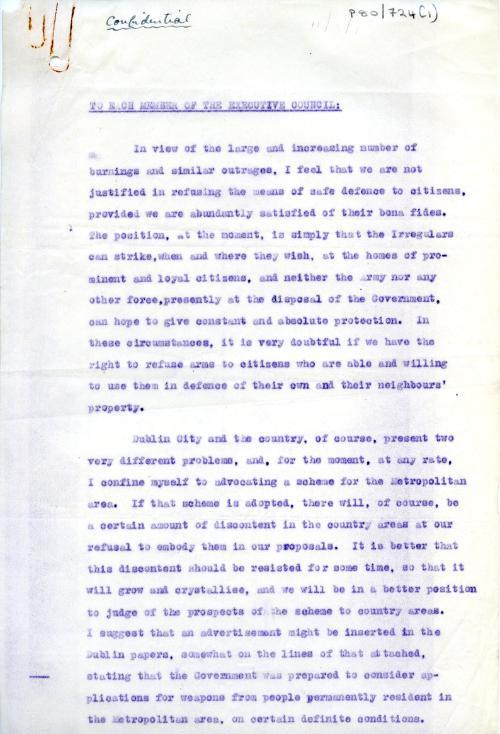
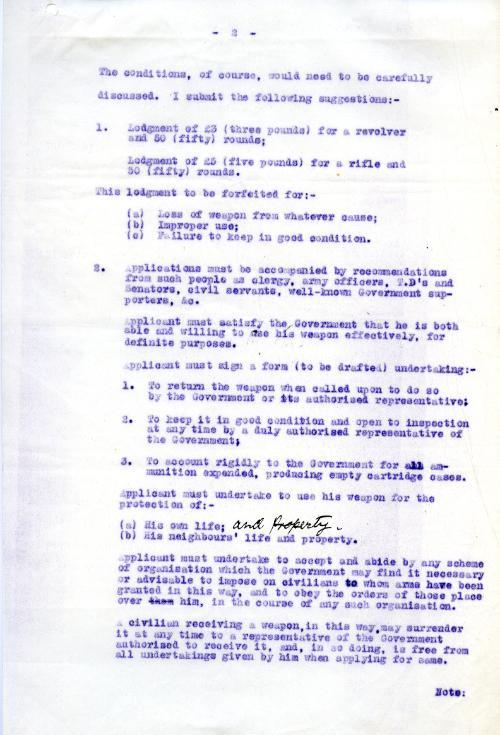
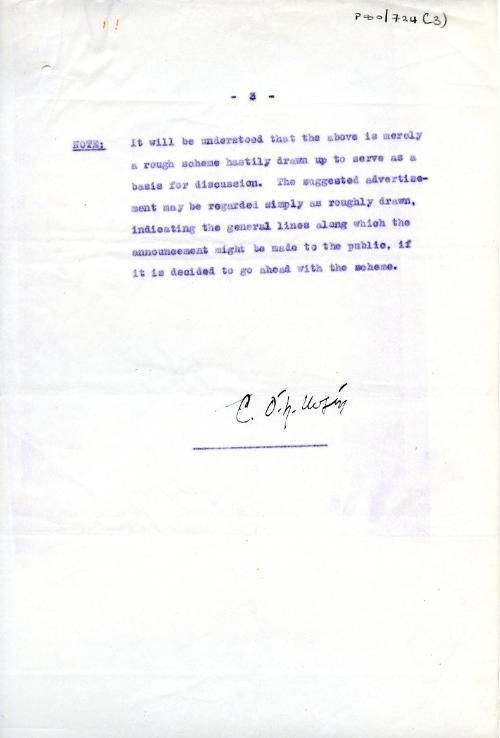
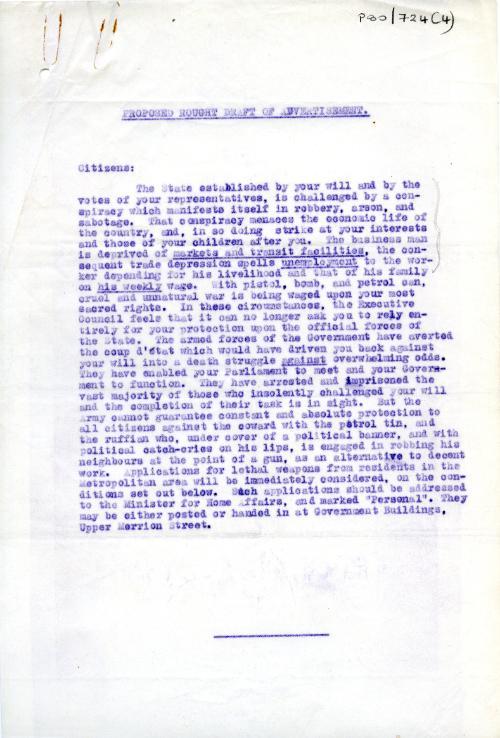
The Papers of Hugh Kennedy held in UCD Archives, include copies of various print publications and newspaper cuttings concerning events in Ireland during the Civil War. UCDA P4/1905 is a file of newspaper cuttings from 1923, many of which include photographs, concerning the Civil War and Irregular activities particularly with reference to the destruction of property including the home of Michael A. Corrigan (Chief State Solicitor), Sir Horace Plunkett and others. The cuttings below concern Michael Corrigan and Hugh Kennedy.
UCDA P4/1905 Papers of Hugh Kennedy. File of Newspaper Cuttings, 1923.
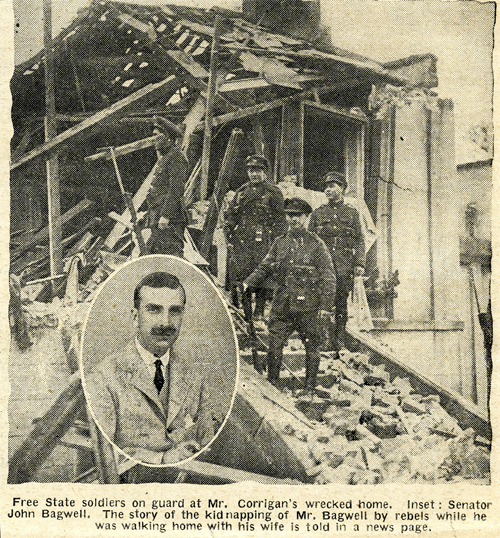
Daily Sketch, 1 February 1923: image of the destroyed house belonging to the Chief State Solicitor Michal A. Corrigan. Free State soldiers stand outside.
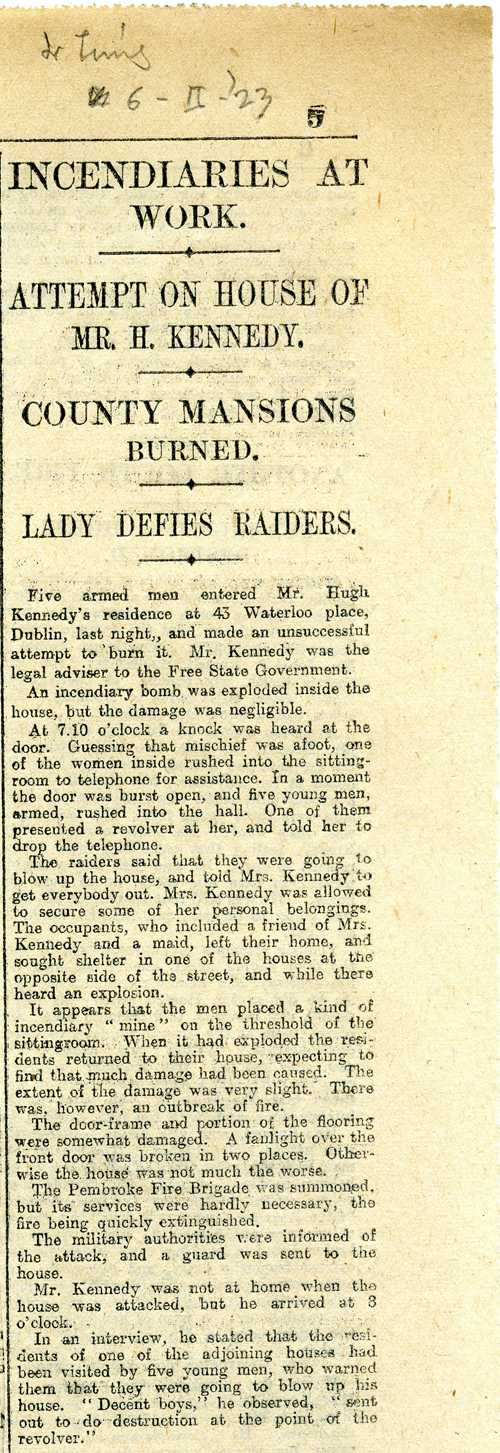
Irish Times, 6 February 1923: report of the attempted destruction of Hugh Kennedy’s residence.
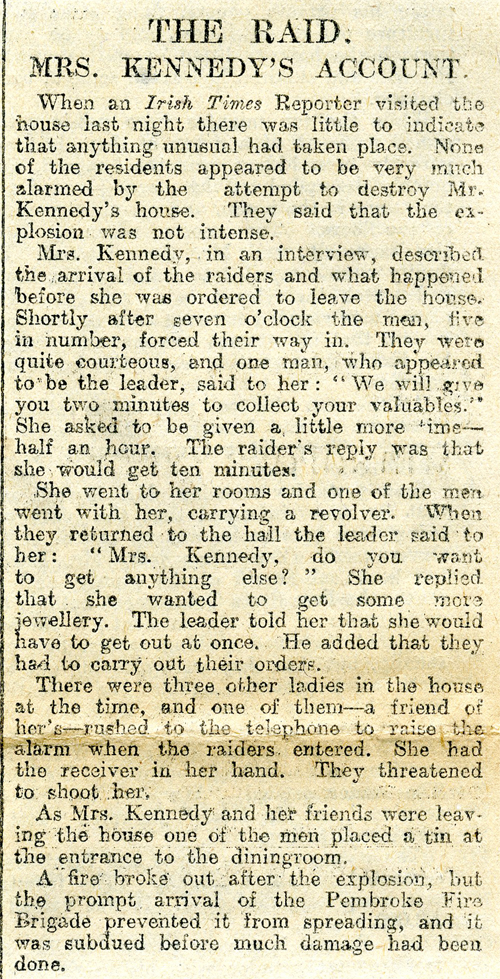
Irish Times, 6 February 1923: Mrs Clare Kennedy’s account of the attack on their home.
"The Annals are a chronicle of Irish history from A.M. 2242 to A.D. 1616 and contain records under successive years of the deaths of kings and other prominent persons, both ecclesiastical and lay, along with accounts of battles, plagues, etc. They end with the death of Hugh O’Neill, earl of Tyrone, in 1616. The compilation was largely derived from older manuscripts, many of which have not survived.
Two complete autograph copies were made: one for Fearghal Ó Gadhra, Lord of Coolavin and Member of Parliament for Sligo in 1634, and one for the Franciscans at the Irish College of St Anthony, Louvain. The autograph manuscripts are all now in Dublin, in three separate archives.
-
A.M. 2242-A.D. 1169: University College Dublin UCD-OFM A 13
-
A.M. 2242-A.D. 1171: Royal Irish Academy C iii 3
-
A.D. 1170-1499: Royal Irish Academy 23 P 6
-
A.D. 1500-1616: Royal Irish Academy 23 P 7
-
A.D. 1334-1605 (and 1616 fragment): Trinity College Dublin 1301
The volume in UCD (Franciscan A 13) and two in the Academy (RIA 23 P 6-7) are considered to constitute the Louvain set."
Text from RIA blog: Annals of the Four Masters.
Annals of the Four Masters, UCD-OFM MS A13 | C17th | Paper | 28cm × 19 cm | f1r
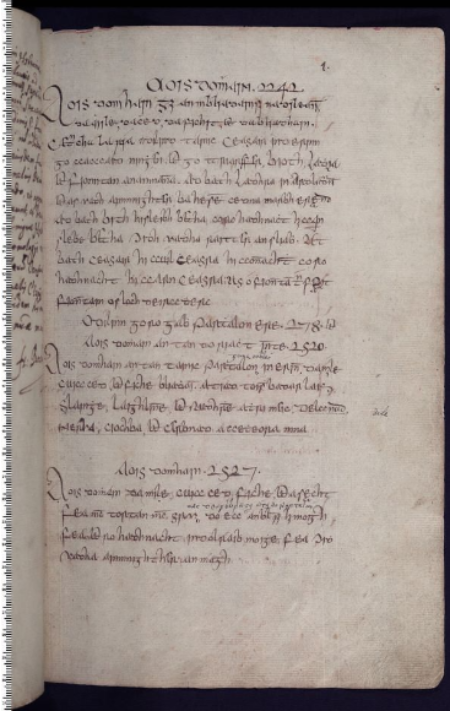
Image: ISOS
AOIS domhain gus an m-bliadhoin-si na dileand, da mhile da chéad da fichęt ⁊ da bhliadhoin.
Ceathracha la ria n-dilinn tainig Ceasoir go h-Eirinn, go c-caogaid n-inghęn, ⁊ go t-triar b-fęr, Bioth, Ladhra, ⁊ Fiontoin a n-anmanna. Ad-bath Ladhra i n-Ard Ladhrann, ⁊ as uadh ainmnighthęr. Ba h-ęisidhe cędna marbh Erionn. At-bath Bioth i Slebh Bętha, co ro h-adhnacht i c-Carn Slebhe Bętha, conadh uadh raitior in sliabh. At-bath Ceasoir i c-Cuil Cęsra h-i c-Condachtaibh, go ro h-adhnacht h-i c-Carn Cęsra. Is ó Fiontoin tra Feart Fiontoin os Loch Dęirgdeirc.
O Dilind go ro gabh Parthalon Ere 278, acus aois domhain an tan do-riacht inte 2520.
Aois domhain an tan tainig Parthalon i n-Erinn, dá mile cuicc céd ⁊ fiche bliadhoin. At iad na toisigh badar lais, Slainge, Laighlinne ⁊ Rudhruidhe, a trí męic, Dealccnat, Nerbha, Ciocbha, ⁊ Cęrbnad a c-cętheora mna.
Aois domhain, da mile cuig céd fiche a sęcht.
Fea mac Torton, mic Srú do ég an bliadhoin-si h-i Muigh Fea, ⁊ ro h-adhnacht i n-Dolroibh Moighe Fea, conadh uadha ainmnighthear an magh.
Transcription from CELT: Corpus of Electronic Texts
The Age of the World, to this Year of the Deluge, 2242.
Forty days before the Deluge, Ceasair came to Ireland with fifty girls and three men; Bith, Ladhra, and Fintain, their names. Ladhra died at Ard Ladhrann, and from him it is named. He was the first that died in Ireland. Bith died at Sliabh Beatha, and was interred in the carn of Sliabh Beatha, and from him the mountain is named. Ceasair died at Cuil Ceasra, in Connaught, and was interred in Carn Ceasra. From Fintan is named Feart Fintain, over Loch Deirgdheirc.
From the Deluge until Parthalon took possession of Ireland 278 years; and the age of the world when he arrived in it, 2520.
The age of the world when Parthalon came into Ireland, 2520 years. These were the chieftains who were with him: Slainge, Laighlinne, and Rudhraidhe, his three sons; Dealgnat, Nerbha, Ciochbha, and Cerbnad, their four wives.
The Age of the World, 2527.
Fea, son of Torton, son of Sru, died this year at Magh Fea, and was interred at Dolrai Maighe Fea; so that it was from him that the plain is named.
Translation from CELT: Corpus of Electronic Texts
Copy of letter from Eamon de Valera to Joseph McGarrity [Clan na Gael leader, Bond Drive organiser and founder of The Irish Press of Philadelphia] from a file of correspondence between de Valera [or members of the Irish Diplomatic Mission] to McGarrity on a wide range of matters including de Valera’s opinions following the issue of a Cease Fire and Dump Arms order by Frank Aiken on 24 May and de Valera’s statement conceding defeat in the Civil War. The document below states: ‘There is no other course open. The war could only be continued on our side by resorting to brutalities which in the end would only bring disgrace to our cause and ruin its future…We have to concentrate just now on re-organisation and the shepherding of our men back to civil employment.…This latter will be extremely difficult—The country is economically in a very bad condition’. McGarrity is asked to ‘try and unite all forces over there under the relief banner’ (4 June 1923, 2pp).
UCDA P150/1161 Papers of Eamon de Valera. Reproduced by kind permission of UCD-OFM Partnership
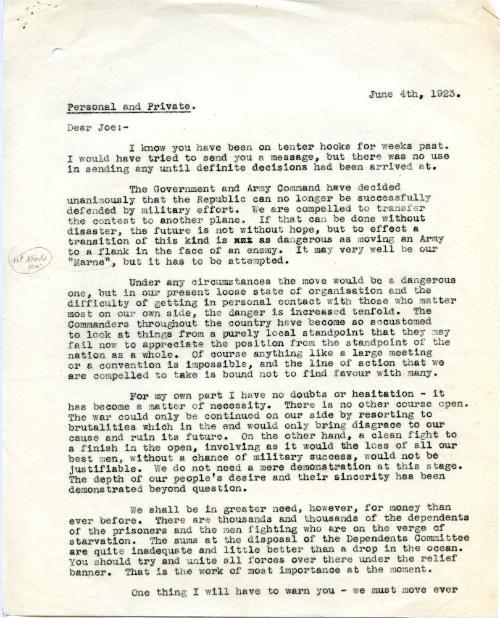
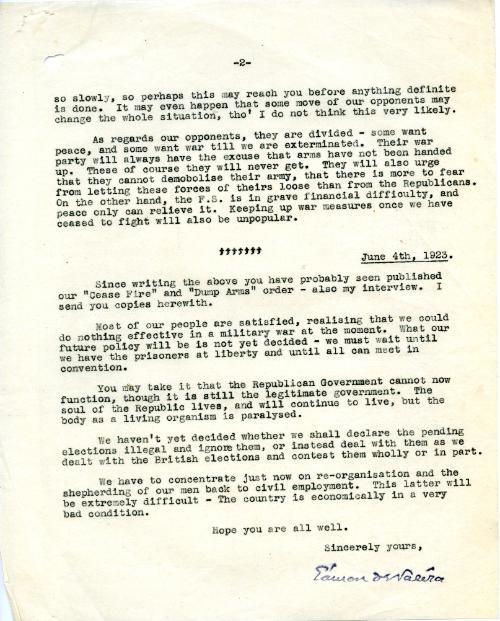
Hugh Kennedy, a senior legal adviser to the representatives of Dáil Éireann during the negotiations for the Anglo-Irish treaty, became the first Attorney General in the Provisional Government of the Irish Free State on 31 January 1922. He was appointed by the Provisional Government to the Constitution Commission to draft the constitution of the Irish Free State. Following the establishment of the Irish Free State on 6 December 1922, the functions of the Provisional Government were transferred to the Executive Council. Kennedy was appointed Attorney General on 7 December 1922.
The Executive Countil was concerned about the activity of irregulars at the beginning of the new state. (Irregular was a term used by the Free State for its republican opponents.) This handwritten draft (in Kennedy's hand) and typescript copy of a statement describing republican opposition to the Anglo-Irish treaty by [Cumann na mBan], likely written in 1923, the treaty is described as a ‘just and fair compromise’ which was opposed in Ireland by ‘Diehards [who] are women whose extacies at their extremest (sic) can find no outlet so satisfying as destruction... Weak men in their atmosphere seek peace in concurrence with their frenzy and even children are exalted by having thrust into their little hands revolvers instead of feeding bottles’.
UCDA P4/548 Papers of Hugh Kennedy. Draft statement by Hugh Kennedy describing republican opposition to the Anglo-Irish treaty by [Cumann na mBan], [1923]
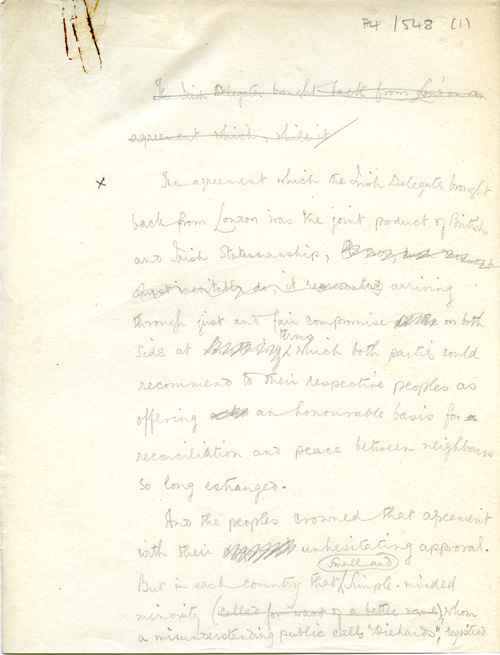
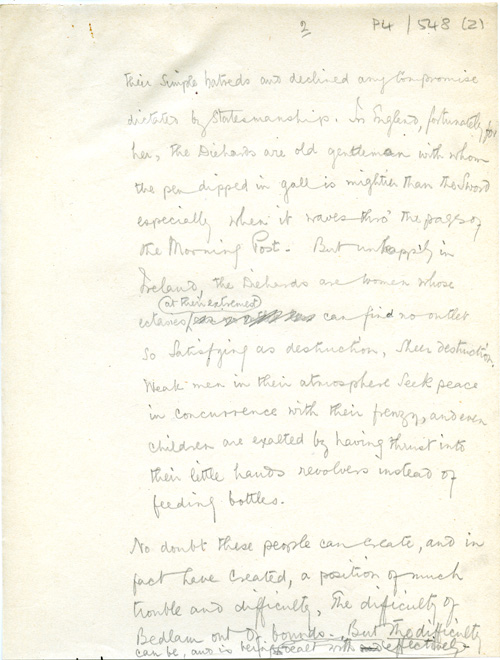
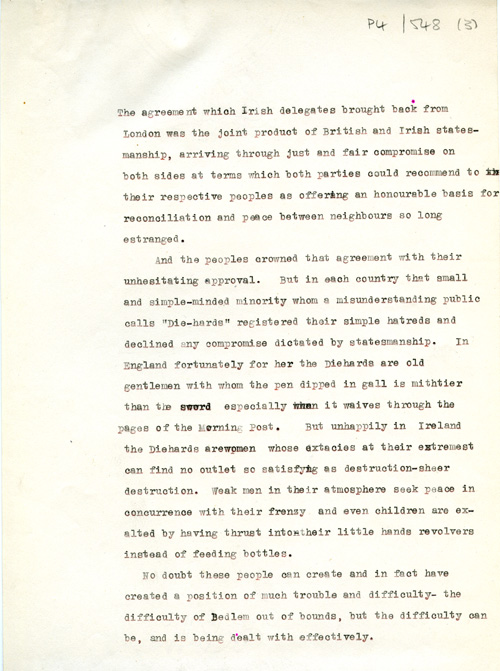
The Papers of Eamon de Valera held in UCD Archives contain a large file of c.151 documents, mainly letters, relating to attempts at reaching agreement to suspend hostilities between pro- and anti-Treaty forces between August 1922 and mid-April 1923.
The file includes is a typescript draft by Michael Comyn S.C. entitled ‘Terms On Which Peace Might Be Arranged’ (no date); memoranda concerning a meeting between P.J. Little and Mrs Norman Thompson, from Sandymount, Dublin ‘a recently converted Unionist with a desire to make peace’ (August 1922); correspondence between de Valera and Professor E[dward] P. Culverwell of Trinity College Dublin concerning Prof. Culverwell’s proposition to ‘enable you to agree to cease all military action against the Treaty…if the Irregulars…will give up their military opposition, the Treatyites should on their side pledge…that if the King’s veto should at any time be exercised at British instigation to defeat any domestic legislation passed by the Irish Free State Houses, they would notify Great Britain that they held that the treaty had been violated and that they therefore also repudiated it and would resist, by force of arms if necessary, any attempt on the part of the King…to enforce such action’ (29 September, 13 October 1922); offer from Seán Ó hUadhaigh to arrange ‘safe conduct for a convention to enable the Republicans to regularise their position’, the aim of the convention being to avoid ‘further bloodshed’ and bring about ‘Peace by Christmas’ (9 & 11 December 1922); correspondence between de Valera and Joseph Connolly [former ConsulGeneral in the U.S.A.] on his efforts to promote peace, including his meetings with Austin Stack and enclosing his ‘Analysis of Some Phases of Existing Situation with Suggestions for a Possible Basis of Peace’ (21 March; 7–26 December 1922); copy letter to Chief of Staff Liam Lynch from Adjutant General Con Maloney enclosing ‘copy of Peace terms said to have been forwarded by some Western Officers’ (19 December 1922); copy of dispatch from Tom Barry to members of the Army Executive enclosing a proposal from the Peace Committee headed by Revd Dr J. Harty Archbishop of Cashel and Barry’s ‘views on the situation created and my reasons for favouring and urging an acceptance of this basis of peace on you. Also my views of what this basis of peace really entails’ (7 March 1923).
The letter below, from this file, is a copy of a typescript letter from Eamon de Valera to Major John E.B. Loftus, 5 West Halkin Street, London, marked 'private', outlining de Valera’s reflections on the civil war, the signing of the Treaty and the possibility of peace (31 October 1922).
UCDA P150/1647 Letter from Eamon de Valera to Major John E.B. Loftus, London. Reproduced by kind permission of UCD-OFM Partnership.
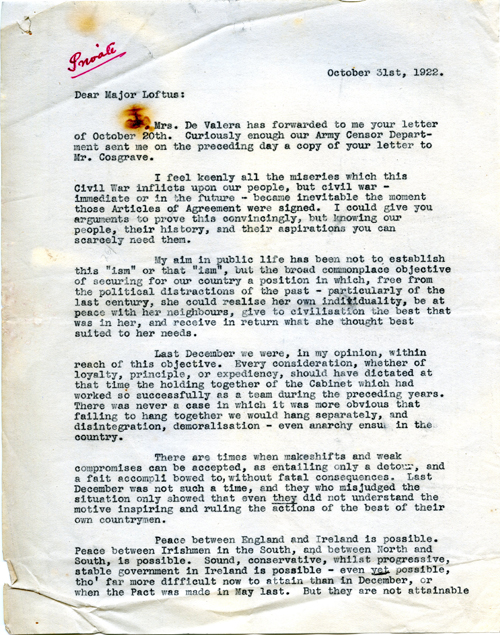
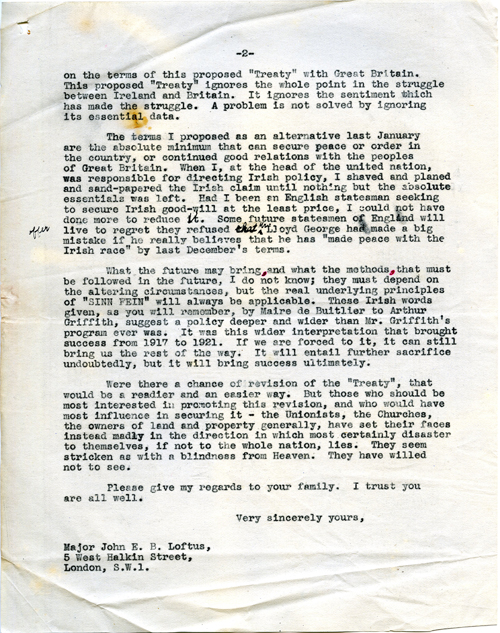
The papers of Eamon de Valera contain a file of documents relating to the mission to Ireland of Monsignor Salvatore Luzio. The documents mostly relate to his efforts to find a basis for peace which would lead to the ending of the Civil War and arrangements for him to meet with de Valera. In addition, Luzio was expected to deal with the complaints of Republicans who were deprived of the sacraments of Confession and Holy Communion.
The file comprises mainly letters to and from de Valera (P) and those acting in the capacity of go-between for the arrangements, namely Mary MacSwiney (M. Nic Shuibhne); Michael Carolan (IRA Director of Intelligence) (MC); Professor Arthur Clery (AC); Cáit O’Kelly (Cáit bean Sheán T., wife of Seán T. O’Kelly); Mrs Kathleen Brugha, widow of Cathal (Cáit bean Chathail); Revd Dr Edward J. Byrne, Archbishop of Dublin (B); Eoin P. Ó Caoimh (EPÓC); Count Plunkett (Count P) and his wife, and Monsignor P. Magennis and Monsignor Hagan. The file also includes some correspondence between de Valera and Luzio.
The document below is a copy of a statement from Brigid Ní Maolain and Nora Connolly O’Brien (noted as an ‘exact copy of the original document’ by [?] Casey and Caitlín Bean Cathal Brugha), addressed to Luzio from women prisoners in Kilmainham Jail protesting against their treatment. They also take issue with the stance of the Irish Roman Catholic Hierarchy towards the prisoners, especially the refusal of some chaplains to administer the Sacraments to them (21 April 1923).
UCDA P150/1809 Papers of Eamon de Valera. Copy of a statement from Brigid Ní Maolain and Nora Connolly O’Brien to Monsignor Salvatore Luzio, 21 April 1923. Reproduced by kind permission of UCD-OFM Partnership.
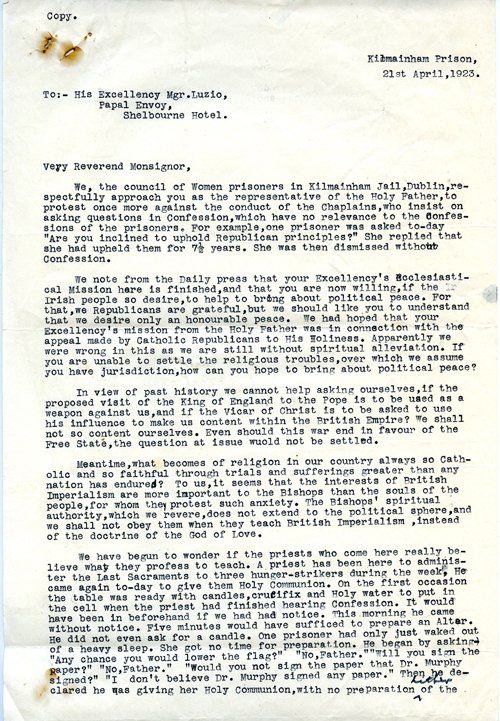
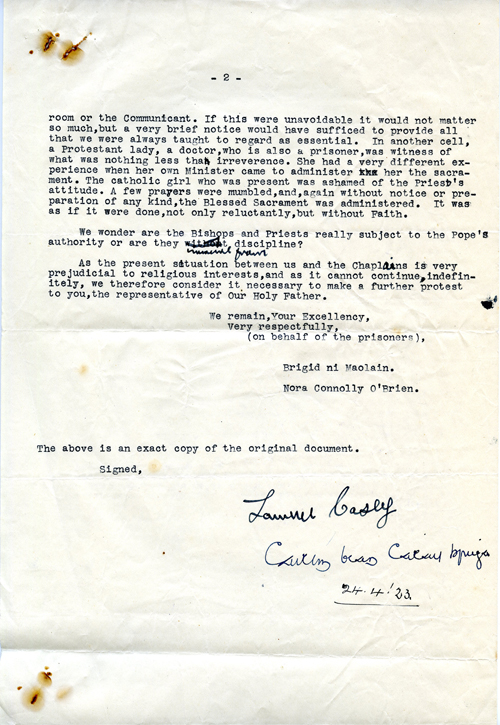
Among the material concerning the Irish Free State and the Civil War held in the Papers of Eoin MacNeill, are reports outlining the conditions and the treatment of prisoners by the Provisional Government of the Irish Free State. These include descriptions of conditions in a number of prisons such as Wellington Barracks where ‘over-crowding and insanitary conditions continue’ and where there is ‘brutal ill-treatment of prisoners’; list of those prisoners wounded or killed within these prisons; Prison News, critical of ‘the latest clumsy experiment in imperial tactics of the Provisional Government- their effort to “divide and conquer” the Republican Ranks.’
Below is a copy of a document entitled ‘Freedom’ describing news from prisons including conditions and the treatment of prisoners by the Provisional Government, a list of those prisoners wounded or killed within these prisons and an account by one prisoner in Custume Barracks Athlone and his experience there.
LA1/P/23 Papers of Eoin MacNeill: Conditions of Republican Prisoners [1923]
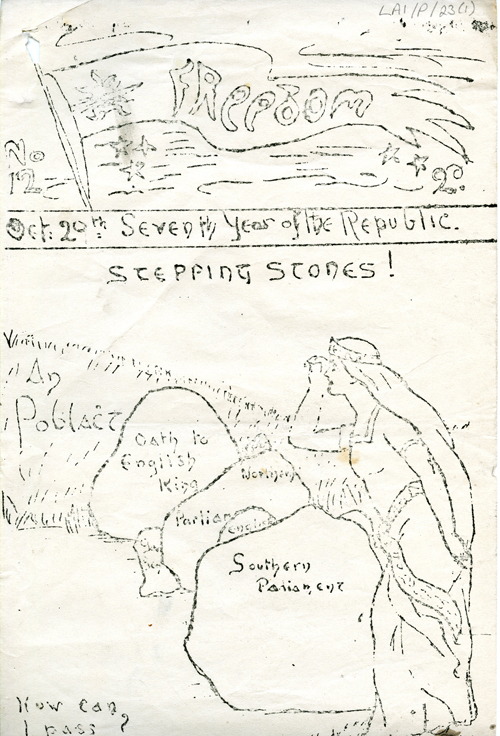
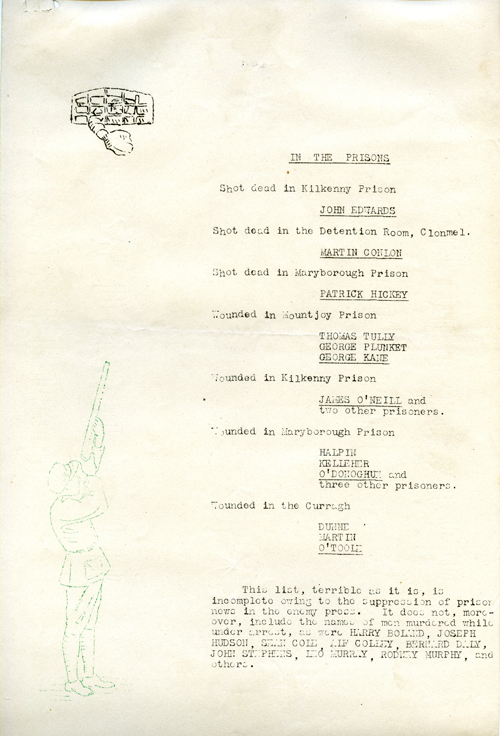
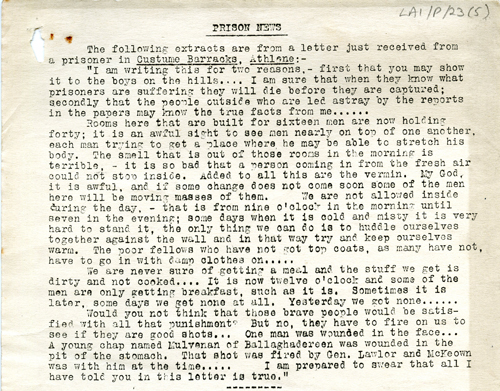
Kathleen Barry Moloney (1896–1969) joined the University branch of Cumann na mBan in 1920 and was close to the most senior republicans including Michael Collins, Austin Stack, Richard Mulcahy and Eamon de Valera throughout the 1920–24 period. She opposed the Treaty. In April 1922 she was asked by de Valera to accompany Countess Markievicz as a member of a republican delegation to the USA. Shortly after her return the Civil War started and she, along with Mary MacSwiney and Linda Kearns, remained in the Hammam Hotel in O’Connell Street during the week long siege that ended in the death of Cathal Brugha. Between June and October 1922 Kathleen organised and maintained a line of communication between Dublin and General Liam Lynch in the South.
In November 1922 she was asked to reorganise the Irish Republican Prisoners Dependents Fund (IRPDF), see below, and acted as general secretary of the fund until September 1924, a position held in high regard by Frank Aiken and Eamon de Valera who recognised her tireless work in organising and distributing relief throughout the country. To this end she was asked to travel to Australia with Linda Kearns in September 1924, on behalf of the Reconstruction Committee of the IRPDF to raise desperately needed funds to provide financial aid to released prisoners. Shortly before her departure Kathleen married Jim Moloney. She returned to Ireland in April 1925 and effectively retired from republican service.
However, she remained a committed republican throughout her life, campaigning against the executions of republican prisoners between 1939 and 1947. She also acted as committee member of the Women’s Industrial Development Association between 1932 and 1939. She and Jim supported the establishment of Clann na Poblachta and its involvement in the first Inter-Party government in 1948. Kathleen Barry Moloney died in Dublin on 10 January 1969.
P94/28 Papers of Kathleen Barry Moloney: Letter from Liam Lynch, Chief of Staff, Irish Republican Army, to Kathleen Barry reassigning her to the re-organisation of the Irish Republican Prisoners Dependants Fund.
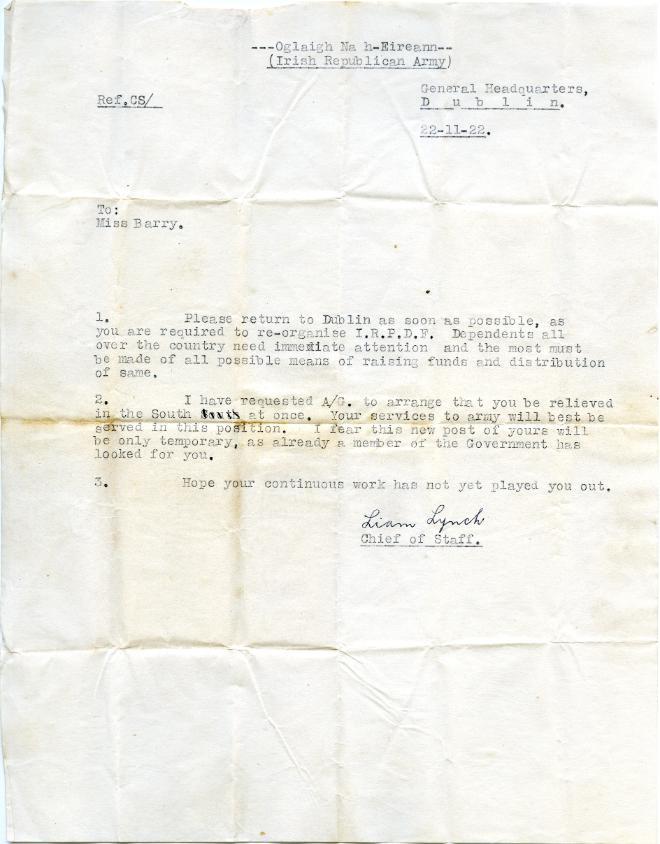
Kevin O’Higgins (1892–1927) was a leading proponent of the pro-Treaty position. He strongly supported Michael Collins and was heavily critical of Eamon de Valera during the civil war of 1922–23. In January 1922 he became minister for economic affairs in Arthur Griffith's first Free State government and he held a similar position in the provisional government chaired by Michael Collins. In the 1922 general election he was again returned for his Laois-Offaly constituency, and after the deaths of both Arthur Griffith and Michael Collins in August, he became minister for home affairs and vice-president of the executive council.
O’Higgins writes the letter below from City Hall to his wife, Brigid O’Higgins (née Cole), on 27 June 1922. He refers to the Free State government’s move against the anti-Treaty occupied Four Courts. He makes reference to the arrest of J.J. ‘Ginger’ O'Connell (a general in the new National Army) by anti-Treaty forces, which acted as catalsyt to this ‘inevitible’ action. O’Higgins’ explains that O’Connell’s arrest was carried out in retaliation for the Free State government’s arrest of the organiser of a robbery carried out in the name of the ‘Belfast Boycott’, which he states ‘has been extended of late to cover all the sins on the calendar’. He asserts that the move is going well and it is hoped that the evacuation of the Four Courts will have been achieved before nightfall. Mention is made of their home, referred to as both ‘the fort’ and ‘Dunamasa’ (13 Mayfield Road, Terenure). He suggests that it may be necessary for them to sleep under guard, but that Molly (Brigid's sister) is being ‘quite sensible’. He emphasises that there is no need for concern about his safety and that although ‘the situation is sad enough’, it was ‘absolutely necessary’.
UCDA P197/88 Letter from Kevin O’Higgins to his wife Brigid O’Higgins (née Cole), 27 June 1922
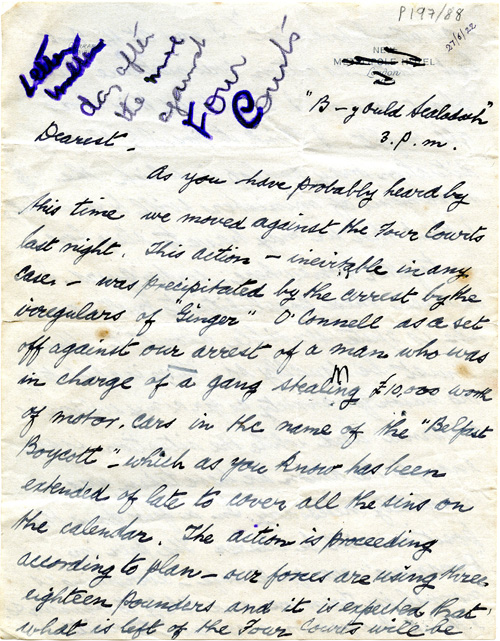
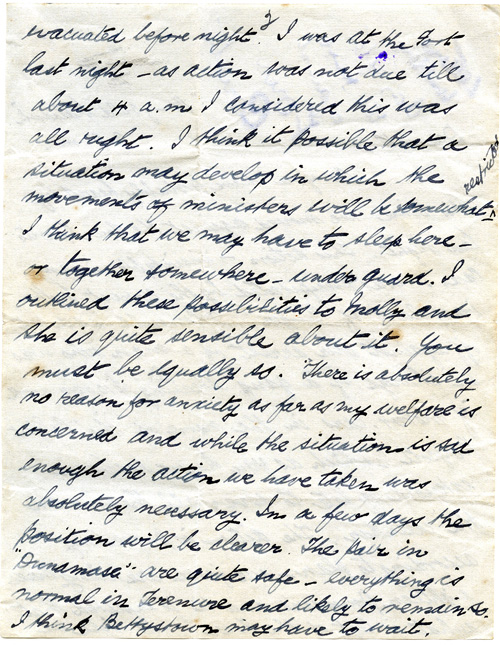
Letter written day after the move against the Four Courts
[“?”]
3p.m.
Dearest,
As you have probably heard by this time we moved against the Four Courts last night. This action – inevitable in any case – was precipitated be the arrest by the irregulars of “Ginger” O’Connell as a set off against our arrest of a man who was in charge of a gang stealing £10,000 worth of motor cars in the name of the “Belfast Boycott” - which as you know has been extended of late to cover all the sins on the calendar. The action is proceeding according to plan – our forces are using three eighteen pounders and it is expected that what is left of the Four Courts will be evacuated before night. I was at the fort last night – as action was not due till about 4 a.m. I considered this was all right. I think it possible that a situation may develop in which the movement of ministers will be somewhat restricted I think that we may have to sleep here – or together somewhere – under guard. I outlined these possibilities to Molly and she is quite sensible about it. You must be equally so. There is absolutely no reason for anxiety as far as my welfare is concerned and while the situation is sad enough the action we have taken was absolutely necessary. In a few days the position will be clearer. The pair in “Dunamase” are quite safe – everything is normal in Terenure and likely to remain so. I think Bettystown may have to wait.
Memorial cards became a feature of Roman Catholic mourning, as invitations to funerals, during the 1800s with the development of lithography. As less expensive forms of printing became widespread, they became more popular and were no longer used as invitation, but as a way to remember loved ones. They are a common item found in the papers of those who were involved in the Irish revolutionary period, commemorating those who were killed in the 1916 Rising, the War of Independence and the Civil War. They are often overtly political, including commentary on the nature of the person being remembered.
P106/3882 Papers of Sighle Humphreys: Memorial cards of Cathal Brugha, Liam Mellows and Harry Boland
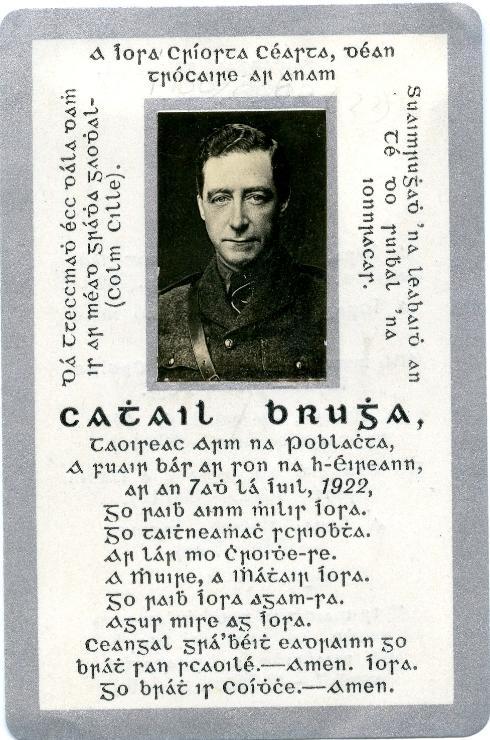
Cathal Brugha, 1874–1922. Appointed commandant of the anti-treaty forces on O’Connell Street during the Civil War. Refused to surrender and was shot on 5 July 1922 and died two days later.
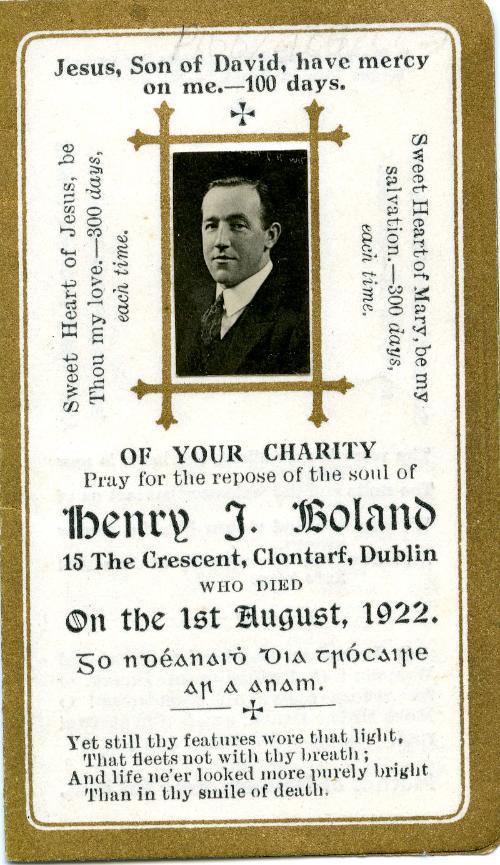
Harry Boland, 1887–1922. Shot by members of the National Army (the regulars) when they attempted to arrest him and died on 1 August 1922
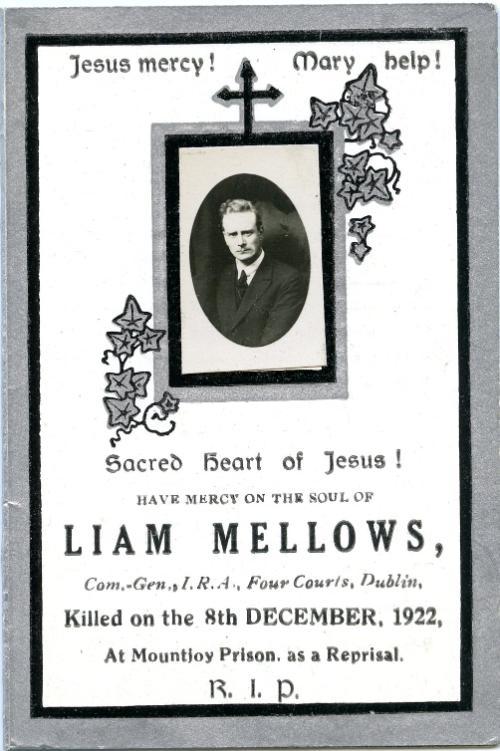
Liam Mellows, 1892–1922. Captured after the surrender of the Four Courts and executed by the Provisional Government on 8th December 1922.
The Public Safety Act, 1922, was passed by the Dáil by 41 votes to 18 on 27 September. This emergency legislation gave the National Army the to execute anyone ‘taking part in or aiding and abetting attacks on the National Forces’, having possession of arms or explosives ‘without the proper authority’ or disobeying an Army General Order. John Dorney has written a blog post about the Act, known to those who opposed it as 'The Murder Bill'.
Dorney writes that "technically speaking the Public Safety Bill was not a law but simply a resolution passed in the Dáil. However, since there was, as yet no Governor General who could give his assent and as the government felt the situation was too grave for legal niceties, the legislation setting up military courts was passed anyway. It was not until August 1923, when the Free State would pass an Act of Indemnity for all actions committed during the Civil War and also pass new, formal special powers legislation—The Emergency Powers Act—that it would retrospectively legalise what it had enacted in the autumn of 1922."
The document below from the Papers of Richard Mulcahy, is a copy letter dated 30 November 1922, from irregular Chief of Staff to O/Cs all Battalions, instructing them to shoot on sight all Provisional Government members who voted for the “Murder Bill”, to destroy houses belonging to their supporters, and to shoot on sight all active and aggressive Free State Officers who supported the bill. A list of Provisional Government members who voted is attached, as is the Operation Order 17, which outlines the methods to be used in enforcing the proclamation.
P7a/83 copy letter from irregular Chief of Staff to O/Cs all Battalions, 30 November 1922, concerning the response to 'the Murder Bill'.
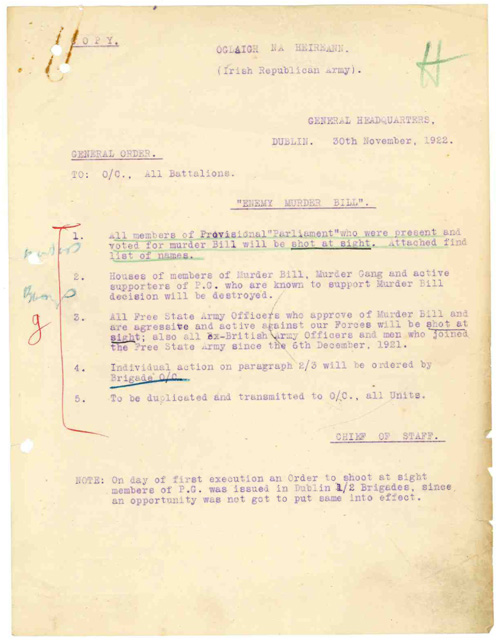
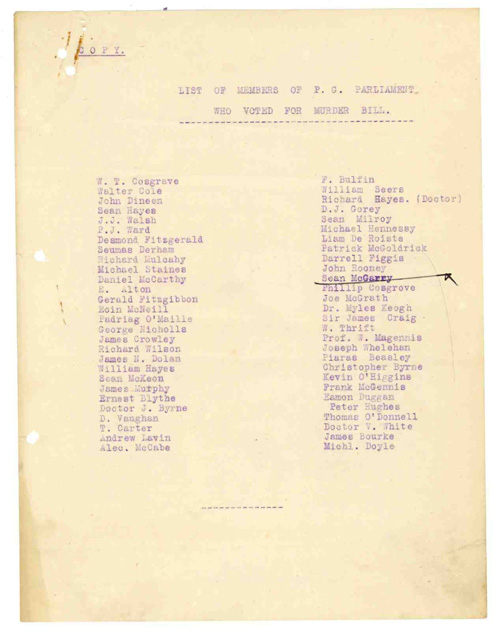
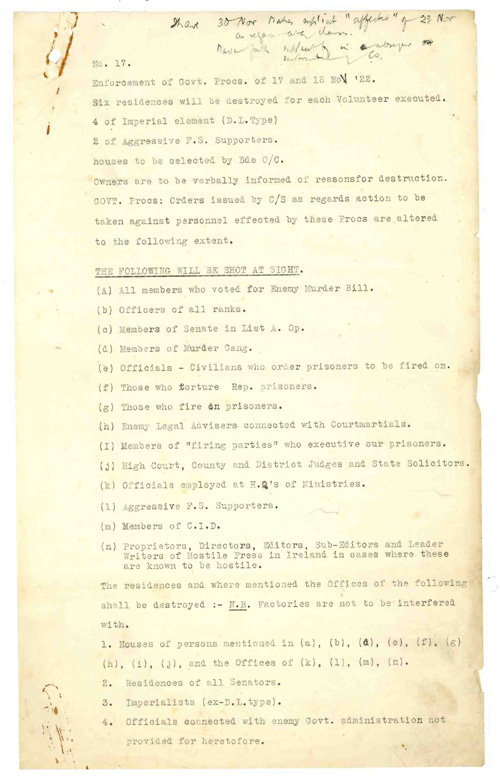
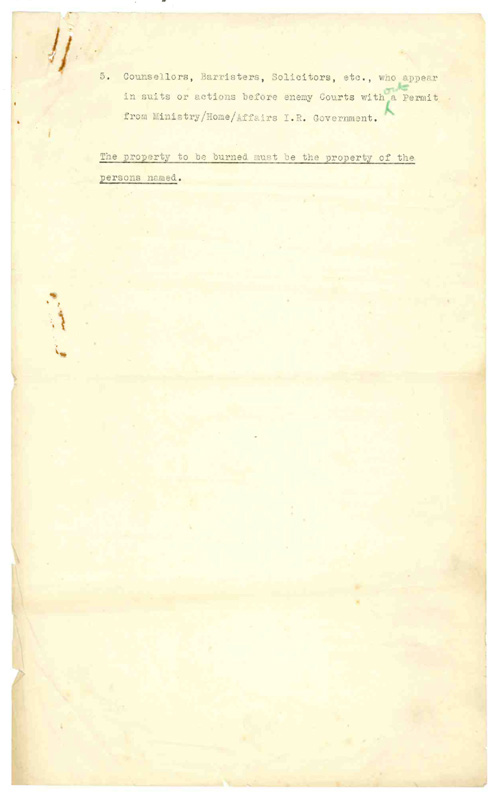
The Papers of Moss Twomey consist largely of IRA general headquarters archives for the period 1922–36, though the overwhelming bulk of the papers comprises the archives of the Chief of Staff (C/S) and Adjutant General (A/G), 1922–26. Later material, particularly after 1932, is generally associated with sympathetic organisations such as the Republican Press (P69/224–245).
The structure of the archives of the C/S and A/G are very similar and consist of organic files falling into two main categories: communications with other headquarters departments and occasionally with government ministers such as the President and Minister for Defence; and communications with army units. This material forms the core of the collection, documenting the policy, and the operational and organisational condition of the IRA, both nationally and locally, from the later stages of the civil war onwards.
Besides the communications between the C/S and A/G and other headquarters officers, a more limited amount of the archives of these other officers’ departments also survives, primarily of the Director of Intelligence (P69/189–199) and the Quartermaster General (P69/206–216).
Among the material concerned with C/S communications is a note from from Ernie O’Malley, Assistant Chief of Staff, Hospital Wing, Mountjoy Jail, to the C/S (9 January 1923) in which he states that he is to be tried and wishes to know the position with regard to taking legal advice: ‘If I do not hear from you I will refuse to recognise their court. As I may be removed from here and this may be the last chance I may have of writing to you I would like to be remembered to the members of the staff and my comrades. Another bit of lead won’t do me any harm’. Included with the note are communications between the C/S and other staff officers concerning publicising O’Malley’s position and taking hostages in case of his execution.
UCDA P69/7 Papers of Moss Twomey: Letter from Ernie O’Malley, Assistant Chief of Staff, Hospital Wing, Mountjoy Jail, to the C/S (9 January 1923), and associated documents.
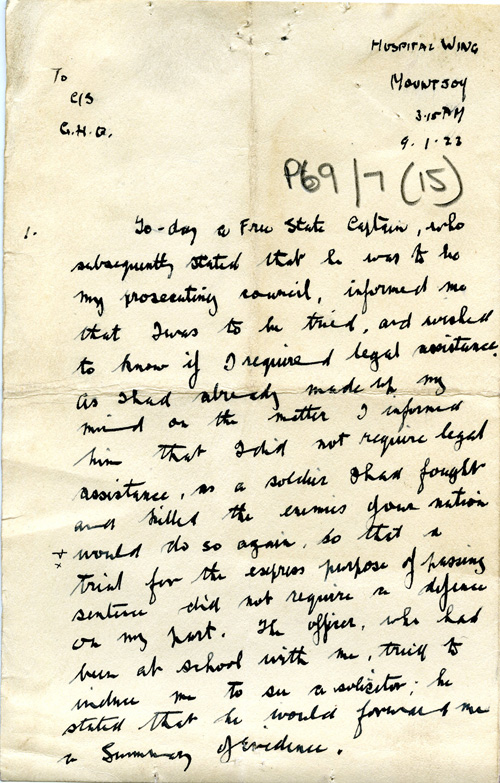
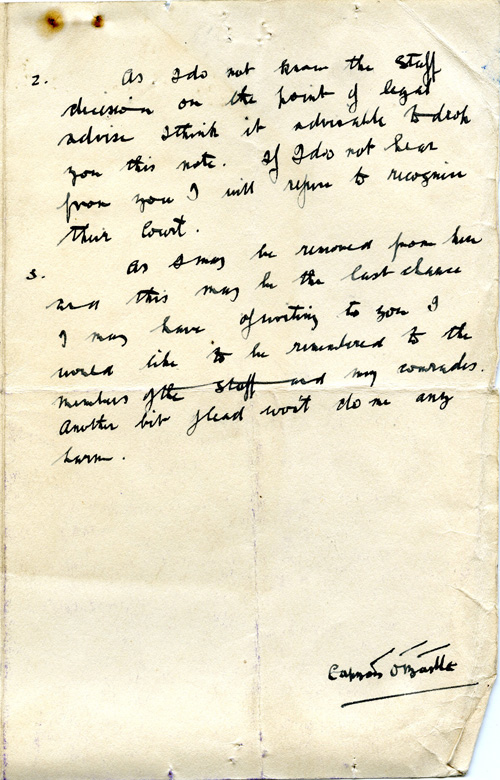
To C/S GHQ
Hospital Wing
Mountjoy
3.15pm
9.1.22
1. Today a Free State Captain, who subsequently stated that he was to be my prosecuting council, informed me that I was to be tried, and wished to know if I required legal assistance. As I had already made up my mind on the matter I informed him that I did not require legal assistance, as a soldier I had fought and killed the enemies of our nation & would do so again, so that a trial for the express purpose of passing sentence did not require a defence on my part. The officer, who had been at school with me, tried to induce me to see a solicitor; he stated that he would forward me a summary of evidence.
2. As I do not know the staff decision on the point of legal advise I think it advisable to drop you this note. If I do not hear from you I will refuse to recognise their court.
3. As I may be removed from here and this may be the last chance I may have of writing to you I would like to be remembered to the members of the staff and my comrades. Another bit of lead won’t do me any harm.
Earnón Ó Máille (Ernie O’Malley, Assistant C/S)
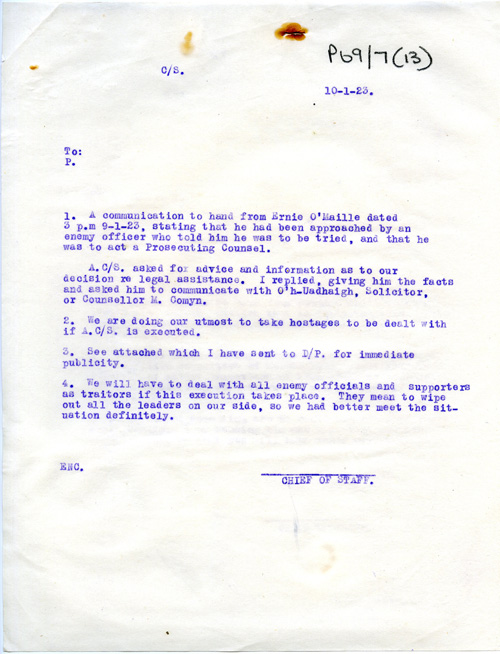
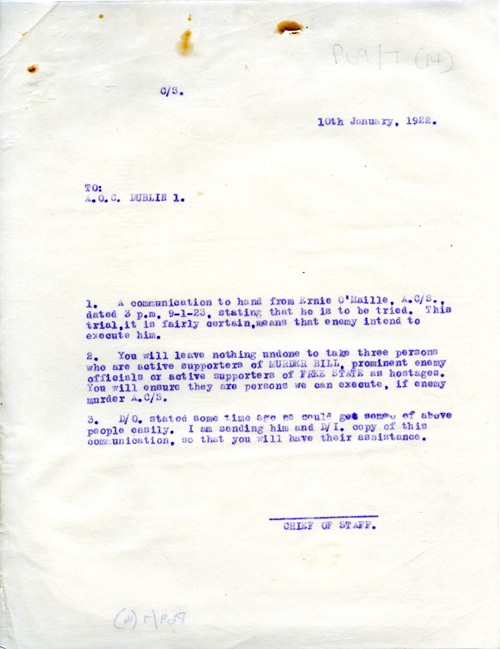
St Brigid's feast day falls on 1 February, originally a festival called Imbolc, marking the beginning of spring. Dr Elva Johnston notes that "The early medieval Irish, who provide us with our first evidence for Brigit emphasised her combination of power and nurture, praising her superiority to kings and her protection of the vulnerable. Brigit’s image was astoundingly complex. Yet, this complexity made her flexible and Irish travellers brought their admiration of Brigit with them to Britain and the Continent, popularising her as an international saint."
Brigid's actual existence is debated. She is given different birth and death dates. The volume of the Annals of the Four Masters held in UCD Archives, provides one of her death dates: 525. The full Irish text and translation may be found online as part of the CELT project.
UCD-OFM Ms A13 Annals of the Four Masters, f245r, C17th. Reproduced by kind permission of UCD-OFM Partnership.

English translation
The Age of Christ, 525.
The twenty-second year of Muircheartach.
Saint Brighit, virgin, Abbess of Cill Dara, died. It was to her Cill Dara was first granted, and by her it was founded. Brighit was she who never turned her mind or attention from the Lord for the space of one hour, but was constantly meditating and thinking of him in her heart and mind, as is evident in her own Life, and in the Life of St. Brenainn, Bishop of Cluain Fearta. She spent her time diligently serving the Lord, performing wonders and miracles, healing every disease and every malady, as her Life relates, until she resigned her spirit to heaven, the first day of the month of February; and her body was interred at Dun, in the same tomb with Patrick, with honour and veneration.
Ailill, Bishop of Armagh, who was of the Ui Breasail, died.
The Age of Christ, 526.
The twenty third year of Muircheartach.
It was to predict the death of Muircheartach that Cairneach said:
I am fearful of the woman around
whom many storms shall move,
For the man who shall be burned in fire,
on the side of Cleiteach wine shall drown.
That is, by Sin, daughter of Sighe, Muircheartach was killed, in revenge of her father, whom he had slain.
The battle of Eibhlinne by Muircheartach mac Earca; the battle of Magh Ailbhe; the battle of Almhain; the battle of Ceann Eich; the plundering of the Cliachs; and the battle of Aidhne against the Connaughtmen; of which battles Ceannfaeladh said:
The battle of Ceann Eich, the battle of Almhain,—
It was an illustrious famous period,
The devastation of the Cliachs, the battle of Aidhne,
And the battle of Magh Ailbhe.
Cairell, son of Muireadhach Muindearg, King of Ulidia, died.
Oilill, son of Dunlaing, King of Leinster, died.
Irish text
Aois Criost, cuig céd fiche a cuicc.
A dó fichet do Muircheartach.
S. Brighit ogh, banab Chille Dara d'écc. As di-sidhe cetus ro h-iodhbradh Cill
Dara, & ba lé con-rodacht. As í Brighit tra ná tucc a meanmain ná a h-inntheifimh as in coimdheadh eadh n-aonuaire riamh acht a siorluadh, & a siorsmuaineadh do grés ina cridhe & menmain, amhail as errderc ina bethaidh fein, & i m-bethaidh naoimh Brenainn, espucc Cluana Ferta. Ro thochaith imorro a h-aimsir acc foghnamh go diochra don coimdhe, ag denomh fert & miorbhal, ag slánucchadh gach galair & gach tedhma archena, amhail aisnéidhes a betha, go ro faoidh a spirat do chum nimhe, an céd lá do mí Febhru, & ro h-adhnacht a corp i n-Dún i n-aon-tumba la Patraicc, co n-onoir & co n-airmidin.
Ailill, epscop Arda Macha, do Uibh Breasail do-sidhe, do écc.
Aois Criost, cuicc ced fiche a se.
An treas bhliadhain fichet do Mhuirchertach.
As do thairrngire báis Mhuircheartaigh ad-beart Cairneach
Asam uamhon ar in m-bein,
ima luaidhfe ilor Sin,
Ar fhiur loisccfidher i t-tin,
for taoibh Cletigh báidhfir fin
la Sín ingin Sighe do-rochair Muircertach, i c-cionadh a h-athar ro marbh-somh.
Cath Eibhlinne ria Muirchertach mac Earca, cath Moighe h-Ailbhe, cath Almhaine, cath Cinn Eich, & orccain na c-Cliach, cath Aidhne, for Connachtaibh, conadh dona cathaibh-sin at-bert Ceand Faoladh:
Cath Cinn Eich, cath Almhaine,
ba h-aimsir airdherc aimhre,
orccain Cliach, cath Aidhne,
acus cath Maighe h-Ailbhe.
Cairell, mac Muireadhaigh Muindeircc, ri Uladh, d'écc.
Oilill, mac Dunlaing, ri Laighen, do écc.
Compulsory Practice of Vaccinations in Ireland
Vaccination is the administration of a vaccine (biological preparation) to help the immune system develop protection from disease. Vaccines have been around for a long time and have helped irradicate diseases such as smallpox, polio and tetanus. In the past, several Vaccinations Acts (1840, 1853, 1867 and 1898) were passed by the UK Parliament regarding vaccination policy.
The document below is taken from the records of the Kilmore Dispensary District located in the Monaghan Poor Law Union district. It was issued by the Poor Law Commission Office in Dublin on 10 August 1863. It was sent to poor houses all around Ireland to inform the Dispensary Medical Officers of the additional duties and arrangements that they were obliged to carry out concerning the vaccination of the general public. The full details of these updated duties can be read below.
UCDA P42/185 Records of Kilmore Dispensary District, Monaghan Poor Union Law Union.
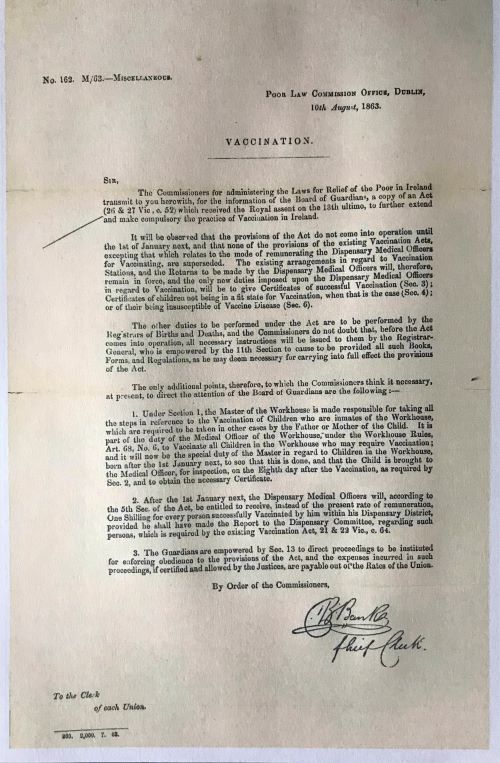
Mary Spring Rice (1880–1924) was the second child and only daughter of Thomas Spring Rice, 2nd Baron Monteagle of Brandon, Co. Kerry, and his wife, Elizabeth Butcher. She grew up at Mount Trenchard, Foynes, Co. Limerick. A fluent Irish speaker, she was a member of the Gaelic League and served on the board of Irish summer school, Coláiste Uí Chomhraí, in Carrigaholt, Co. Clare.
Sping Rice was an activist for nationalist and trade union causes. She joined the United Irishwomen and the Limerick branch of the Irish Countrywomen’s Association. She served on the Anglo-Irish committee formed in London in May 1914 to help the Irish Volunteers, and through that organisation and her friendship with Erskine Childers and Roger Casement, became involved in the transportation of arms from Germany to Ireland. Her Asgard diary was published in F.X. Martin, 'Howth gun running' (1964).
Throughout the War of Independence and the Civil War, Spring Rice continued her involvement in the nationalist movement. Instictively anti-Treaty, she took a pro-Treaty position believing that it would lead to independence and less bloodshed. A diagnosis of tuberculosis led to her travelling to a sanitorium in Wales, where she died in 1923. She is buried in Foynes.
In her letters to her cousin Dorothea Knox, written throughout 1921 and 1922, she discusses her activism, Irish language issues and the Treaty. In the letter below, Spring Rice comments on the pro- and anti- Treaty sides in the Foynes Cumann na mBan, her decision to join Cumann na Saoirse, and her her stuggle with her pro-Treaty stance.
UCDA P235/11 Papers of Mary Spring Rice. Letter from Mary Spring Rice to Dorothea Knox, 10 March 2022.
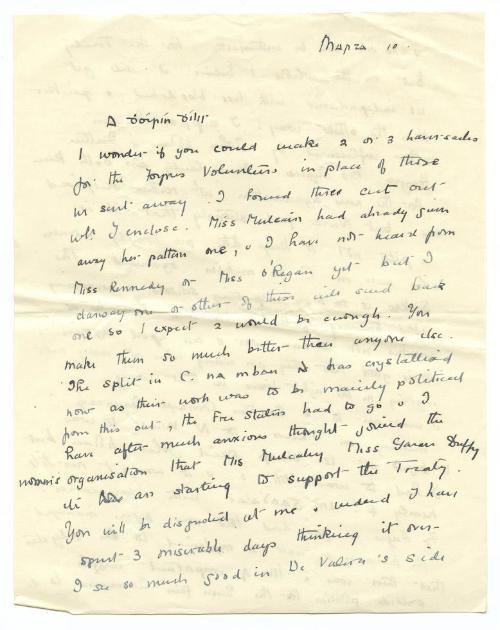
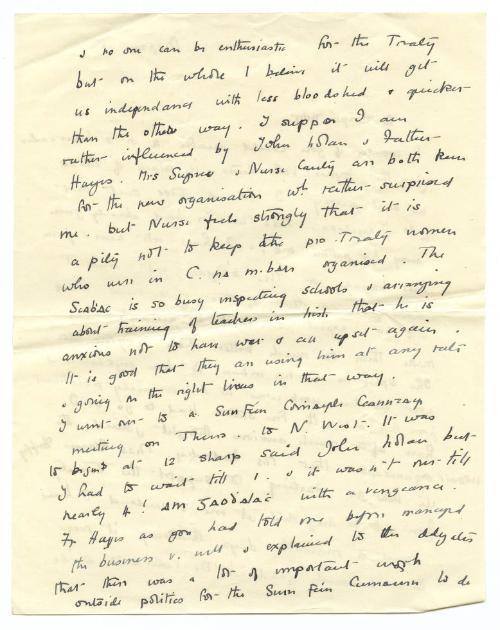
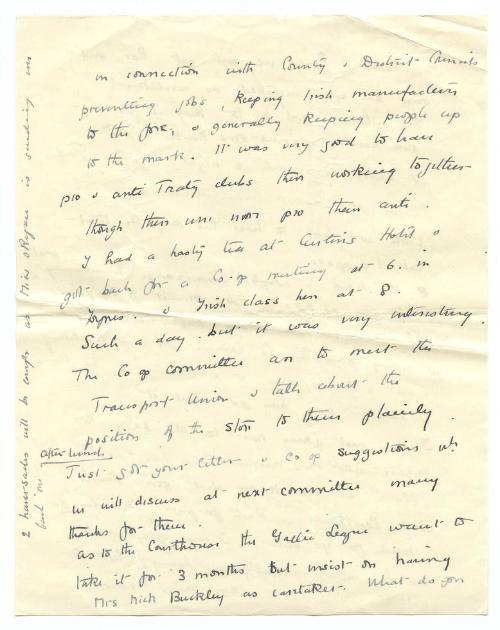
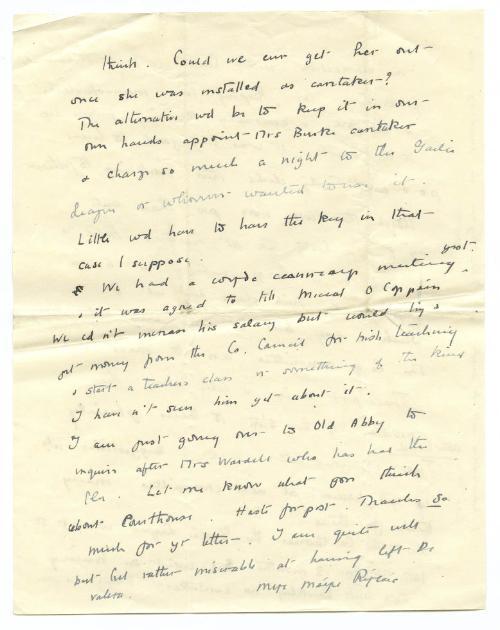
Marta 10
A Dhóirín dhílis
I wonder if you could make 2 or 3 haversacks for the Foynes Volunteers in place of those we sent away. I found three cut out which I enclose. Miss Mulcair had already given away her pattern[ed] one, & I have not heard from Miss Kennedy or Miss O’Regan yet but I daresay one or other of these will send back one so I expect 2 would be enough. You make them so much better than anyone else.
The split in Cumann na mBan has crystallised now as their work was to be mainly political from this out, the Free Staters had to go & I have after much anxious thought joined the women’s organisation* that Miss Mulcahy, Miss Gavan Duffy etc are starting to support the Treaty. You will be disgusted at me, indeed I have spent 3 miserable days thinking it out. I see so much good in De Valera’s side & no one can be enthusiastic for the Treaty but on the whole I believe it will get us independence with less bloodshed & quicker than the other way. I suppose I am rather influenced by John Nolan & Father Hayes. Mrs Sugrue & Nurse Carty are both keen for the new organisation which rather surprised me, but Nurse feels strongly that it is a pity not to keep the pro-Treaty women who were in Cumann na mBan organised. The Seabhac** is so busy inspecting schools & arranging about training of teachers in Irish that he is anxious not to have war and all upset again. It is good that they are using him at any rate & going on the right lines in that way.
I went over to a Sinn Féin Comhairle Ceantair meeting on Thursday to [North] West. It was to begin at 12 sharp said John Nolan but I had to wait till 1. & it wasn’t over till nearly 4! Am Gaodhalach with a vengeance. Fr Hayes as you had told me before managed the business very well & explained to the delegates that there was a lot of important work outside politics for the Sinn Fein Cumann to do in connection with County & District Councils presenting jobs, keeping Irish manufacturers to the fore; & generally keeping people up to the mark. It was very good to have pro & anti Treaty clubs there working together though there were more pro than anti. I had a hasty tea at Curtains Hotel & got back for a Co-op meeting at 6. in Foynes & Irish class then at 8. Such a day, but it was very interesting. The Co op committee are to meet the Transport Union & talk about the position of the stop to them plainly.
[2 haversacks will be enough as Miss O Regan is giving me back one after lunch]
Just got your letter & Co op suggestions [which] we will discuss at next committee many thanks for these.
As to the Courthouse the Gaelic League want to take it for 3 months but insist on having Mrs Mick Buckley as caretaker. What do you think? Could we ever get her out once she was installed as caretaker? The alternative would be to keep it in our own hands appoint Mrs Burke caretaker & charge so much a night to the Ladies League or whoever wanted to use it. Little would have to have the key in that case I suppose.
We had a coisde ceantair meeting yesterday, it was agreed to take Miceal O Corrain. We couldn’t increase his salary but would try & get money from the Co. Council for Irish teaching & start a teacher’s class or something of this kind. I haven’t seen him yet about it. I am just going over to old Abby to inquire after Mrs Wardell who has had the flu. Let me know what you think about [the] Courthouse. Haste for post. Thanks so much for your letter I am quite well but but rather miserable at having left De Valera.
Mise Máire Ríseach
* Cumann na Saoirse
** Pádraig Ó Siochfhradha
Eamon de Valera's papers in UCD Archives include a section on his association with Mary MacSwiney from 1921 to 1925. UCDA P150/657 is a file of correspondence between De Valera (‘P.’ and 'E. de V.') and MacSwiney (Máire Nic Shuibhne and ‘M. Nic Sh.’) written between September 1922 and August 1923, and covering a variety of topics.
In the letter below, De Valera responds to MacSwiney's uncompromising Republican stance, outlining the principles which guide him and admitting to personal attributes and a personal ideology, which he considers to be at odds with those of both a revolutionary and the leader of a revolution.
UCDA P250/657. Carbon copy of letter from Eamon de Valera to Mary MacSwiney, 11 September 1922. Reproduced by kind permission of UCD-OFM Partnership.
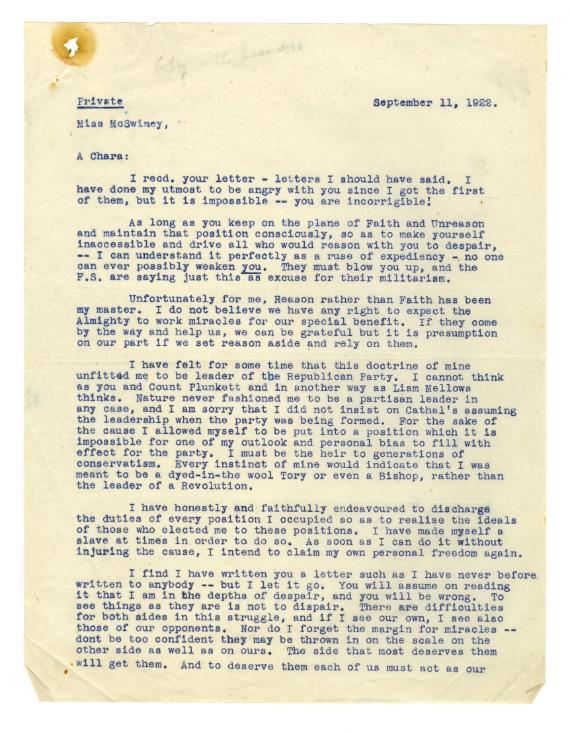
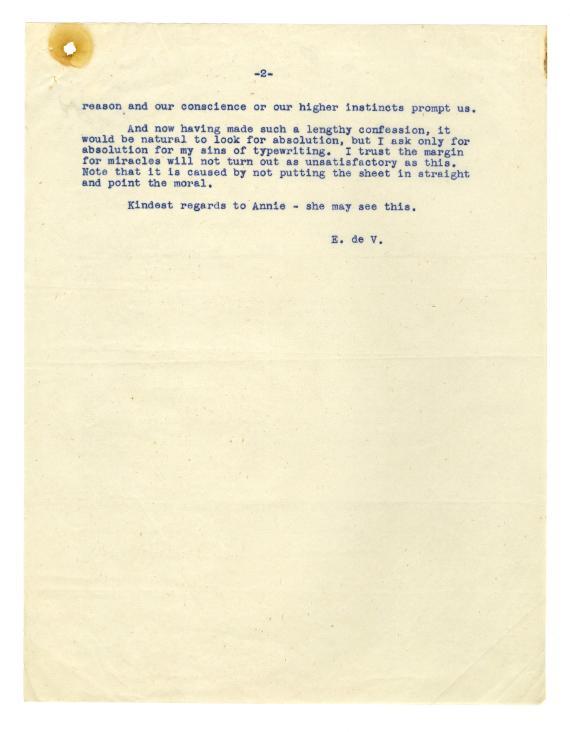
September 11, 1922
Private
Miss McSwiney
A Chara:
I rec[eive]d your letter—leters I should have said. I have done my utmost to be angry with you since I got the first of them, but it is impossible—you are incorrigible!
As long as you keep on the plane of Faith and Unreason and maintain that position consciously, so as to make yourself inaccessible and drive all who would reason with you to despair,—I can understand it perfectly as a ruse of expediency—no one can ever possible weaken you. They must blow you up, and the F.S.* are saying just this as excuse for their militarism.
Unfortunately for me, Reason rather than Faith has been my master. I do not believe we have any right to expect the Almighty to work miracles for our special benefit. If they come by the way and help us, we can be grateful but it is presumption on our part if we set reason aside and rely on them.
I have felt for some time that this doctrine of mine unfitted me to be leader of the Republican Party. I cannot think as you and Count Plunkett** and in another way as Liam Mellows*** thinks. Nature never fashioned me to be a partisan leader in any case, and I am sorry that I did not insist on Cathal’s**** assuming the leadership when the party was being formed. For the sake of the cause I allowed myself to be put into a position which it is impossible for one of my outlook and personal bias to fill with effect for the party. I must be the heir to generations of conservatism. Every instinct of mine would indicate that I was meant to be a dyed-in-the-wool Tory of even a Bishop, rather than the leader of a Revolution.
I have honestly and faithfully endeavoured to discharge the duties of every position I occupied so as to realise the ideals of those who elected me to these positions. I have made myself a slave at times in order to do so. As as I can do it without injuring the cause, I intend to claim my own personal freedom again.
I find I have written you a letter such as I have never before written to anybody—but I let it go. You will assume on reading it that I am in the depths of despair, and you will be wrong. To see things as they are is not to despair. There are difficulties for both sides in this struggle, and if I see our own, I see also those of our opponents. Nor do I forget the margin for miracles—don’t be too confident they may be thrown in on the scale on the other side as well as on ours. The side that most deserves them will get them. And to deserve them each of us must act as our reason and our conscience or our higher instincts prompt us.
And now having made such a lengthy confession, it would be natural to look for absolution, but I ask only for absolution for my sins of typewriting. I trust the margin for miracles will not turn out as unsatisfactory as this. Note that it is caused by not putting the sheet in straight and point the moral.
Kindest regards to Annie*****—she may see this.
E. de V.
* Free State
** George Noble Plunkett KCHS (1851–1948), nationalist politician.
*** William Joseph Mellows (1892–1922), republican and Sinn Féin politician. He was one of four senior IRA men executed by the Provisional Government, 8 December 1922.
**** Cathal Brugha (1874–1922), republican and anti-Treaty politician. He was shot by Free State troops and died of his wounds on 7 July 1922.
***** Annie MacSwiney, Mary's sister, and fellow republican.
Eamon de Valera's papers in UCD Archives include a section on his association with Mary MacSwiney from 1921 to 1925. UCDA P150/656 is a file of correspondence between de Valera in the U.S.A. and Mary MacSwiney back in Ireland following her lecture tour there earlier in the year. The file mainly includes holograph letters to de Valera from MacSwiney. Topics discussed include MacSwiney’s attitude to the peace negotiations; her opinion on the importance of the U.S.A, and her views on [James] O’Mara; Terence MacSwiney’s book The Revolutionist; her reaction to the signing of the Treaty–‘The more I think of this disgraceful betrayal the more angry I get. Why on earth did you not recall them long ago when you found what they were like.’
The letter below is the first of the sequence. MacSwiney expresses her fears about the Treaty negotiations. She is adamant that there must be a complete break from the British Empire: "... our envoys will not come back with any plan of Ireland inside the Empire directly or indirectly, and that that much talked of “Association” will involve no allegiance in any shape or form to anything but the Irish Republic on and indivisible?". Although she expresses faith in de Valera's abilities to inspire and to lead, an undercurrent of doubt runs though the letter. The influence of her brother, Terence MacSwiney, on her political philosophy is clear, as is the effect on her of his long hunger stike and death.
UCDA P250/656 Holograph letter from Mary MacSwiney to Eamon de Valera, September/October 1921. Reproduced by kind permission of UCD-OFM Partnership.
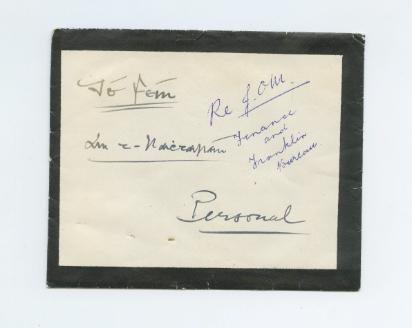
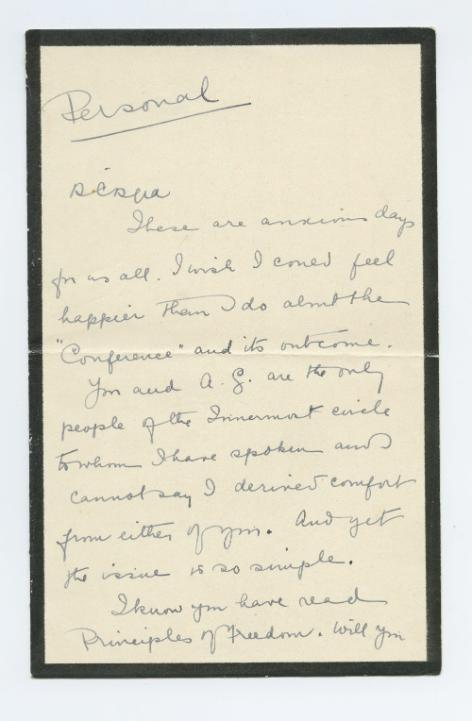
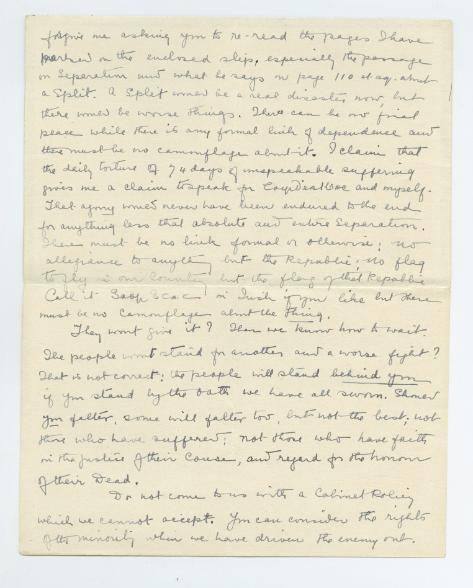
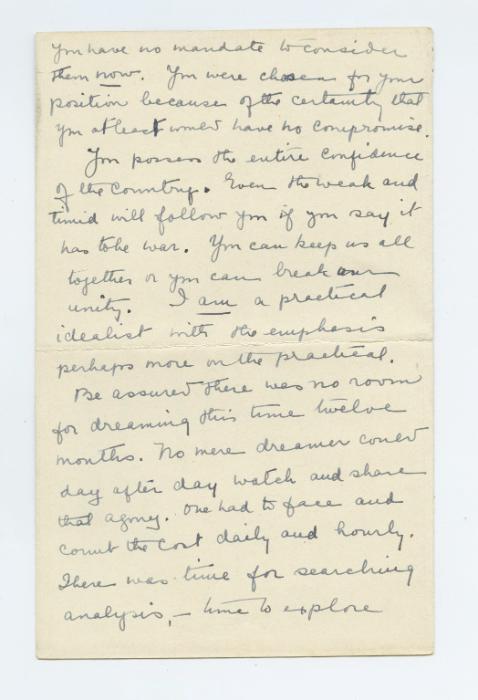
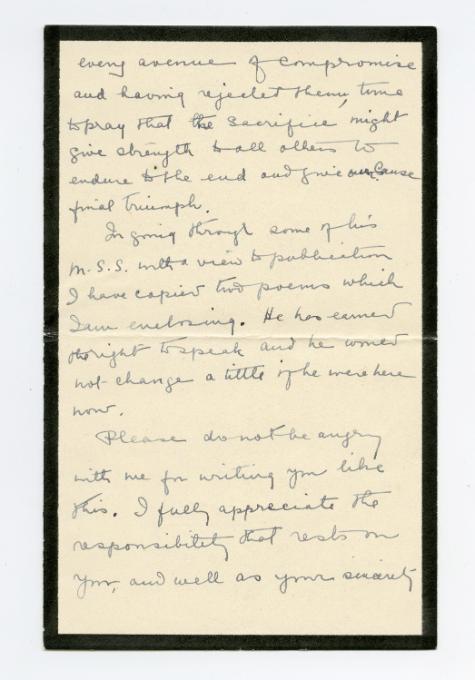
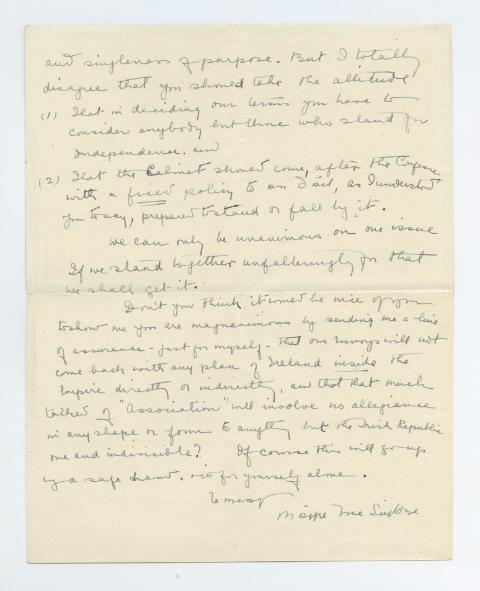
Personal
[September/October] 1921
A Chara
These are anxious days for us all. I wish I could feel happier than I do about the “Conference” and its outcome.
You and A.G*. are the only people of the Innermost circle to whom I have spoken and I cannot say I have derived comfort from either of you. And yet the issue is so simple.
I know you have read Principals of Freedom**. Will you forgive me asking you to re-read the pages I have marked on the enclosed slip, especially the passage on Separation and what he says on page 110 et sq. about a Split. A Split would be a real disaster now, but there would be worse things. There can be no final peace while there is any formal link of dependance and there must be no camouflage about it. I claim that the daily torture of 74 days*** of unspeakable suffering gives me a claim to speak for [?] and myself. That agony would never have been endured to the end for anything less than absolute and entire Separation. There must be no link formal or otherwise; no allegiance to anything but the Republic; no flag to fly in our Country but the flag of that Republic. Call it Saor Stat in Irish if you like but there must be no camouflage about the thing.
They won’t give it? Then we know how to wait. The people won’t stand for another and a worse fight? That is not correct: the people will stand behind you if you stand by the oath we have all sworn. Should you falter, some will falter too, but not the best; not those who have suffered; not those who have faith in the justice of their cause, and regard for the honour of their Dead.
Do not come to us with a Cabinet Policy which we cannot accept. You can consider the rights of the minority when we have driven the enemy out. You have no mandate to consider them now. You were chosen for your position because of the certainty that you at least would have no compromise.
You possess the entire confidence of the country. Even the weak and timid will follow you if you say it has to be war. You can keep us all together or you can break our unity. I am a practical idealist with the emphasis perhaps more on the practical.
Be assured there was no room for dreaming this time twelve months. No mere dreamer could day after day watch and share that agony. One had to face and count the cost daily and hourly. There was time for searching analysis,—time to explore every avenue of compromise and having rejected them, time to pray that the sacrifice might give strength to all others to endure to the end and give our Cause final triumph.
In going through some of his**** M.S.S. with a view to publication I have copied two poems which I am enclosing. He has earned the right to speak and he would not change a little if here were here now.
Please do not be angry with me for writing you like this. I fully appreciate the responsibility that rests on you, and well as your sincerity and singleness of purpose. But I totally disagree that you take the attitude (1) That in deciding our terms you have to consider anybody but those who stand for Independence, and (2) That the Cabinet should come, after the Conference with a fixed policy to an Dáil, as I understand you to say, prepared to stand or fall by it.
We can only be unanimous on one issue. If we stand together unfalteringly for that we shall get it.
Don’t you think it would be nice of you to show me you are magnanimous by sending me a line of assurance—just for myself. That our envoys will not come back with any plan of Ireland inside the Empire directly or indirectly, and that that much talked of “Association” will involve no allegiance in any shape or form to anything but the Irish Republic on and indivisible? Of course this will go up by a safe [hand]. & is for yourself alone.
Le meas,
Máire Mc Suibhne
*Arthur Griffith
** Principals of Freedom is a collection of Terence MacSwiney's writings, published posthumously in 1921.
***Mary MacSwiney’s brother, Terence MacSwiney, died on 25 October 1920 after 74 days on hunger strike.
****Terence MacSwiney
This month's document to commemorate one hundred years since the end of the War of Independence in Ireland and the start of the Anglo-Irish Treaty negotiations of 1921, is a letter from Stephen Mary O’Mara (1883-1959), Lord Mayor of Limerick, to Harry Boland dated 15 February 1922.
O’ Mara took up the position of Lord Mayor in March 1921. The previous two Lord Mayor’s were murdered on 7 March 1921 by Royal Irish Constabulary Auxiliaries; Michael O’Callaghan held the seat from 1920-1921 and George Clancy was the sitting Lord Mayor at the time of his shooting. O’Mara was a supporter and member of Sinn Fein from a young age. In July 1921, Eamon De Valera appointed him a fund-raiser and special envoy to the USA where he raised thousands of dollars for the republican movement.
De Valera and O’Mara were lifelong friends and when the Anglo-Irish Treaty was signed in December 1921, De Valera heard the news whilst in O’Mara’s house in Limerick. O’Mara was opposed to the Treaty, as this document illustrates. In his letter, which can be read below, O’Mara emphasised to Boland the urgency for Anti-treaty supporters to issue a policy on their position;
"You yourself are well aware that unless a policy is formulated and announced at once there is the gravest danger of a rash and violent lead from the Country which would force your hands from perhaps in the wrong direction."
UCDA P150/1131. Papers of Eamon De Valera. Letter from Stephen Mary O'Mara, Lord Mayor of Limerick, to Harry Boland, 15 February 1922. Reproduced by kind permission of UCD-OFM Partnership.
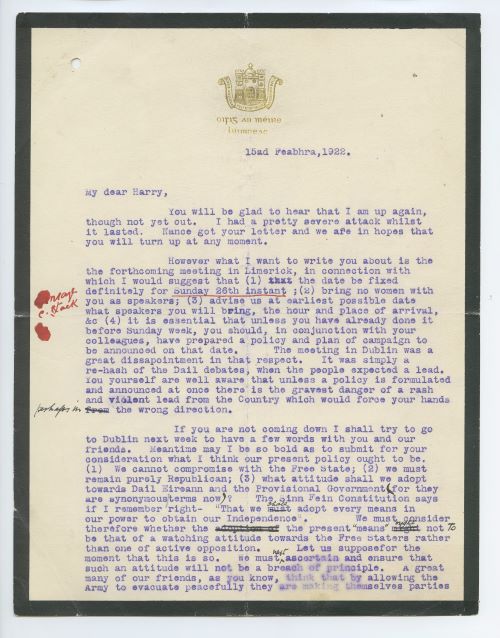
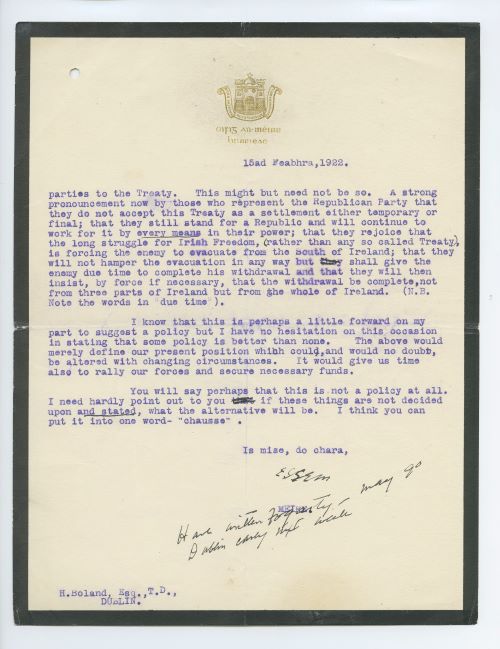
New Flag for the Irish Republic, 6 December 1921
This month's document to commemorate one hundred years since the end of the War of Independence in Ireland and the start of the Anglo-Irish Treaty negotiations of 1921, comes from a file relating to Harry Boland’s time in America at the time of the Treaty negotiations, there is a very interesting letter from John M. Flynn, Secretary of the Republic of Ireland Illinois Committee. The letter is dated 6 December 1921, a time of very serious political debate and tension in Ireland. At the same time Boland was experiencing the stresses and strains of being an Irish Republican stateman watching these historical events unfold from a distance. This humorous letter would have relieved those pressures for a fleeting moment, one would hope.
Flynn informs Boland of a Mr Geraghty, who despite having “never saw Ireland” has designed a new flag for the Republic. As the patent is pending, Flynn wonders if Ireland would have to pay a “royalty on its [own] flag”! The full letter and flag design can be seen below.
UCDA P150/1131. Papers of Eamon De Valera. Notice of the design of a new flag for the Irish Republic by a John J. Geraghty of the Ancient Order of Hibernians. Reproduced by kind permission of UCD-OFM Partnership.
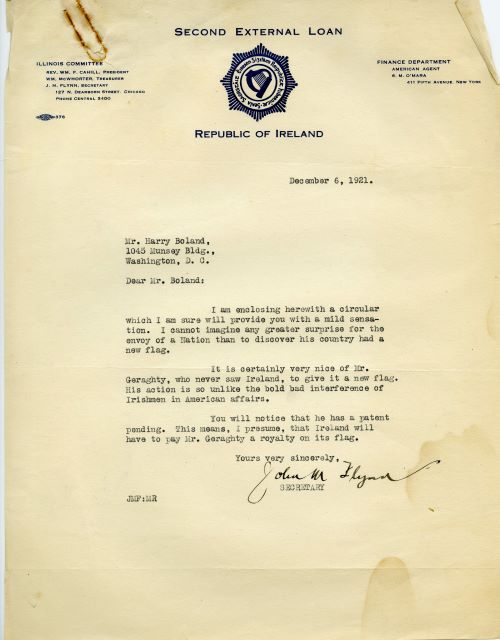
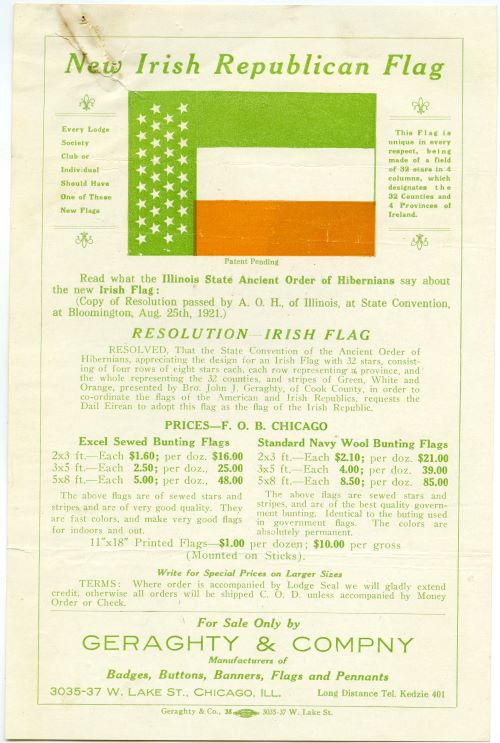
Anglo-Irish Treaty Negotiation Plenipotentiaries, 1921
To commemorate one hundred years since the end of the War of Independence in Ireland and start of the Anglo-Irish Treaty negotiations of 1921, UCD Archives over the coming months will showcase a variety of documents from our collections which give a more detailed insight into who was part of the negotiation team, what was discussed and how they reached, what became known as, The Treaty.
The photostat below is a copy of an official letter of appointment, in Irish and English, by Eamon De Valera of the five plenipotentiaries to negotiate the Treaty with the British government. The letter is dated 7 October 1921 and comes from the papers of Hugh Kennedy (P4) who attended the negotiations as Legal Adviser to the Provisional Government. The five negotiators were Arthur Griffith, Minister for Foreign Affairs, Michael Collins, Minister of Finance, Robert C. Barton, Minister for Economic Affairs, Edmund J. Duggan and George Gavan Duffy.
UCDA P4/196. Letter, in English and Irish, of appointment by Eamon de Valera, President of the Dáil, of the five plenipotentiaries to negotiate the Treaty.
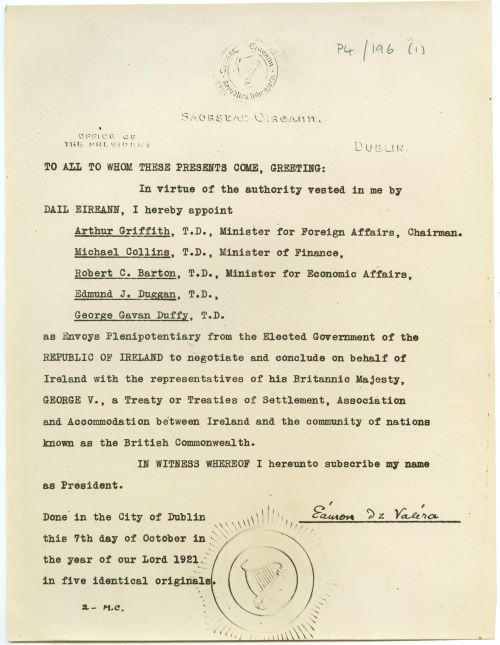
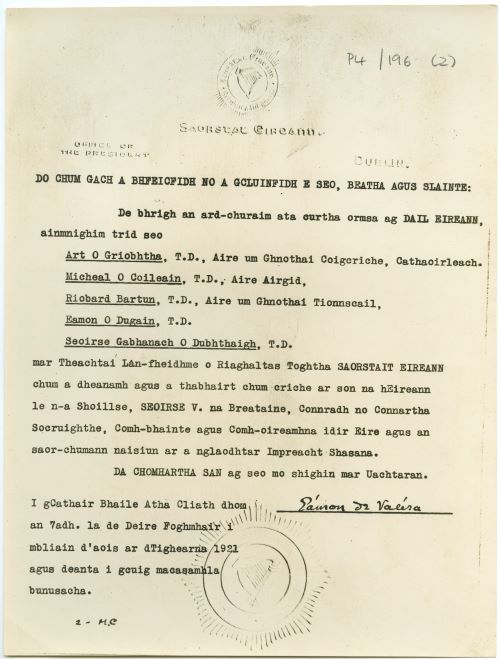
Death of Patrick White, Spike Island, 1921
On 31 May 1921 Patrick White, an internee on Spike Island, was shot by a sentry when retrieving a ball from the barbed wire surrounding the Recreation Ground.
This file of correspondence in the papers of Desmond and Mabel FitzGerald contains statements from fellow prisoners detailing the events that surrounded White's death. Accompanying these statements is a sketch of the Recreation Ground showing the exact location of the shooting. White's death was not accidental, according to Michael Collins, but a 'case of maliciously and intent firing to kill'.
Michael Collins' letter, a statement from William Forrestal, one of White's fellow internees, and the sketch of the Recreation Ground can be seen below. A full transcription follows.
UCDA P80/149. Michael Collins to FitzGerald, enclosing statements from H J O’Mahony, Prisoners’ Commandant, Spike Island, and seven other prisoners, concerning the fatal shooting on 31 May 1921 of an internee, Patrick White, Meelick, County Clare, by a sentry. 1 July 1921.
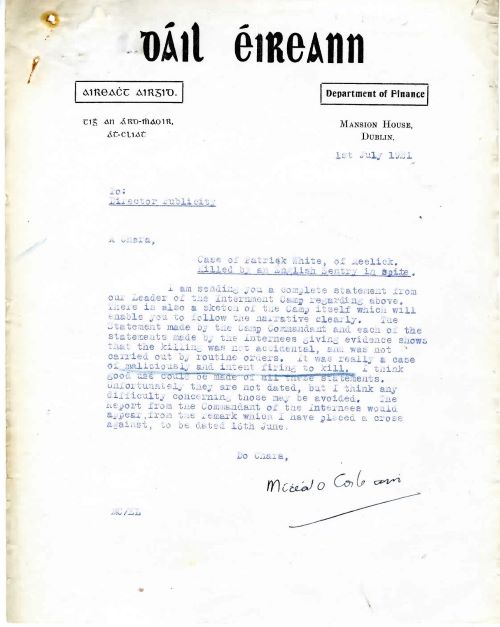
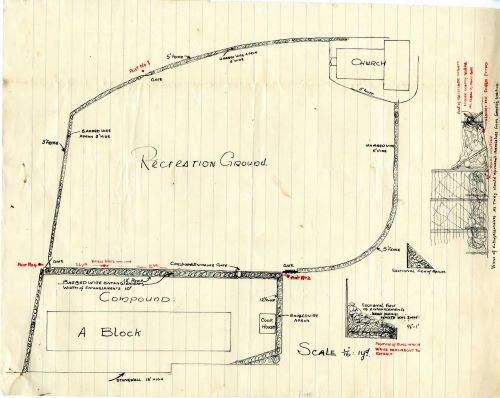
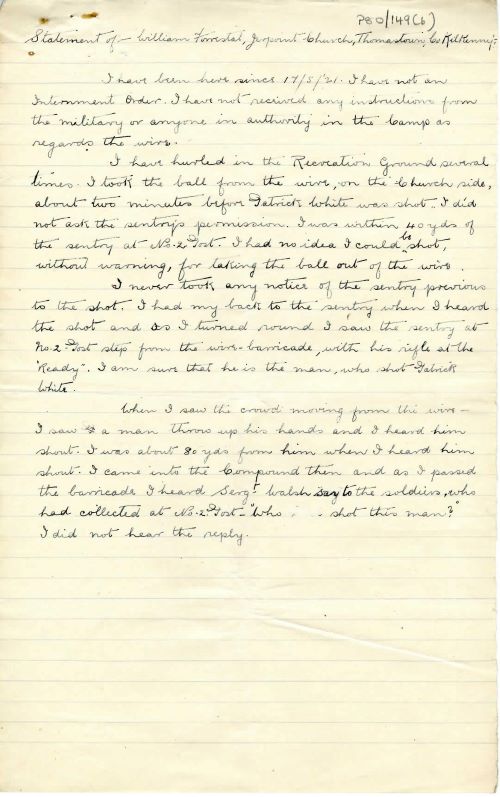
Statement of William Forrestal, Jerpoint Church, Thomastown, Co. Kilkenny
I have been here since 17/5/’21. I have not an Internment Order. I have not received any instructions from the military or anyone in authority in the camp as regards the wire.
I have hurled in the Recreation Ground several times. I took the ball from the wire, on the church side about two minutes before Patrick White was shot. I did not ask the sentry’s permission. I was within 40 yds of the sentry at No.2 Post. I had no idea I could be shot, without warning, for taking the ball out of the wire.
I never took any notice of the sentry previous to the shot. I had my back to the sentry when I heard the shot and as I turned round I saw the sentry at No.2 Post step from the wire-barricade, with his rifle at the “Ready”. I am sure that he is the man, who shot Patrick White.
When I saw the crowd moving from the wire – I saw a man throw up his hands and I heard him shout. I was about 80 yds from him when I heard him shout. I came into yje Compound then and as I passed the barricade I heard Serg.t Walsh say to the soldiers, who had collected at No.2 Post. “Who …. shot this man?” I did not hear the reply.
'Bianconi Coaches'
The focus of this month’s document is not on what is written in it but on who it is written by. The letter below is dated 12 July 1846 and was written in Clonmel, Co. Tipperary to Daniel O’Connell, ‘The Liberator’. The author is Charles (Carlo) Bianconi, who is widely regarded as the founder of public transport.
Bianconi was born Carlo Bianconi on 24 September 1786 in Costa Masnaga, Italy. After the 1798 Rebellion he made his way through England, landing in Ireland in 1802. As this was a time of continental unrest, restricted travel and unease of foreigners, he changed his name to Charles once he reached Ireland. He first worked as an engraver and printseller in Dublin, then set up his own engraving and print shop in Carrick-on-Suir in 1806, eventually settling in Clonmel in 1815. After the collapse of the mail couches system in Ireland in 1815, Bianconi saw his chance and established regular horse-drawn carriage services. The first service was from Clonmel to Cahir and took just two hours. The service became known as the ‘Bianconi coaches’.
In this letter Bianconi informs O'Connell that he does not agree with O'Connell's son being put forward for a contest in Dundalk, he writes that it 'would be monstrous I could never consent to it on public or private grounds'. A transcription of the letter is below.
UCDA P12/4/A/98. Letter from Charles Bianconi to Daniel O'Connell, 12 July 1846.
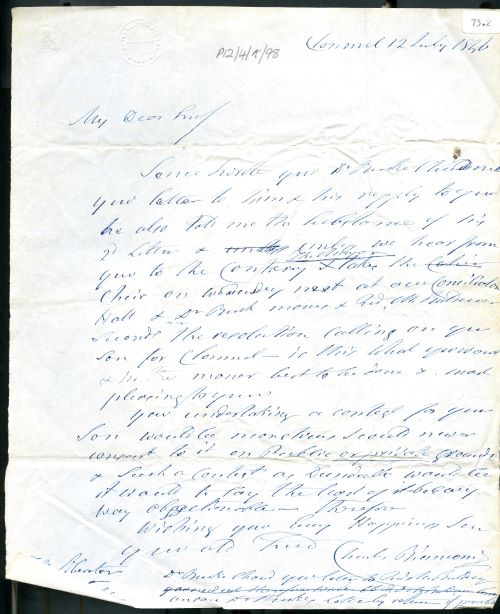
My Dear Sir,
Since I wrote you Dr Burke showed me your letter to him & his repply [sic] to you he also told me the [ ][ ] his 2nd letter & unless we hear from you to the contrary The Mayor takes the chair on Wednesday next at [ ] conciliation hall & Dr Burke moves &[ ] seconds the resolution calling on your son for Conmel – is this what you want & in the moner [sic] best to be done and most pleasing to you.
Your undertaking a contest for your son would be monstrous I could never consent to it on public or private grounds & such a contest as Dundalk would be it would to say the least of it every way objectionable – therefore.
Wishing you every happiness from your old friend.
Charles Bianconi
Dr Burke showed your letter to Rev. [ ] Dr Burke’s letter by reference if possible.
The Legend of 'Throwing the Ball of Fat'
Dr William Frazer was born in Dublin in 1824 and was educated for his profession as a surgeon at the Richmond School which was connected to the Richmond Hospital. He became a resident in the Richmond Hospital and was able to gain extensive practical experience in medicine and surgery while there. Later Frazer became a lecturer on Materia Medica in the Park Street Medical School and Carmichael Medical School.
He was an Examiner in Materia Medica in the Royal College of Surgeons in Ireland and ran a very busy general practise in Dublin City. As a keen antiquarian and collector, Frazer became involved in the Royal Irish Academy, partaking in meeting, giving lectures and was appointed the Academy’s Librarian in 1898. He was also a Fellow and Member of the Council of the Royal Society of Antiquaries of Scotland. The letter below was written to Frazer by a fellow member of this Scottish Society, John George Edward Henry Douglas Sutherland Campbell, 9th Duke of Argyll, also known as the Marquis of Lorne.
The Marquees was enquiring if Frazer had heard about the legend of ‘Throwing the Ball of Fat at the Charging Bear’. Unfortunately, he did not explain what this particular legend was, but he did include a drawing which can be seen below along with a transcription of the letter.
The papers of Dr William Frazer have been digitised and can be viewed on the UCD Digital Library here.
UCDA LA41/60. Letter from the Marquis of Lorne (Inveraray) to Dr William Frazer.
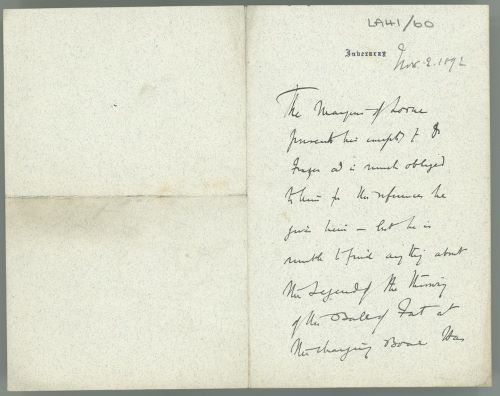
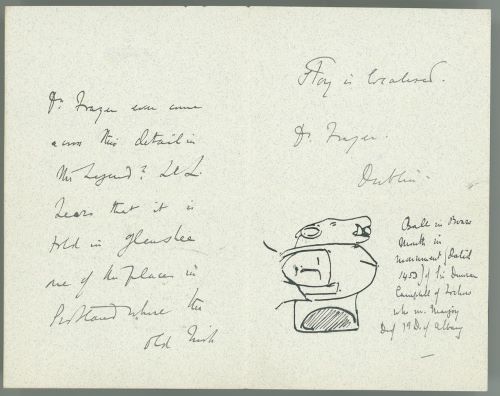
Nov.2.1892
The Marquess of Lorne presents his [?] to Dr Fraser and is much obliged to him for the references he given him – but he is unable to find anything about The Legend of the Throwing the Ball of Fat at the Charging Bear. Has Dr Fraser ever come across this detail in the Legends? MoL hears that it is told in Glenshee one of the places in Perth and where the Old Irish stay in ??
Dr Fraser, Dublin
[Description accompanying the drawing]
Ball in Boars mouth in monument (dated 1453) of Sir Duncan Campbell of Lochow who m. Margery Dau. of D. of Albany.
Illustrations of Lough Erne shrines
These beautiful illustrations come from the collection of Françoise Henry. Henry was born in Paris and studied at the École du Louvre under the great celticist, Henri Hubert. Her first major publication Les Tumulus du Départment de la Côte-d’Or was a comprehensive study of Iron Age burials. She studied Carolingian and medieval art with Emile Mâle and Henri Focillon and it was her interest in medieval art that led her to Ireland and University College Dublin.
Henry's career began in UCD as an exchange lecturer in the Department of French in 1934. By the 1940s she was lecturing in Archaeology and European Art, working on a study of Irish antiquities and accumulating a large collection of illustrations of Irish art, mainly in the form of photographic negatives and prints. Some years later Dr Henry became Director of Studies in Archaeology and the History of European Painting. The nucleus of what is now the History of Art Department in University College Dublin is to be found in the Purser-Griffith lecture series on European painting which she began in 1934.
She published a number of works on early Irish art which combined her brilliant knowledge of manuscripts, sculpture and metalwork in brilliant synthesis. The images below are taken from a large number relating to the Emly, Moymusk, Roscommon, Shannon and Lough Erne Shrines. To see more, please click into the UCD Digital Library here.
P182/101. Notes and pictures relating to the Emly, Moymusk, Roscommon, Shannon and Lough Erne Shrines.
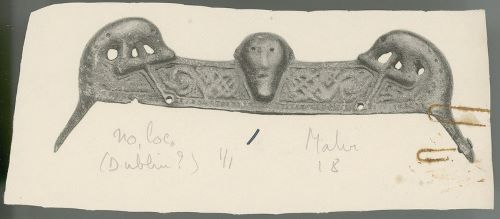
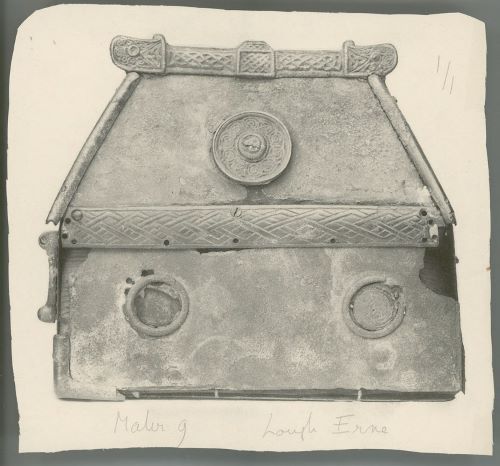
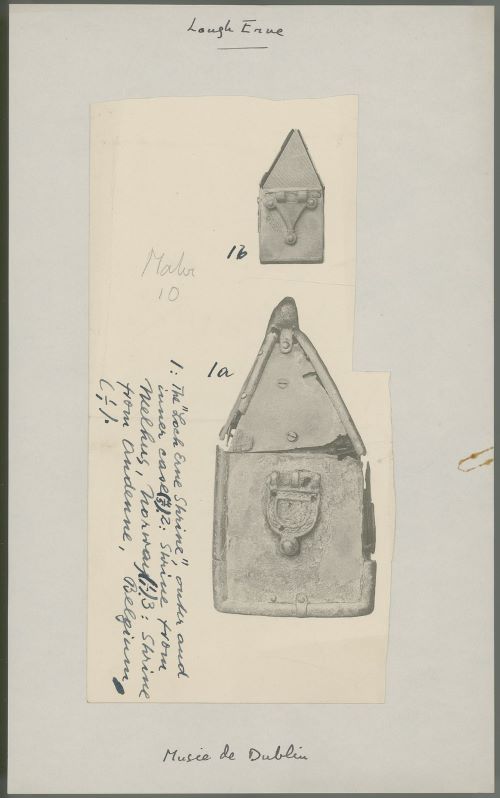
1: The “Lough Erne Shrine” outer and inner case (4/5) 2: Shrine from Melhus, Norway (1/1) 3: Shrine from Andenne, Belgium (1/1).
Dancing on St Patrick's Day
Michael Tierney was born in 1894 in Co. Galway. He was educated at UCD and studied classics at the Sorbonne, Athens and Berlin. In 1915 he was appointed to a lectureship in classics in UCD and in 1923 to the Professorship of Greek. Tierney was an elected TD for North Mayo and the National University of Ireland. He was a member of Seanad Éireann, 1938–44 and was elected President of UCD in 1947.
Tierney married Eibhlín MacNeill, daughter of Eoin MacNeill. MacNeill was a founder member of the Gaelic League in 1893. He was appointed the first Professor of Early including Medieval Irish History in University College Dublin in 1908, a position he held until 1941. MacNeill was Commander in Chief of the Irish Volunteers and was unaware of the planning for the Easter Rising. On the Sunday Morning of the Rising he issued an order countermanding the mobilisation. Arrested and sentenced to life imprisonment, he was released in the general amnesty of 1917. MacNeill was an elected M.P. for Derry City and the NUI in the 1918 general election.
The photograph below is taken from a collection fo over 500 images, known as the Tierney/MacNeill Photograph Collection (LA30/PH). This year, as with last year, we will not be able to celebrate St Patrick's Day in the usual manner with song, music and dance. But by looking at this photograph we can reminisce about and look forward to the St Patrick's Day festivities yet to come.
UCDA LA30/PH/23. Photographs of set dancers at St Patrick's Day celebrations in Earlsfort Terrace, Dublin.
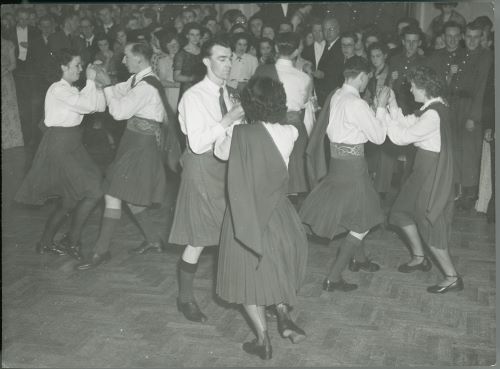
Arbour Hill Prison Routine, c. 1934
Joe Dennigan was born in Ballycormack, County Longford in 1910. In his early career as a journalist, he worked for the regional press, namely The Longford Leader from 1925–8, and The Offaly Chronicle from 1929–30. On the formation of The Irish Press, he moved to Dublin to become its political correspondent.
In 1933, the Government outlawed General Eoin O'Duffy's Young Ireland Association, formerly known as the National Guard and commonly referred to as the Blueshirts. Dennigan wrote an article for The Irish Press on the announcement of the proclamation and stated that a government source had informed him that a few days grace to leave the Association would be given to its members. In a trial of one of the Blueshirts members, Dennigan steadfastly refused to reveal the information citing professional ethics as his main reason. As a result he was sentenced to a month's imprisonment in Arbour Hill Detention Barracks and became the first journalist in Irish history to be imprisoned for not disclosing his sources.
In Arbour Hill there was a well established and strict daily routine, as can be seen in the notice below. In these strange times in which we are living, a daily routine can be of great benefit to one's mental and physical health. But one as strict as Dennigan's may be going too far!
UCDA P188/10. Notice outlining prison routine in Arbour Hill Detention Barracks, c. January 1934.
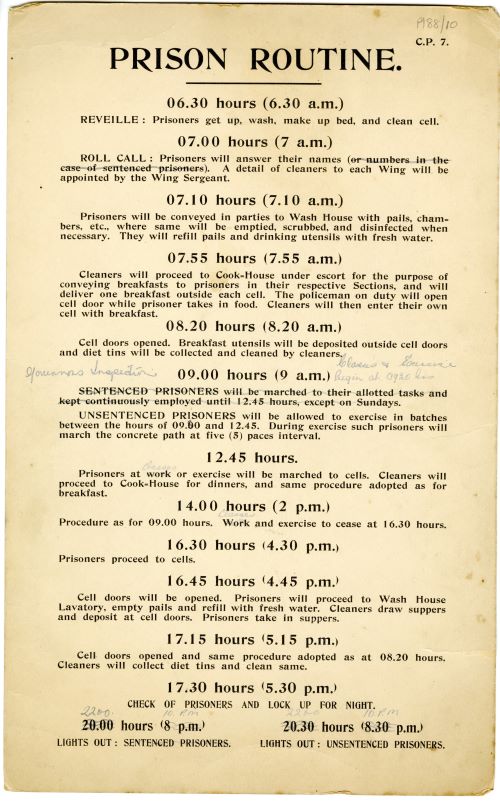
A Look of Hope
To ease ourselves into the New Year, the first document of the month is a photograph of Erskine Childers and Eamonn Duggan taken from Desmond FitzGerald Photographs Collection (UCDA/P80/PH). The photo is of the two men looking out of the window of a cab in London and is dated 1921. As both men were members of the delegation who negotiated The Treaty with Lloyd George's government during that period, we may presume the photo was taken during that tense time of talks.
Both Childers and Duggan are focused on what lies ahead of them, a hugely important and signifigant task which could bring peace to the island of Ireland and a bright future for her people. Last year has left many people bruised and battered, but we must all look ahead to 2021 with the same determination and hope as Childers and Duggan did 100 years ago.
UCDA P80/PH/172. Press photograph by the Daily Sketch of Erskine Childers and Eamonn Duggan looking out of the window of a cab. Desmond FitzGerald Photographs.
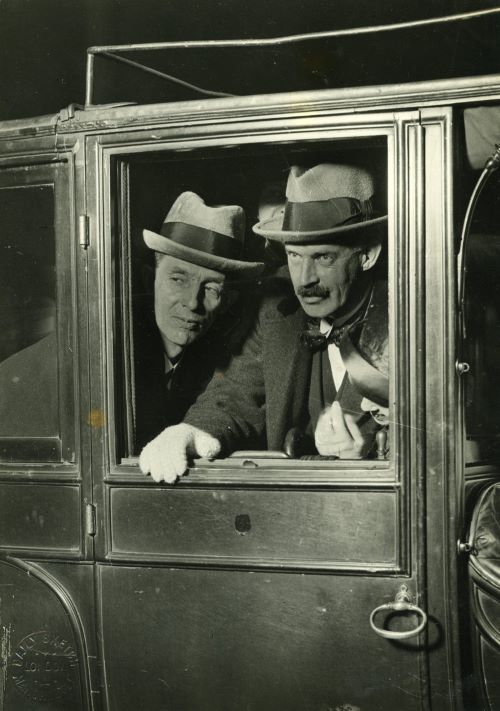
‘Peter the Painter’
The majority of those who fought in Ireland's struggle for independence, had never handled weapons before. In order to train these individuals how to handle the various types of guns available to Republican fighters, training memorandum were issued. These memo explained how to clean your weapon, strip and reassemble it and to load it. One such memorandum can be seen below, it refers to the German Mauser automatic pistol or 'Peter the Painter' as it was commonly known.
This memorandum comes from the papers of Thomas Cardiff (UCDA P113), a member of the IRA's Dublin Brigade. Cardiff took the republican side during the Civil War and when arrested in 1922 spent time in Wellington Barracks, Maryboro Prison and the Curragh.
UCDA P113/14. Training memorandum issued by the Director of Training, CHQ, 24 November 1921.
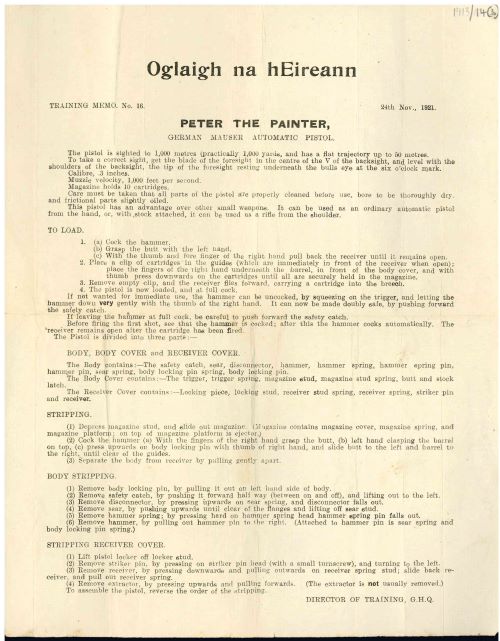
Death of the Lord Mayor of Cork, Terence MacSwiney
Terence MacSwiney, Lord Mayor of Cork, was born in Cork and educated at North Monastery Christian Brothers’ School and the Royal University of Ireland. MacSwiney was a founder member of the Cork Celtic Literary Society in 1901 and, with Daniel Corkery, of the Cork Dramatic Society in 1908, for which he wrote several plays. A principal figure in the formation of the Irish Volunteers in Cork in 1913, he was employed as a full-time organiser from 1915 and elected to the First Dáil as member for Mid-Cork.
Following the murder of Tomás MacCurtain in March 1920, MacSwiney was elected Lord Mayor of Cork. Arrested under the Defence of the Realm Act in August 1920 and sentenced to two years imprisonment, he embarked on a hunger strike in Brixton Jail and after 74 days, he died on 24 October 1920 at the age of 41.
Having sat by Terence's side through his ordeal, his sisters Mary MacSwiney and Annie were denied entry to see him in his final days. This letter was written by Father Dominic O’Connor OFM Cap., Chaplain at Brixton Prison, three hours after Terence died, informing the MacSwiney sisters that their beloved brother had 'completed his sacrifice for Ireland'.
A full transcription is below.
UCDA P48b/111 Papers of Mary MacSwiney.
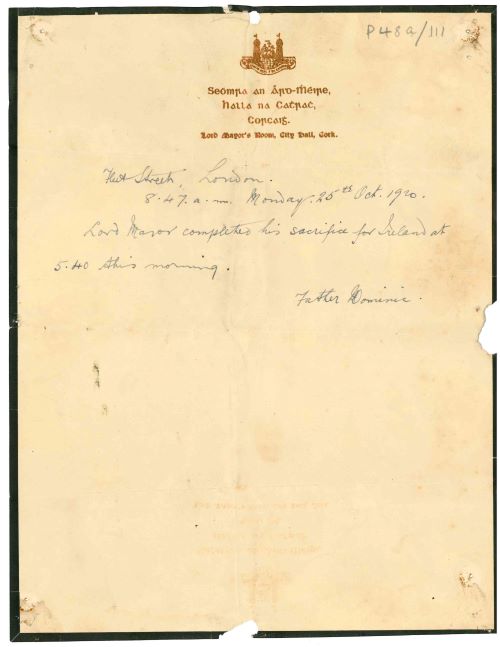
Fleet Street, London
8.47 a.m, Monday 25th Oct., 1920
Lord Mayor completed his sacrifice for Ireland at 5.40 this morning.
Father Dominic.
'I Would Not Have You in my Place for Anything...'
In a letter to his friend Cathal Brugha dated 30 September 1920, Terence MacSwiney, Lord Mayor of Cork, wrote the words
'I would not have you in my place for anything...'
MacSwiney was nearing 50 days on hunger strike in Brixton Prison when he wrote this moving letter.
Born in Cork and educated at North Monastery Christian Brothers’ School and the Royal University of Ireland, MacSwiney was a founder member of the Cork Celtic Literary Society in 1901 and, with Daniel Corkery, of the Cork Dramatic Society in 1908, for which he wrote several plays. A principal figure in the formation of the Irish Volunteers in Cork in 1913, he was employed as a full-time organiser from 1915 and elected to the First Dáil as member for Mid-Cork.
After the murder of Tomás MacCurtain in March 1920, MacSwiney was elected Lord Mayor of Cork. Arrested under the Defence of the Realm Act in August 1920 and sentenced to two years imprisonment, he embarked on a hunger strike in Brixton Jail and died on 24 October 1920 at the age of 41.
The writing is very faint so a transcription is below.
UCDA P48b/416 Papers of Terence MacSwiney.
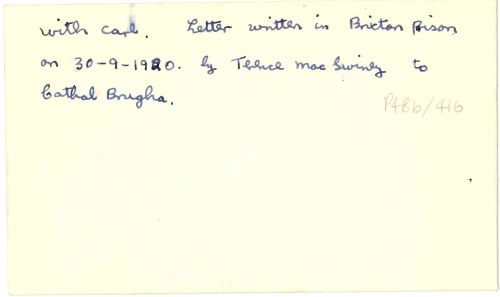
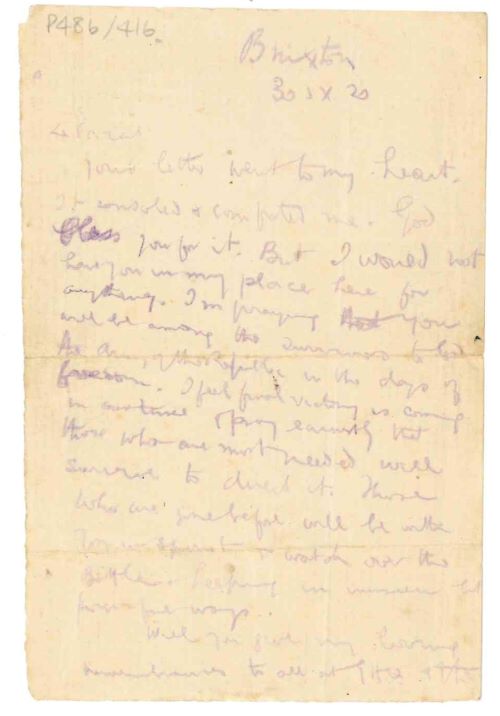
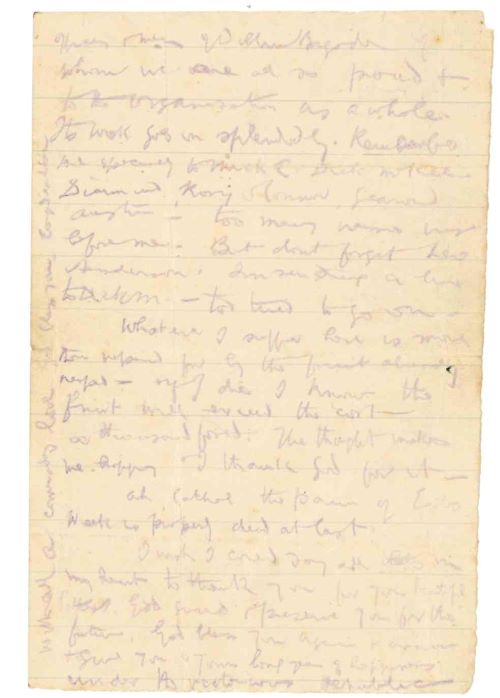
Brixton
30.ix.20
A cara,
Your letter went to my heart, it consoled & comforted me. God bless you for it. But I would not have you in my place here for anything. I’m praying that you will be among the survivors to lead the Army of the Republic in the days freedom. I feel final victory is coming in our time & pray earnestly that those who are most needed will survive to direct it. Those who are gone before will be with you in spirit & watch over the [?] sleeping in [?] but forever our ways.
Will you give my loving remembrance to all at GHQ & those men from [?] Brigade whom we are all so proud & to the organisation as a whole. Its work goes on splendidly. Remember me specially to Mick C., Dick McKee, Diarmuid, Rory O’Connor, Gerard, Austin – too many names lay before me. But don’t forget Leo Anderson. I’m sending a line to [?] – too tired to go on.
Whatever I suffer love is more than repaid for by the fruit already [?] – if I die I know the fruit will exceed the cost – a thousand fold. The thought makes me happy. I thank God for it -
Ah Cathal the pain of Easter Week is [?] dead at last.
I wish I could say all thats in my heart to thank you for your beautiful letters. God guard & preserve you for the future. God bless you again & again & give you & yours long life & happiness under a victorious Republic.
With all a comrades love, bless you Tourdealbac
St Enda's School, Rathmines, Dublin
The opening of a new school is a time of great excitement for all those involved; teachers, students and parents alike. But those who founded the school face the difficulties of securing backers, establishing a steady stream of funding, employing experienced teachers and driving the success of the school. Padraig Pearse faced these same challenges when he founded Scoil Eanna or St Enda's School in Cullenswood House, Dublin in 1908.
Below is a letter accompanied by a circular outlining the objectives of St Enda's School and how these would be achieved through the Irish language and with an entirely Irish ethos. The letter is addressed to Professor William Magennis, the chair of metaphysics in UCD, and Pearse is requesting that Magennis become a member of the Board of Governors. Pearse believes that Magennis' involvement would ensure success for the new school and adds "I think it is a thing worth doing, and worth doing well".
UCDA P43/1 Archives of St Enda's School.
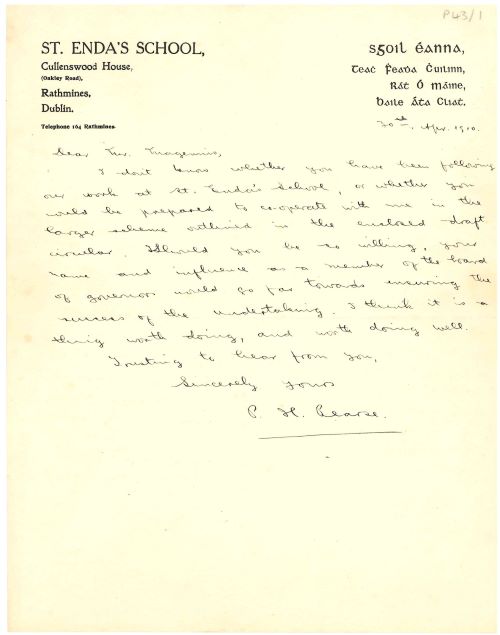
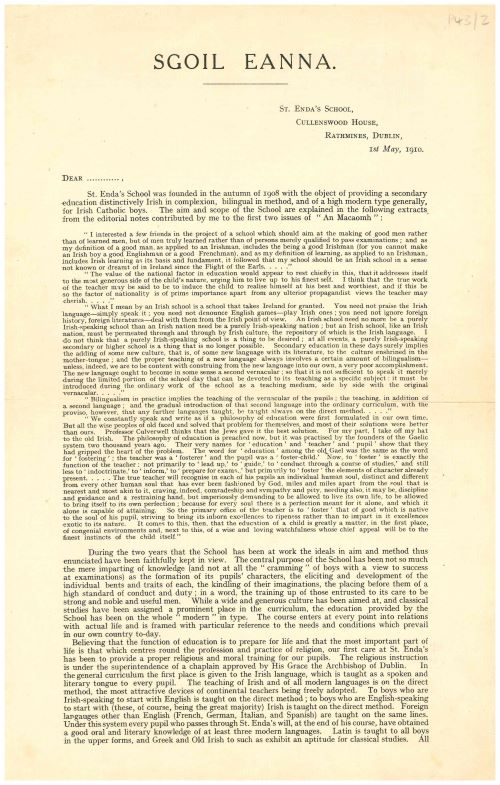
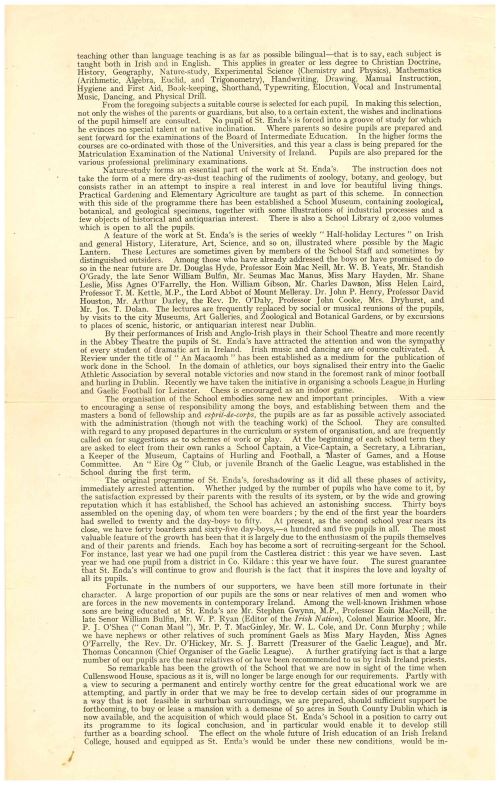
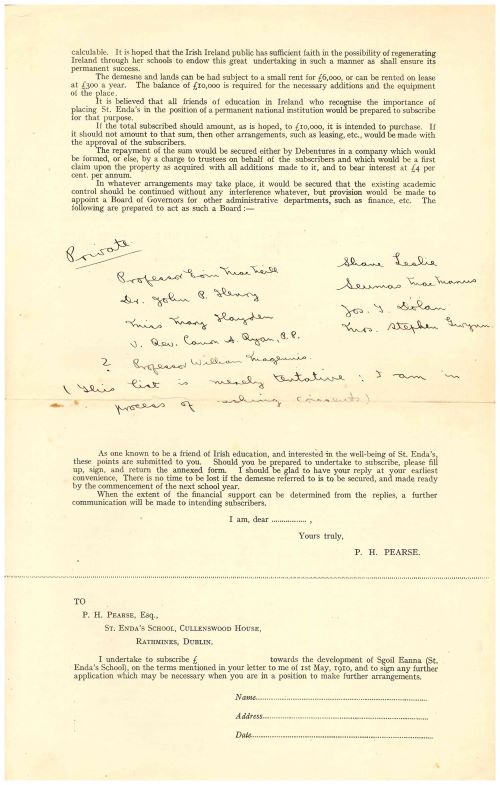
Dear Mr Magennis,
I don’t know whether you have been following our work at St. Enda’s School, or whether you would be prepared to co-operate with me in the larger scheme outlined in the enclosed draft circular. Should you be so willing, your name and influence as a member of the board of governors would go far towards ensuring the success of the undertaking. I think it is a thing worth doing, and worth doing well.
Trusting to hear from you,
Sincerely yours,
P. H. Pearse.
Private
Professor Eoin MacNeill Shane Leslie
Dr John P. Henry Seumas MacManus
Miss Mary Hayden Jos. J. Dolan
V. Rev. Canon A. Ryan, P.P. Mrs Stephen Gwynn
? Professor William Magennis
(This list is merely tentative: I am in the process of asking comments)
Notice From the Censorship of Publications Board
During lockdown many of us have not only been writing letters but have also been experimenting with baking, digging out old musical instruments and dusting off classic books we always meant to read.
However, if this pandemic had taken place in 1959, there were a number of books on the Irish Censorship Board of Publications list (some considered classics) which you could not have sat back and enjoyed. They included 'East of Eden' by John Steinbeck,'The African Queen' by C.S. Forester and works by F. Scott Fitzgerald, Ernest Hemingway, Robert Graves, Vladimir Nabokov and D.H. Lawrence to name a few. That's not to say illegal copies of these banned books were not in circulation around Ireland, they most certainly were! The Board had to track these down and issue destruction notices to the owners.
One such destruction notice is be found in the records of the Literary and Historical Society in UCD which are held in UCD Archives. The notice can be seen in full below. The L&H was alleged to be in possession of a copy of Nabokov's infamous novel 'Lolita' and if they did not send it for destruction they would face a very severe punishment!
UCDA SOC2/49 (17) Records of the Literary and Historical Society.
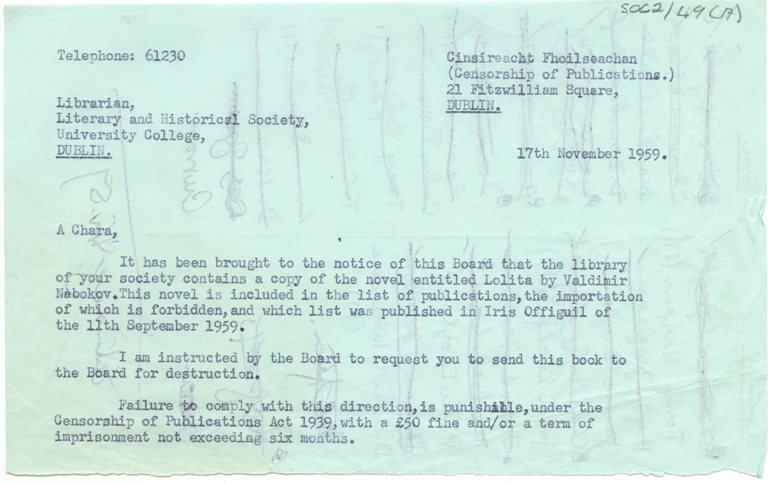
Letter from T.W.T Dillon to His Father, John
In this time of social distancing and cocooning, people are communicating with each other through social media, online platforms and even by the 'old fashioned' method of hand-writing letters and postcards. In the early 1920s T.W.T. Dillon, a UCD medical graduate who had won a travelling studentship in pathology, was not in good health. Fearing he had bone tuberculosis, he travelled to the Institut Francois de Sales, Berck Plage in northern France, to seek treatment. While there, Dillon, entered into an extensive correspondence with his father, John, land agitator and nationalist politician. A feature of this correspondence is that John Dillon often writes on the letters when he wrote back to T.W.T. Before leaving London for France, T.W.T. wrote the letter below informing his father of the health of his maternal uncle, Charles and its effect on his campaigning in the UK elections; and giving his unflattering opinion on a new article by [Eoin] MacNeill.
A full transcription can be found below.
UCDA P126/7 Papers of T.W.T Dillon.
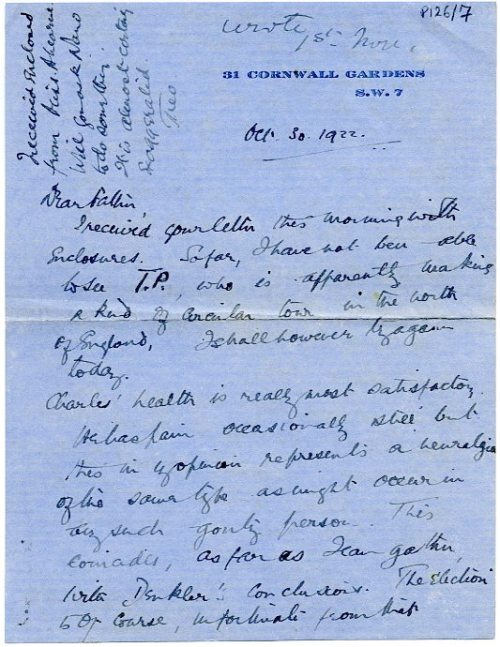
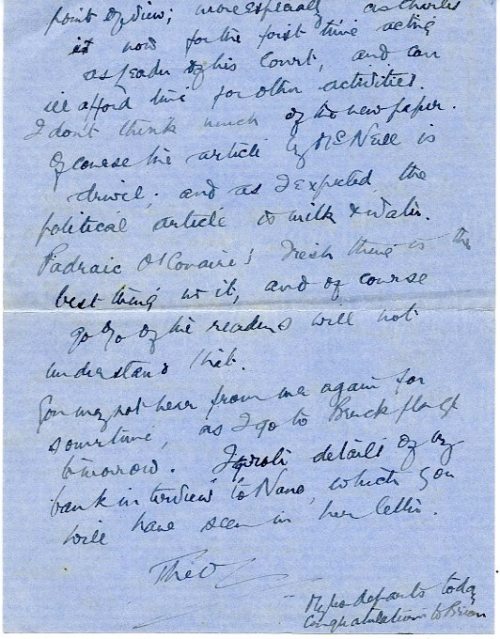
Wrote 1st Nov
31 Cornwall Gardens,
S.W.7.
Oct. 30 1922,
I received enclosed from Miss Ahearne.
Will you ask Nano to do something.
It is almost certainly exaggerated. Theo.
Dear father,
I received your letter this morning with enclosures. So far, I have not been able to see T.P.,* who is apparently making a circular tour in the north of England, I shall however try again today.
Charles'** health is really most satisfactory, he has pain occasionally still but this in my opinion represents a neuralgia of the same type as might occur in any such gouty person. This coincides, as far as I can gather with Dsukler’s conclusions. The election is of course, unfortunate from this point of view; more especially as Charles is now for the first time acting as Leader of his Court, and can ill afford time for other activities. I don’t think much of the new paper. Of course the article by McNeill is drivel; and as I expected the political article is milk & water. Padraic O’Conaire’s Irish thing is the best thing in it and of course 90% of the readers will not understand that.
You may not hear from me again for some time, as I go to Berck Plage tomorrow. I wrote details of my bank interview to Nano, which you will have seen in her letter.
Theo
Myles departs today.
Congratulations to Brian.
* T.P. O'Connor, MP, Irish Parliamentary Party.
** Charles Mathew, KC, briefly MP, Labour Party. He was standing for election when this letter was written.
Copy of the Speech Made at the Conferring of Irish Citizenship on Dr Tiede & Mrs Elisabeth Herrema at Áras an Uachtaráin in 1975
Tiede Herrema, a Dutch citizen, was a member of the Dutch resistance during WWII. He survived arrest by the Nazis and deportation to a concentration camp in Poland.
He was later, the managing director of the Limerick factory, Ferenka. He was kidnapped by the IRA on 3 October 1975 and was held hostage for 36 days. Elisabeth, his wife, agreed with the Cosgrave government that the ransom should not be paid. She was flown out of Ireland for her safety and she persuaded the Dutch government that Ireland could deal with the kidnapping.
Tiede Herrema was released following a two-week siege outside a house in Monasterevin, Co. Kildare.
Both Tiede and Elisabeth Herrema died in April 2020.
UCDA P51/164 Papers of Cearbhall Ó Dálaigh, 11 December 1975. Speech conferring Irish Citizenship on Tiede and Elisabeth Herrema.
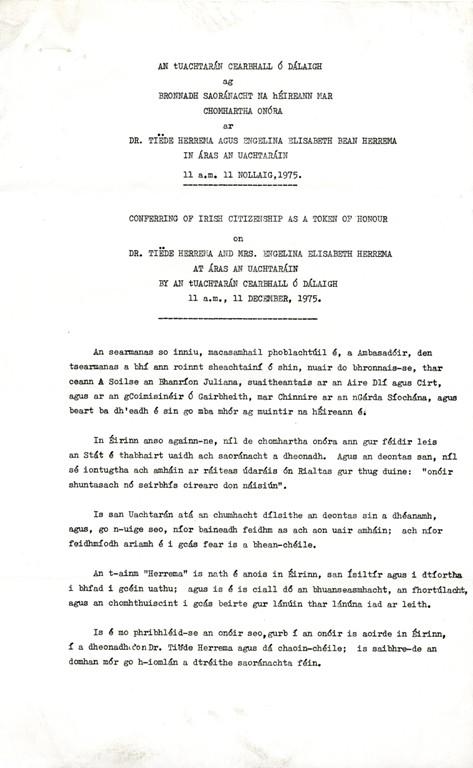
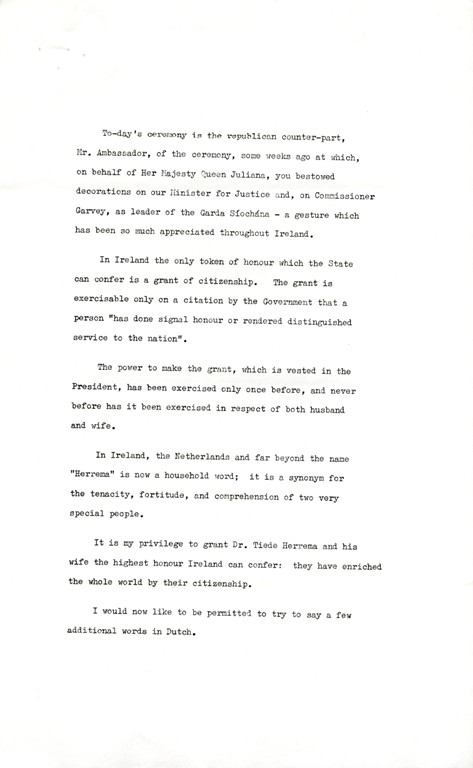
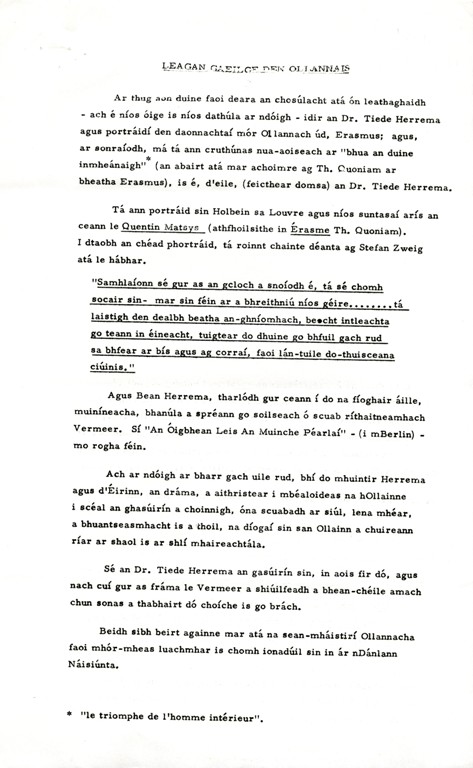
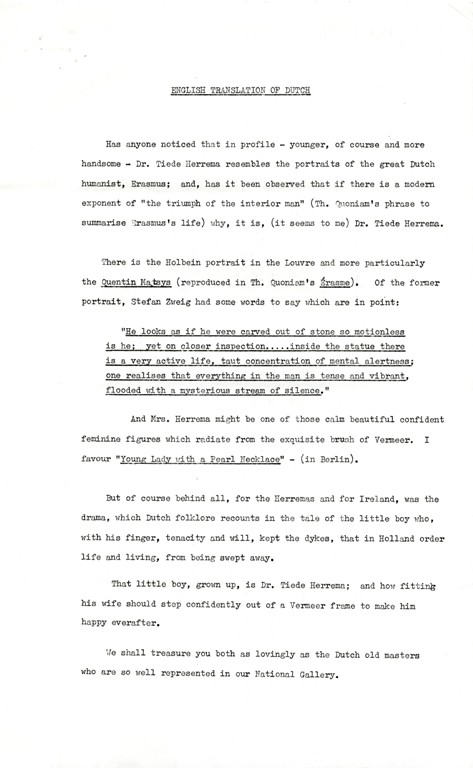
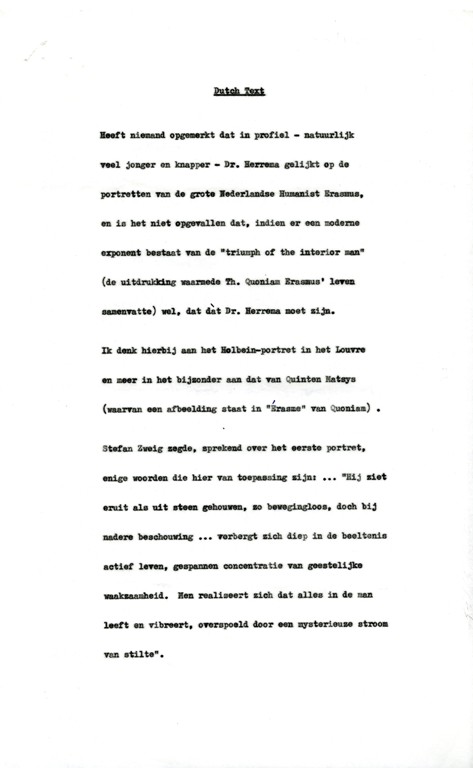
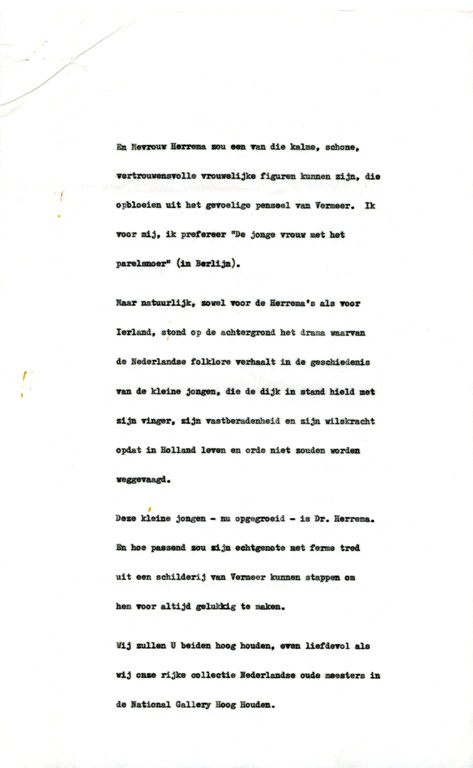
Photographs of Ernie O'Malley
Two head and shoulders photographs of Ernie O’Malley, one sideways, one full face, labeled ‘B. Stuart’ which form part of the Papers of Prof. F.X. Martin, osa. The photographs are annotated on the reverse: “Bertie Stuart” is Ernie O’Malley. It was under the name B.S. that he was held prisoner by the Black and Tans in 1921. When he escaped from jail they issued these snaps to Black and Tans and Auxiliaries. One Auxiliary gave these to Major Michael Doyle of the Irish Republican Army. He presented them to F.X. Martin BA in June 1960’. The glassine envelope in which the photographs were kept is annotated ‘I will lose these snaps as I have lost many more if somebody doesn’t take them. MD’ [Michael Doyle].
UCDA P189/400 Papers of F.X. Martin, Photographs of Ernie O’Malley.
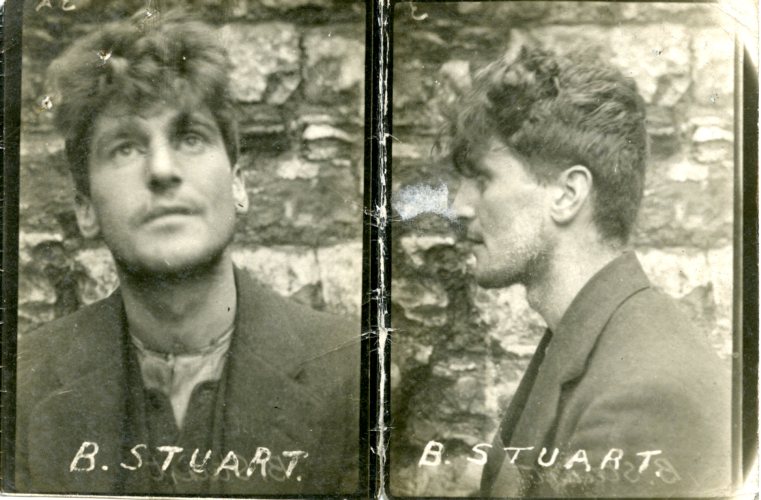
International Women’s Day
To celebrate International Women's Day UCD Archives Document of the Month is a letter written by the author and journalist Mairin Mitchell. There is a lengthy correspondence between Mitchell and Desmond Ryan in his papers, where they discuss literary and political matters, with particular reference to Mitchell’s own writing (UCDA LA10/146, January 1933–July 1946, 73 items).
Mitchell wrote to Demond Ryan in February 1940 berating him for his comparison of the situation in Northern Ireland with Dachau, the Nazi concentration camp. She also raised a number of other issues around Ryan's opinions on British Rule, internment camps and how some Irish people were pro-Hitler. Mitchell made her own feelings known about the situation in Europe when she wrote...
'And that, speaking personally, Hitler's talk of annihilating France, and the whole Nazi scheme of Pan Germanism, was so appalling, that if I were a man, and didn't shrink from the whole idea of war, I would go and fight for France.'
It has been very difficult to find any biographical information on Mairin Mitchell so we ask anyone to please get in contact with UCD Archives if you can provide any. We would greatly appreciate it archives@ucd.ie
A full transcription can be found below.
UCDA LA10/146 Papers of Desmond Ryan.
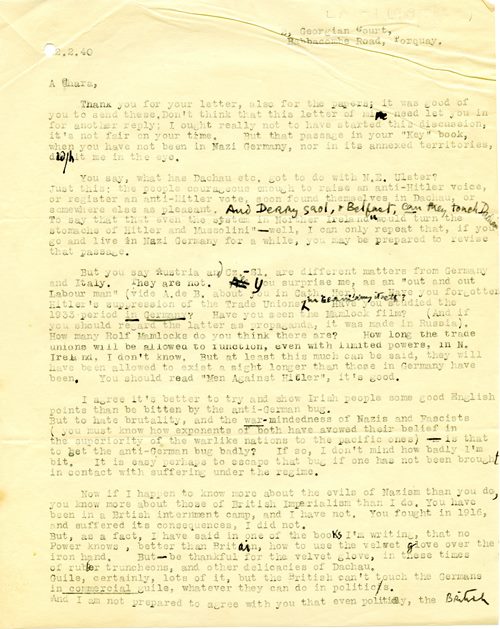
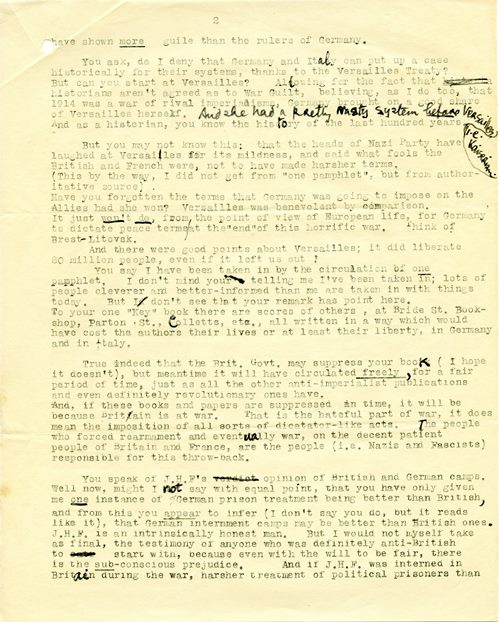
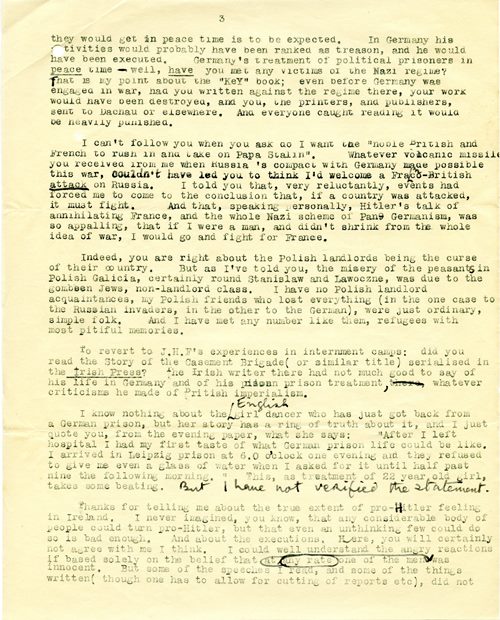
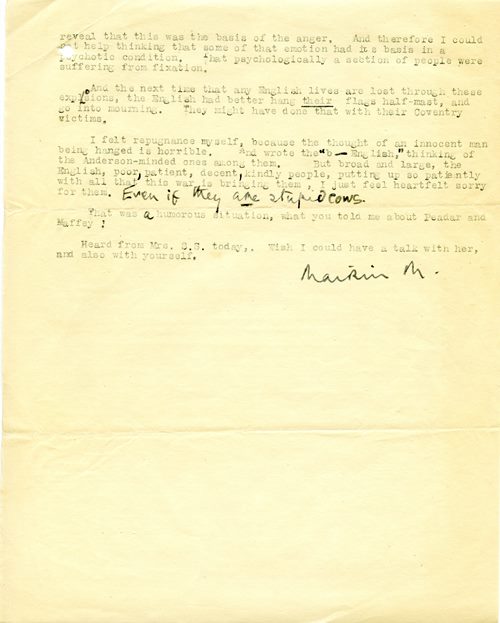
p.1
2 Georgian Court,
Babbacombe Road,
[2].2.40
A Chara,
Thank you for your letter, also for the papers; it was good of you to send these. Don’t think that this letter of mine need let you in for another reply; I ought not to have started this discussion, it’s not fair on your time. But that passage in your “Key” book, when you have been in Nazi Germany, not in its annexed territories, didn’t hit me in the eye.
You say, what has Dachau etc. got to do with N.E. Ulster? Just this: the people courageous enough to raise an anti-Hitler voice, or register an anti-Hitler vote, soon found themselves in Dachau, or somewhere else as pleasant. And Derry gaol, & Belfast, can they touch Dachau?
To say that even the system in Norther[n] Ireland “would turn the stomachs of Hitler and Mussolini”—well, I can only repeat that, if you go and live in Nazi Germany for a while, you may be prepared to revise that passage.
But you say Austria and Cz.-Sl. [Czechoslovakia] are different matters from Germany and Italy. They are not. You surprise me, as an “out and out Labour man” (vide A. de. B. [1] about you in the Cath. Her.[2]). Have you forgotten Hitler's suppression of the Trade Unions in Germany itself? Have you studied the 1933 period in Germany? Have you see the Mamlock [3] film? (And if you should regard the latter as propaganda, it was made in Russia). How many Rolf Mamlocks do you think there are? How long the trade unions will be allowed to function, even with limited powers, in N. Ireland, I don’t know. But at least this much can be said, they will have been allowed to exist a sight longer that those in Germany have been. You should read “Men Against Hitler” [4], it’s good.
I agree it’s better to try and show Irish people some good English points than to be bitten by the anti-German bug. But to hate brutality, and the war-mindedness of Nazis and Fascists (you must know how exponents of both have avowed their belief in the superiority of the warlike nations to the pacific ones)—is that to get the anti-German bug badly? If so, I don’t mind how badly I’m bit. It is easy perhaps to escape that bug if one has not been brought in contact with suffering under the regime.
Now if I happen to know more about the evils of Nazism than you do, you know more about those of British Imperialism than I do. You have been in a British internment camp, and I have not. You fought in 1916, and suffered its consequences, I did not. But, as a fact, I have said in one of the books I’m writing, that no Power knows, better than Britain, how to use the velvet glove over the iron hand. But—be thankful for the velvet glove, in these times of rubber truncheons, and other delicacies of Dachau. Guile, certainly, lots of it, but the British can’t touch the Germans in commercial guile, whatever they can do in politics. And I am not prepared to agree with you that even politically, the British
p.2.
have shown more guile than the rulers of Germany.
You ask, do I deny that Germany and Italy can put up a case historically for their systems, thanks to the Versailles Treaty [5]? But can you start at Versailles? Allowing for the fact that historians aren’t agreed as to War Guilt, believing, as I do too, that 1914 was a war of rival imperialisms, Germany brought on a good share of Versailles herself. And she had a pretty nasty system before Versailles, i.e. Kaiserism. And as a historian, you know the history of the last hundred years.
But you may not know this: that the heads of Nazi Party have laughed at Versailles for its mildness, and said what fools the British and French were, not to have made harsher terms. (This by the way, I did not get from “one pamphlet”, but from authoritative source). Have you forgotten the terms that Germany was going to impose on the Allies had she won? Versailles was benevolent by comparison. It just won’t do, from the point of view of European lifer, for Germany to dictate peace terms at the “end” of this horrific war. Think of Brest-Litovsk [6].
And there were good points about Versailles; it did liberate 80 million people, even if it left us out!
You say I have been taken in by the circulation of one pamphlet. I don’t mind your telling me I’ve been taken in; lots of people cleverer and better-informed than me are taken in with things today. But I don’t see that your remark has point her. To you one “Key” book there are scores of others, at Bride St. Bookshop, Parton St., Colletts, etc., all written in a way which would have cost the authors their lives or at least their liberty, in Germany and Italy.
True indeed that the Brit. Govt. may suppress you book (I hope it doesn’t), but meantime it will have circulated freely, for a fair period of time, just as all the other anti-imperialist publications and even definitely revolutionary ones have. And, if these books and papers are suppressed in time, it will be because Britain is at war. That is the hateful part of war, it does mean that imposition of all sorts of dictator-like acts. The people who forced rearmament and eventually war, on the decent patient people of Britain and France, are the people (i.e. Nazis and Fascists) responsible for this throw-back.
You speak of J.H.F’s [7] opinion of British and German camps. Well now, might I not say with equal point, that you have only given me one instance of German prison treatment being better than British, and from this you appear to infer (I don’t say you do, but it reads like it), that German internment camps may be better than British one. J.H.F. is an intrinsically honest man. But I would not myself take as final, the testimony of anyone who was definitely anti-British to start with, because even with the will to be fair, there is the sub-conscious prejudice. And if J.H.F. was interned in Britain during the war, harsher treatment of political prisoners than
p.3.
they would get in peace time is to be expected. In Germany his activities would probably have been ranked as treason, and he would have been executed. Germany’s treatment of political prisoners in peace time — well, have you met any victims of the Nazi regime? That is my point about the “Key” book; even before Germany was engaged in war, had you written against the regime there, your work would have been destroyed, an you, the printers, and publishers, sent to Dachau or elsewhere. And everyone caught reading it would be heavily punished.
I can’t follow you when you ask do I want the “noble British and French to rush in and take on Papa Stalin”. Whatever volcanic missile you received from me when Russia’s compact with Germany made possible this war, couldn’t have led you to think I’d welcome a Franco-British attack on Russia. I told you that, very reluctantly, events had forced me to come to the conclusion that, if a country was attacked, it must fight. And that, speaking personally, Hitler’s talk of annihilating France, and the whole Nazi scheme of Pan Germanism, was so appalling, that if I were a man, and didn’t shrink from the whole idea of war, I would go and fight for France.
Indeed, you are right about the Polish landlords being the curse of their country. But as I’ve told you, the miser of the peasants in Polish Galicia, certainly round Stanislaw and Lawoczne, was due to the gombeen Jews [8], non-landlord class. I have no Polish landlord acquaintances, my polish friends who lost everything (in the one case to the Russian invaders, in the other to the German), were just ordinary, simple folk. And I have met any number like them, refugees with most pitiful memories.
To revert to J.H.F’s experiences in internment camps: did you read the Story of the Casement Brigade [9] (or similar title) serialised in the Irish Press? The Irish writer there had not much good to say of his life in Germany and of his prison treatment, whatever criticisms he made of British imperialism.
I know nothing about the English girl dancer who has just got back from a German prison, but her story has a ring of truth about it, and I just quote you, from the evening papers, what she says: “After I left hospital I had my first taste of what German prison life could be like. I arrived in Leipzig prison at 6.0 o’clock one evening and they refused to give me even a glass of water when I asked for it until half past none the following morning.”[10] This, as treatment of a 22 year old girl, takes some beating. But I have not verified the statement.
Thanks for telling me about the true extent of pro-Hitler feeling in Ireland, I never imagined, you know, that any considerable body of people could turn pro-Hitler, but that even an unthinking few could do so is bad enough. And about the executions.[11] Here, you will certainly not agree with me I think. I could well understand the angry reactions if based solely on the belief that one of the men at any rate was innocent. But some of the speeches I read, and some the things written (though one has to allow for cutting of reports etc), did not
p.4.
reveal that this was the basis of the anger. And therefore I could not help thinking that some of that emotion had its basis in a psychotic condition. That psychologically as section of people were suffering from fixation.
And the next time that any English lives are lost through these explosions, the English had better have their flags half-mast, and go into mourning. They might have done that with their Coventry victims.
I felt repugnance myself, because the thought of an innocent man being hanged is horrible. And write the “b___ English”, thinking of the Anderson-minded ones among them. But broad and large, the English, poor, patient, decent, kindly people, putting up so patiently with all the this war is bringing the, I just feel heartfelt sorry for them Even if they are stupid cows.
That was a humorous situation, what you told me about Peadar and Maffey! [12]
Heard from Mrs. S.S. [13] today. Wish I could have a talk with her, and also with yourself.
Mairin M.
1. Aodh de Blácam/Harold Saunders Blackham (1891–1951) was an Irish author journalist, and editor. He was associated with Sinn Féin, Fianna Fáil and Clann na Poblachta.
2. De Blácam edited the Catholic Standard.
3. Professor Mamlock is a 1938 Soviet film directed by Herbert Rappaport and Adolf Minkin. It is one of the earliest film directly dealing with the persecution of Jews in Nazi Germany.
4. Fritz Max Cahén. Men Against Hitler. (1939)
5. The Treaty of Versailles was signed on 28 June 1919. It ended the state of war between Germany and the Allied Powers.
6. The Treaty of Brest-Litovsk was signed on March 3, 1918, between the new Bolshevik government of Russia and the Central Powers (German Empire, Austria-Hungary, Bulgaria, and the Ottoman Empire). It ended Russia's participation in World War I.
7. Unidentified.
8. A gombeen is someone who lends money at unreasonable rates or a wheeler-dealer who makes a profit at someone's expense, so this description is essentially an anti-semitic trope.
9. The Irish Brigade was an attempt by Sir Roger Casement to form an Irish nationalist military unit during WWI among Irishmen who had served in the British Army and had become prisoners of war (POWs) in Germany.
10. Unidentified.
11. This is likely a reference to the executions of Peter Barnes and James Richards (aka James McCormack) who were hanged on 7 February 1940 for their role in the Coventry bombing which killed five people on 25 August 1939, and the public outcry which ensued in Ireland following their execution.
12. Unidentified.
13. Unidentified.
Commemorating the Holocaust
Monday 27 January marked 75 years since the liberation of Auschwitz-Birkenau, Holocaust Memorial Day. To mark this day UCD Archives 'Document of the Month' is taken from the papers of Frank Aiken, Minister for the Co-ordination of Defensive Measures during WWII. The report below was sent to Aiken in 1941 outlining censorship of reports including of mass killings by the Gestapo; mass execution of Polish Jews; and anti-Jewish articles for the January to February issue of 'Penapa'.
UCDA P104/3478 Papers of Frank Aiken.
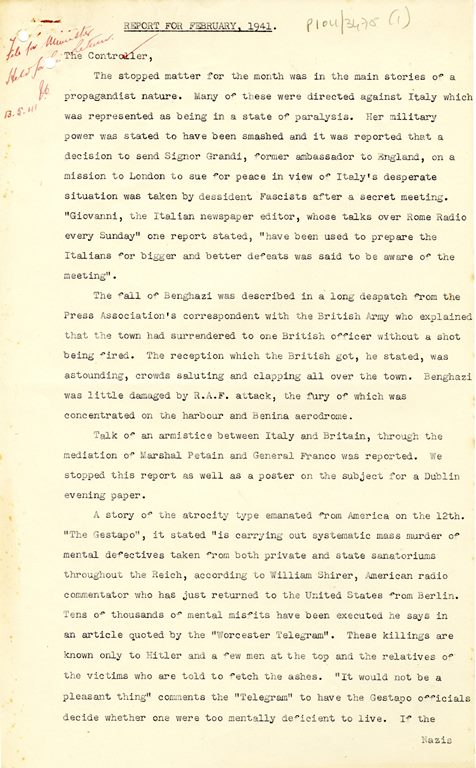
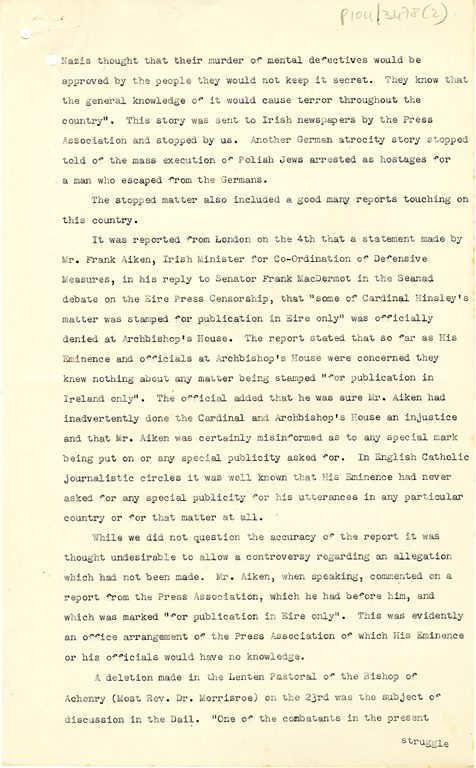
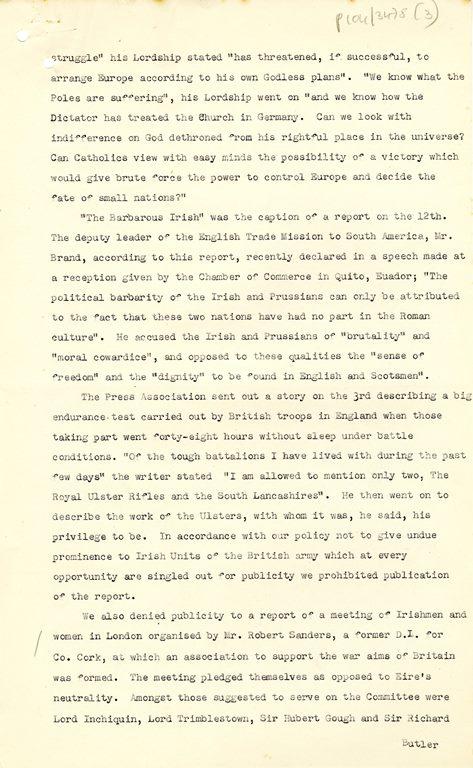
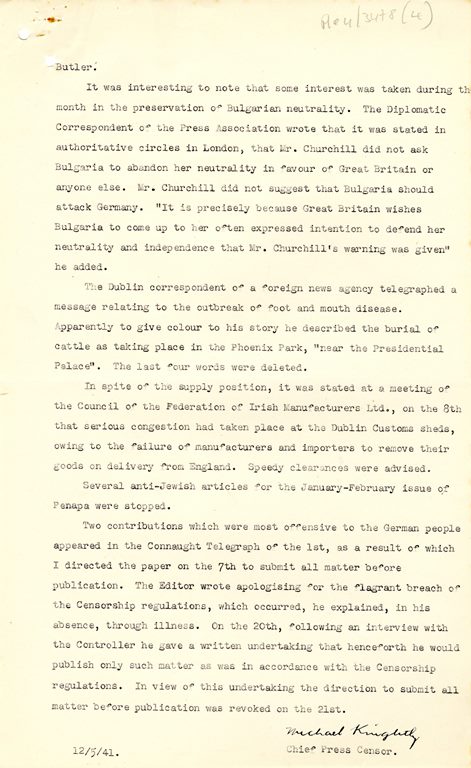
I Send You My Very Best Wishes For The Year...
Christmas is seen as a time for families to come together but sometimes not everyone can make the journey home. This letter was written to Margaret Burke from a relative or friend living in Banning, California and is dated 11 January 1917. The author was a teacher at the St Boniface Indian School which was established 85 miles east of Los Angeles. The letter describes a very different existence to the one the author had lived at home in Ireland; encountering mountain lions, coyotes and snakes in their bed. The papers of Mary and her brother, Fr Tom Burke, are available to consult in UCD Archives.
A full transcript of the letter is provided below.
UCDA P30/30 Papers of Margaret and Fr Tom Burke.
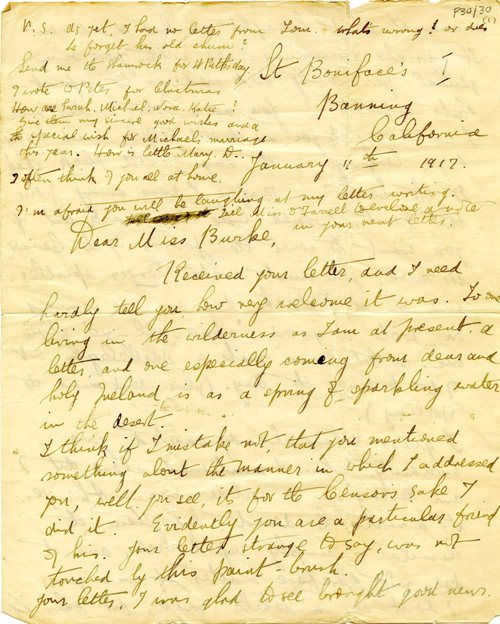
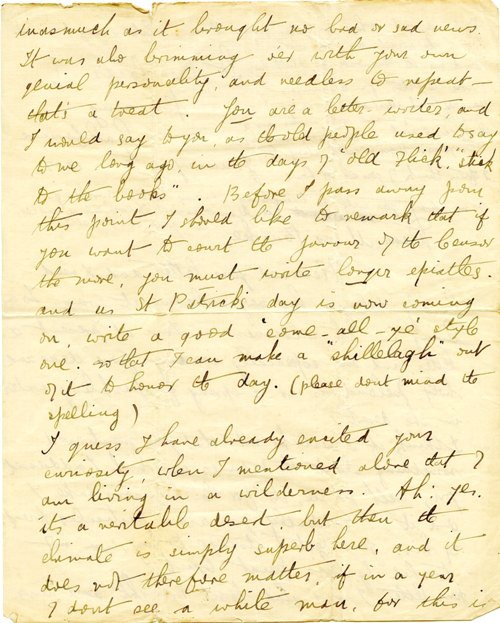
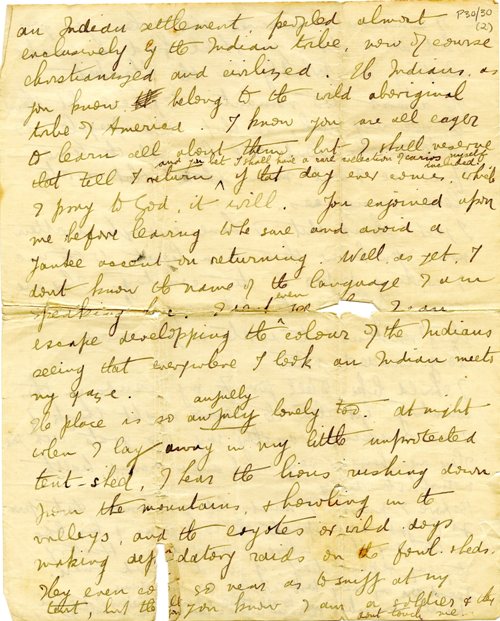
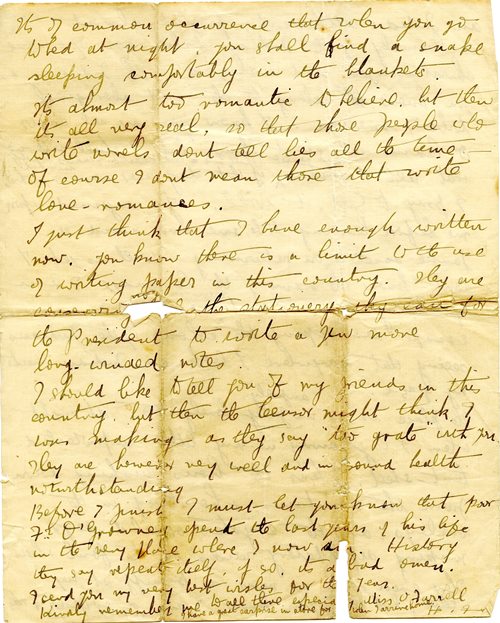
St Boniface’s, Banning, California
January 11th 1917
Dear Miss Burke,
Received your letter, and I hardly need tell you how very welcome it was. To one living in the wilderness as I am at present a letter, and one especially coming from dear and holy Ireland is as a spring of sparkling water in the desert.
I think if I mistake not, that you mentioned something about the manner in which I addressed you, well, you see its for the Censor’s sake I did it. Evidently you are a particular friend of his, your letter, strange to say, was not touched by this paint-brush.
Your letter, I was glad to see brought good news in as much as it brought no bad or sad news. It was also brimming over with your own jovial personality and needless to repeat – that’s a treat. You are a letter writer, and I would say to you, as the old people used to say to me long ago in the days of the “old flick” “stick to the books”. Before I pass away from this point, I should like to remark that if you want to court the favour of the Censor the more, you must write longer epistles and as St Patrick’s Day is now coming on, write a good ‘come-all-ye’ style one, so that I can make a “shillelagh” out of it to honor [sic] the day. (please don’t mind the spelling)
I guess I have already enriched your curiosity, when I mentioned alone that I am living in a wilderness. Ah yes its a veritable desert, but then the climate is simply superb here, and it does not therefore matter, if in a year I don’t see a white man, for this is an Indian settlement, peopled almost exclusively by the Indian tribe, now of course Christianized and civilized. The Indians, as you know, belong to the wild aboriginal tribe of America. I know you are all eager to learn all about them but I shall reserve that till I return ë and you bet I shall have a rare collection of curios myself included, if that day ever comes, which I pray to God it will. You enjoined upon me before leaving to be sane and avoid a Yankee accent on returning. Well as yet, I don’t know the name of the language I am speaking here. I [] even for [] escape developing the colour of the Indians seeing that everywhere I look an Indian meets my gaze.
The place is so awfully/awfully lonely too. At night when I lay away in my little unprotected tent-shed, I hear the lions rushing down from the mountains, + howling in the valleys, and the coyotes or wild dogs making predatory raids on the fowl sheds. They even come so near as to sniff at my tent but the[] you know I am a soldier + they don’t teach me. Its of common occurrence that when you go to bed at night, you shall find a snake sleeping comfortably in the blankets.
Its almost too romantic to believe but then its all very real, so that those people who write novels don’t tell lies all the time – of course I don’t mean those that write love-romances.
I just think that I have enough written now. You know there is a limit to the use of writing paper in this country. They are conserving [] the stationary they can for the President to write a few more long-winded notes.
I should like to tell you of my friends in this country but then the Censor might think I was making as they say “too grate” with you. They are however very well and in sound health notwithstanding.
Before I finish I must let you know that poor Fr. O’ Grosvenor[] spent the last years of his life in the very place where I now am. History they say repeats itself, if so, its a bad omen. I send you my very best wishes for the year.
Kindly remember me to all there especially Miss O’Farrell. I have a great surprise in store for [] when I arrive home.
H.F.
[Top right corner of page 1]
P.S As yet I had no letters from Tom. What’s wrong! or does he forget his old chum?
Send me the shamrock for St Patrick’s Day.
I wrote to Peter for Christmas.
How are Sarah, Michael, Nora and Katie? Give them my sincere good wishes and a special wish for Michael’s marriage this year. How is little Mary D.
I often think of you all at home.
I am afraid you will be laughing at my letter writing.
Tell Miss O’Farrell to enclose a note in your next letter.
Diaries of John and Arthur Oram
John and Arthur Oram were farmers and land agents in Burrishoole, County Mayo. Their diaries hold a wealth of information on farming life and estate management, covering 1854–1907 and 1887–1919. In addition to documenting day to day rural life, the Orams record the weather for each day and refer to significant national and international events.
Born in Somerset in 1824, John Oram moved with his young family to the West of Ireland in 1853 to become the land agent for the estate of Captain Wyndam at Burrishoole. He died on 14 April 1907. His son, Arthur, took over his father’s business and remained at Burrishoole for the rest of his life. He died on 6 August 1919.
In addition to their land agency work, both John and Arthur farmed land in the areas surrounding Burrishoole. Their diaries record many details of farming life such as the planting and harvesting of crops, trips to livestock markets, and repairs to farm buildings. As land agents, the Orams’ duties included collecting rents and negotiating tenants’ arrears. Growing tensions between landlords and tenants impinged directly on their personal lives when John was shot in 1872. The influence of the weather on their lives is also evident: both men record daily weather observations and note the impact of droughts, wind storms, and major snow falls.
The diaries refer to events of national and international importance: a famine in 1879; the foundation of the Land League in 1879; the 1882 Phoenix Park murders; the death of Queen Victoria in 1901; the sinking of the Titanic in 1912; news of a Rising in Dublin in 1916; and the 1918 influenza epidemic.
They have now been digitised by UCD Digital Library and can be viewed online.
Website created and maintained by Carolyn Sturdy and Christopher Oram on the Orams at Burrishoole.
UCDA P258/2 Diary of John Oram: 1 January 1858–31 October 1864.

Wet as 1860 was 1861 was still wetter as regards the harvest months - now at the end of the year a famine of fuel exists and the potatoes being very bad great distress is anticipated. This year will be long remembered as the year of the venerated and noble Prince Albert's Death.
P258/3 Diary of John Oram : 1 November 1864–31 December 1878

2–6 October 1872 2: … shot at returning to Mulranny a mile beyond Dughill. Ball went through clothes but by the Good providence of God I escaped 3: Went to point out the place to Country Inspector 4: To Westport & Clogher - Great congratulations on my escape 5: To Bellacroy - investigation by magistrates 6: Sunday. Church ... Public thanks to Almighty God for escape from the Assassin.
P258/5 Diary of John Oram: 11 July 1888–8 August 1898
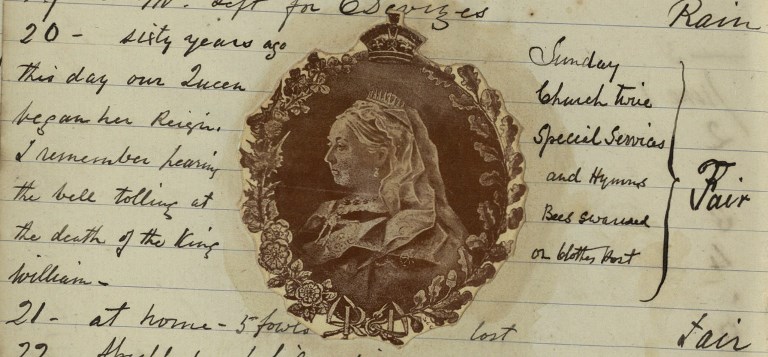
20 June 1897 Sixty years ago this day our Queen began her Reign. I remember hearing the bell tolling at the death of the King William.
It's Beginning to Look A Lot Like Christmas!
With Christmas only around the corner, a document with a Christmassy feel has been chosen as UCD Archives December Document of the Month.
Below is the first page from an RTÉ Radio Script entitled 'Christmas Annual for Children'. It begins with a lovely poem envisaging how an Irish child born in the wilds of the bog might describe their way of life to a child born in the dry arid land of Bethlehem.
UCDA P260/639 RTÉ Radio Talk Scripts in English.
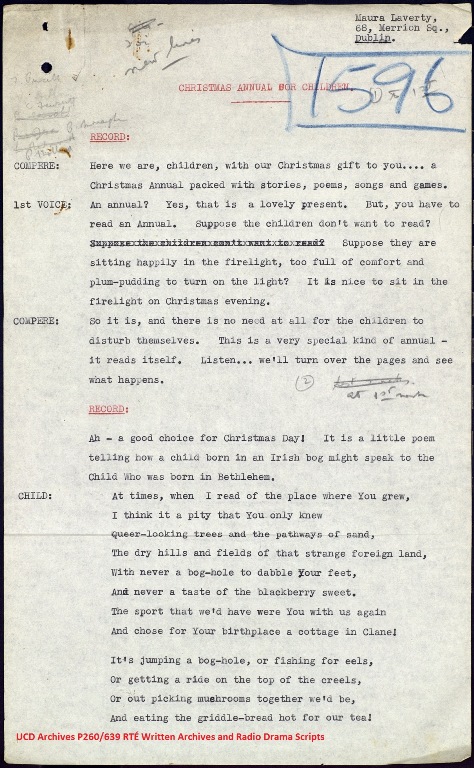
Map of Four Courts and Surrounds [1922]
On 14 April 1922 the Four Courts in Dublin were seized by Anti-Treaty IRA forces and Ernie O'Malley was amongst them.
This map of the Four Courts and its surrounds is found in the newly released fourth series of material from the Ernie O'Malley papers. The map is dated around March/April 1922. Differences over accepting the 1921 Anglo-Irish Treaty led to an IRA Army Convention in March 1922. The Convention was mainly attended by those opposed to the Treaty and a resolution was reached that those present would continue to fight for a Republic. Thus the IRA split into Pro and Anti-Treaty forces. Hoping to restart hostilities with the British Army and damage the Treaty, Anti-Treaty forces seized the Four Courts. Unfortunatley this action would subsequently lead to the Irish Civil War.
There is a handwritten note on the back of this map that discusses internal discussions that took place before the Army Convention was held. A transcript of the note can be read below.
UCDA P17a/304 Papers of Ernie O'Malley.
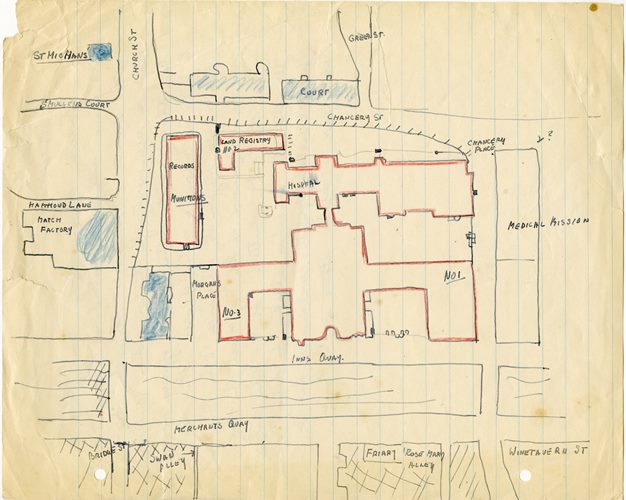
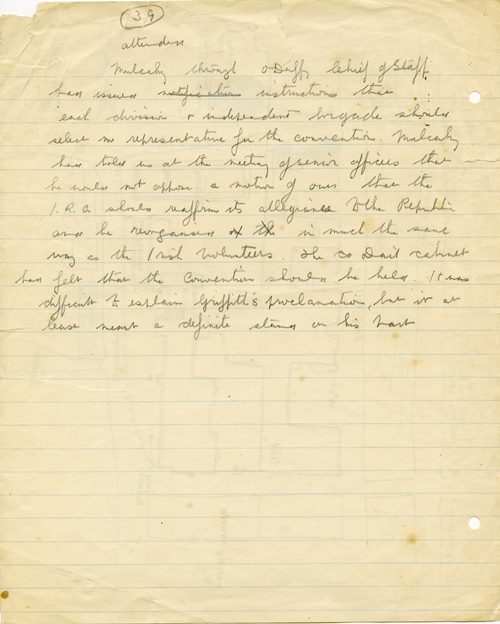
39
Attendance
Mulcahy through O’Duffy Chief of Staff has issued notification instructions that each division & independent brigade should select a representative for the convention. Mulcahy had told us at the meeting of senior officers that he would not oppose a motion of ours that the I.R.A. should reaffirm its allegiance to the Republic and be reorganised on the in much the same way as the Irish Volunteers. The [] Dail cabinet had felt that the Convention should be held. It was difficult to explain Griffith’s proclamation, but it at least meant a definite stand on his part.
Papers of Frances-Mary Blake
These hand-tooled, illustrated leather book covers were made by Republican prisoners in Portlaoise Prison for Frances-Mary Blake.
Frances-Mary Blake was born in London on 29th March 1939 and lived in Rickmansworth, on the north-west outskirts of London, later moving to nearby Chorleywood. While her father, Charles, was British, her mother, Mollie, was Irish and Frances inherited from her a love of Ireland. As a child she visited Ireland frequently.
In the mid-1970s she helped with the initial sorting and cataloguing of the Ernie O’Malley papers (UCDA P17), one of the largest collections of historical documents of the Irish Civil War period, for the then Archives Department of University College Dublin. Following her work on the O’Malley papers, she edited his best-selling book on the Civil War, The Singing Flame.
The books bound by the prisoners for Blake include Ernie O'Malley's On Another Man's Wound, The Singing Flame, Raids and Rallies and Blake's The Irish Civil War. The front and back covers of two of these books can be seen below.
The Papers of Frances-Mary Blake (UCDA P244) are now available in UCD Archives for consultation.
UCDA P244/119. Four books bound in illustrated leather covers made by Republican prisoners.
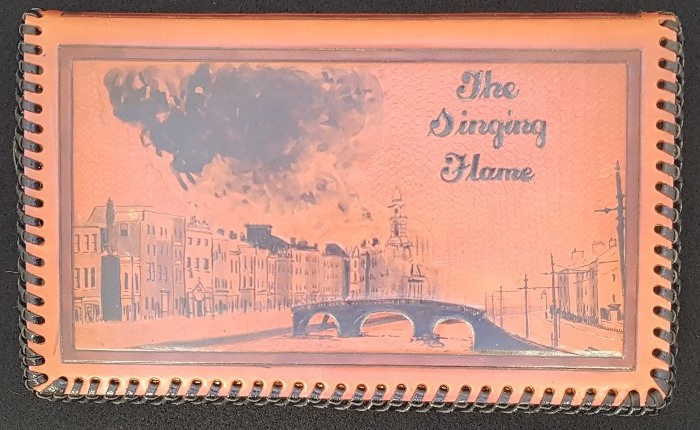
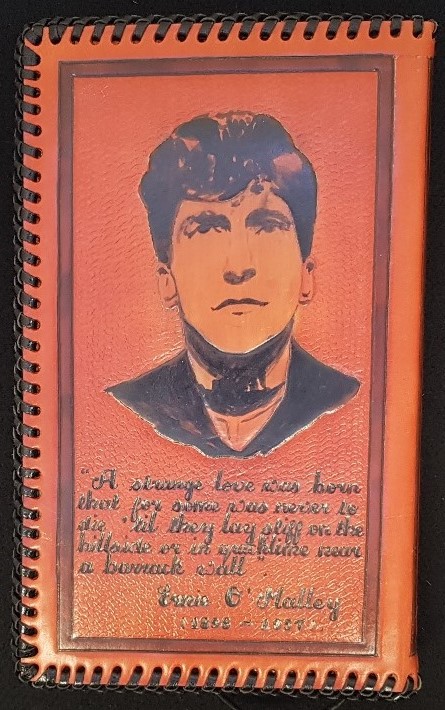
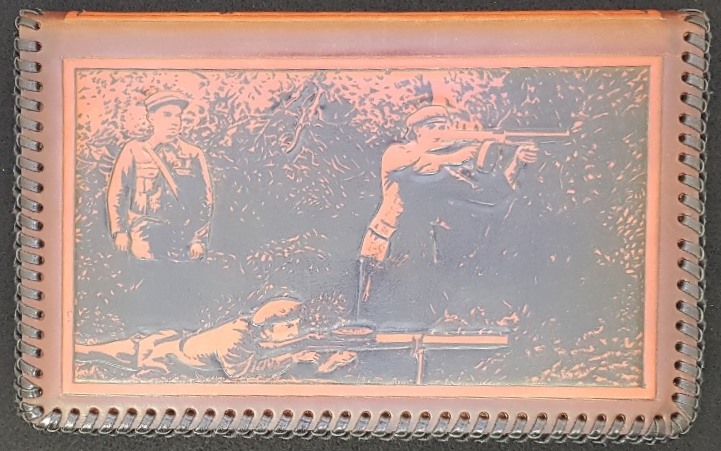
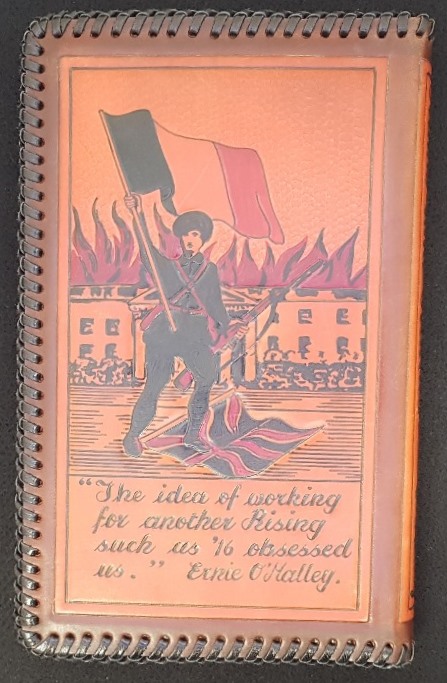
GAA Tickets in 1915
Up until last year the month of September signalled a hectic time for GAA supporters as they searched high and low to get their hands on tickets to the All Ireland finals. But the scramble for match tickets is not a new thing. In the letter below J.L. O'Sullivan writes to his friend, Micheal Collins, discussing ticket demands, sales and some missed goal chances by Collins in a recent game of hurling!
This small collection of Michael Collins' material is available to view online in the UCD Digital Library.
A full transcription can be read below.
UCDA P123/35. Letter from J.L. O'Sullivan to Collins discussing match tickets.
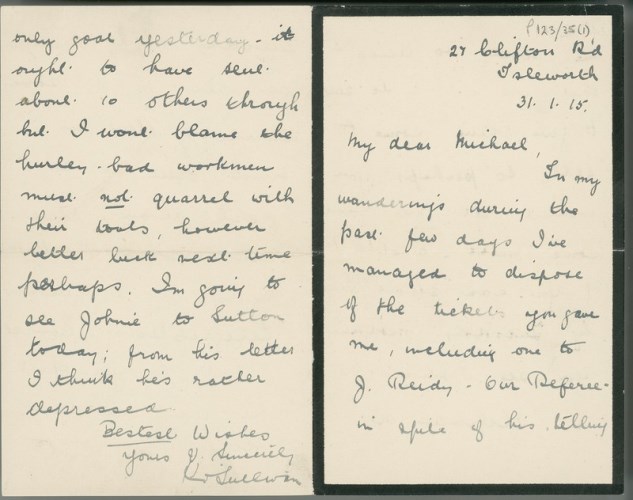
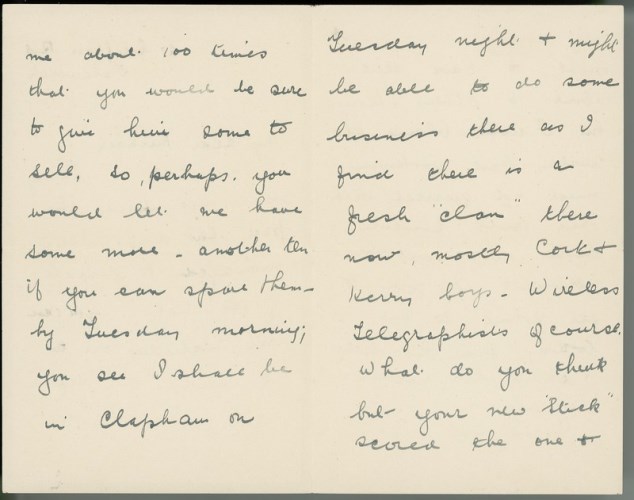
27 Clifton Rd., Isleworth
31.1.15
My dear Michael,
In my wandering’s during the past few days I’ve managed to dispose of the tickets you gave me, including one to J. Reidy – our referee – in spite of his telling me about 100 times that you would be sure to give him some to sell, so, perhaps, you would let me have some more – another ten if you can spare them – by Tuesday morning; you see I shall be in Clapham on Tuesday night + might be able to do some business there as I there is a fresh “clan” there now, mostly Cork + Kerry boys, wireless telegraphists of course. What do you think but your new “stick” scored the one & only goal yesterday – it ought to have sent about 10 others through but I won’t blame the hurley, bad workmen must not quarrel with their tools, however better luck next time perhaps. I’m going to see Johnnie to Sutton today; from his letter I think he’s rather depressed.
Bestest wishes,
Yours v. sincerely,
O’Sullivan
Apollo 11 Moon Landing, 20 July 1969
On July 20, 1969, Neil Armstrong and Buzz Aldrin landed the Apollo Lunar Module (Eagle) on the moon, as Michael Collins orbited the moon in the command module (Pilot). Apollo 11 was launched by a Saturn V rocket from Kennedy Space Centre on Merritt Island, Florida, on July 16 and returned to Earth on July 24 after more than eight days in space. Neil Armstrong became the first person to set foot on the moon, famously declaring as he did so ‘one small step for man, one giant leap for mankind.’
President Eamon de Valera was invited to include a message to be placed on the moon by the Apollo 11 astronauts. This message of hope was written in Irish and English. De Valera also wrote a letter of congratulations to the President of the United States Richard M. Nixon following the moon landing. Both of these can be seen below.
UCDA P150/3482. Copy of the text of President de Valera’s message to be placed on the moon by the astronauts of Apollo 11. Reproduced by kind permission of UCD-OFM Partnership.
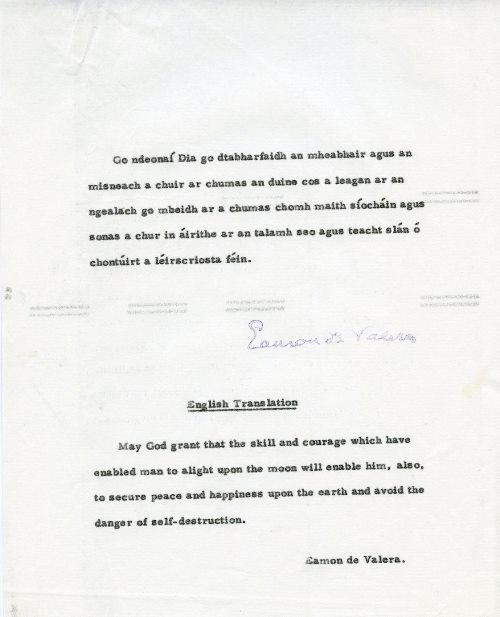
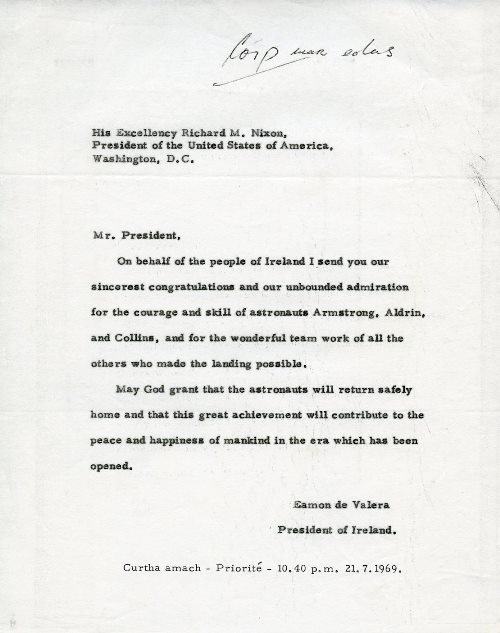
NUWGA Hungarian Refugee Relief
The National University Women Graduates’ Association [NUWGA] was founded in 1902 and originally called the Irish Association of Women Graduates and Candidate Graduates [IAWG & CG]. Its initial mission was to improve the rights of women in and through education and broadened to include campaigning with other women’s organisations against legislative measures discriminating against women.
This campaigning took on an international flavour in 1957 when the NUWGA decided to ask its members for contributions of clothes and toilet requisites to send to Hungarian women refugees got up in the Hungarian Revolution. The types of contributions included coats, skirts, hats, stockings, soap and washing powder.
UCDA NUWGA 1/53. Hungarian refugees: letters from the sub-committee for the relief of Hungarian University women, to the Red Cross, contributors and G. Hausmann concerning clothes and toiletries received from each contributor. Includes copy letter to G. Hausmann expressing sympathy with refugees and congratulations to the Austrian Federation of University Women in their assistance.
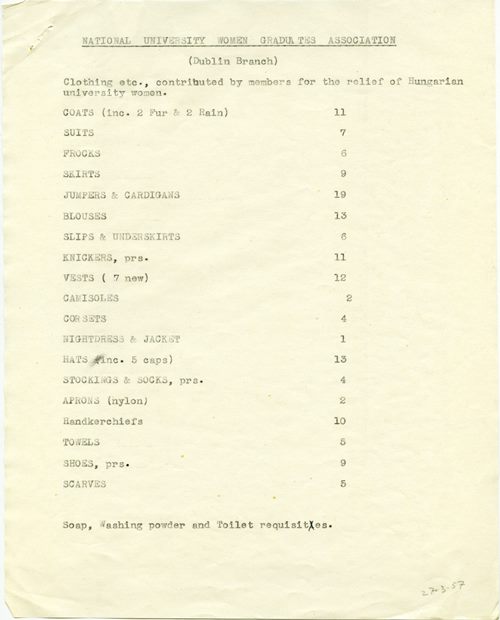
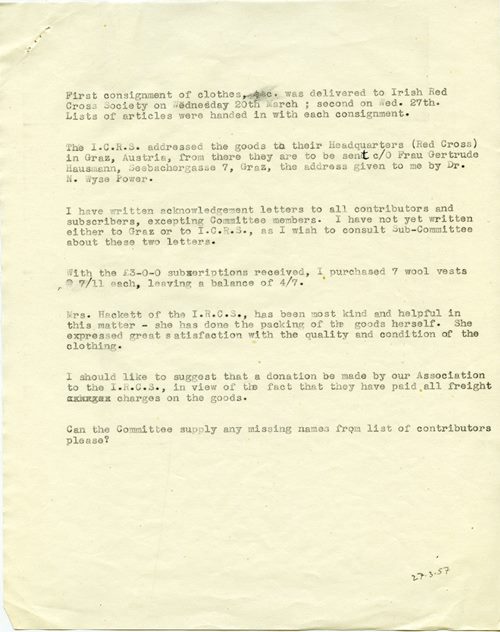
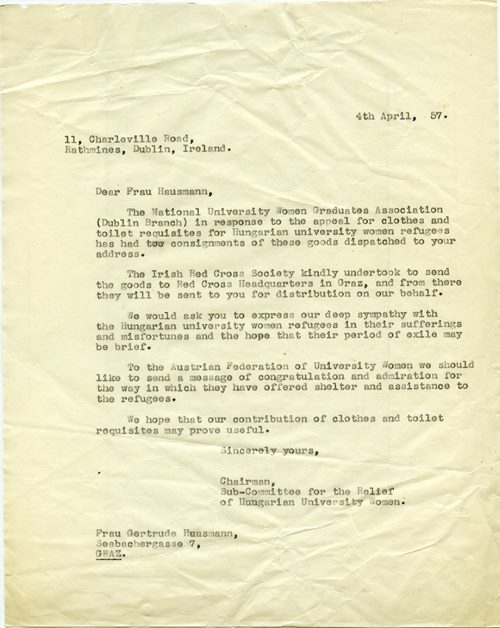
Cumann na nGaedheal Election Poster
In 1922, in the debates over the Treaty, Eamon de Valera put forward a controversial alternative proposal (which became popularly known as 'Document No.2') which would have permitted an Irish Republic to maintain what he described as 'external association' with the British Empire. It was withdrawn at the time but was occasionally referenced by his political opponents as proof of his alleged insincerity on the 'national question'. As it happened, his proposals of 1922 foreshadowed crucial aspects of the foreign policy he adopted when in government in the 1930s and 1940s.
This [1932] Cumann na nGaedheal election poster seems to question the ‘republican’ credentials of Éamon de Valera.
This poster and other relevant material relating to Ireland's declaration as a Republic can be viewed in a collaborative online exhibition entitled Republic to Republic: Ireland's international sovereignty, 1919-1949.
The exhibition was co-curated by UCD Archives and Documents on Irish Foreign Policy (DIFP). To read more about some of these documents, please visit UCD Cultural Heritage Collections blog.
UCDA P7a/172. Papers of Richard Mulcahy [1932] Cumann na nGaedheal election poster.
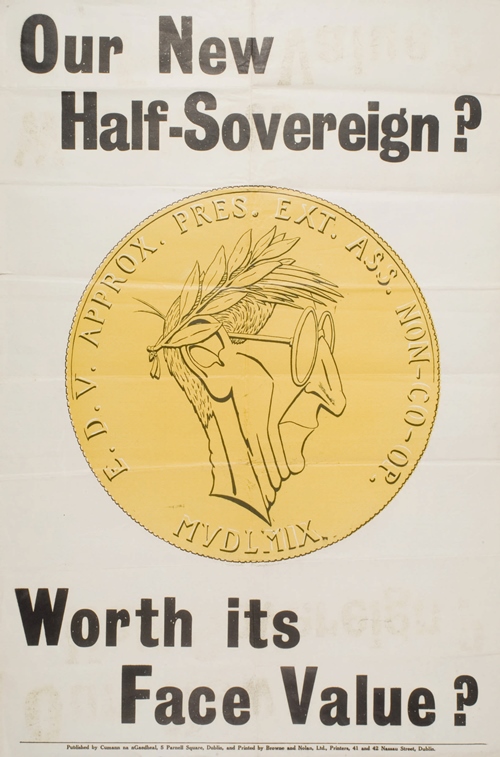
Declaration of Ireland as a Republic, 18 April 1949
At midnight on Easter Sunday, 17 April 1949, Ireland’s last links with the Commonwealth were severed. Celebrations took place across the state, with the main official ceremonies in Dublin corresponding with the annual commemorations of the Easter Rising. Events to mark the occasion were also hosted by Irish legations abroad. This letter from John Hearne (by then Irish ambassador to Canada) to John A. Costello, Taoiseach, at Easter 1949 congratulated him on the imminent declaration of Ireland as a republic: ‘This note will not, I fear, reach Dublin before you inaugurate and celebrate the great day. But it will arrive, I hope, in Easter Week in the first days of the new era’.
A full transcription can be read below.
UCDA P190/392. Papers of John A. Costello. Letter from John Hearne to John A. Costello.
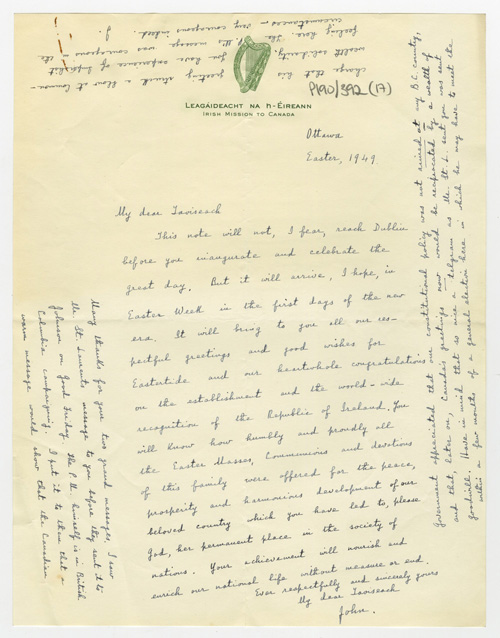
Leagáideacht na h-Éireann
Irish Mission to Canada
Ottawa
Easter, 1949
My dear Taoiseach,
This note will not, I fear, reach Dublin before you inaugurate and celebrate the great day. But it will arrive, I hope, in Easter Week in the first days of the new era. It will bring to you all our respectful greetings and good wishes for Eastertide and our heartwhole congratulations on the establishment and the world-wide recognition of the Republic of Ireland. You will know how humbly and proudly all the Easter Masses, Communions and devotions of this family were offered for the peace, prosperity and harmonious development of our beloved country which you have led to, please God, her permanent place in the society of nations. Your achievement will nourish and enrich our national life without measure or end.
Ever respectfully and sincerely yours
My dear Taoiseach
John
Left margin:
Many thanks for your two grand messages. I saw Mr. St. Laurents message to your before they sent it to Johnson on Good Friday. The P.M. himself is in British Columbia campaigning. I put it to them that a warm message would show that the Canadian
Right margin:
Govenment appreciated that our constitutional policy was not aimed at any B.C. country, and that, later on, Canada’s greetings now would be reciprocated by a wealth of good will. Have in mind that so nice a tel[e]gram as Mr. St. L. sent you was sent within a few months of a general election here in which he may have to meet the
Top margin:
charge that his greeting struck a blow at Commonwealth solidarity. You have experience of Imperialist feeling here. The P.M’s. message was courageous in the circumstances—very courageous indeed. J.
A Case of Benign Osteosarcoma, March 1844
This watercolour illustration shows the right foot of a 15 year old boy who was suffering from benign osteosarcoma in March 1844. This boy was treated in the Richmond Hospital by a number of eminent Dublin surgeons; Dr Edward Hutton, Mr Robert Adams and Dr James Cusack.
Richmond Surgical Hospital was opened in 1811, consisted of 120 beds and was house din an old converted convent on Channel Row, North Brunswick Street, Dublin 7. It was named after Charles Lennox, fourth Duke of Richmond and Lord Lieutenant of Ireland from 1807 to 1813.
In 1816 a new operating theatre, designed by Francis Johnston, was built at the rear of the hospital and in 1838 the surgeons subscribed £2,700 to the cost of founding and maintaining a museum which contained '1,000 very expensive drawings and about 2,500 wax preparations'. We are told that this museum was 'resorted to by foreigners from all parts of the world'.
The Richmond Hospital Medical Illustrations Collection (UCDA P263) housed in UCD Archives consists of nearly all '1,000 very expensive' medical illustrations. They depict such ailments as syphilitic and skin diseases, diseases of the nervous, digestive, respiratory and circulatory systems amongst others.
These illustrations are part of a collaborative digitisation project being planned by the libraries and cultural heritage units of Trinity College Dublin, Royal College of Surgeons in Ireland, Royal College of Physicians of Ireland and UCD. This collaborative project entails making available online a unique and distinct archival collection of Dublin medical illustrations dating from the nineteenth century. If successful the project will digitise and create a unified digital platform for nearly 1,700 illustrations. To find out more see our blog post and Twitter campaign.
We are trying to gauge the research potential so if this project is something you would be interested in, please get in contact meadhbh.murphy@ucd.ie
UCDA P263/476 Richmond Hospital Medical Illustration Collection. Watercolour medical illustration depicting benign osteosarcoma.
De Valera's Escape from Lincoln Gaol, February 1919
On the night of 18th May 1918, British police and military arrested leading members of Sinn Féin accusing them of engaging in 'treasonable communication with Germany'. The arrests of Eamon De Valera, president of Sinn Féin, Arthur Griffith, founder of Sinn Féin, Darrell Figgis, party secretary, and a number of other elected Sinn Féin TDs was intended to crush this 'German Plot'. De Valera was interned in Lincoln Gaol from where in February 1919 he dramatically escaped, with the help of his friends.
The handwritten letter below explains how De Valera will escape out the back gate of the jail and how the key needed to do so was posted to him in a cake!
A transcription of the letter can be found below.
UCDA P150/615 Papers of Eamon de Valera. Original correspondence between Séan O'Mahony, Fr Kavanagh, Séan McGarry and his wife, Thomasina, about organising the escape and obtaining keys and files by smuggling them into the jail in cakes. Reproduced by kind permission of UCD-OFM Partnership.
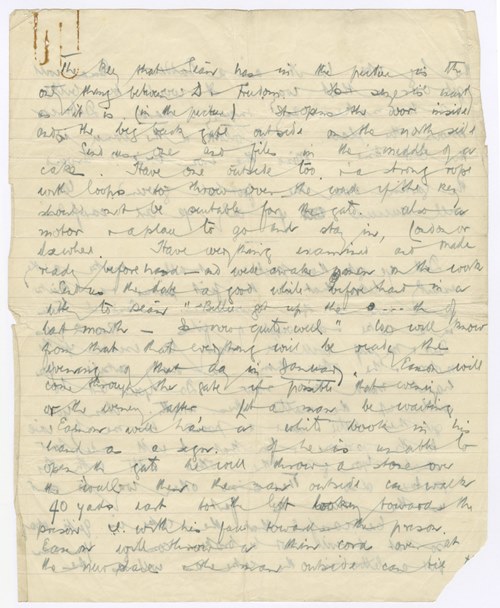
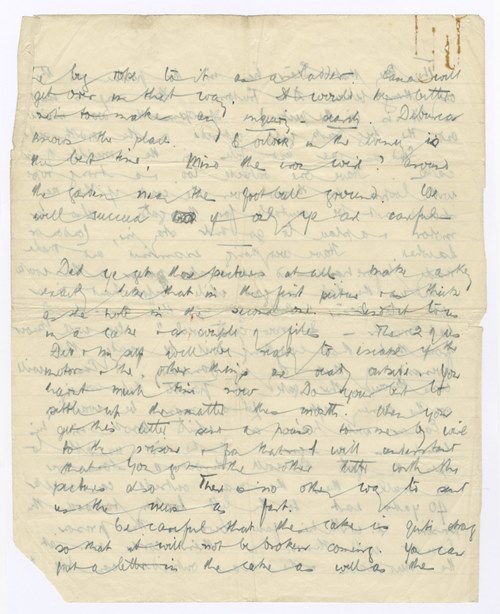
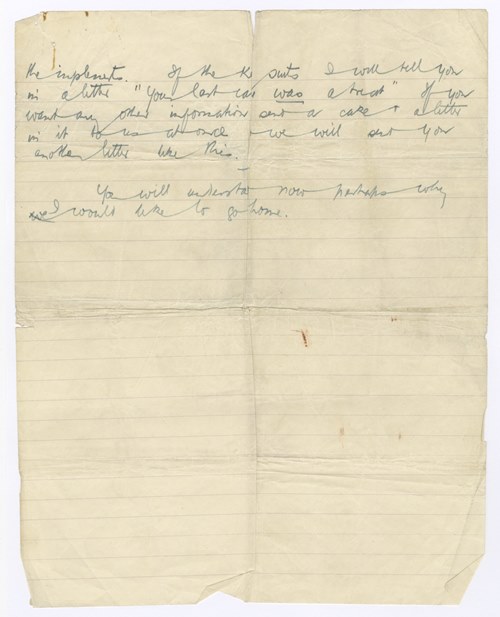
The key that Séan has in the picture is the only thing between D & Freedom. The size is exactly as it is (in the picture) It opens the door inside and the big back gate outside on the north side.
Send us one and files in the middle of a cake. Have one outside too and a strong rope with loops to throw over the wall if the key should not be suitable for the gate. Also a motor and a place to go and stay in. London or elsewhere. Have everything examined and made ready beforehand – and wide awake men on the work.Send us the date a good while beforehand in a letter to Séan. "Billie got up on the….th of last month – Is now quite well" We will know from that that everything will be ready the evening of that day in January. Eamon will come through the gate if possible that evening or the evening after. Let a man be waiting. Eamon will have a white book in his hand as a sign. If he is unable to open the gate he will throw a stone over the wall then the man outside can walk 40 yards past to the left looking towards the prison, i.e. with his face towards the prison. Eamon will throw a thin cord over at the new place and the man outside can tie the big rope to it as a ladder. Eamon will get over in that way. It would be better not to make any inquiry – search. DeValera knows the place. 6 o'clock in the evening is the best time. Mind the iron wire? around the garden near the football ground. We will succeed if only we are careful.
----------
Did ye get those pictures at all. Make a key exactly like that in the first picture and as thick as the note in the second one. Send it to us in a cake and a couple of files. The 2 of us Dev. and myself will be ready to escape if the motor and the other things are ready outside. You haven't much time now. Do your best to settle up the matter this month. When you get this letter send a pound to me by wire to the prison and from that I will understand that you got the other letter with the picture also. There is no other way to send us the news as part.
Be careful that the cake is quite strong so that it will not be broken coming. You can put a letter in the cake as well as the implements. If the key suits I will tell you in a letter "your last cake was a treat" If you want any other information send a cake and a letter in it to us at once and we will send you another letter like this.
----------
You will understand now perhaps why I would like to go home.
1st Dáil Éireann
The opening session of the first Dáil Éireann took place in the Mansion House on Tuesday 21st January 1919. Those candidates who won seats in the 1918 General Election did not take up their seats in Westminster refusing to recognise the English Parliament and establishing an independent Irish Republic legislature in Dublin. The 21st January 1919 was also the first day of the outbreak of the Irish War of Independence.
UCDA P150/1314 Postcard and printed list of those 'Assembled at the Mansion House, Dublin, Tuesday, 21st January, 1919'. Reproduced by kind permission of UCD-OFM Partnership.
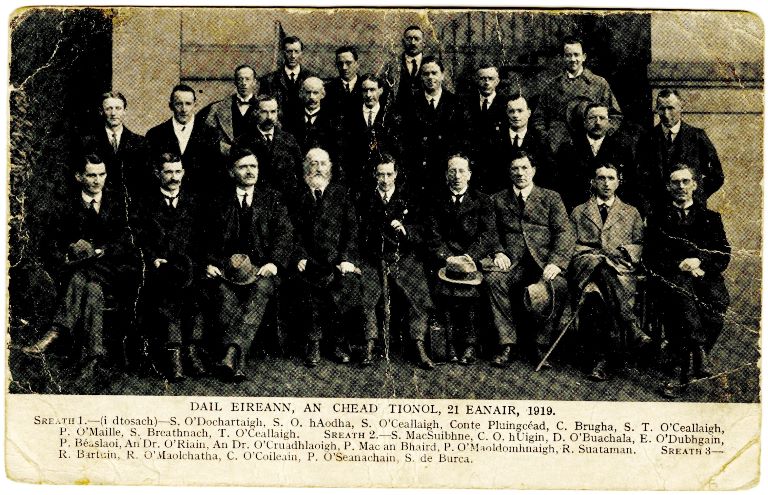
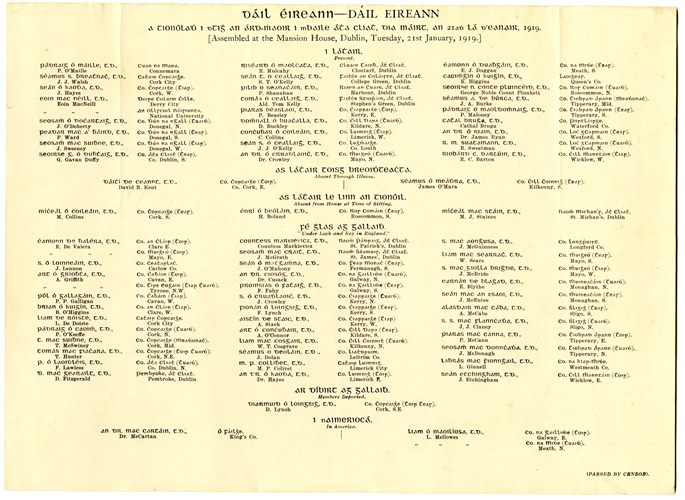
1918 GENERAL ELECTION
The 1918 General Election saw the overwhelming defeat of the Irish Parliamentary Party (IIP) led by John Dillon by Sinn Féin. After the mass internment and executions of the 1916 Easter Rising, Sinn Féin, founded by Arthur Griffith, adopted new and more radical policies following Eamon De Valera's election as leader at the 1917 Árd Fheis. With the Representation of the People Act 1918 the Irish electorate of 700,000 tripled to nearly two million. This gave voting rights to women over 30 years of age and men over 21 or military men over 19. Those voting rights were in evidence at the final results; Sinn Féin won 73 seats out of 105.
These electoral handbills are from the Papers of Desmond and Mabel Fitzgerald (UCDA P80) and show what language and rhetoric was being used to incite people to vote in the 1918 General Election.
UCDA P80/13 (4) and (5) - Electoral handbills in support of [Desmond] Fitzgerald’s candidature for the Pembroke constituency.
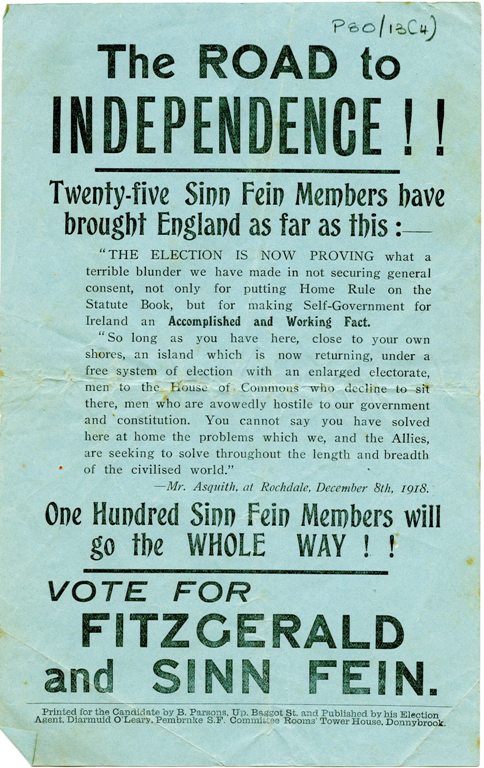
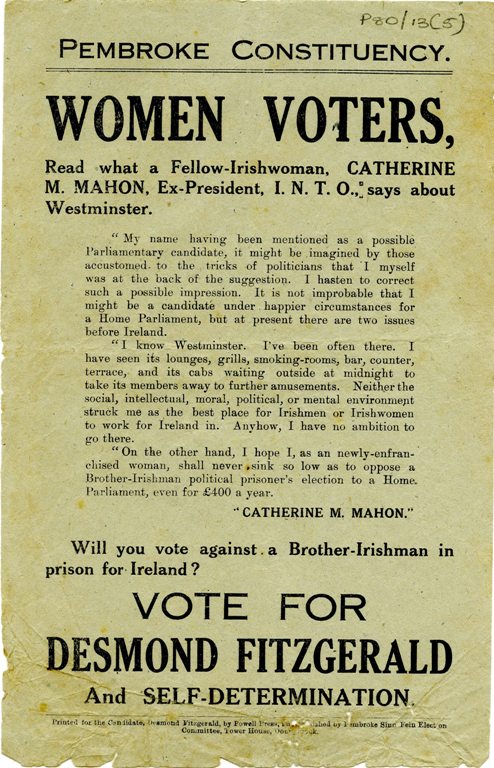
DOCUMENTING WWI
To mark the 100th anniversary of the armistice between the Allies and Germany which ended WWI on 11 November 1918, UCD Library's Cultural Heritage Units have curated an exhibition commemorating Ireland’s involvement in the war, using archives, publications and recorded interviews held in the collections of UCD Archives, The National Folklore Collection, UCD Digital Library and UCD Special Collections.
We invite you to explore the exhibition:
"...and now the shells fall thick and fast": Documenting WWI
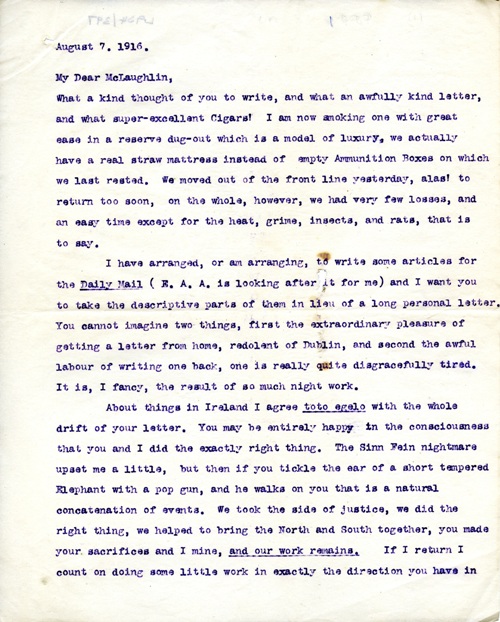
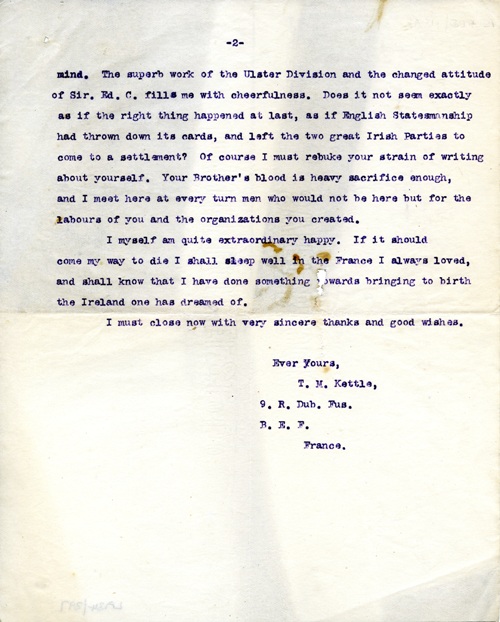
UCD War List
In its calendar for the year 1919–20, UCD published a War List of staff and students who served during World War I. It includes a Roll of Honour of those killed in action, or who died on active service; a list of those awarded military distinctions; past and present students of the college and of the Medical School, Cecilia St., serving 1914–19 and a list of honorary war degrees conferred on past and present students of the college for service in H.M. forces.
Dr Denis J. Coffey (President of UCD, 1908–40) first published a War List in the President’s Report of 1914–15, writing
‘I hope at another time to be able to submit to the Governing Body a statement in detail of the record of the Graduates and Students of the College who have volunteered for active service from the beginning of the War. I was able to insert a War List, which in some degree acknowledged the indebtedness of the College to a large number of its gallant members. But as the days pass the numbers grow, and all that is possible now is to present a brief statement of the part which our Graduates and Students have so far taken in the war in which the interests of Ireland and the Empire are so profoundly involved.
I shall not be able to give more than a summary, but, being acquainted personally with every man of the representative list of past and present students of the College and of the Catholic University School of Medicine who have gone to the front, I have no hesitation in speaking of them as being as fine a body of patriotic young Irishmen as I have known.’
In the President’s Report of 1916–17, Coffey writes:
‘For those who have made the generous sacrifice of their lives, while we mourn now for their loss and join in heartfelt sympathy with their bereaved families it will be the duty of the College to enshrine in a permanent memorial the expression of its regard for their memories and its appreciation of their sacrifice.’
As we approach the 100th anniversary of the Armistice of 11 November 1918, we reproduce the full list from the 1919–20 calendar below.
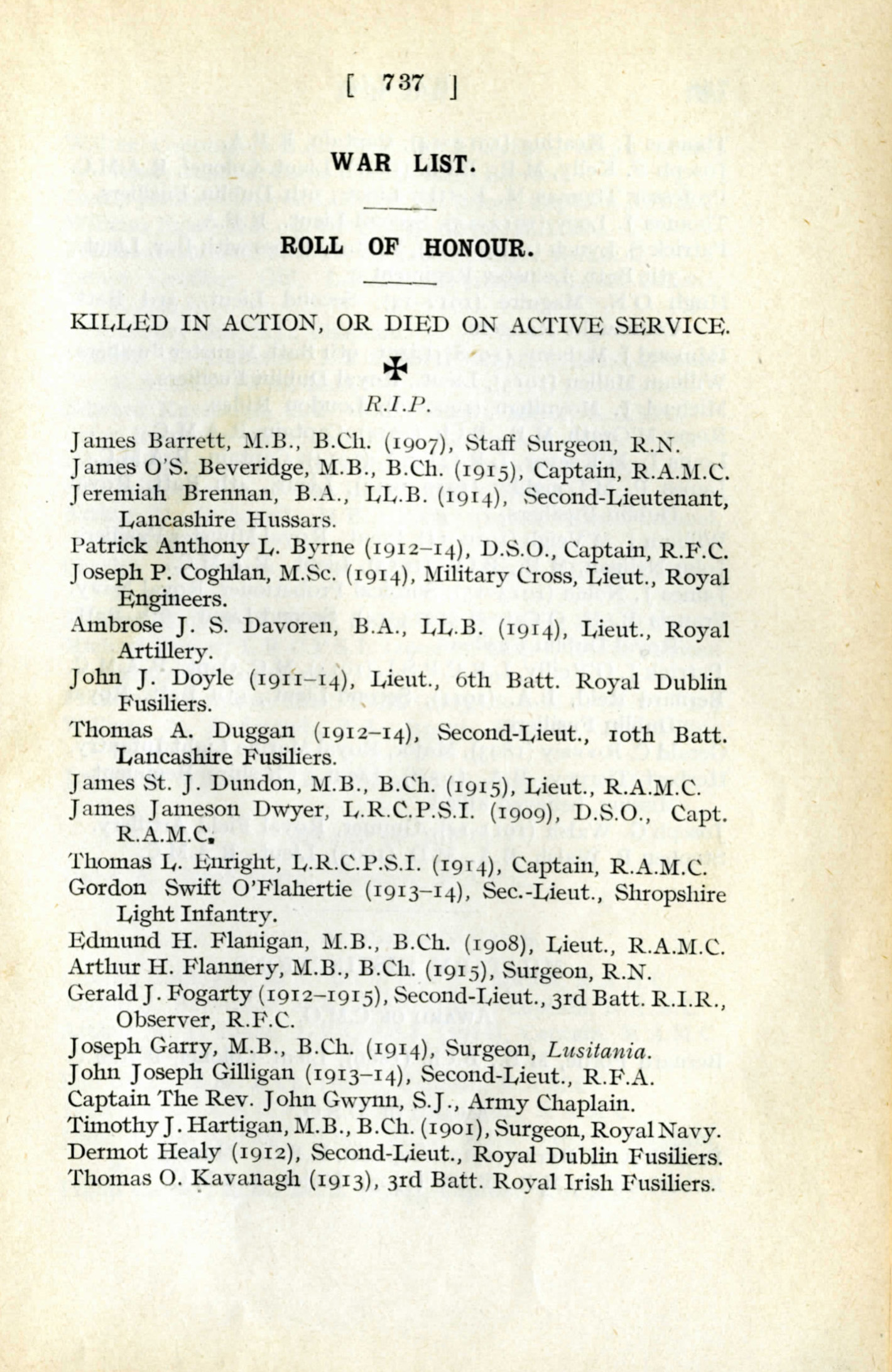
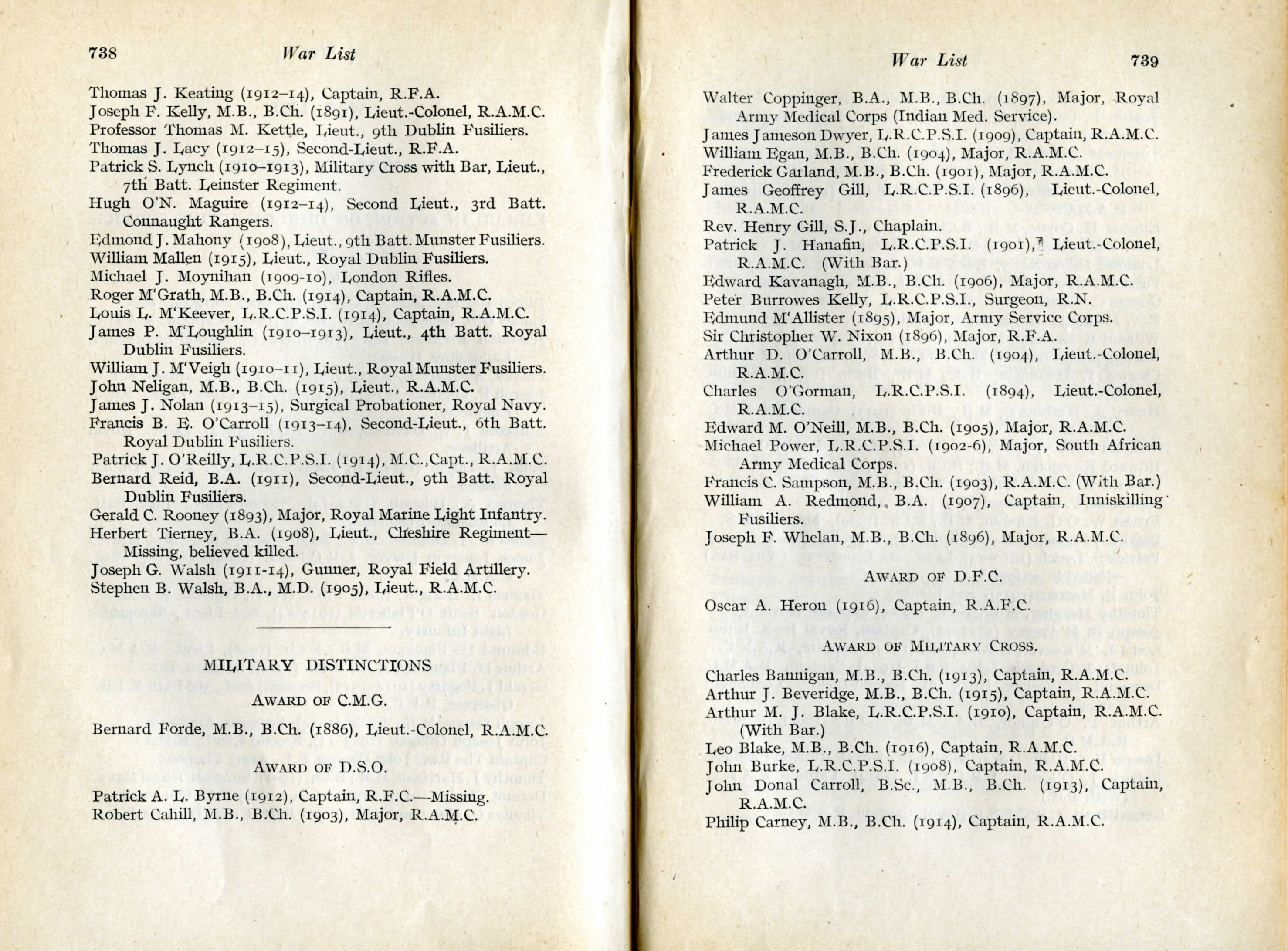
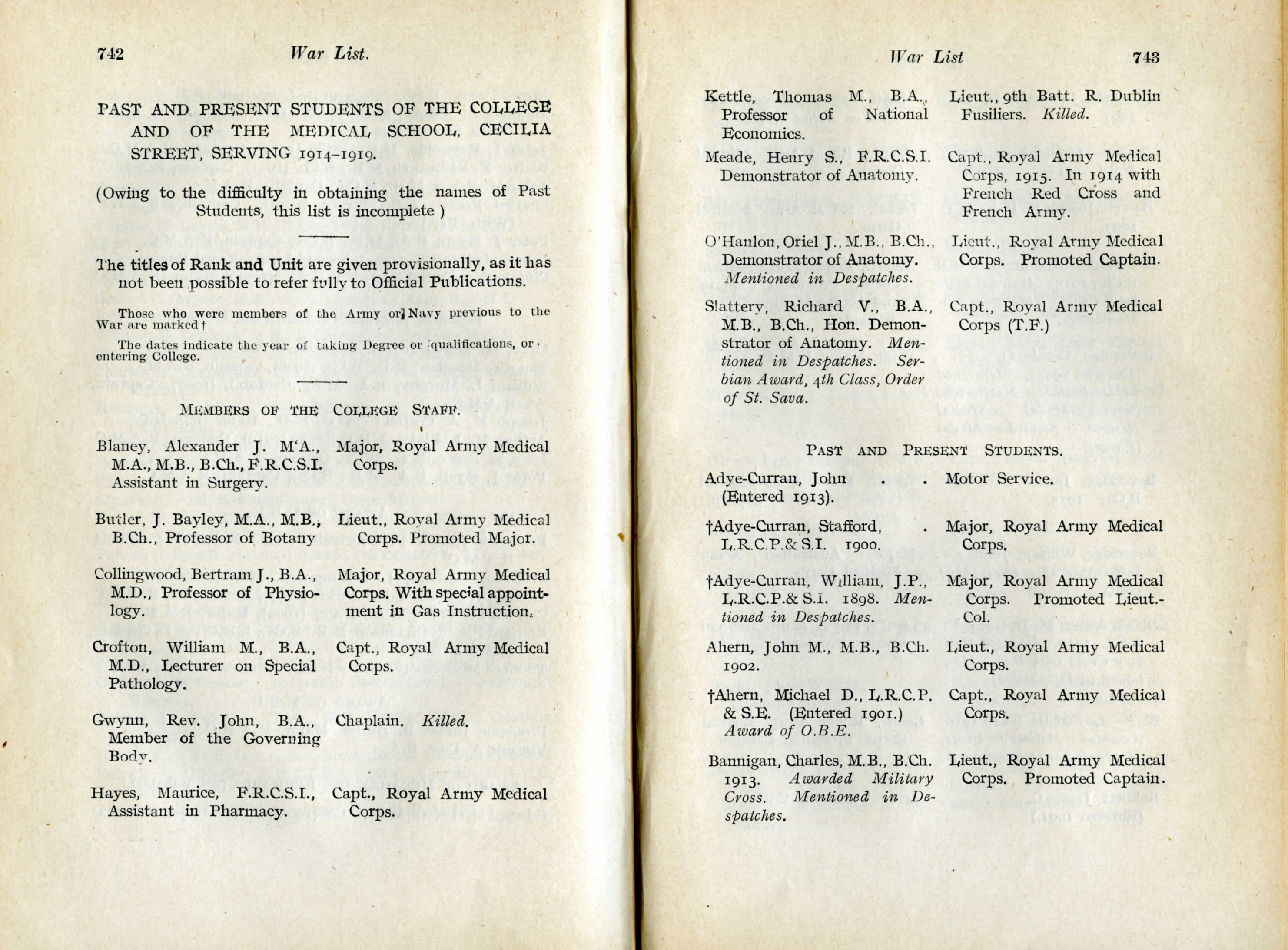
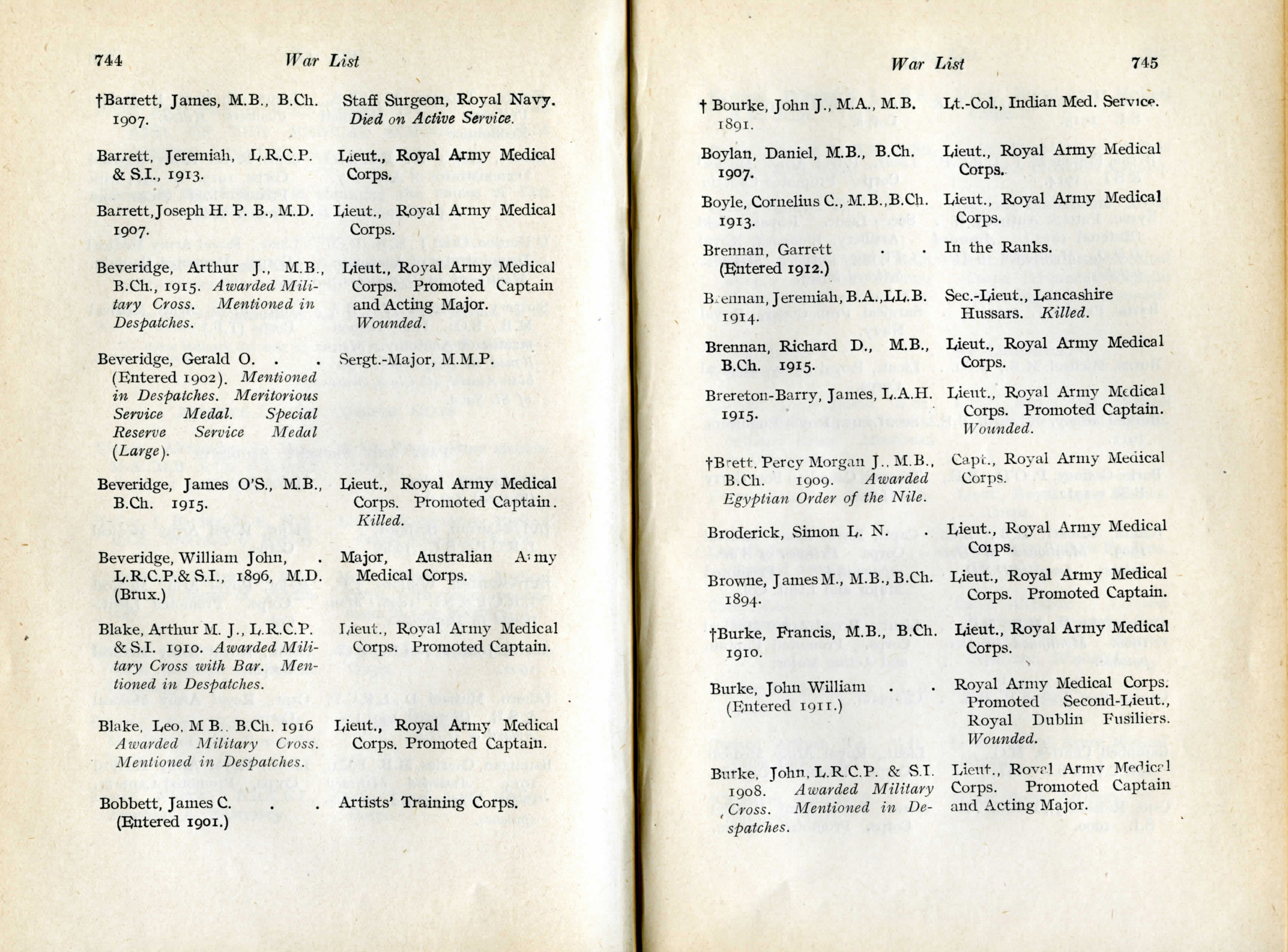
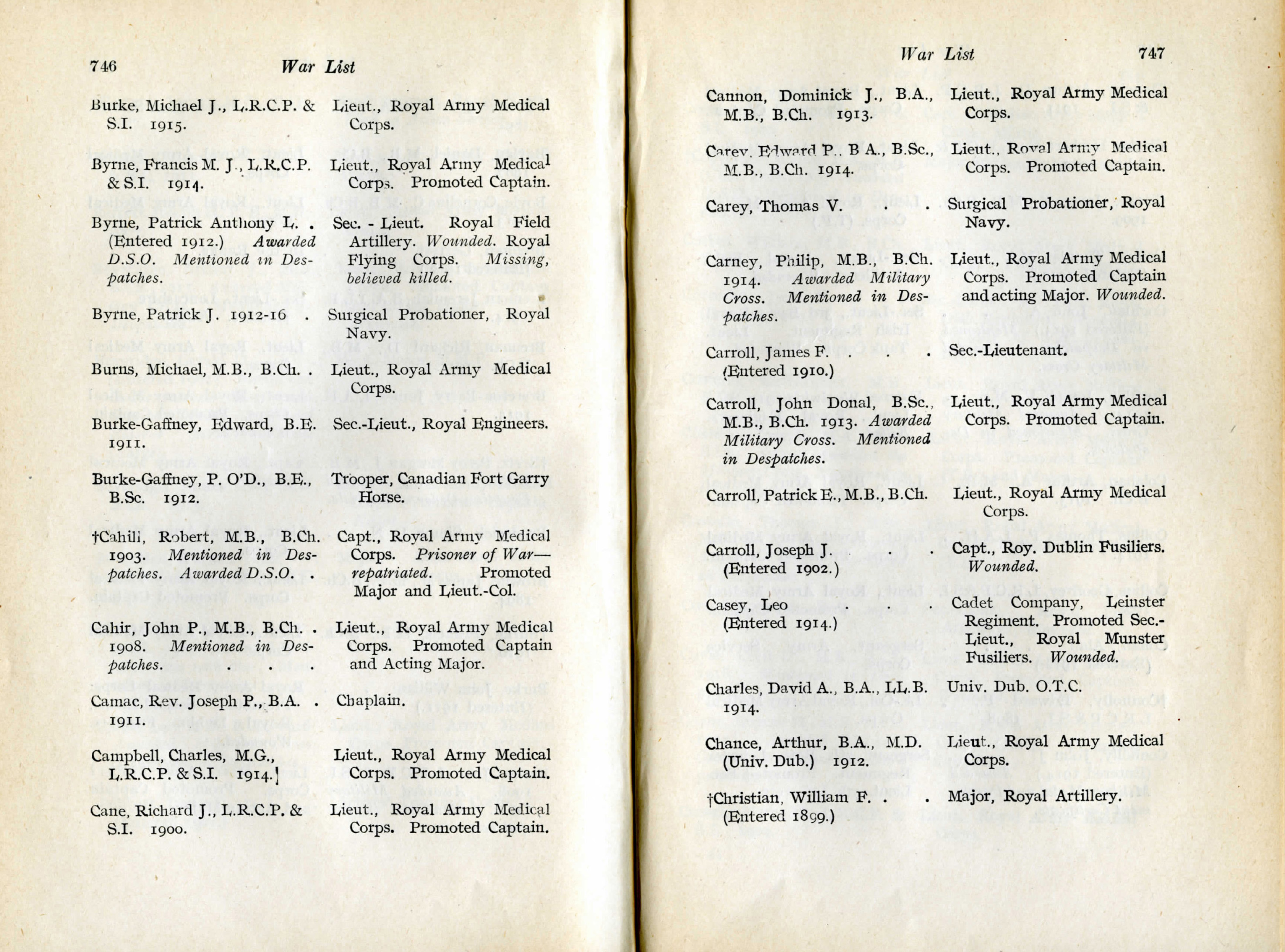
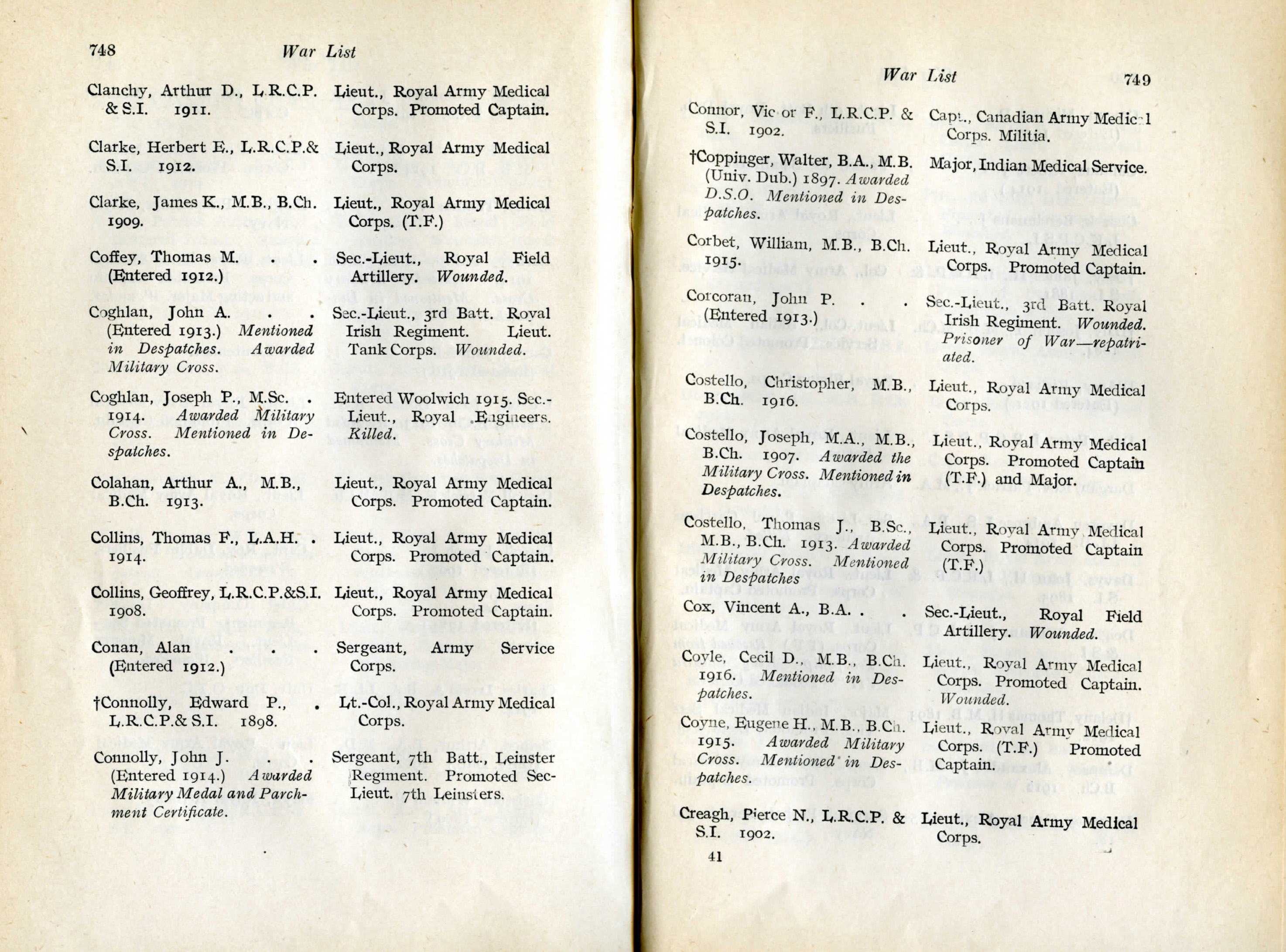
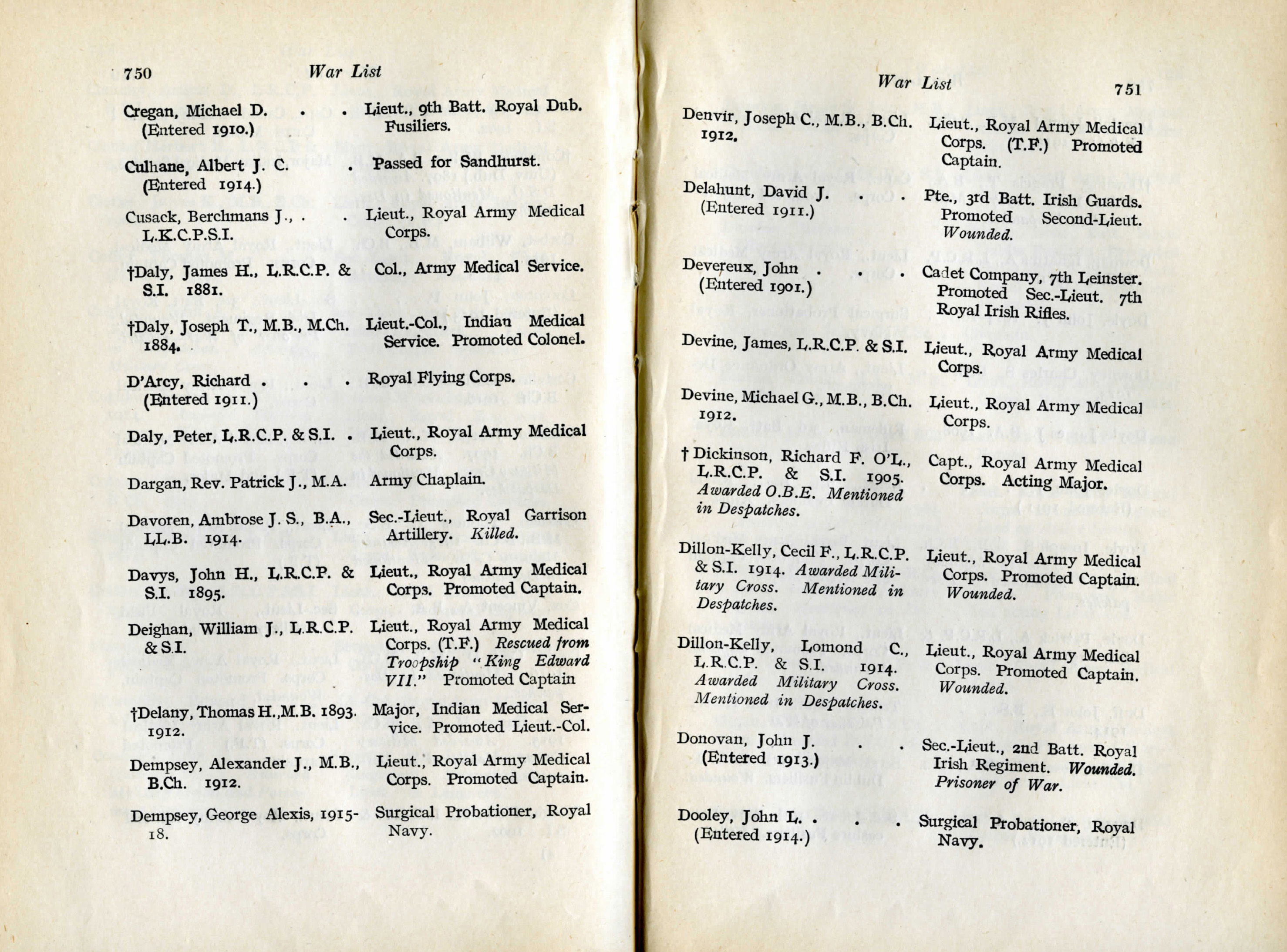
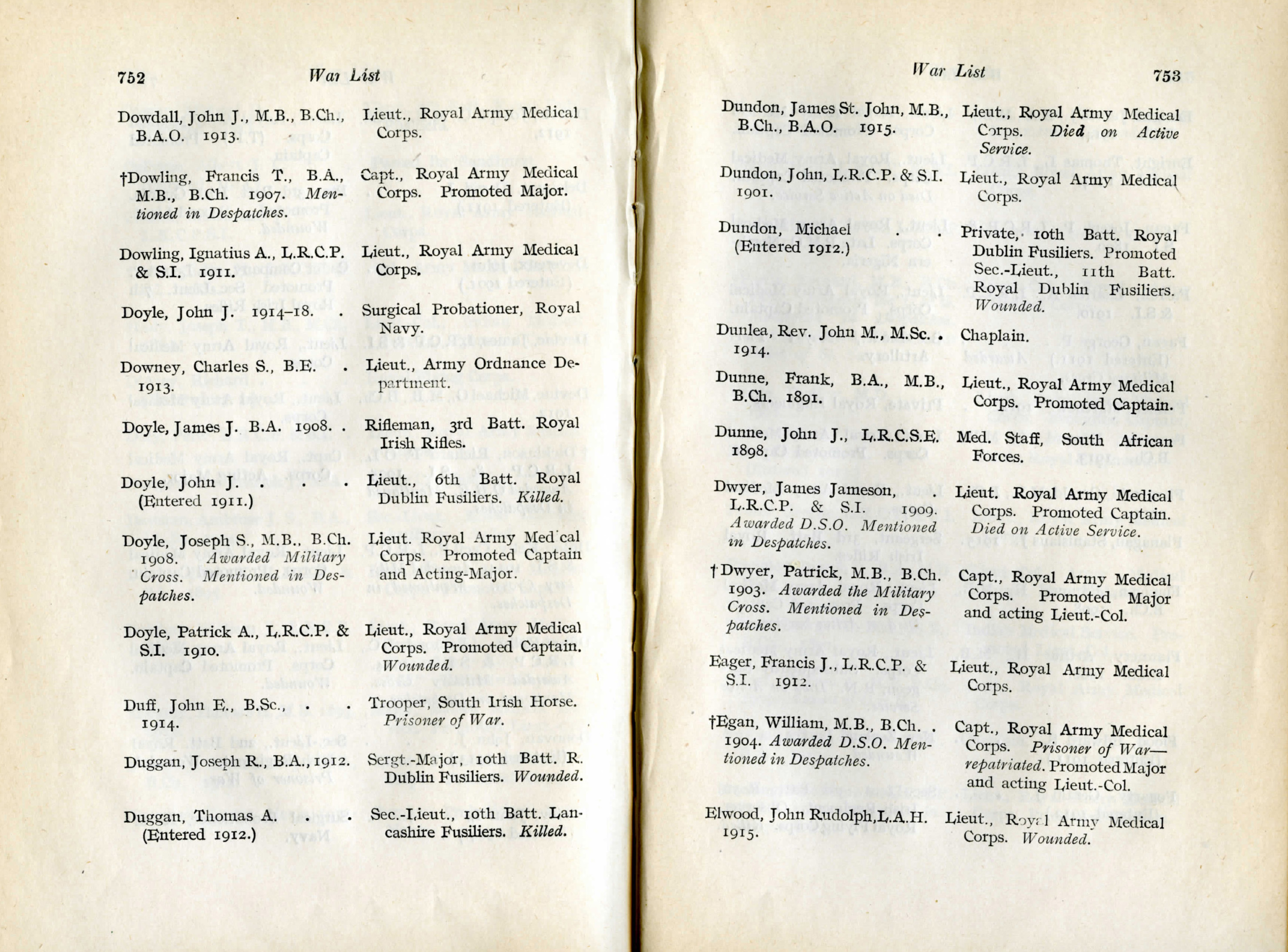
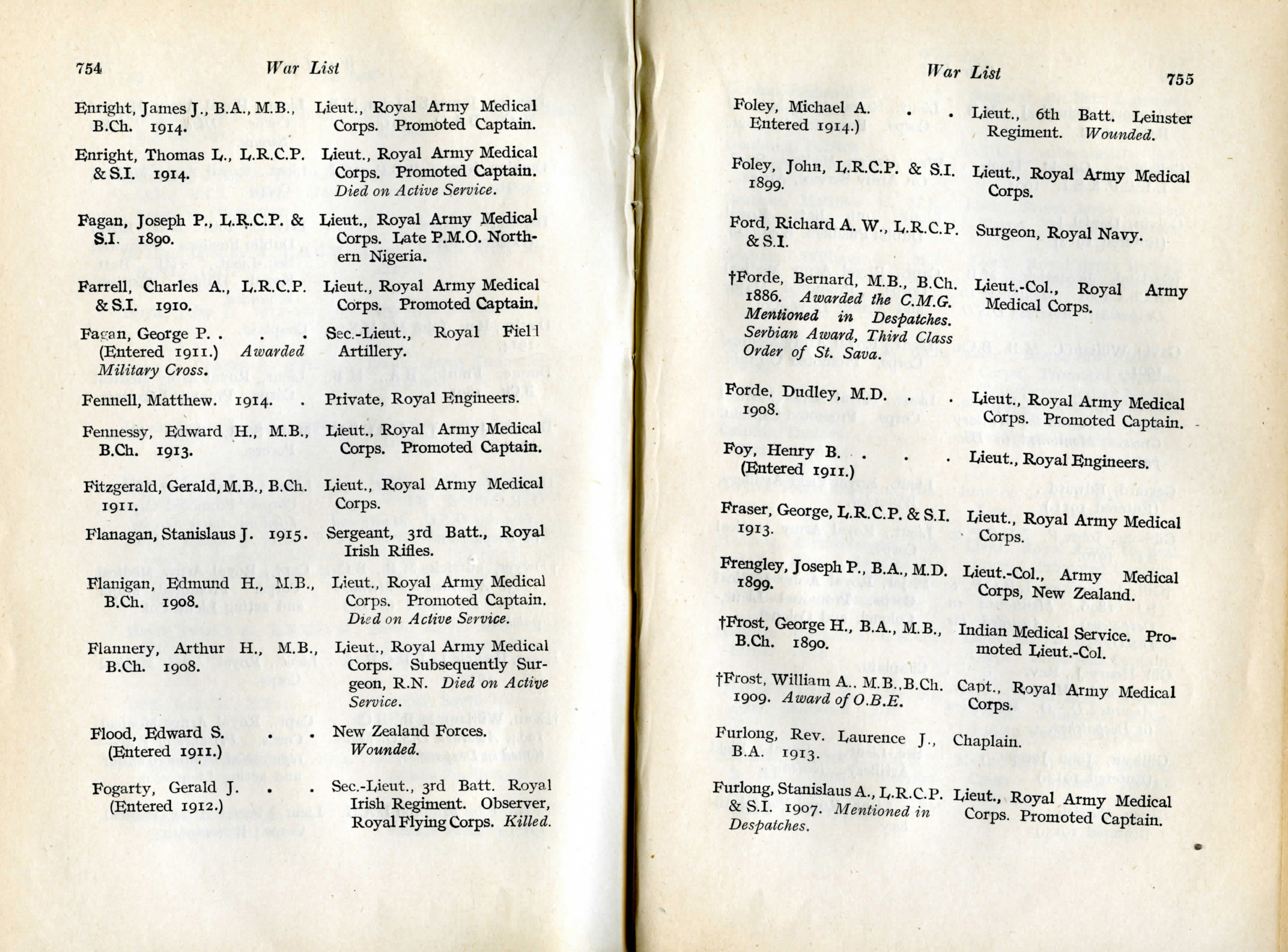
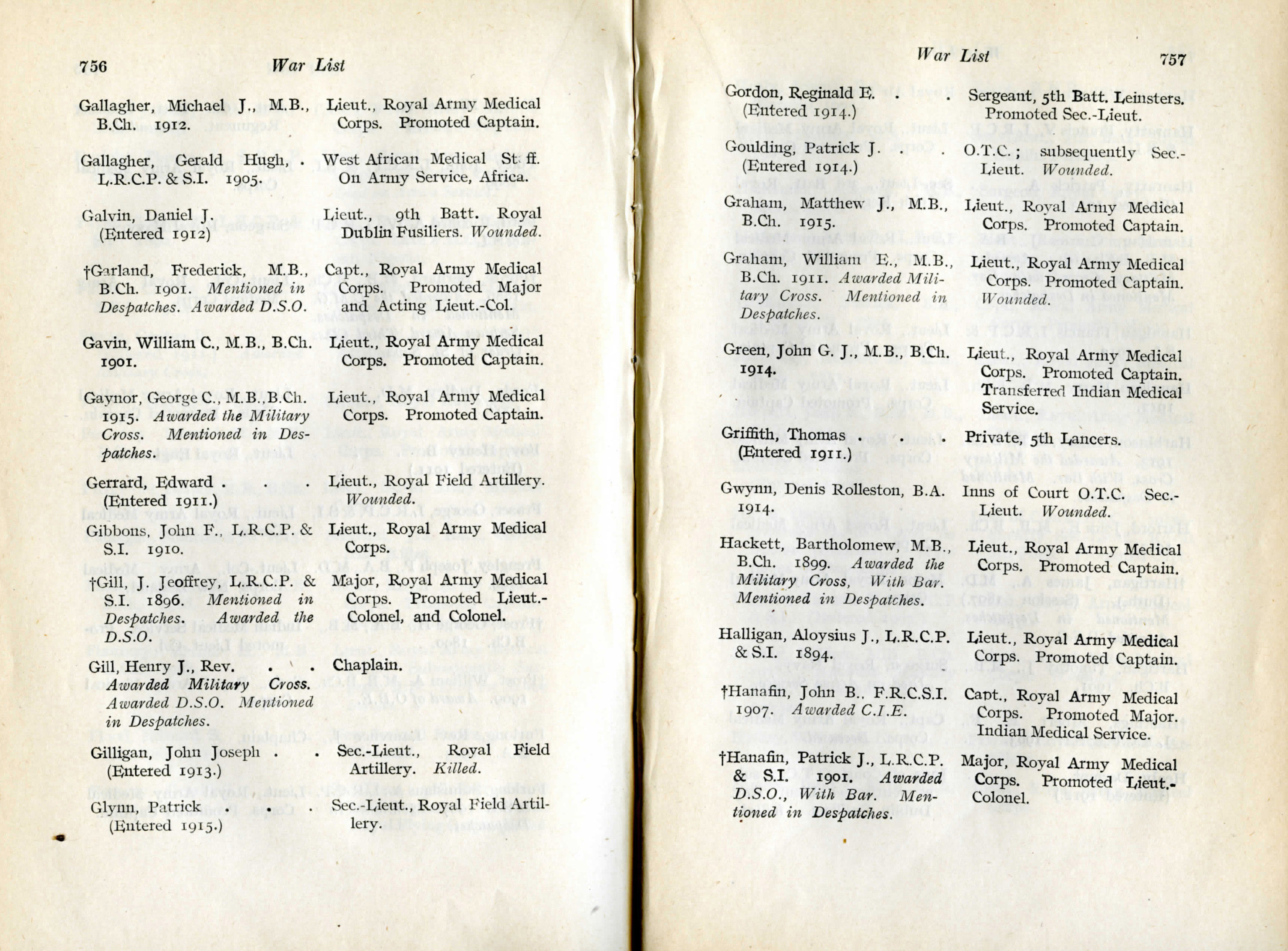
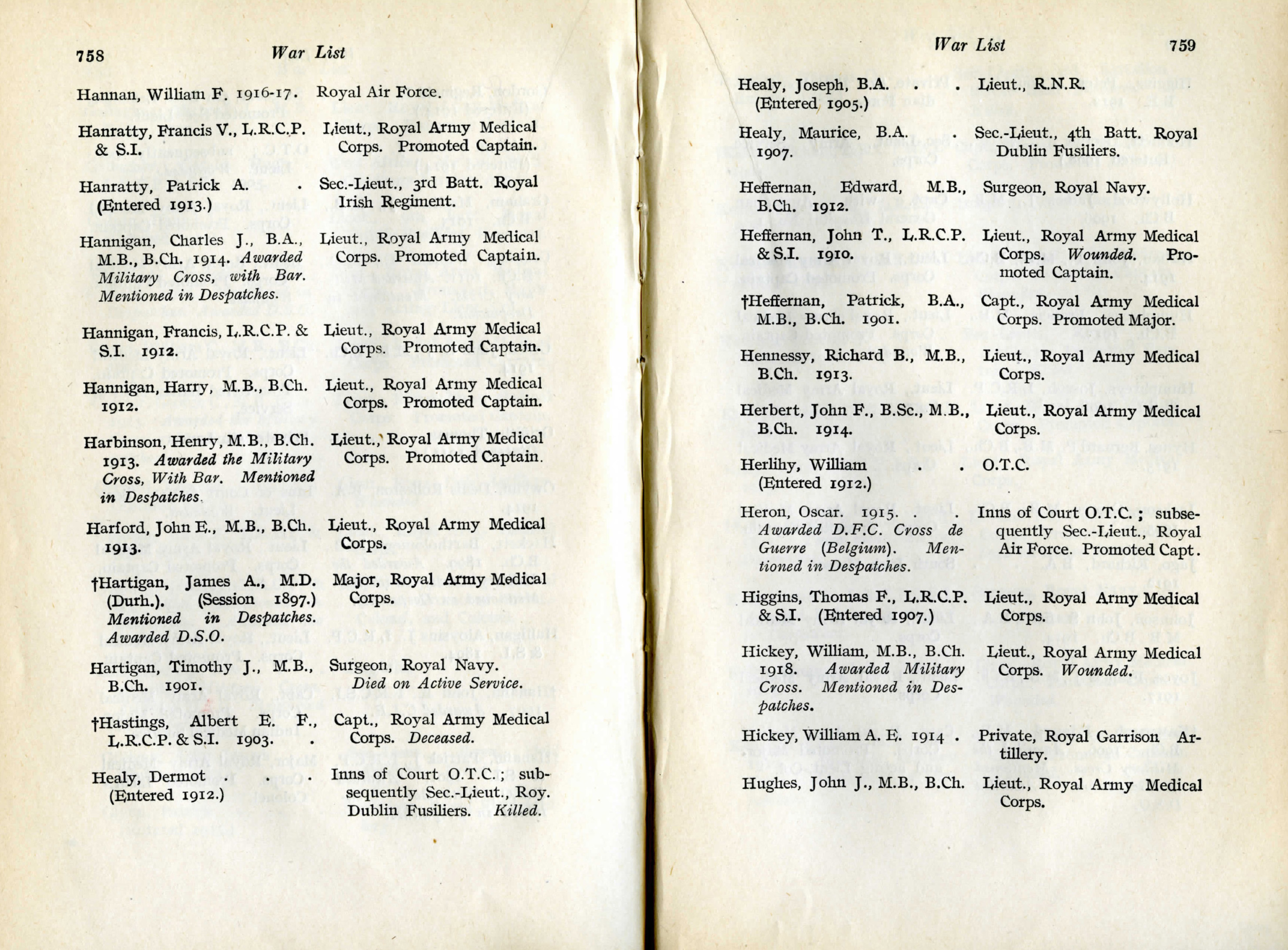
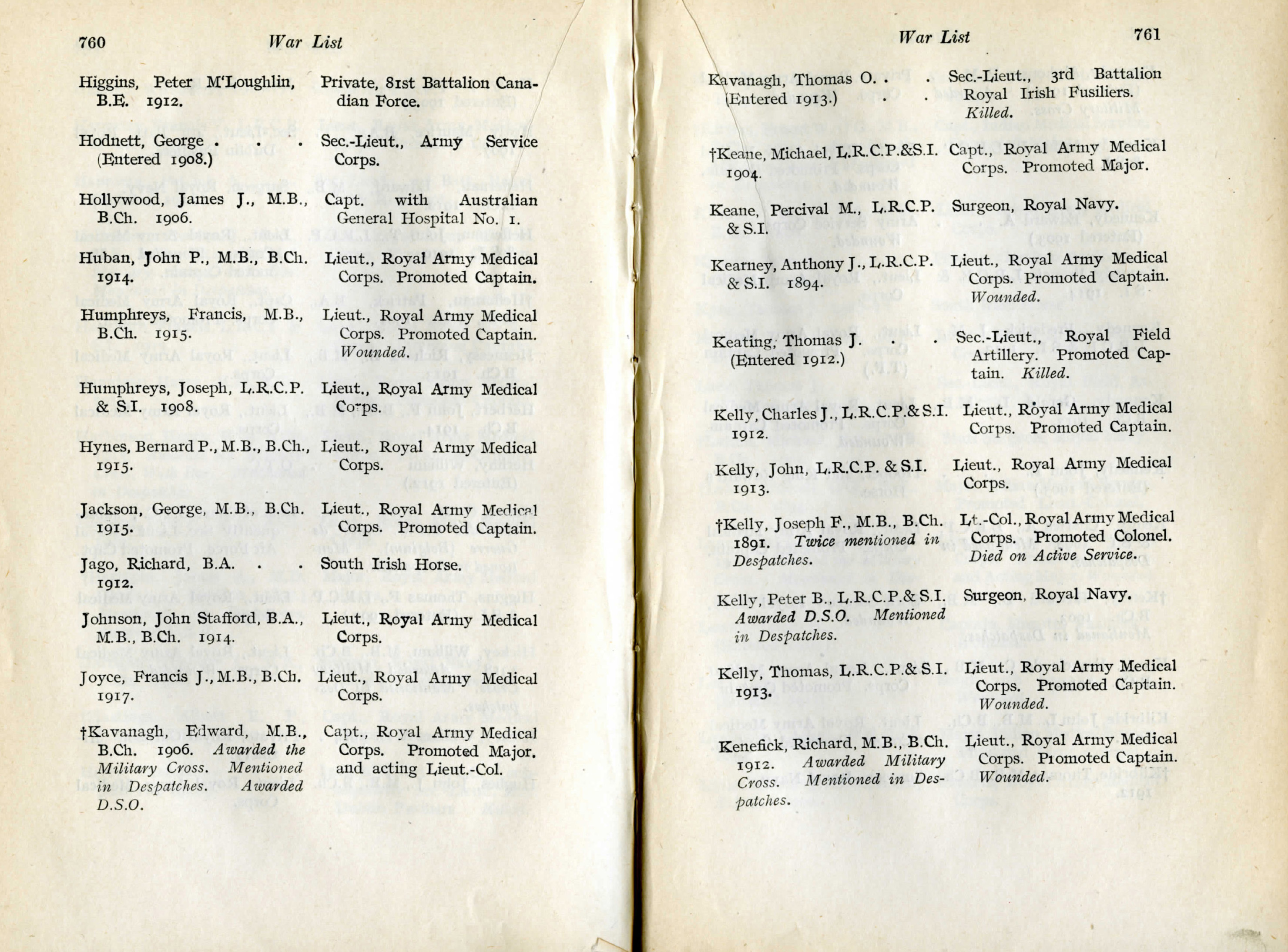
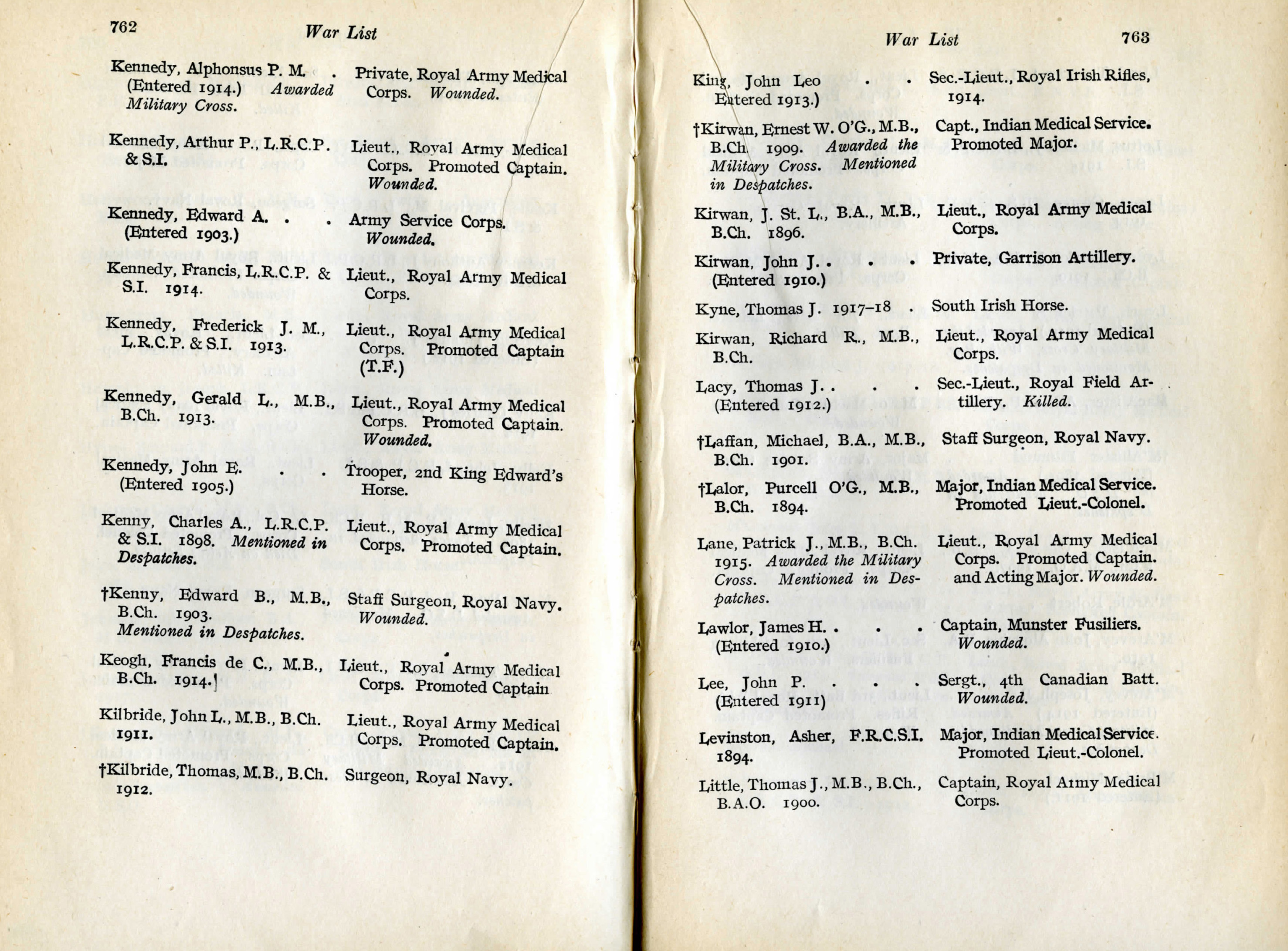
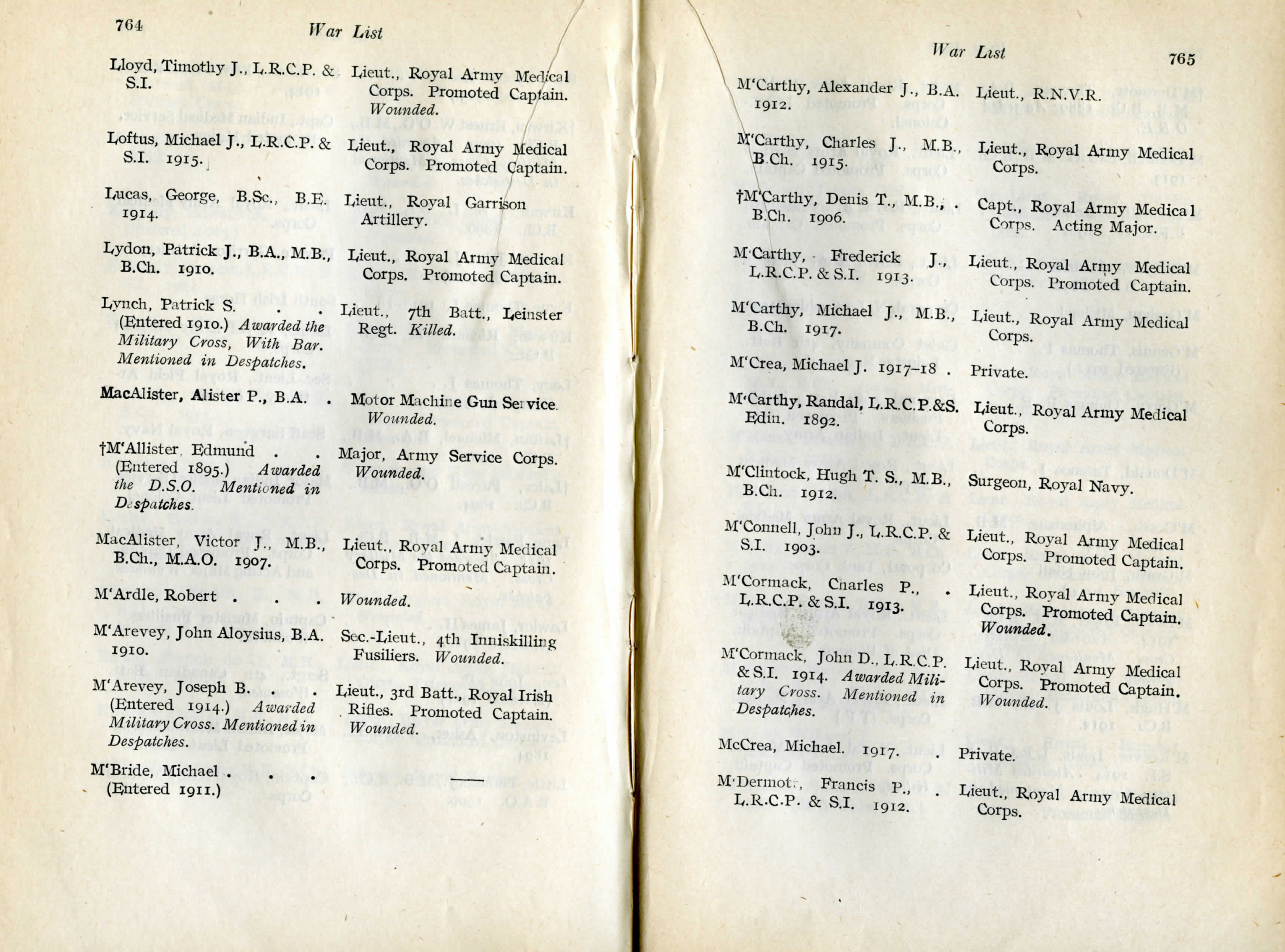
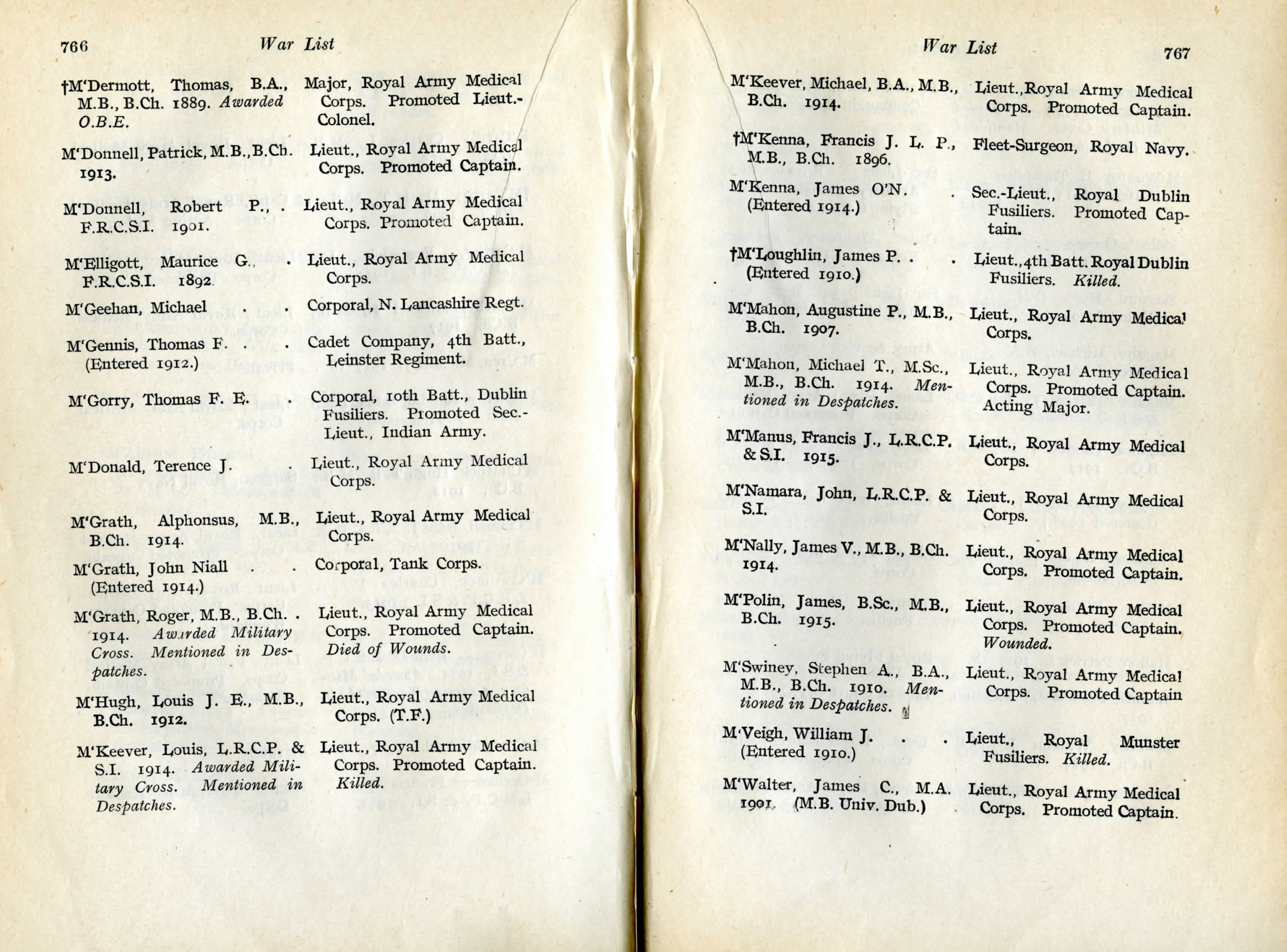
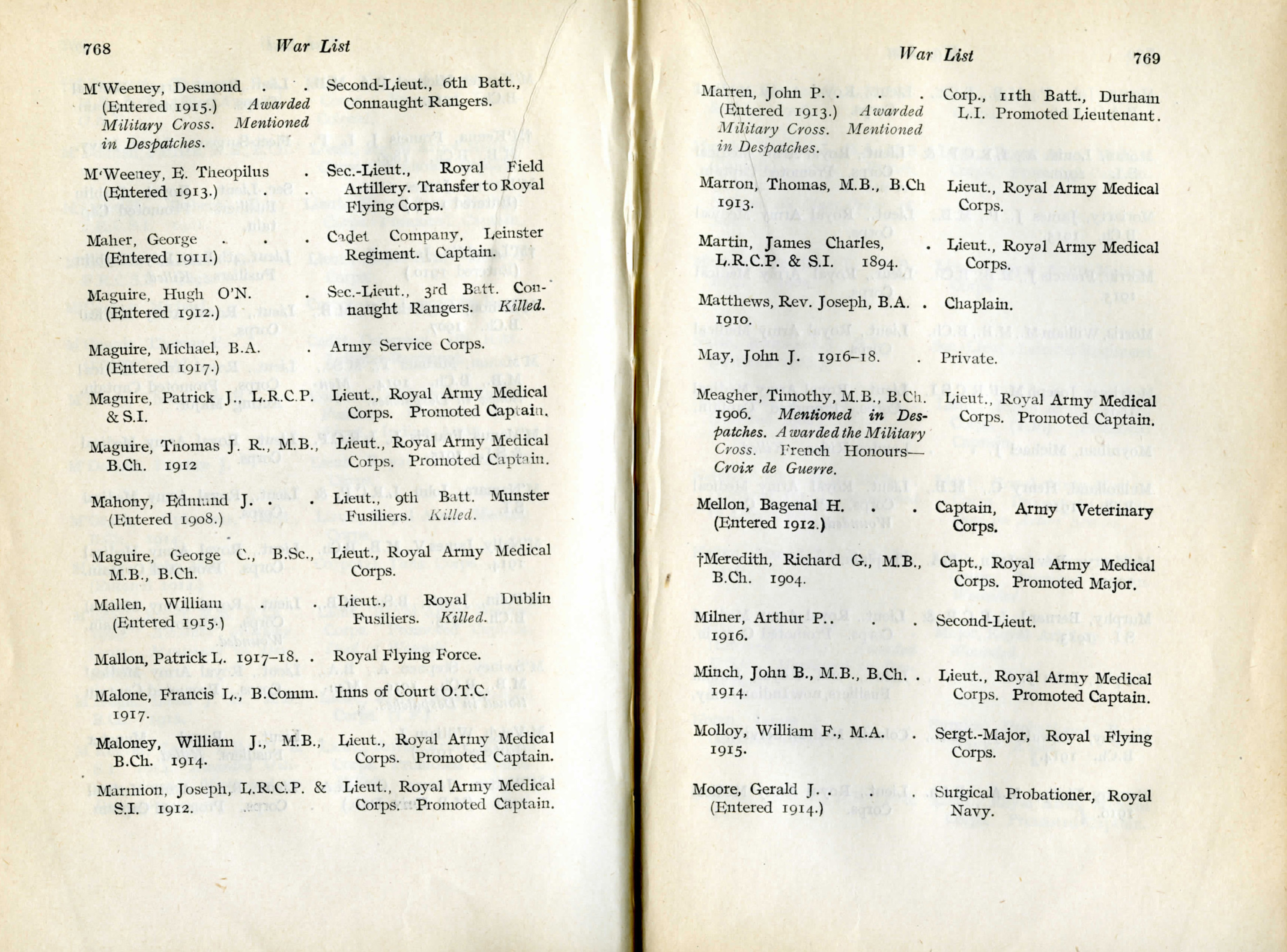
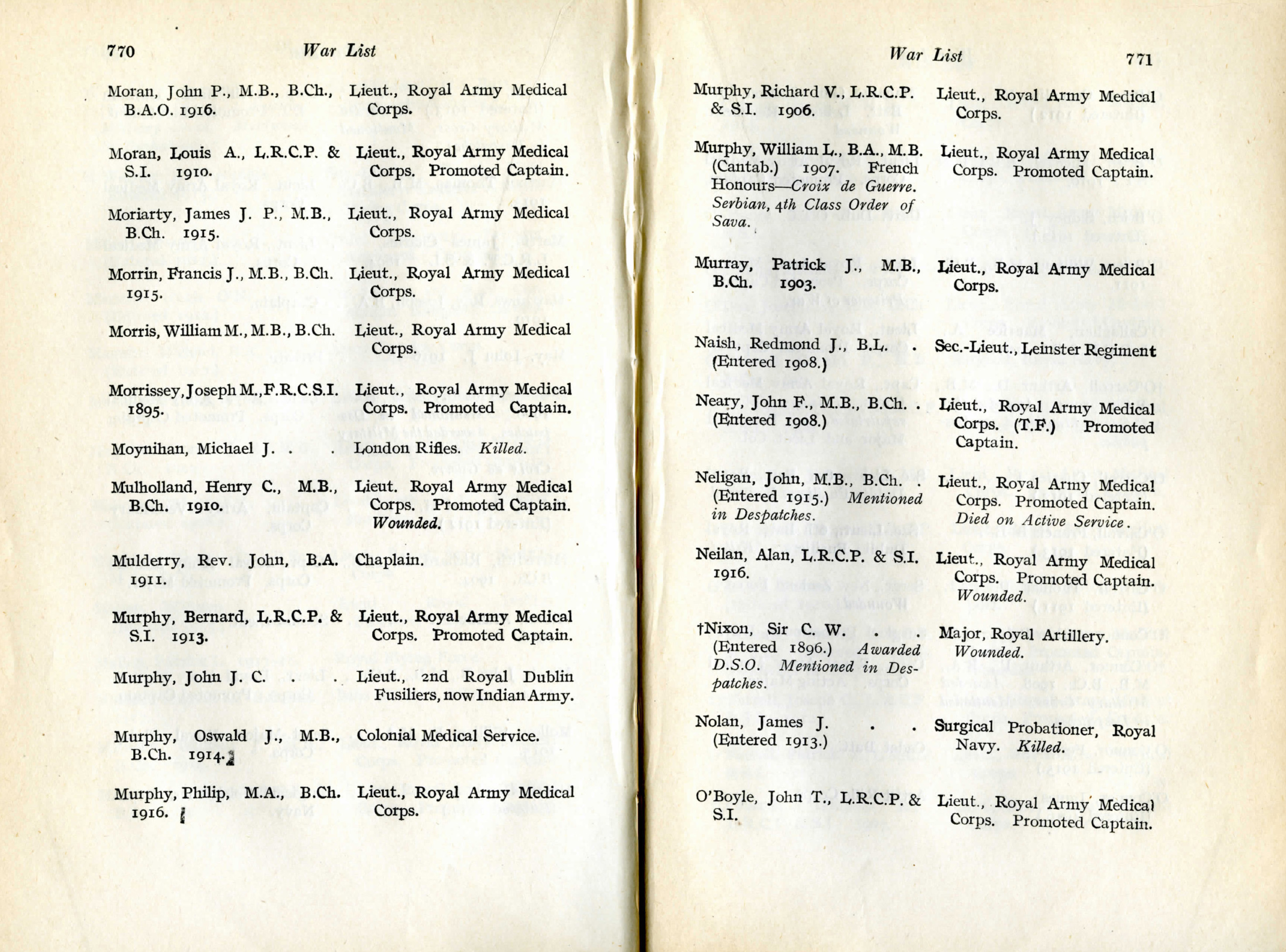
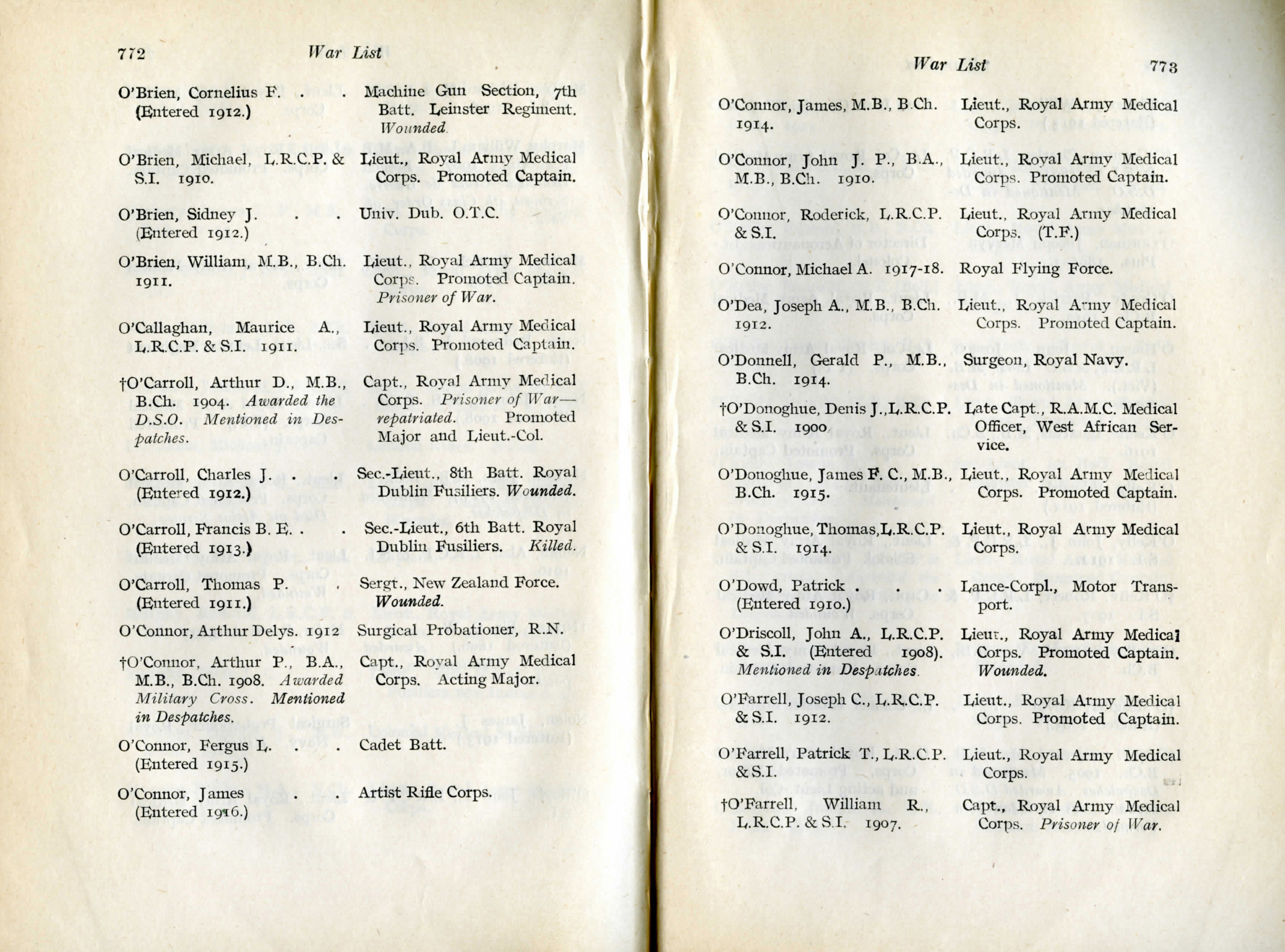
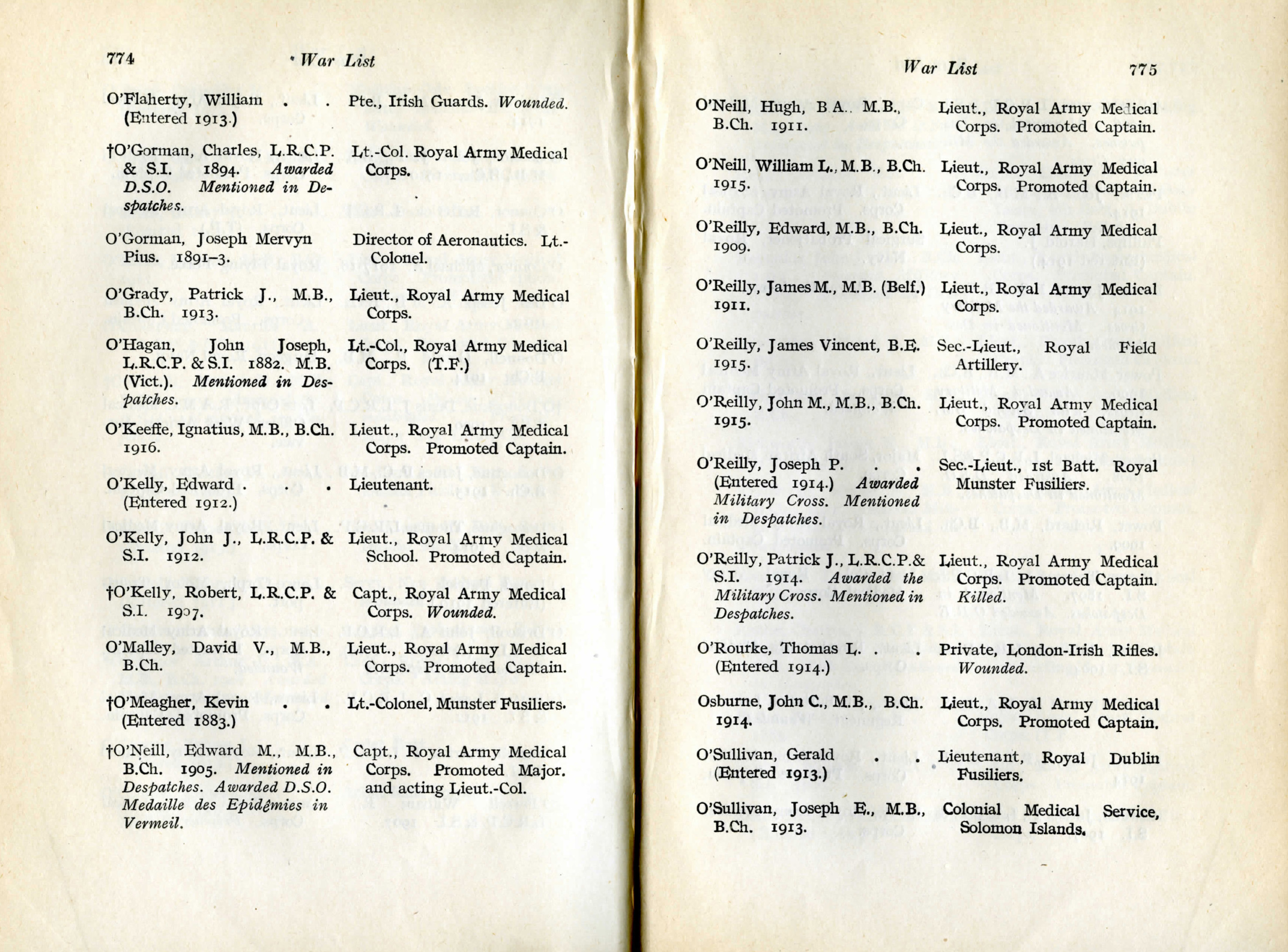
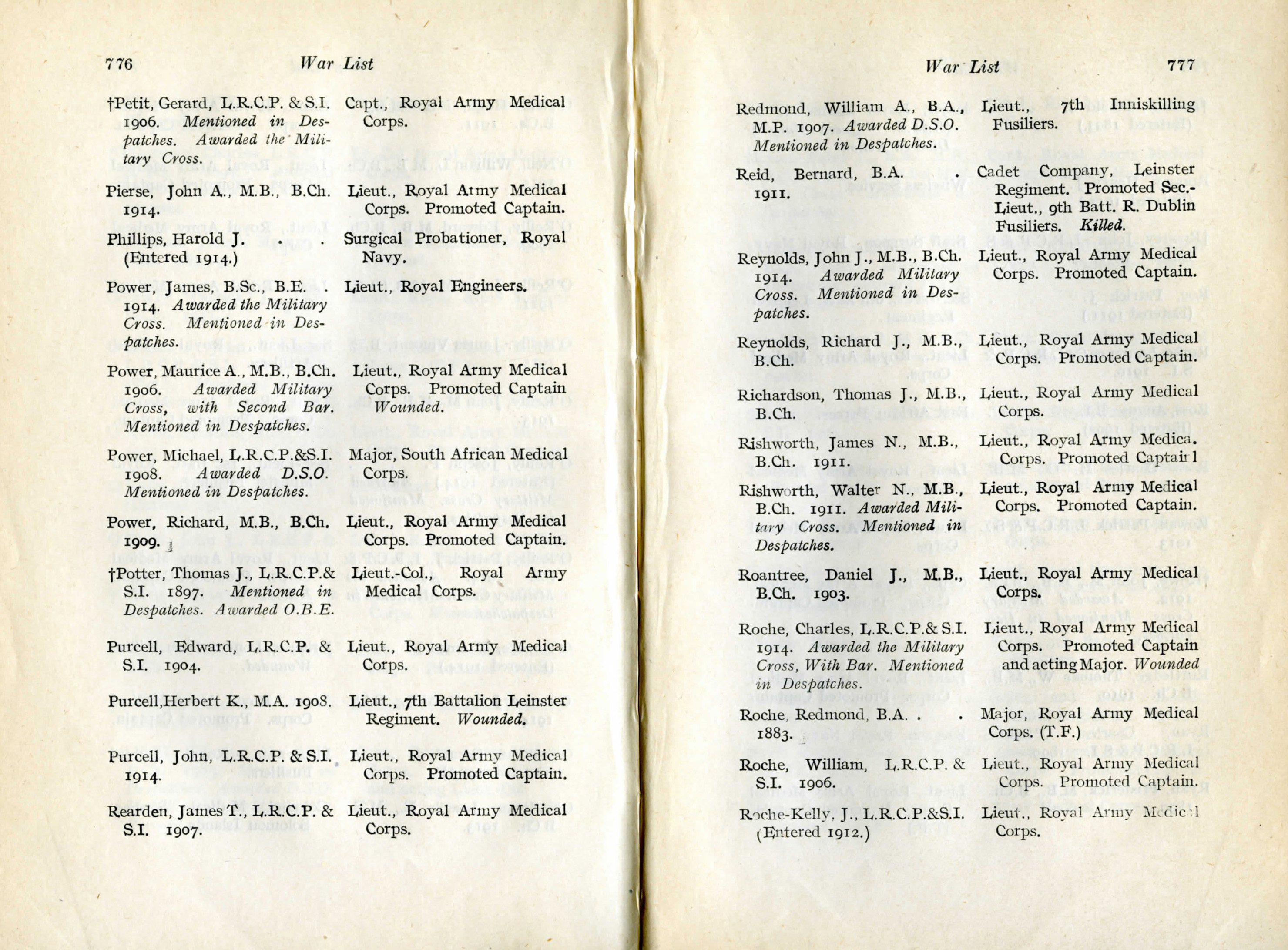
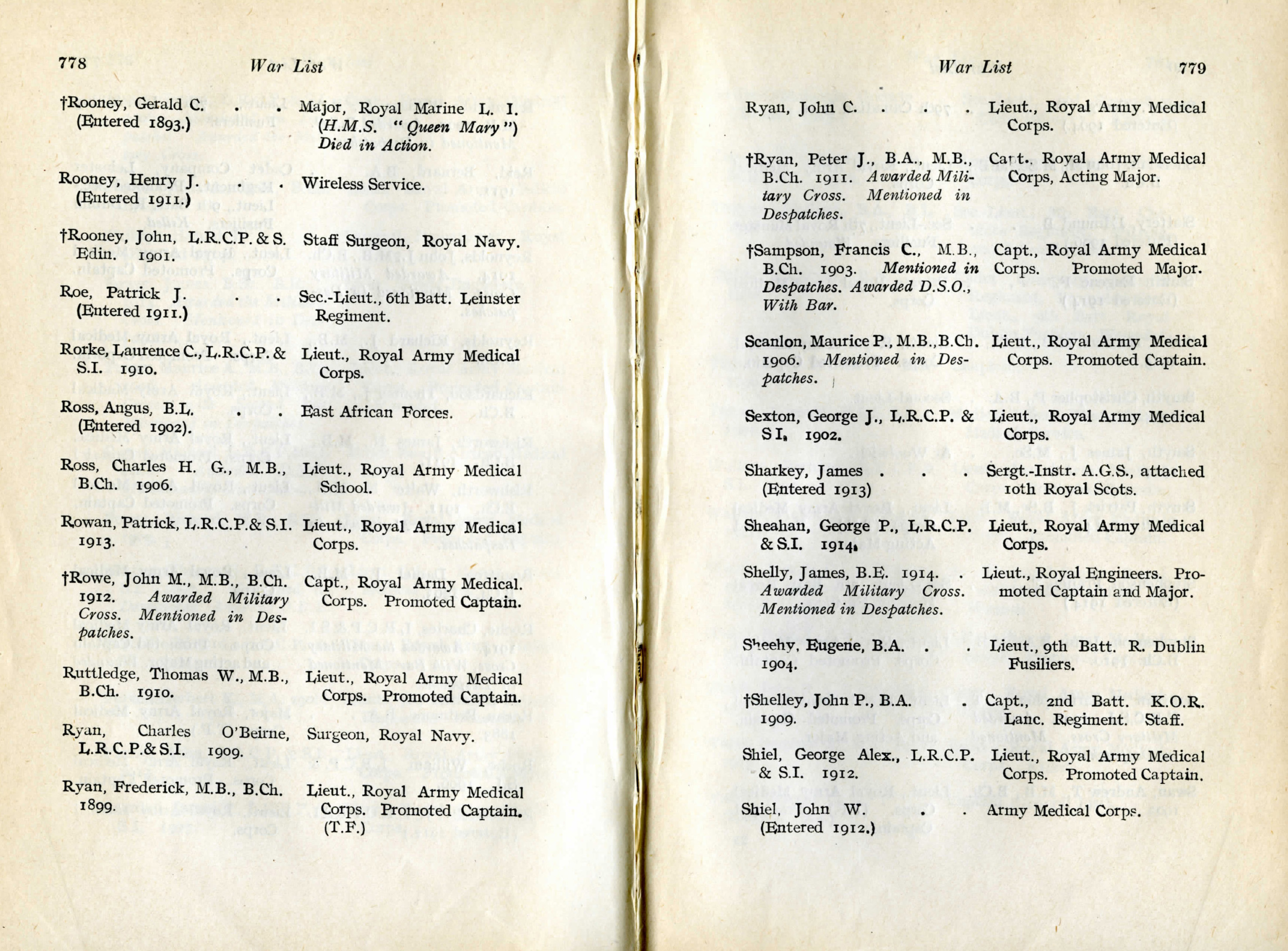
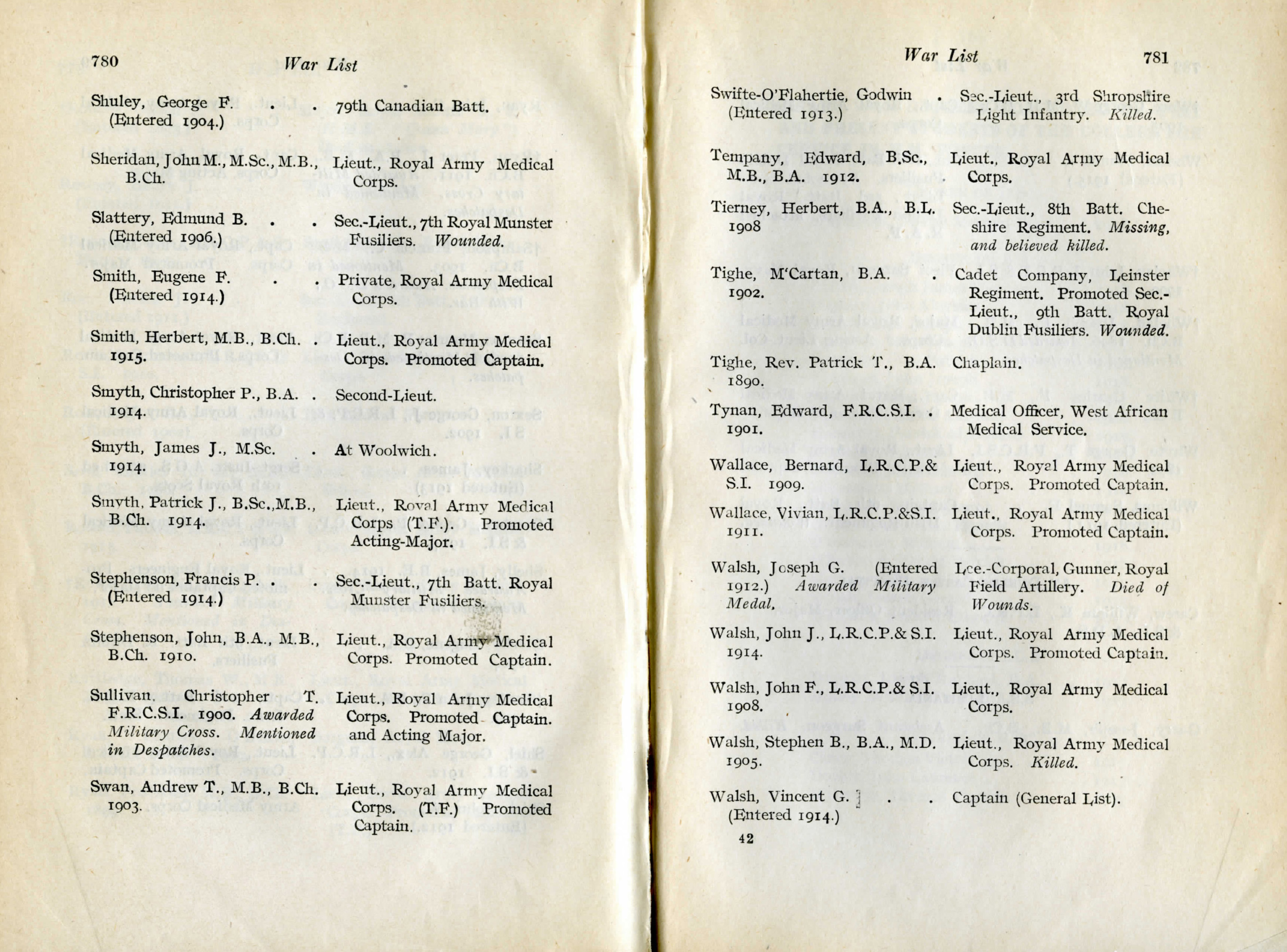
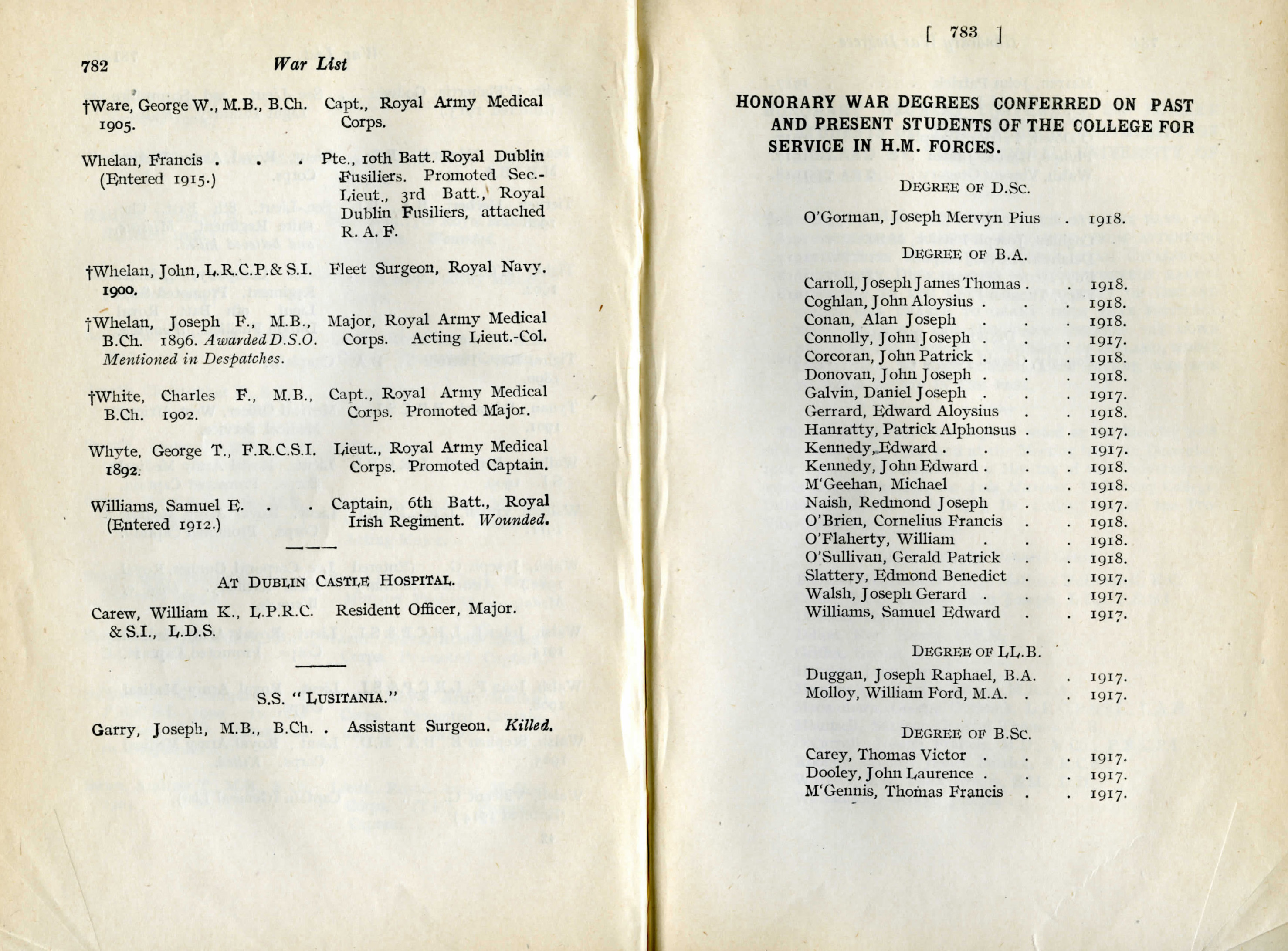
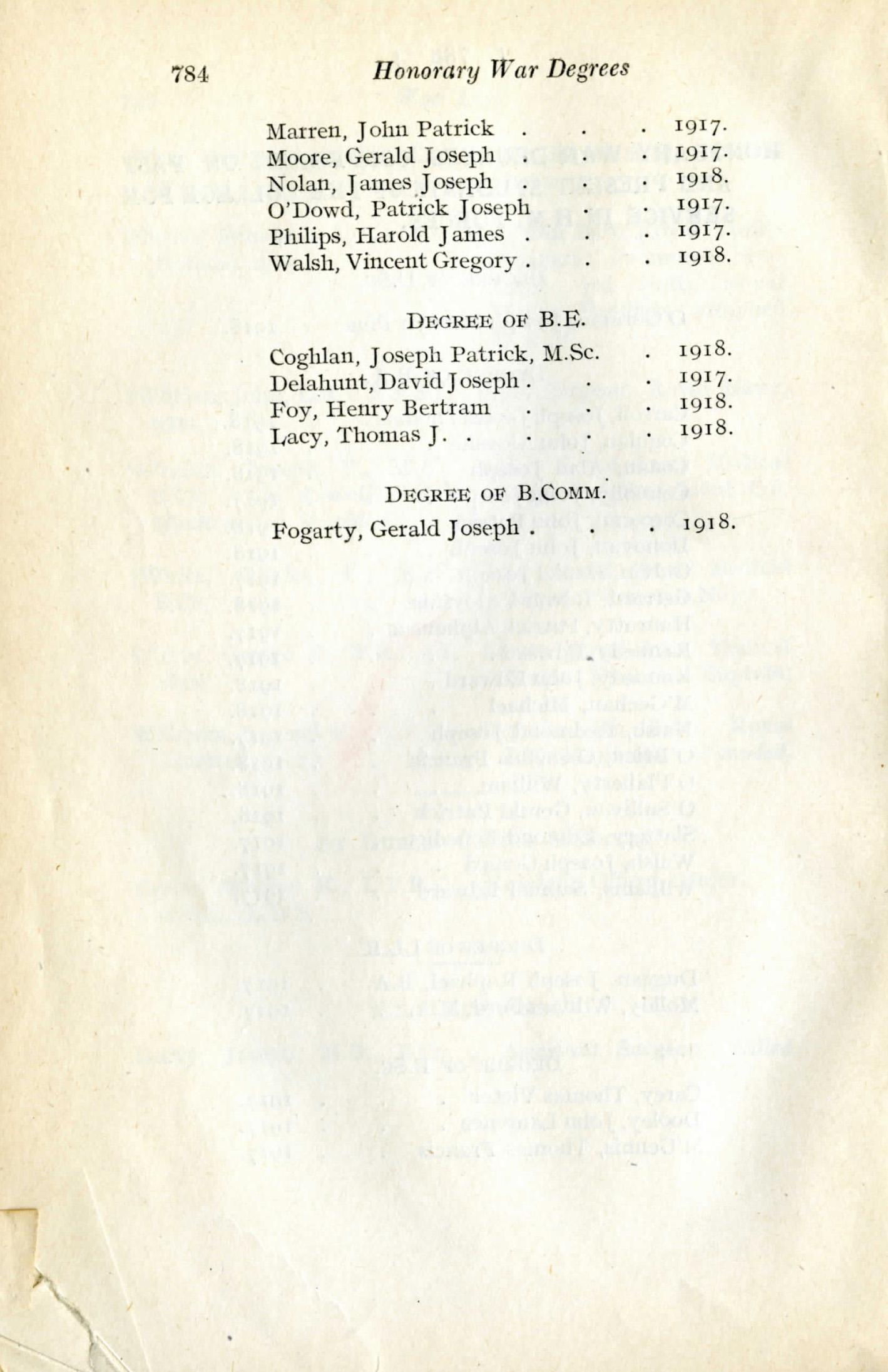
Royal Telegram on the Death of Michael Moynihan
Michael Moynihan was an Irishman who fought and was killed in France during WW1. He was born on 3 February 1891, the eldest son of Maurice and Mary Moynihan, he was educated at the Christian Brothers’ School in Tralee where he won many academic prizes and awards. In 1908 he went to Dublin to study at what subsequently became University College Dublin, one of the constituent colleges of the new National University of Ireland.
In March 1914 he joined the Civil Service Rifles, a unit of the British Territorial Army. When war broke out, he remained with this unit and did not return to the civil service. As a territorial unit, the Civil Service Rifles were restricted to home duties within the United Kingdom. But in 1916 Moynihan decided to sign up for foreign service despite his mother’s opposition; and he went to France at the end of June 1916 as a private in the London Regiment.
In 1917 he received a commission as a second lieutenant and joined the 8th (Irish) Battalion of the King’s Liverpool Regiment which was fighting in north-east France around Ypres. He was killed on 3 June 1918 and is buried in Doullens Cemetery, just north of Amiens.
Michael’s papers are housed in UCD Archives and give a unique insight to life on the Front. To find out more about Michael and the part he played in WWI go to our Twitter timeline exhibition The Midst of it All.
A full transcription can be read below.
UCDA P57/12 (5). Royal telegram on the death of Michael Moynihan.
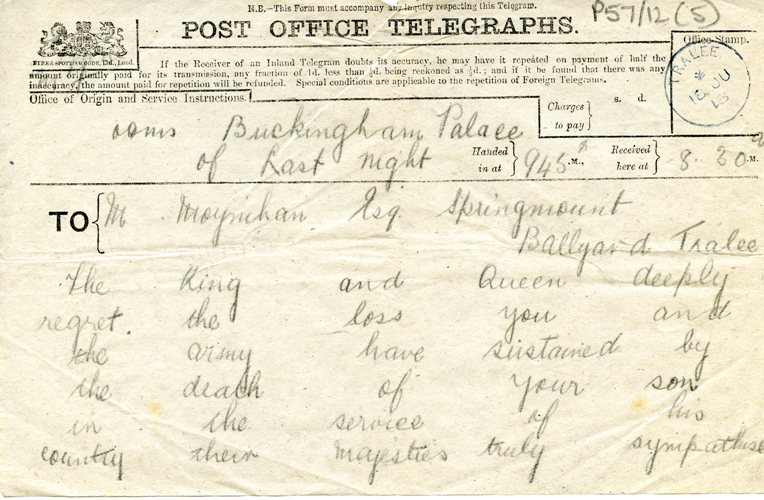
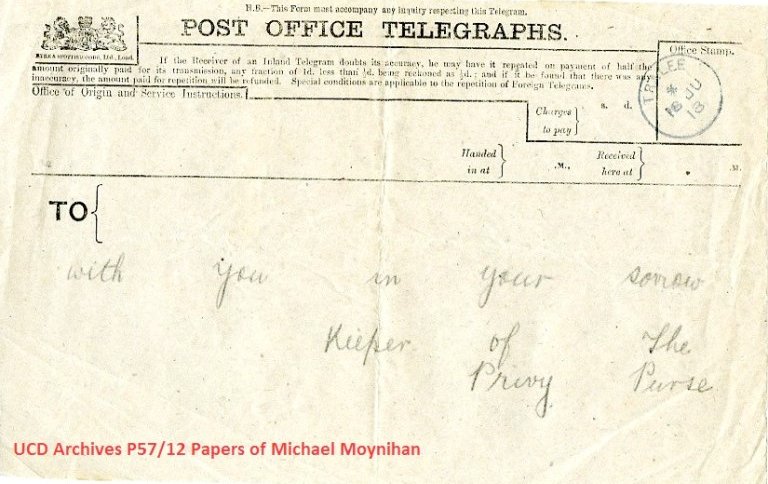
Buckingham Palace of last night.
M. Moynihan Esq. Springmount, Ballyard, Tralee.
The King and Queen deeply regret the loss you and the army have sustained by the death of your son in the service of his country their majesties truly sympathise with you in your sorrow.
Keeper of the Privy Purse.
Lemass on Ireland's EEC Membership
Influential in founding the Fianna Fáil Party in 1926, Seán Lemass was appointed Minster for Industry and Commerce, when the party entered government in 1932. During the Emergency (1941–5), his portfolio expanded to cover the Ministry of Supplies. In 1945, De Valera nominated him as Tánaiste, and he succeeded De Valera as Taoiseach in 1959. He is remembered for building up Ireland's industry and infrastructure and founded many state bodies to achieve this such as Bord na Móna, Aer Lingus and Irish Shipping.
The Seán Lemass Interviews took place throughout 1967–69. They were conducted by businessman and hotelier, Dermot A. Ryan. Ryan was member of the Fianna Fáil National Executive in the 1960s and Lemass was a director of Ryan’s company, Ryan Hotels, later part of the Gresham Hotel Group.
Ryan undertook the interviews ‘as a study of the late Sean Lemass’, the ‘only biographical study of Seán Lemass which he [Lemass] arranged himself and for which he provided 300,000 words’ (UCDA P150/3497, letter from Dermot A. Ryan to Éamon de Valera, 26 June 1971).
The tapes and annotated typescripts were deposited in UCD Archives by Aidan O’Connor in 2017 and are now available to consult in our reading room.
UCDA P331/021. Seán Lemass Interviews pg476-48. The typescript below illustrates Lemass' opinions on membership of the EEC.
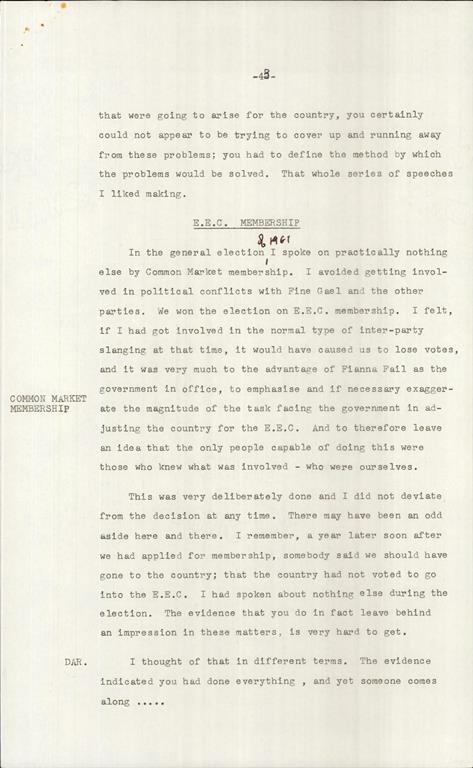
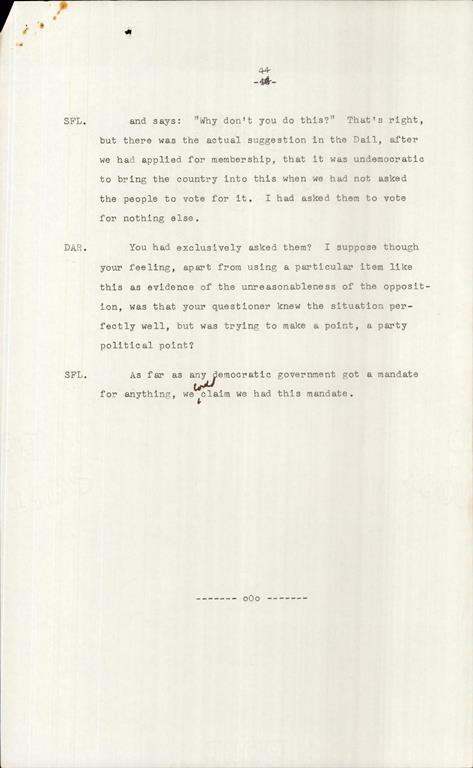
Constitution of Ireland, 1 July 1937
On 1 July 1937 the plebiscite on the proposed new Constitution of Ireland was passed by a plurality. UCD Archives holds a number of significant documents relating to the drafting and implementation of the Constitution.
Eamon de Valera's papers in particular shed light on the drafting and enactment of the 1937 Constitution. Amongst these documents are holograph letters to de Valera from Dr. John Charles McQuaid, then President of Blackrock College and soon thereafter to become Catholic Primate of Ireland and Archbishop of Dublin. One such letter is reproduced below.
On widows, orphans and the aged in the Constitution: 'it is unfair to expect, as so many do, that the State will do everything. It devolves on the family to support - where it can - its own aged members, in a spirit of charity' - Dr John Charles McQuaid to de Valera (March 1937).
A full transcription can be read below.
UCDA P150/2395. Holograph letters to de Valera from Dr. John Charles McQuaid. Papers of Eamon de Valera. Reproduced by kind permission of the UCD-OFM Partnership.
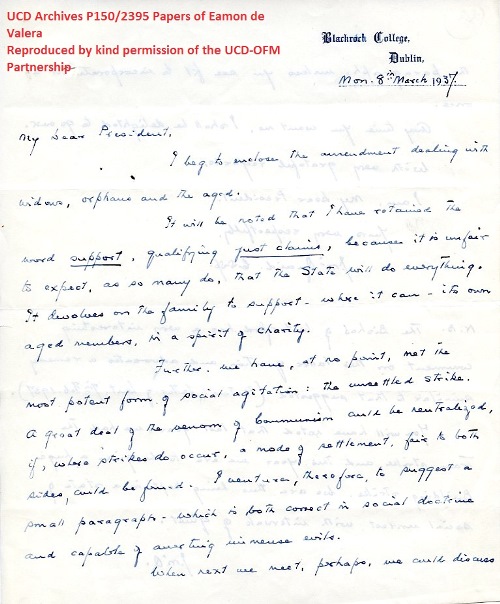
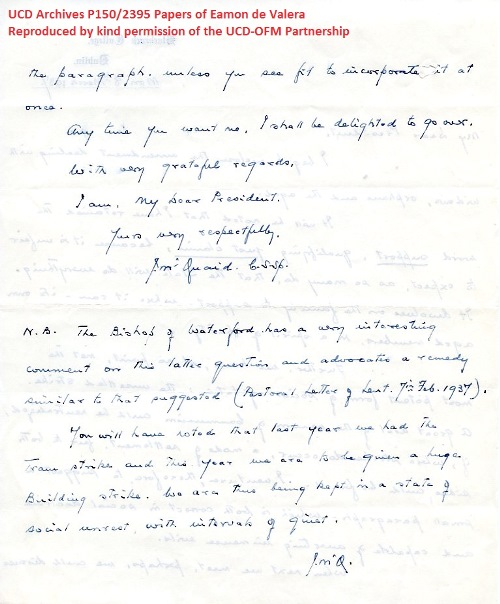
Mon. 8th March 1937
My Dear President,
I beg to enclose the amendment dealing with the widows, orphans and the aged.
It will be noted that I have retained the word support, qualifying just claims, because it is unfair to expect, as so many do, that the State will do everything. It devolves on the family to support, where it can, its own aged members, in a spirit of charity.
Further, we have, at no point, met the most potent form of social agitation: the unsettled strike. A great deal of the venom of Communism could be neutralized, if, where strikes do occur, a mode of settlement, fair to both sides, could be found. I venture, therefore, to suggest a small paragraph, which is both correct in social doctrine and capable of averting immense evils.
When next we meet, perhaps, we could discuss the paragraph, unless you see fit to incorporate it at once.
Any time you want me, I shall be delighted to go over.
With very grateful regards,
I am, my Dear President,
Yours very respectfully,
J. McQuaid C.S.Sp
N.B. The Bishop of Waterford has a very interesting comment on this latter question and advocates a remedy similar to that suggested (Pastoral Letter of Lent, 7th Feb. 1937).
You will have noted that last year we had the tram strike and this year we are to be given a huge building strike. We are thus being kept in a state of social unrest with intervals of quiet.
J. McQ.
Anti-Amendment Leaflet, 1983 Referendum
From 1977 to 1982 Gemma Hussey served as a Senator elected by the National University of Ireland panel. During her first term she sat as an independent. In 1980 she joined the Fine Gael Parliamentary Party and became the party’s first spokesperson on Women’s Affairs. She went on to become the Government Leader in the Seanad.
Gemma Hussey was elected to Dáil Éireann as a TD for the Wicklow constituency in February 1982 having narrowly missed out on a seat in the general election held in June 1981. She was appointed as the opposition spokesperson on Broadcasting, Arts and Culture. She held her seat at the next general election in November 1982 and was appointed in the Fine Gael-Labour coalition government as Ireland’s first female Minister for Education from 1982 to 1986. After a cabinet reshuffle she briefly served as Minister for Social Welfare and Minister for Labour.
This leaflet is one item in a file of c600 pages relating to the Fianna Fáil government’s proposal to amend the Constitution in relation to abortion (the Eighth Amendment of the Constitution) in 1983.
UCDA P179/132. Large file of material related to the eighth amendment, abortion.
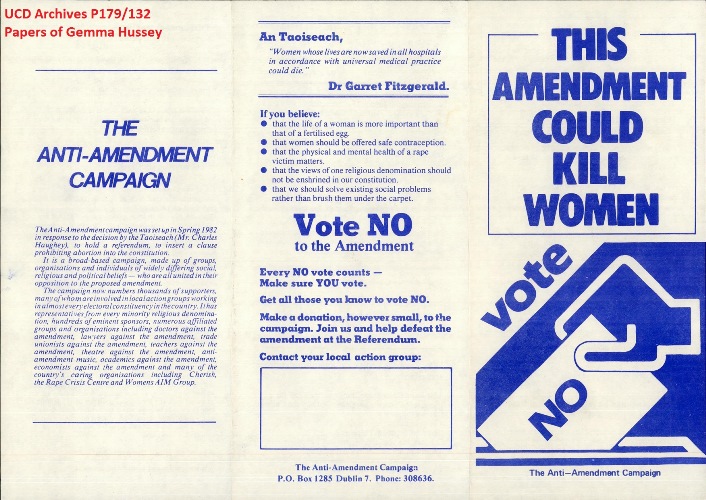
Letter from Lily O'Brennan, April 1923
Lily O'Brennan was a member of Cumann na mBán. In 1921, she was on the secretarial staff at 22 Hans Place, London, during the Treaty negotiations. In January, 1922, she became typist to Arthur Griffith, President of the Provisional Government, while Gearóid O’Lochlainn was his temporary secretary. In the Autumn of 1922, she was on the staff at the Republican Headquarters at 23 Suffolk Street, Dublin, from where she was taken prisoner. She was a founder member of the Catholic Writers’ Guild whose first meeting took place on November 11th, 1947.
Her sister, Fanny (or Aine) married Eamonn Ceannt and later was secretary of the Irish White Cross (1920-1947). She wrote a history of the organisation.
The bulk of Lily’s collection is correspondence between Fanny and herself, the majority being written from prison. Lily was imprisoned in Mountjoy Jail from 1oth November to 28th December 1922, Kilmainham Jail 24th February to 29th April 1923 and the North Dublin Union until May 22nd 1923. The letters describe prison conditions, the state of women on hunger strike, and name various prisoners and discuss current events.
A full transcript can be read below.
UCDA P13/58. Letter from Lily O'Brennan to her sister Fanny describing the condition of the women on hunger strike, Kilmainham Jail, 22 April 1923.
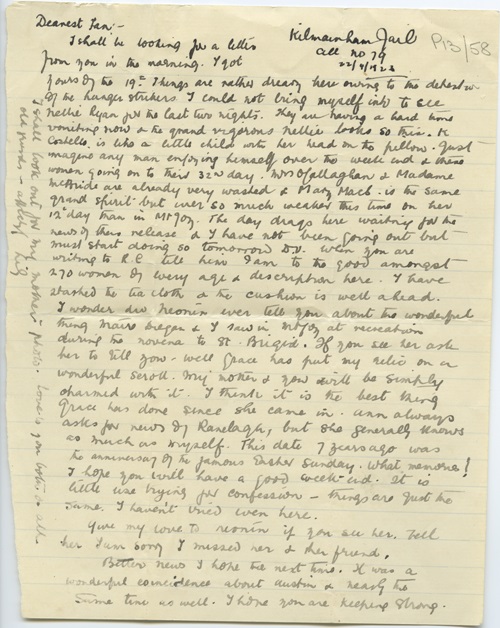
Kilmainham Jail
cell no 79
22/4/1923
Dearest Fan;
I shall be looking for a letter from you in the morning. I got yours of the 19th. Things are rather dreary here owing to the detention of the hunger strikers. I could not bring myself into see Nellie Ryan for the last two nights. They are having a hard time vomiting now & the grand vigorous Nellie looks so thin. K. Costello is like a little child with her head on the pillow. Just imagine any man enjoying himself over the weekend & these women going on to their 32nd day. Mrs O’Callaghan & Madam McBride are already very wasted & Mary MacS. is the same grand spirit but ever so much weaker this time on her 12th day than in Mountjoy. The day drags here waiting for the news of their release & I have not been going out but must start doing so tomorrow D.V. When you are writing to R.C tell him I am to the good amongst 270 women of every age and description here. I have stashed the tea cloth and the cushion is well ahead. I wonder does [Neonín] ever tell you about the wonderful thing Maíre Dregan & I saw in Mountjoy at recreation during the novena to St Brigid. If you see her ask her to tell you. Well Grace has put my relic on a wonderful scroll. My mother & [?] will be simply charmed with it. I think it is the best thing Grace has done since she came in. Ann always asks for news of Ranelagh, but she generally know as much as myself. This date 7 years ago was the anniversary of the famous Easter Sunday. What memories! I hope you will have a good week end. It is little use trying for confession – things are just the same. I haven’t tried even here.
Give my love to Neonín if you see her. Tell her I am sorry I missed her & her friend.
Better News I hope next time. It was a wonderful coincidence about Austin & nearly the same time as well. I hope you are keeping strong.
I shall look out for my mother’s photo. Love to you both & all old friends.
Affectionately. Lily
Letter to Mary MacSwiney, November 1922
Mary MacSwiney (1872–1942) was a staunch republican. Her vigil at Brixton prison where her brother was on hunger strike propelled her to national prominence. She was vehemently opposed the Anglo-Irish Treaty and she succeeded in twice embarrassing the government into releasing her from prison, after she went on hunger strike in November 1922 and April 1923.
In addition to her own papers (UCDA P48a) and those of her brother, Terence (UCDA P48b), there is significant material concerning Mary MacSwiney in the Papers of Eamon de Valera, including a collection of miscellaneous documents, mainly copies of letters relating to MacSwiney’s hungerstrike in Mountjoy Jail in November 1922.
The document below is a typescript copy of a letter to Mary MacSwiney from Captain Tomas MacAodha, Office of the Director of Intelligence, Portobello Barracks, refusing permission for a visit from her sister Annie MacSwiney with a copy of Mary’s reply outlining ‘the real facts…(which)…will be published’ and concluding ‘I am reluctantly forced to the conclusion that the action of your authorities in this matter is one of vindictiveness against women whose spirit you cannot break any more than you can kill the Republic for which they stand’ (originals dated 19 & 20 November 1922, 2pp).
UCDA P150/658. Copy of letter from Captain Tomas MacAodha, Office of the Director of Intelligence, Portobello Barracks to Mary MacSwiney with reply (19 & 20 November 1922). Papers of Eamon de Valera, reproduced by kind permission of UCD-OFM Partnership.
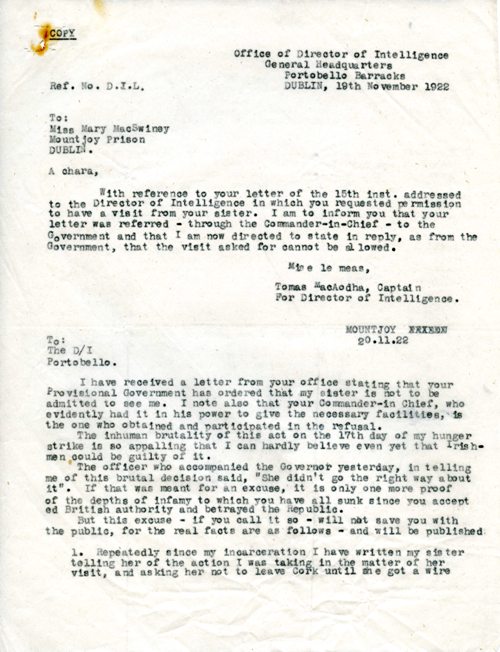
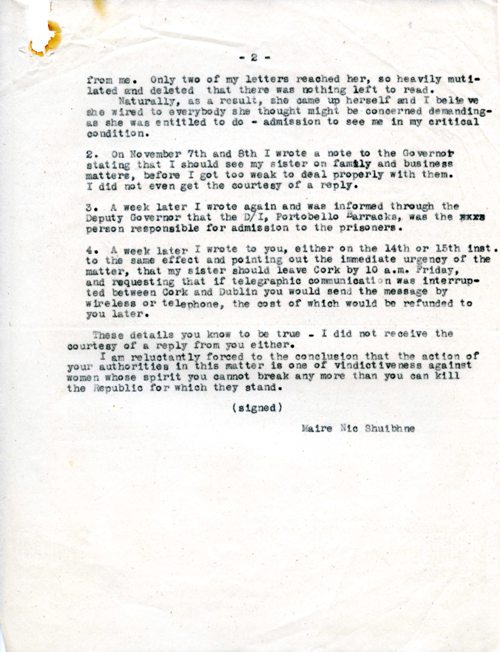
Eithne Coyle O'Donnell's 'Historia Vasca'
This beautiful book 'Historia Vasca' was presented to Eithne Coyle O'Donnell, c1930, on behalf of the women of Euzkadi. The book has a highly decorated fly leaf with a colourful [Euzkadi] crest which is painted on pigskin with the title of the book. The following page is inscribed with a manuscript annotation which includes the line ‘For her many sacrifices in Érin’s cause’.
Eithne was born near Falcarragh, County Donegal, into a farming family with strong republican sympathies, her brother Donal was a Commandant in the 1st Northern Division of the Volunteers/IRA. She joined Cumann na mBan in 1918, carried arms and acted as a courier and was eventually arrested organising in county Roscommon. Sentenced to one year in prison under the Defence of the Realm Act in January 1921, she escaped from Mountjoy Jail in October with three others including Linda Kearns. An Anti-Treaty supporter, she was arrested in November 1922 and interned until late the following year. Eithne was elected President of Cumann na mBan in 1926. She married Bernard O’Donnell, an IRA activist from Donegal, in 1935.
A full transcription can be read below.
UCDA P61/45. 'Historia Vasca'.
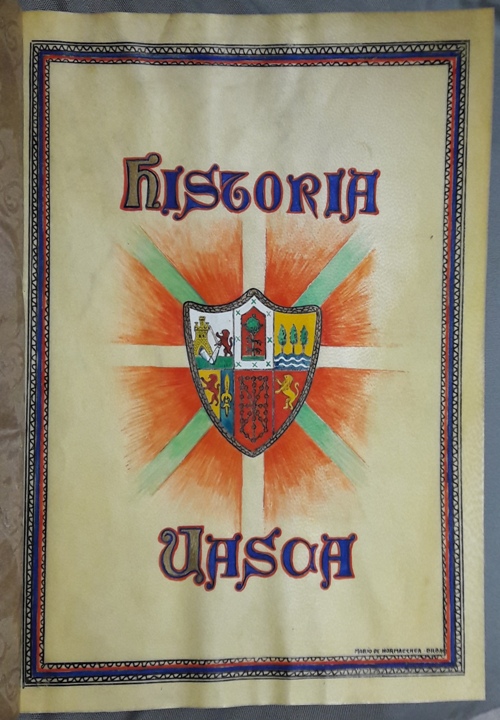
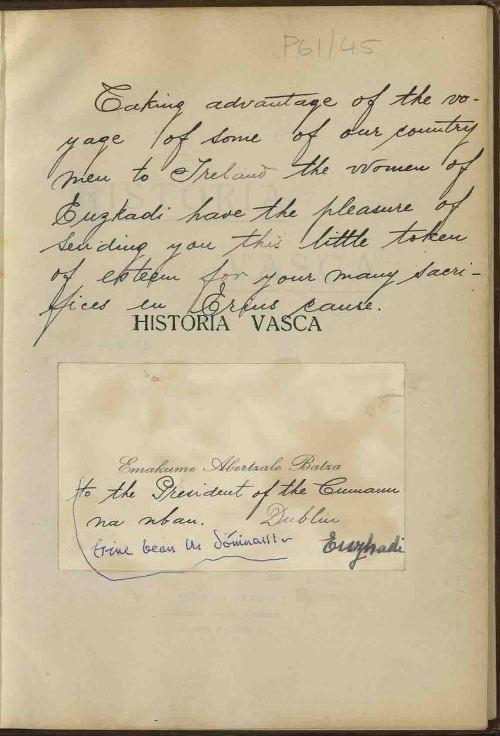
'Taking advantage of the voyage of some of our country men to Ireland the women of Euzkadi have the pleasure of sending you this little token of esteem for your many sacrifices in Erin’s cause. Emakume Abertzale Batxa to the President of the Cumann na mBan. Dublin.’
Equal Parliamentary Suffrage Granted in 1922
The Irish Free State granted equal parliamentary suffrage in 1922. Partial suffrage for women was granted under the Representation of the People Act (1918).
The Constitution of the Irish Free State (1922) reduced the voting age for women in elections for Dáil Éireann from 30 to 21, the same as for men. This was retained by the Constitution of Ireland (1937).
The letter below from Hanna Sheehy Skeffington, Chairman, Irish Women’s Franchise League to Harry Boland, requests his support for the extension of ‘the franchise to women under thirty, on the same terms as at present granted to men’. It is marked ‘Support the measure. HB' in blue pencil.
UCDA P150/1171 Papers of Eamon De Valera. Typescript copy letter from Hanna Sheehy Skeffington, Chairman, Irish Women’s Franchise League to Harry Boland. Reproduced by kind permission of UCD-OFM Partnership.
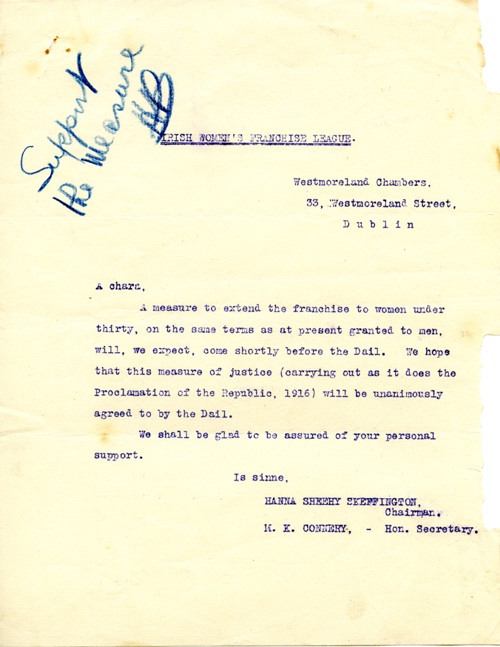
Liam Cosgrave Addresses the L&H Society, January 1972
On 22 January 1972, Liam Cosgrave TD and Leader of Fianna Gael gave a talk to the Literary & Historical Society in UCD. The talk is entitled 'That a Small Country should know its place in the World'. Cosgrave discusses the idea that despite being small geographically, Ireland and the Irish
'..have established their influence, spiritual and cultural, sometimes subtly, sometimes not so subtly, all over the civilised world.'
Cosgrave goes on to discuss Ireland joining the European Economic Community (EEC) and the benefits this would have not just for Ireland, Northern Ireland and Britain but also for Europe. The full typescript of this talk can be read below.
UCDA SOC2/88 (5-8) Records of the Literary & Historical Society.
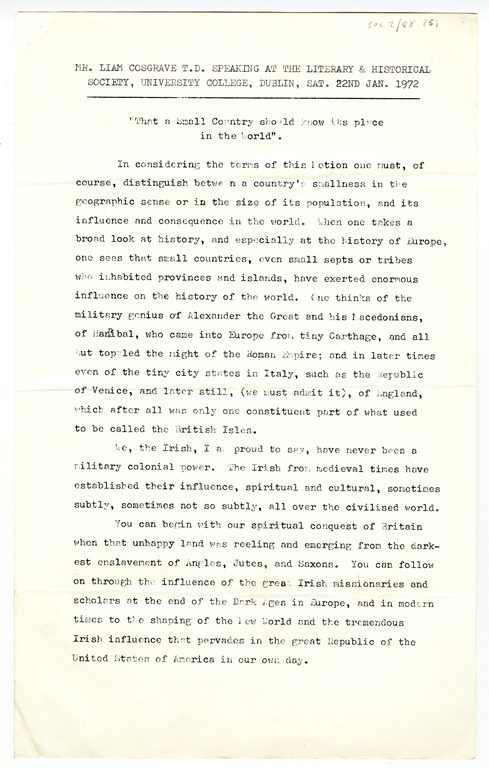
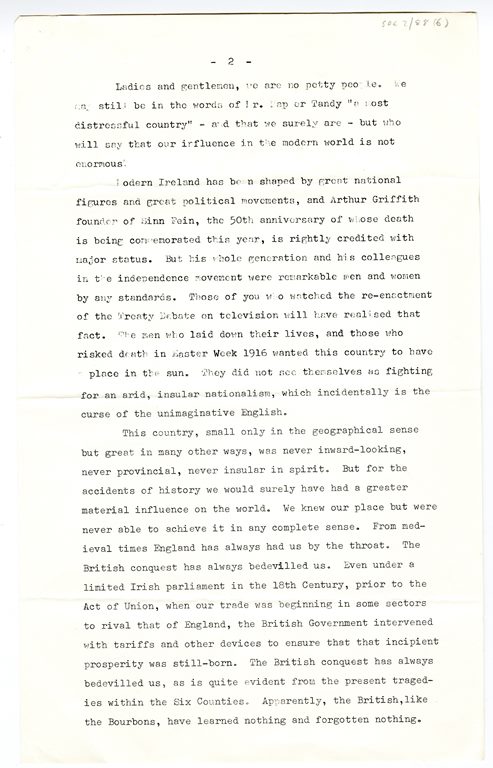
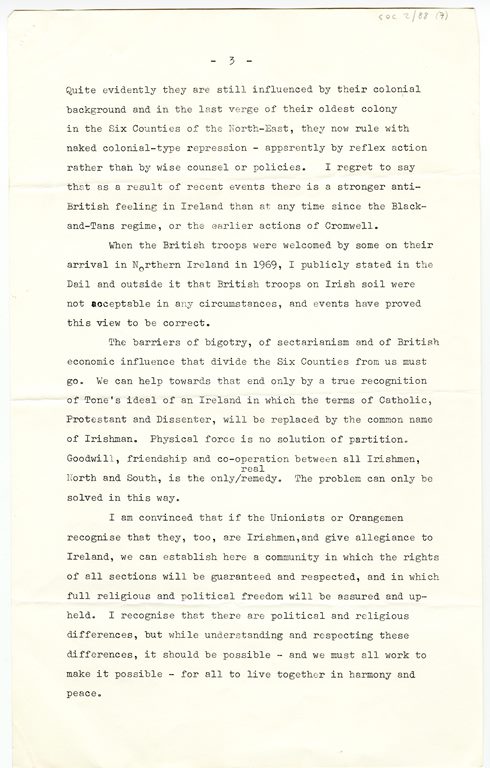
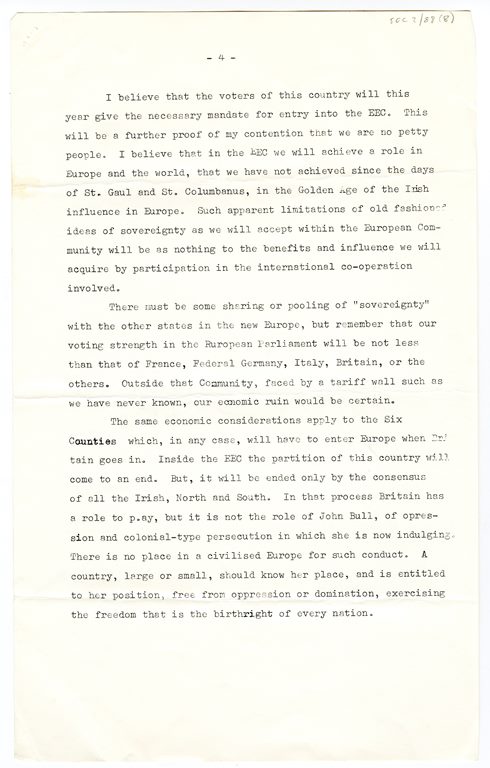
CHRISTMAS CEASE FIRE, 1922
The idea of a Christmas cease fire between those fighting against each other in the Irish Civil War is put forward in a typed memorandum dated December 23rd 1922. This memorandum, seen below, was written by Eamon De Valera and sent to his Chief of Staff, Liam Lynch. De Valera received a letter from a friend who had suggested that...
'..out of respect for the Xmas festival we should declare a "cease fire" as far as our troops are concerned from some time on Sunday until some day next week..'
This document is a precursor to the UCD Library Cultural Heritage Collections (CHC) Advent Calendar which will begin on Friday 1 December. This advent calendar will showcase images from the various Cultural Heritage Collections Units (UCD Archives, UCD Special Collections, National Folklore Collection and UCD Digital Library) to highlight the treasures housed within these units.
A new image from the Advent Calendar will be uploaded every day in December via our Twitter accounts. You can see these images by clicking the links below and following the hashtag #UCDadvent.
UCDA P150/1749 Papers of Eamon De Valera. Reproduced by kind permission of UCD-OFM Partnership.
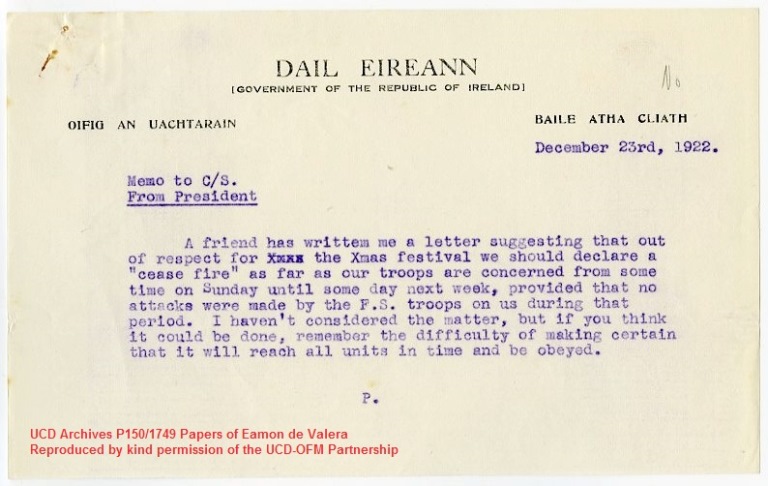
PROGRAMME OF KABUKI AND NOH
Dr Patrick Hillery was born in Miltown Malbay, county Clare on 2 May 1923. In 1939, he undertook the matriculation exam for the NUI and entered UCD to study medicine graduating in 1947 with first class honours.
In 1951 Hillery was nominated as a Fianna Fáil candidate for the Clare constituency winning the third seat to become a TD in the 14th Dáil Éireann. He was appointed Minister for Education in 1959. In 1965 Seán Lemass appointed him as Minister for Industry and Commerce and a short while later to a new Ministry for Labour. He also served as Minister for External Affairs from 1969 to 1972. During this time Hillery was involved in strenuous lobbying in diplomatic circles to further Ireland’s wish to become a member of the EEC. With Ireland’s economy so strongly linked with Britain it was imperative that any negotiations for entry to the EEC being discussed with Britain should also include Irish interests. It was Hillery who led the negotiations for Ireland’s successful accession to the EEC.
In 1972 Hillery was offered, and accepted, the position of Ireland’s first Commissioner. Following the resignation of Cearbhall Ó Dálaigh as President in October 1976 and the decision by the Cosgrave government not to reappoint Hillery as Commissioner, intense speculation gave rise to the idea that Hillery was interested in becoming President. Despite his protestations and desire to return to medical practice, Hillery was put under enormous pressure by the Taoiseach Jack Lynch and other members of Fianna Fáil and he finally accepted the nomination.
The government parties had already announced that they would not contest an election and Hillery was declared elected as Ireland’s sixth President on 9 November 1976. He went on to serve a second term as President and was re-elected unopposed in November 1983.
Hillery retired from office in November 1990 marking the end of an extraordinary public career as a government minister, Commissioner and President.
Hillery died on 12 April 2008, a few weeks short of his 85th birthday.
During his two terms as President, Hillery hosted and attended many state functions both in Ireland and abroad. In February 1989 Hillery represented Ireland when he attended the funeral of the Emperor of Japan, Hirohito who reigned from 25 December 1926 until his death on 7 January 1989. Hillery also attended the ceremonies to mark the enthronement of the new Emperor, Akihito. These images are of the menu card of the banquet (P205/140/5) and the programme of the Kabuki and Noh performance (P205/140/8) held at the Imperial Palace on 12 November 1990 to mark the occasion.
UCDA P205/140 Papers of Dr Patrick Hillery. Menu card and programme of the Kabuki and Noh performance, Japan 12 November 1990.
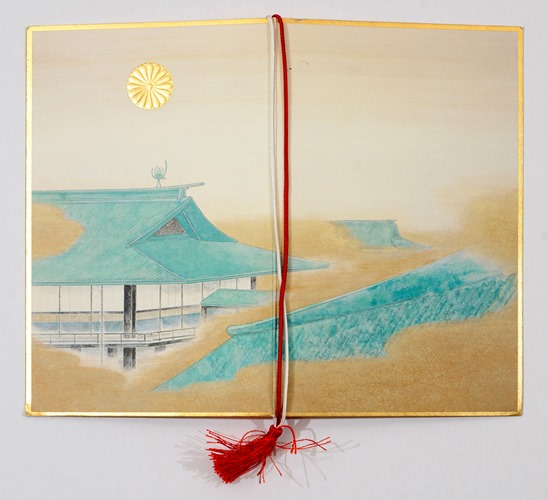
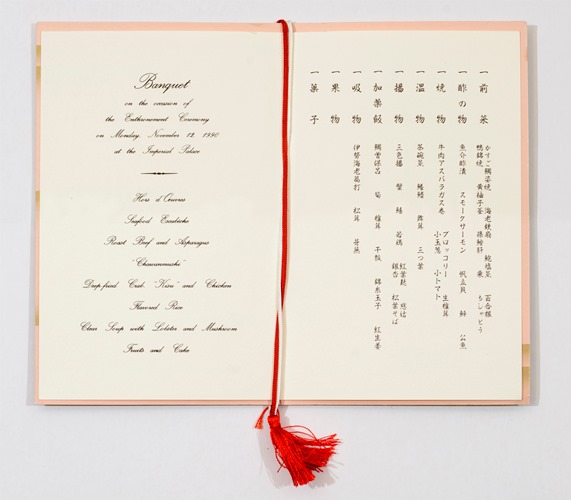
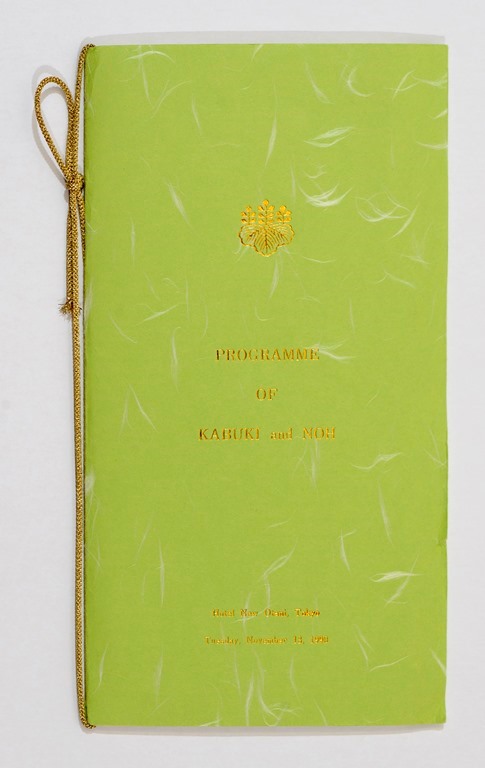
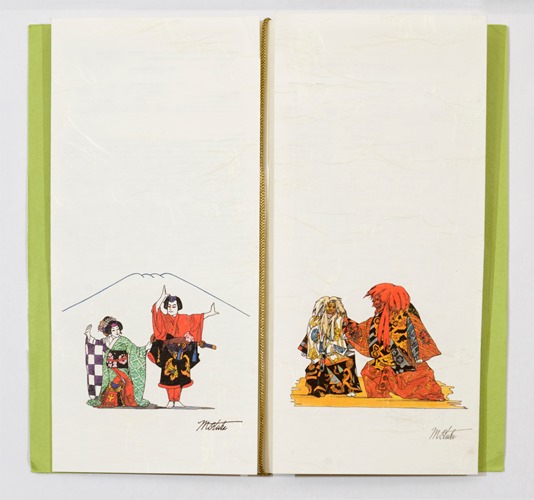
DEATH OF THOMAS ASHE
Thomas Patrick Ashe (1885-1917) was a member of the Gaelic League, the Irish Republican Brotherhood (IRB) and a founding member of the Irish Volunteers. Ashe was Commander of the Fingal Volunteers (5th Battalion) during the 1916 Easter Rising and won a major battle in Ashbourne defeating the Royal Irish Constabulary. They captured four police barracks and large quantities of ammunition and arms. Ashe and his battalion surrendered on the orders of Padraig Pearse on 29 April 1916.
On 8 May Ashe, along with Eamon De Valera, was sentenced to death by court-martial. This was commuted to life imprisonment and Ashe spent the next year in a variety of English prisons. He was released under the general amnesty in June 1917 and returned to Ireland. A couple of months later after giving a speech in Ballinalee, Longford, Ashe was arrested and charged with 'speeches calculated to cause disaffection'. He was sentenced to one year's hard labour in Mountjoy Jail.
Ashe, along with a number of other nationalist prisoners, demanded to be treated as prisoners-of-war. In protest of their treatment, Ashe went on hunger strike on 20 September 1917. After being deprived of a bed, bedding and being subjected to repeated force feed Ashe died from heart failure and congestion of the lungs in the Mater Hospital on 25 September 1917. Thomas Ashe was 32 years old.
The newspaper article below reports Ashe's death and the status of the remaining hunger strikers in Mountjoy Jail, October 1917.
UCDA P102/628 Papers of The O'Rahilly. Newspaper article on Thomas Ashe's death.
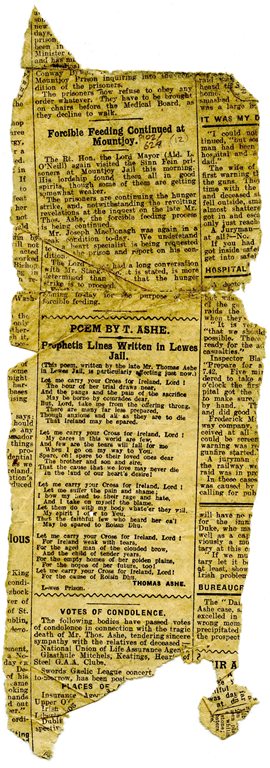
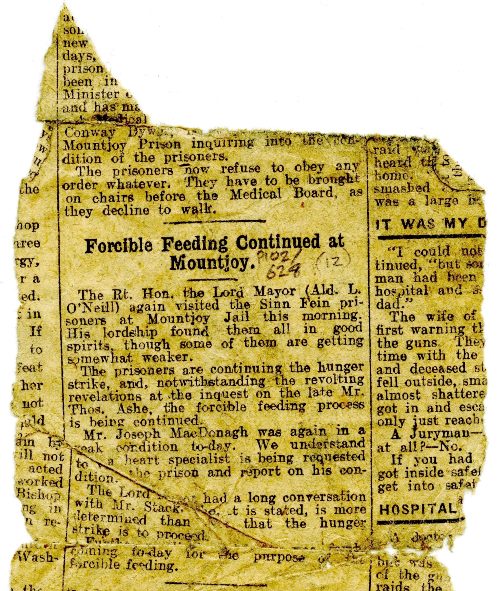
CORRESPONDENCE ABOUT ROGER CASEMENT'S DIARIES
Roger Casement was born 1st September 1864 and was executed for treason on 3rd August 1916 for his part in the 1916 Easter Rising. Just before Casement's execution, the British government circulated claims that a set of diaries, called the Black Diaries, not only belonged to Casement but also exposed his alleged homosexuality. Casement lived at a time when homosexuality was a crime and strong conservatism was the norm amongst the Irish Catholic population; the majority of Casement's supporters. By circulating photocopies and passages from these diaries the British authorities undermined and weakened the support for Casement.
Since the diaries' release over a hundred years ago, the question of their authenticity has been much debated. Both Robert McHugh (in 1976) and Angus Mitchell (in 2002 and 2012) have argued that they are forgeries. The Giles Report published in 2005 states that the diaries were written by Casement and, as late as 2015, the National Archives in the UK describe the Black Diaries as 'attributed to Roger Casement' in its catalogue.
This series of correspondence concerns disclosures made by Kevin McDonnell to Eamon De Valera in January 1966 about the fabrication of the Casement diaries and the person McDonnell believes forged them.
UCDA P150/3608 Papers of Eamon De Valera. reproduced by kind permission of UCD-OFM Partnership.
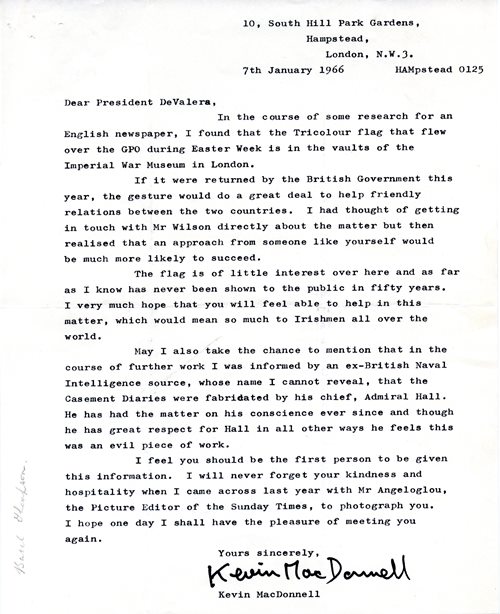
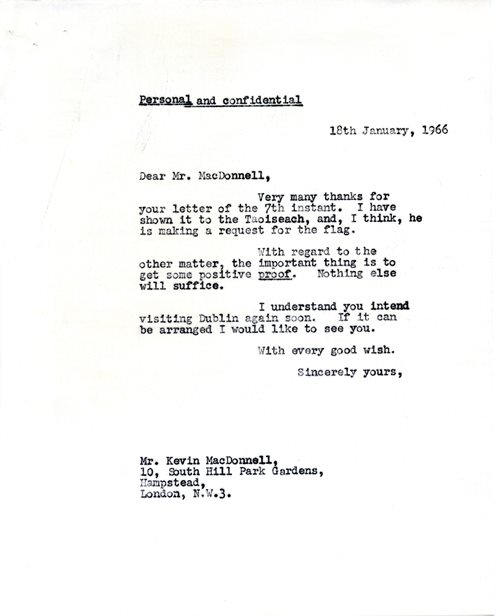
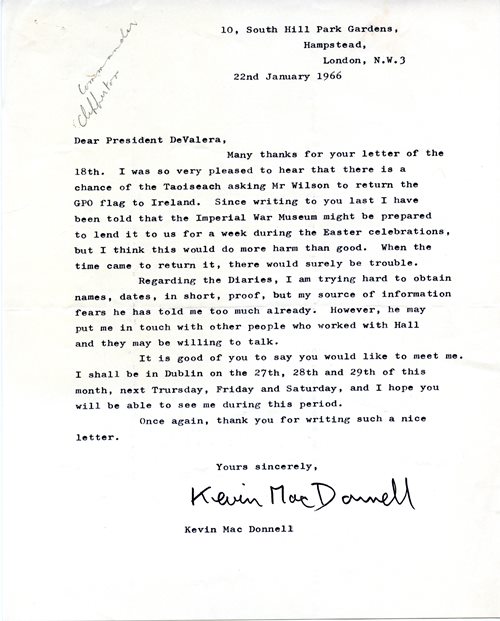
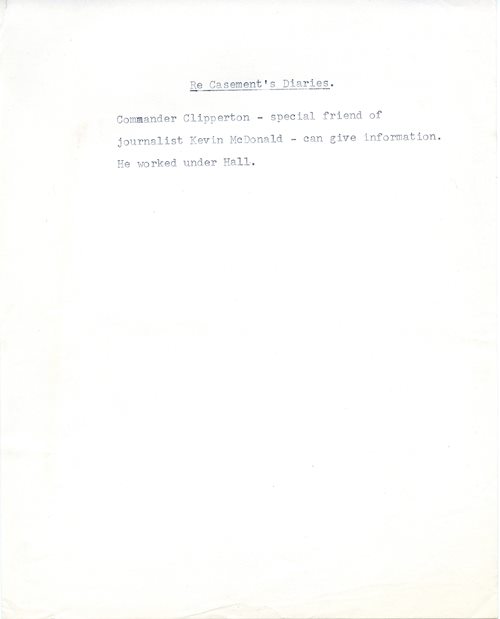
LETTER BY MICHAEL MOYNIHAN, 7TH (RES.) BATTALION
Michael Moynihan was born on 3 February 1891, the eldest son of Maurice and Mary Moynihan. He was educated at the Christian Brothers’ School in Tralee where he won many academic prizes and awards. In 1908 he went to Dublin to study at what subsequently became University College Dublin, one of the constituent colleges of the new National University of Ireland. He won a number of major scholarships and exhibitions and in January 1910, after successfully sitting the competitive exams for the Inland Revenue, he joined the civil service. He worked in Dublin until 1913 when he was promoted and moved to the Inland Revenue offices at Croydon, near London. In March 1914 he joined the Civil Service Rifles, a unit of the British Territorial Army. When war broke out, he remained with this unit and did not return to the civil service. As a territorial unit, the Civil Service Rifles were restricted to home duties within the United Kingdom. But in 1916 Moynihan decided to sign up for foreign service despite his mother’s opposition; and he went to France at the end of June 1916 as a private in the London Regiment. In 1917 he received a commission as a second lieutenant and joined the 8th (Irish) Battalion of the King’s Liverpool Regiment which was fighting in north-east France around Ypres. He was killed on 3 June 1918 and is buried in Doullens cemetery, north of Amiens. His father had died just six months before him, in January 1918. Michael Moynihan was survived by his mother Mary, his younger brothers John (to whom he was especially close), Maurice, Denis, Thomas, and by his sister Johanna.
The letter below was written before Michael’s deployment to France and refers to the heavy losses of the 8th (Irish) Battalion of the King’s Liverpool Regiment at the Third Battle of Ypres (Battle of Passchendaele) in August 1917.
UCDA P57/221 Papers of Michael Moynihan. Letter from Michael Moynihan, 7th (Res.) Battn. K.L.R., West 1 Camp, Park Hall, Oswestry, to his brother John, 21 September 1917.
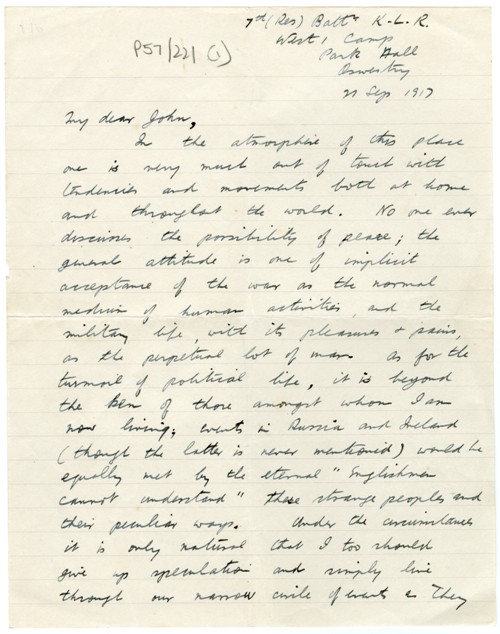
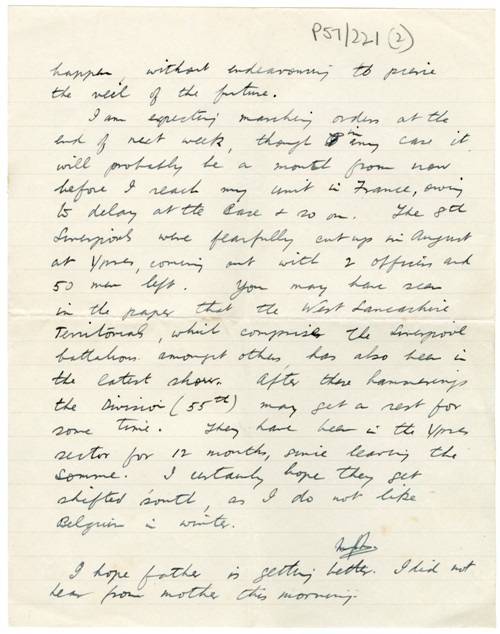
(p1)
7th (res) Battn. K.L.R.
West 1 Camp
Park Hall
Oswestry
21 Sep 1917
My dear John,
In the atmosphere of this place one is very much out of touch with tendencies and movements both at home and throughout the world. No one ever discusses the possibility of peace; the general attitude is one of implicit acceptance of the war as the normal medium of human activities, and the military life, with its pleasures & pains, as the perpetual lot of man. As for the turmoil of political life, it is beyond the ken of those amongst whom I am now living; events in Russia and Ireland (though the latter is never mentioned) would be equally met by the eternal “Englishmen cannot understand” these strange people and their peculiar ways. Under the circumstances it is only natural that I too should give up speculation and simply live through our narrow circle of events as they
(p2)
happen, without endeavouring to pierce the veil of the future.
I am expecting marching orders at the end of next week, though in any case it will probably be a month from now before I reach my unit in France, owing to delay at the Base & so on. The 8th Liverpools were fearfully cut up in August at Ypres, coming out with 2 officers and 50 men left. You may have seen in the paper that the West Lancashire Territorials, which comprise the Liverpool battalions amongst others, has also been in the latest show. After these hammerings the Division (55th) may get a rest for some time. They have been in the Ypres sector for 12 months, since leaving the Somme. I certainly hope they get shifted south, as I do not like Belgium in winter.
Michael
I hope father is getting better, I did not hear from mother this morning.
LETTER BY HARRY BOLAND, HM PRISON LEWES JUNE 1917
UCD Archives curates significant material across its collections concerning the aftermath of the 1916 Rising. This material includes letters, diaries, secret communications, propaganda and other documents relating to and written by those who were imprisoned in Irish and British jails from May 1916 until the general amnesty of June 1917. The documents below (from P106 Papers of Sighle Humphreys and P150 Papers of Eamon de Valera) provide an interesting example of a private letter, written and delivered in unusual circumstances, becoming a propaganda tool.
In June 1917 Harry Boland was being transferred from HM Prison Lewes to HM Prison Dartmoor. He managed to write a letter to his mother on prison toilet paper and threw it out of the window of the prison van, relying on the willingness of a passer-by to find it and send it to his mother. It was picked up by an Englishwoman who forwarded it to his mother Kate. The letter describes the Irish prisoners’ demands to be treated as prisoners of war. Boland’s sister, Kathleen, brought the original letter to Michael Collins, who published it as a leaflet. It was read out at a protest meeting at Beresford Place on 10 June 1917, where clashes with the police resulted in the fatal wounding of Inspector John Mills.
UCD Archives has completed an online exhibition ‘The Finest Men Alive’: documents of imprisonment and protest concerning those imprisoned in Irish and British jails following the 1916 Rising until the general amnesty of June 1917. Historian for the project, Dr Brian Hanley, discusses the Boland letter here.
P106/1304 Papers of Sighle Humphreys. Letter by Harry Boland.
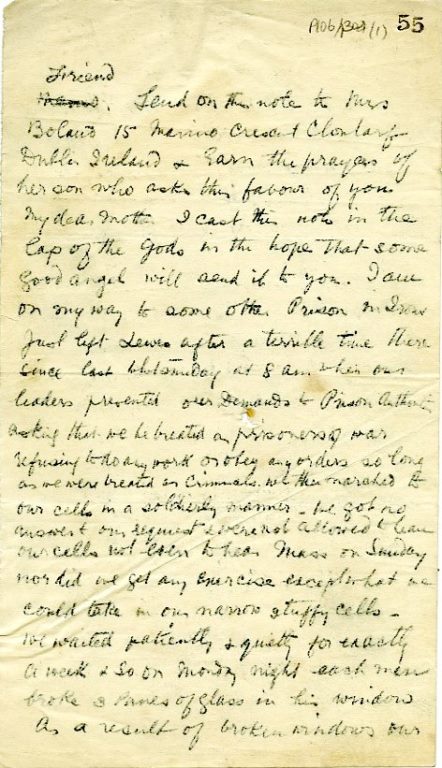
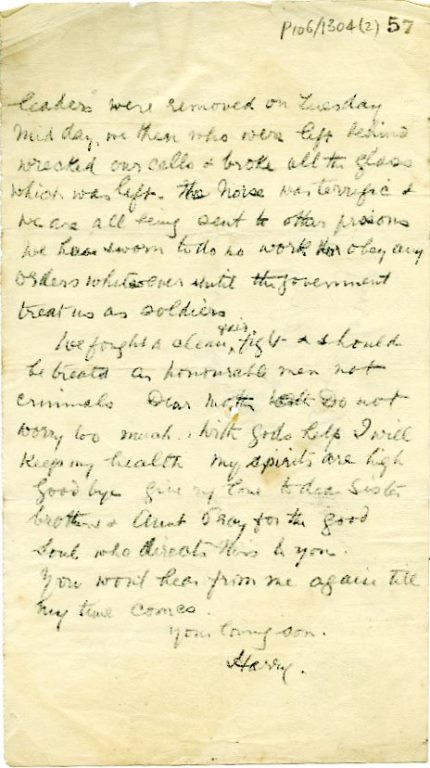
Friend, Send on this note to Mrs Boland 15 Marino Crescent Clontarf Dublin Ireland & Earn the prayers of her son who asks this favour of you.
My Dear Mother, I cast this note in the lap of the Gods in the hope that some good angel may send it to you. I am on my way to some other prison in Irons. Just left Lewes after a terrible time since last [Whitsunday] at 8 am when our leaders presented our Demands to prison authorities asking that we be treated as prisoners of war, refusing to do any work or obey any order so long as we were treated as criminals. We then marched to our cells in a soldierly manner. We got no answer to our request, and we were not allowed to leave our cells, not even to hear Mass on Sunday, nor did we get any exercise except what we could take in our narrow, stuffy cells. We waited patiently and quietly for exactly a week, & so on Monday night each man broke 3 panes of glass in his window. As a result of the broken windows, our leaders were removed on Tuesday mid day, we who were left behind wrecked our cells & broke all the glass which was left. The noise was terrific & we are all being sent to other prisons. We have sworn to do no work or obey any orders whatever until the Government treat us as soldiers.
We fought a clear, fair fight, & should be treated as honourable men, not criminals. Dear Mother, do not worry too much. With God’s help I will keep my health. My spirits are high. Good bye. Give my love to my dear sister, brothers, & Aunt. Pray for the good soul who directs this to you. You won’t hear from me again till my time comes.
Your loving son.
Harry
EAMON DE VALERA'S ACCOUNT OF CONDITIONS IN HM PRISON DARTMOOR, 1916
UCD Archives curates significant material across several collections concerning the aftermath of the 1916 Rising. Much of this material includes letters, diaries, secret communications, propaganda and other material concerning those who were imprisoned in Irish and British jails from May 1916 until the general amnesty of June 1917. The document below is a typescript copy of Eamon de Valera's account of conditions in HM Prison Dartmoor, where he had been transferred following his initial imprisonment and court-martial in Dublin. He also recalls meeting Eoin MacNeill in Dartmoor in June 1916 and ensuring that MacNeill was accorded the respect he was due, despite his action in issuing the countermanding order calling off the Rising. This account was dictated by De Valera to Marie O'Kelly in 1959.
A full transcription of De Valera's account can be found below.
UCDA P150/526 Papers of Eamon De Valera. Reproduced by kind permission from UCD-OFM Partnership.
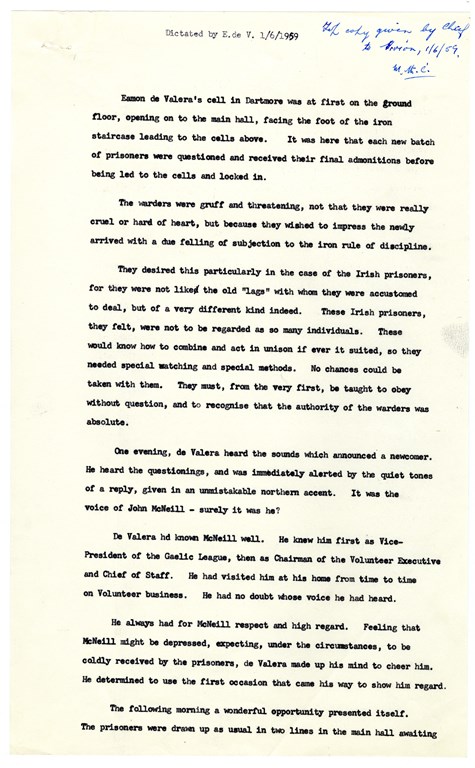
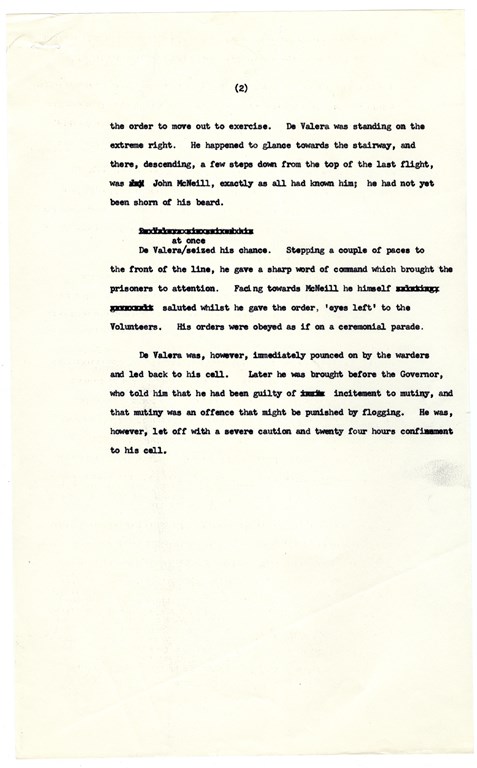
Dictated by E. de V. 1/6/1959
Top copy given by Chief to Vivion, 1/6/59
M.Ní.C.
Eamon de Valera’s cell in Dartmore (sic) was at first on the ground floor, opening on to the main hall, facing the foot of the iron staircase leading to the cells above. It was here that each new batch of prisoners were questioned and received their final admonitions before being led to the cells and locked in.
The warders were gruff and threatening, not that they were really cruel or hard of heart, but because they wished to impress the newly arrived with a due felling (sic) of subjection to the iron rule of discipline.
They desired this particularly in the case of the Irish prisoners, for they were not liked the old “lags” with whom they were accustomed to deal, but of a very different kind indeed. These Irish prisoners, they felt, were not to be regarded as so many individuals. These would know how to combine and act in unison if ever it suited, so they needed special watching and special methods. No chances could be taken with them. They must, from the very first, be taught to obey without question, and to recognise that the authority of the warders was absolute.
On evening, de Valera heard the sounds which announced a newcomer. He heard the questionings, and was immediately alerted b the quiet tones of a reply, given in an unmistakable northern accent. It was the voice of John McNeill – surely it was he?
De Valera hd (sic) known McNeill well. He knew him first as Vice-President of the Gaelic League, then as Chairman of the Volunteer Executive and Chief of Staff. He had visited him at his home from time to time on Volunteer business. He had no doubt whose voice he had heard.
He always had for McNeill respect and high regard. Feeling that McNeill might be depressed, expecting, under the circumstances, to be coldly received by the prisoners, de Valera made up his mind to cheer him. He determined to use the first occasion that came his way to show him regard.
The following morning a wonderful opportunity presented itself. The prisoners were drawn up as usual in two lines in the main hall awaiting the order to move out to exercise. De Valera was standing on the extreme right. He happened to glance towards the stairway, and there, descending, a few steps down from the top of the last flight, was John McNeill, exactly as all had known him; he had not yet been shorn of his beard.
De Valera at once seized his chance. Stepping a couple of paces to the front of the line, he gave a sharp word of command which brought the prisoners to attention. Facing towards McNeill he himself saluted whilst he gave the order, ‘eyes left’ to the Volunteers. His orders were obeyed as if on a ceremonial parade.
De Valera was, however, immediately pounced on by the warders and led back to his cell. Later he was brought before the Governor, who told him that he had been guilty of incitement to mutiny, and that mutiny was an offence that might be punished by flogging. He was, however, let off with a severe caution and twenty four hours confinement to his cell.
LETTER FROM LORD FRENCH TO GENERAL MAXWELL, 3 MAY 1916
In the early hours of the morning on 3rd May 1916 the first executions of the 1916 Easter Rising leaders took place in Kilmainham Gaol. The execution of Pádraic Pearse, Thomas Clarke and Thomas MacDonagh was carried out by firing squad in the Stonebreaker's Yard. These were followed the next day by Joseph Plunkett, Edward Daly, Michael O'Hanrahan and Willie Pearse. On 8th May Éamonn Ceannt, Michael Mallin, Seán Heuston and Con Colbert were shot. The final executions in Kilmainham took place on 12th May and were Seán Mac Diarmada and James Connolly.
The holograph letter below was written by Lord French to General Maxwell on 3rd May 1916 and in it he refers to the execution on that day of Pearse, Clarke and MacDonagh, “The P.M. expressed himself as ‘surprised’ at the rapidity of the trial & sentences. I pointed out that you were carrying out your instructions exactly & correctly and in strict accordance with Military and Martial Law. He quite understands but asked me to warn you not to give the impression that all the Sinn Feiners would suffer death. I told him that the fact of 3 of them having been awarded a much less severe sentence was evidence enough of the attitude you were adopting towards them and that I thought it much better to [leave] you [alone] to your own discretion. He agreed to this…".
This letter is from a file in the Eamon De Valera Papers (P150/512) with the title ‘British Documents Re: 1916’. The file consists of intelligence reports and despatches between Irish Command [i.e. successive Commanders-in-Chief of British Forces in Ireland–Major-General L.B. Friend, (Lieutenant)-General Sir John Maxwell and (Lieutenant)-General Sir Bryan Mahon] or their various officers; the Commander-in-Chief, Home Forces and his staff; the War Office; M.I.5.G. and the Royal Irish Constabulary.
UCDA P150/512 Papers of Eamon De Valera. Reproduced by kind permission of UCD-OFM Partnership.
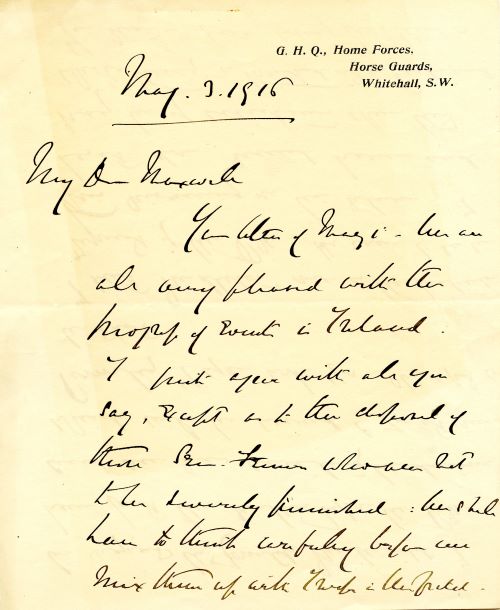
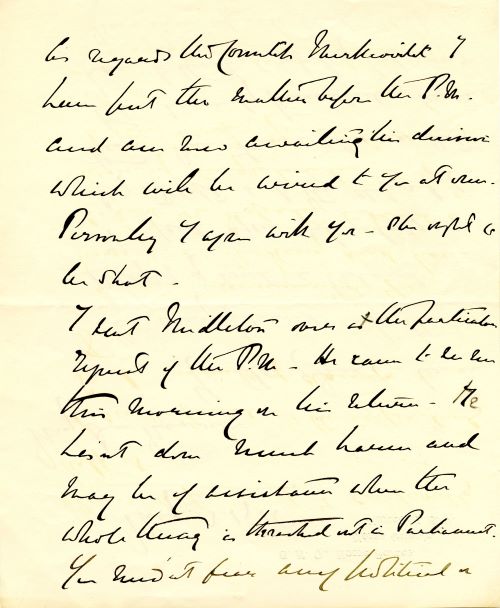
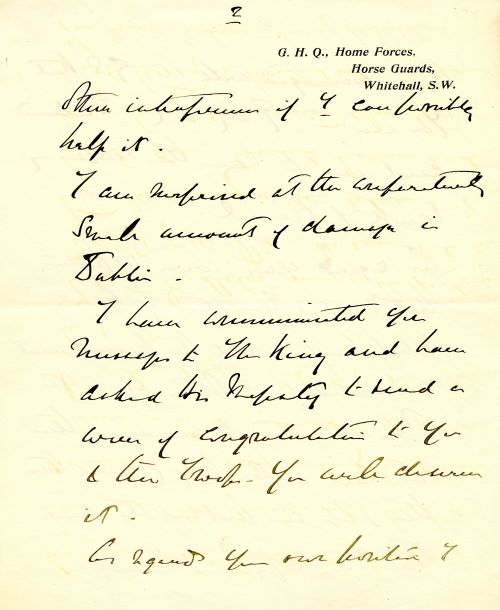
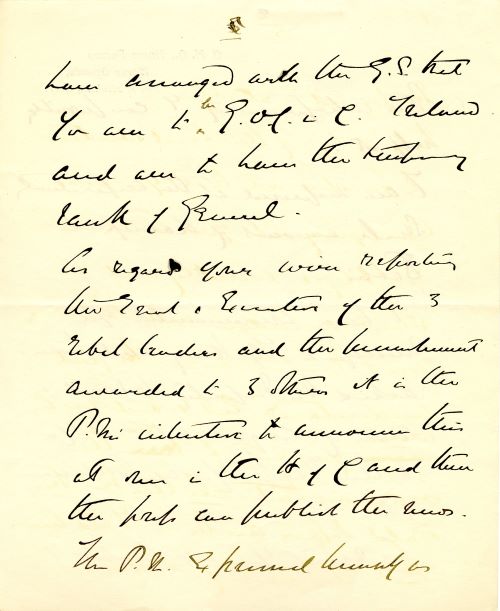
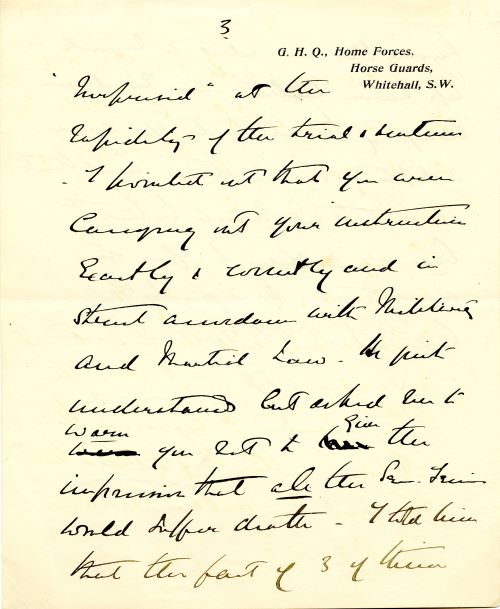
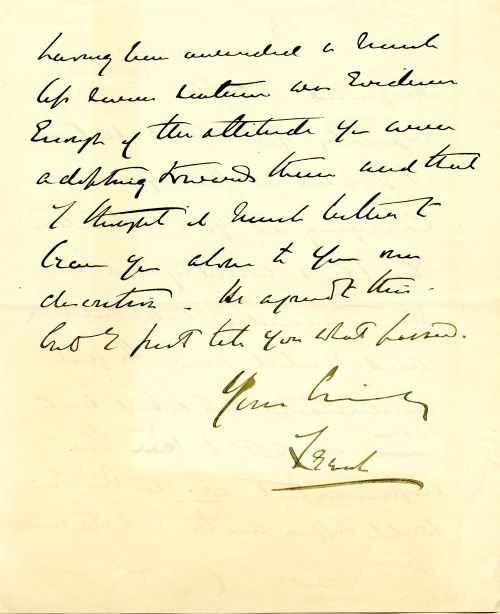
G.H.Q., Home Forces,
Horse Guards,
Whitehall, S.W.
May.3.1916
My dear Maxwell,
Your letter of May 1 – we are all very pleased with the progress of events in Ireland. I first agree with all you say, except as to the disposal of those Sinn Feiners who are not to be severely punished: we shall have to think carefully before we mix them up with troops in (hospital?)
In regards to Countess Markiovitz [sic] I have put the matter before the P.M. and am now awaiting his decision which will be wired to you at noon. Primarily I agree with you – she ought to be shot.
I sent Middleton over at the particular request of the P.M. He came to see me this morning on his return. He hasn’t done much harm and may be of assistance when the whole thing is thrashed out in Parliament. You mustn’t fear any political or other interference if I can possibly help it.
I am surprised by at the comparatively small amounts of damage in Dublin.
I have communicated your message to the King and have asked His Majesty to send a wire of congratulations to you and the troops. You well deserve it.
In regards your own position I have arranged with the G(eneral) S(ecretary) that you are to be G(eneral) O(fficer) C(ommanding) in C(hief) Ireland and are to have the temporary rank of General.
In regards you wire reporting the trial & execution of the 3 rebel leaders and the punishment awarded to 3 others it is the P.M.s intention to announce this at noon in the H. of Co. and then the press can publish their news.
The P.M expressed himself to be ‘surprised’ at the rapidity of the trial and sentences. I pointed out that you were carrying out your instructions exactly & correctly and in strict accordance with military and martial law. He quite understands but asked me to warn you not to give the impression that all the Sinn Feiners would suffer death. I told him that the fact of 3 of their having been awarded a much less severe sentence was evidence enough of the attitude you were adopting towards them and that I thought it much better to leave you alone to your own character. He agreed to this - (had) I first tell you what passed.
Yours sincerely,
French
THE E.E.C ROADSHOW, 22 JULY 1978
Saturday 25 March 2017 saw the 60th anniversary of the Treaty of Rome, an international agreement that brought about the creation of the European Economic Community (E.E.C). The Irish Council of the European Movement (ICEM) Archives (UCDA P204) contains material relating to its principal function: to explain the European Community at both the general and technical level, to spread the idea of the essential unity of Europe and the desireability of greater unity among the nations of Europe, and to encourage and promote studies to this end. ICEM has been responsible for organizing public meetings and local studies conferences; sending representatives to study European institutions in Brussels; encouraging schools and colleges to use publications they have made available; and providing documentation on all aspects of European integration.
The high point of the ICEM activities was reached in 1972 when the Council played a major part in helping to create an environment in which an overwhelming majority of Irish people voted to join the enlarged European Community. Ireland became a member of the EEC on 1 January 1973. Below is a photocopied press cutting from the Cork Examiner concerning the EEC mobile exhibition visiting Cork on 22 July 1978. Inside the roadshow was a series of information panels focusing on how the European Community works and its relevance to the people.
UCDA P204/104 Irish Council of the European Movement Archives. Copyright Cork Examiner - used by permission.
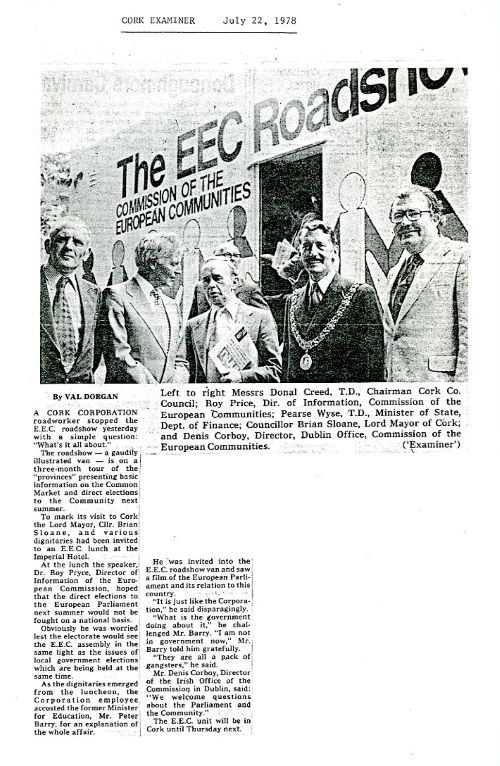
CUMANN NA MBAN EXECUTIVE, 5 FEBRUARY 1922
Sighle Humphreys (1899–1994) was a former secretary, director of publicity and national vice-president of Cumann na mBan, the female auxiliary force of the Volunteers. The organisation spearheaded various campaigns, reflected in the papers of Sighle Humphreys. These include the Defence of Ireland Fund, the Irish Republican Prisoners Dependents Fund, the Easter Lily Campaign and the Political Prisoners Committee. Cumann na mBan's activities are clearly recounted through the reminiscences of executive and branch members, through the 1969 records collection project, and through the original minutes of Cumann na mBan meetings. These activities vary from Swedish drill and rifle practice, to first aid, education and publicity. For the most part, the Cumann na mBan papers are strictly related to their organisation, but occasionally issues of a turbulent political nature such as the split over the Anglo-Irish Treaty in 1921, described in the correspondence of Jenny Wyse-Power (1858–1941), are also included. Below is a black and white print of a group photograph of the Executive of Cumann na mBan taken in the Mansion House grounds, during their Convention at which a motion to support the Treaty was rejected. It includes a handwritten list of names identified in the photograph, including Anna O'Rahilly (1873–1958), Jenny Wyse-Power and Countess Markievicz (1868–1927).
UCDA P106/1466 Papers of Sighle Humphreys. Group portrait of the Executive of Cumann na mBan, 5 February 1922.
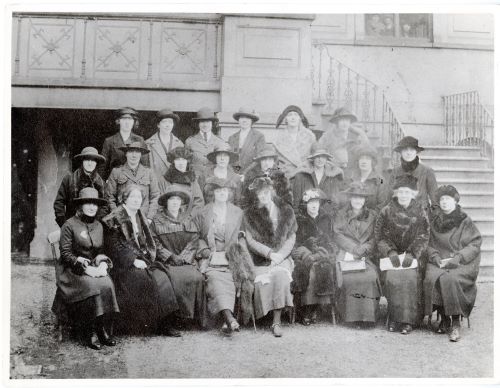
Photograph taken at the Cumann na mBan Convention on the 5th February 1922 at which a motion to support the Treaty was rejected by 419 to 63.
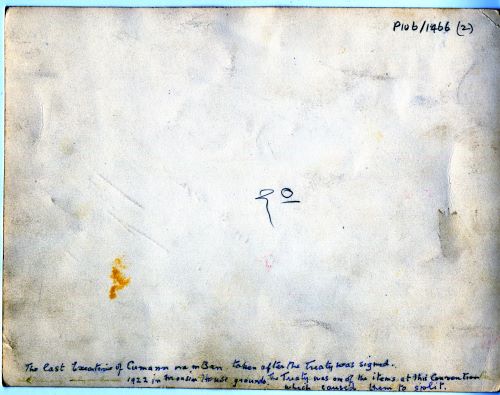
Front Row Kate Breen. Dr. A. English. Mrs. E. Kent. Mrs. Wise (sic) Power. Mde Markievicz [Madame] O Rahilly. Mary McSwiney
Second Row [] Marie Deegan. Eilis Aughney Bríd Connolly [] Miss Pearse Leslie Price [Min] Mulcahy
Third Row ....? Máire Comerford. Sighle Humphreys ....? Josephine Ahearne Fiona Plunkett ....?
LETTER TO SEÁN LESTER RE TREATMENT OF JEWS IN UPPER SILESIA, 1933
Seán Lester (b. Carrickfergus, County Antrim in 1888) joined the newly formed Department of External Affairs as Director of Publicity in 1923, a post he held until 1925 when he was made Assistant Secretary in the department. He was sent to Geneva in 1929 as Permanent Delegate of the Irish Free State to the League of Nations, succeeding Michael MacWhite who was being transferred to Washington. In 1933, he was seconded from the Irish service to the post of High Commissioner of the League of Nations to the Free City of Danzig where he showed great courage in protesting against Nazi persecution of the Jewish population. UCDA P203/31 is a file of correspondence, reports and notes concerning inter alia the disputes between Peru and Colombia, Bolivia and Paraguay, and China and Japan; the oppression of the Jews in German Upper Silesia; the presidency of the League of Nations Assembly; and international disarmament. Included in the documentation concerning the oppression of the Jews in German Upper Silesia is a letter from N[eville] Laski (President, Board of Deputies of British Jews, 1933–1939) to Lester seeking his assistance in obtaining accurate information concerning the treatment of Jews in German Upper Silesia. Laski includes cuttings of a series of articles from the Manchester Guardian entitled 'Jews of Upper Silesia' Parts I–III, 18–19 September 1933.
UCDA P203/31. Letter from N[eville] Laski, President, Board of Deputies of British Jews to Seán Lester, 20 September, 1933, 3pp, 4 items.
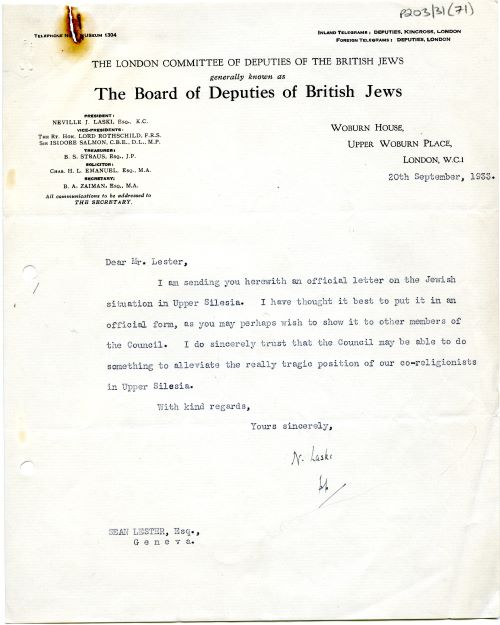
The London Committee of Deputies of the British Jews
generally known as
The Board of Deputies of British Jews
Woburn House
Upper Woburn Place
London, WC1
20 September, 1933
Dear Mr Lester,
I am sending you herewith an official letter on the Jewish situation in Upper Silesia. I have thought it best to put it in official form, as you may perhaps wish to show it to other members of the Council. I do sincerely trust that the Council may be able to do something to alleviate the really tragic position of our co-religionists in Upper Silesia.
With kind regards,
Yours sincerely,
N. Laski
SEAN LESTER, Esq.,
Geneva
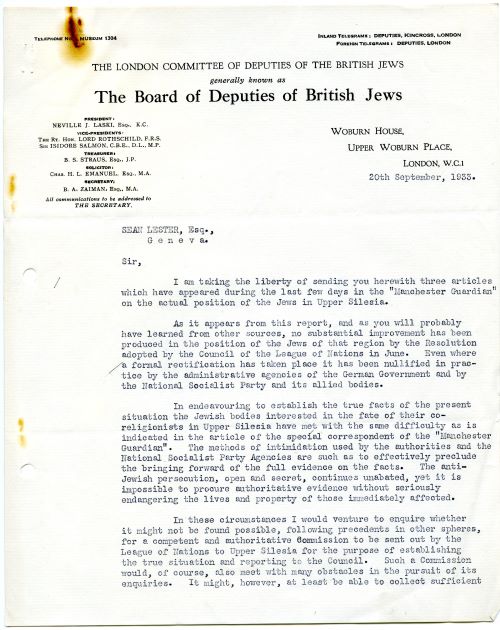
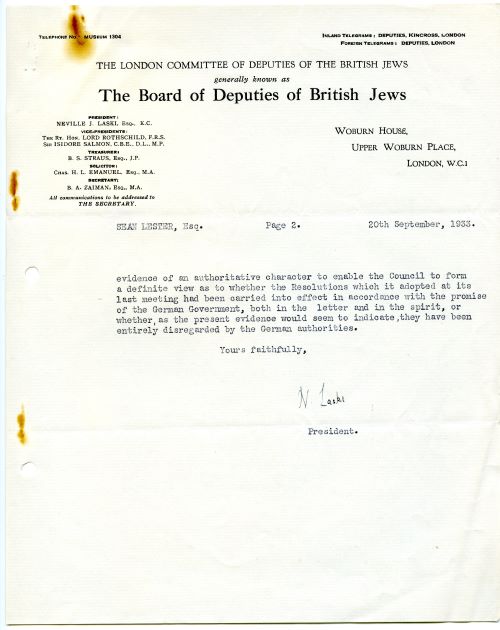
The London Committee of Deputies of the British Jews
generally known as
The Board of Deputies of British Jews
Woburn House
Upper Woburn Place
London, WC1
20 September, 1933
SEAN LESTER, Esq.,
Sir,
I am taking the liberty of sending you herewith three articles which have appeared during the last few days in the "Manchester Guardian" on the actual position of the Jews in Upper Silesia, As it appears from this report, and as you will probably have learned from other sources, no substantial improvement has been reproduced in the position of the Jews of that region by the Resolution adopted by the Council of the League of Nations in June. Even where a formal rectification has taken place it has been nullified in practice by the administrative agencies of the German Government and by the National Socialist Party and its allied bodies.
In endeavouring to establish the true facts of the present situation the Jewish bodies interested in the fate of their co-religionists in Upper Silesia have met with the same difficulty as is indicated in the article of the special correspondent of the "Manchester Guardian". The methods of intimidation used by the authorities and the National Socialist Party Agencies are such as to effectively preclude the bringing forward of the full evidence on the facts. The anti-Jewish persecution, open and secret, continues unabated, yet it is impossible to procure authoritative evidence without seriously endangering the lives and property of those immediatedly affected.
In these circumstances I would venture to enquire whether it might not be found possible, following precedents in other spheres, for a competent and authoritative Commission to be sent out by the League of Nations to Upper Silesia for the purpose of establishing the true situation and reporting to the Council. Such a Commission would, of course, also meet with many obstacles in the pursuit of its enquiries. It might, however, at least be able to collect sufficient evidence of an authoritative character to enable the Council to form a definite view as to whether the Resolutions which it adopted at its last meeting had been carried into effect in accordance with the promise of the German Government, both in the letter and in the spirit, or whether, as the present evidence would seem to indicate, they have been entirely disregarded by the German authorities.
Yours faithfully,
N Laski
President
Enclosure: Yellow envelope with three newspaper cuttings from the Manchester Guardian entitled 'Jews of Upper Silesia' Parts I–III.
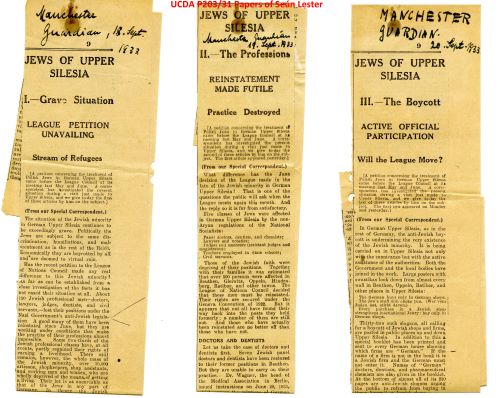
PRESS RELEASE ANNOUNCING GEMMA HUSSEY'S APPOINTMENT AS FIRST SPOKESPERSON ON WOMEN'S ISSUES BY AN IRISH POLITICAL PARTY.
Gemma Hussey became involved with the Irish women’s movement in the 1970s and 1980s. She was a founding member of the Women’s Political Association (WPA) with Nuala Fennell, Audrey Conlon, Hilary Pratt and Phil Moore and was elected its Chair in 1973. The aim of the association was to influence public opinion on the importance of gender balance amongst public representatives, to pressurise political parties and to encourage women to run for public office. The WPA operated with very limited resources and relied on teams of women volunteering in local branches to promote the objectives of the association. Gemma Hussey was also a founding member of the National Women’s Talent Bank which sought to maintain a register of women suitable to serve on public boards and commissions. She was a delegate to the Council for the Status of Women, an umbrella group with representatives of most women’s organisations in Ireland.
From 1977 to 1982 Gemma Hussey served as a Senator elected by the National University of Ireland panel (she is a graduate of UCD). During her first term she sat as an Independent. In 1980 she joined the Fine Gael Parliamentary Party and went on to become the Government Leader in the Seanad. This press statement (20 November 1980) announces her appointment by the Fine Gael Leader, Dr Garret FitzGerald, as party spokesperson on women’s issues—the first such appointment by any political party in Ireland.
UCDA P179/108 Papers of Gemma Hussey.
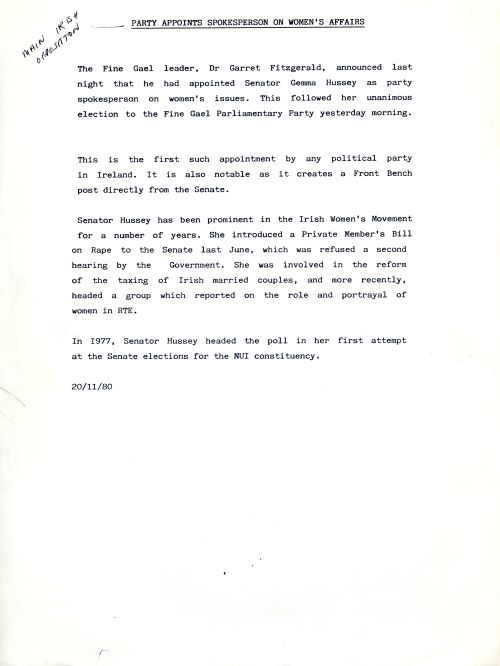
CHRISTMAS IN PRISON 1918
The documentation of the Irish revolutionary period is broad and varied. Included amongst UCD Archives’ unparalleled archival collections covering 1916–23, is a significant amount of material created by those who are imprisoned at various points during the period. Much of this material takes the form of letters and diaries but also included are more ephemeral documents created in the prisons, by and for the prisoners. The files numbered UCDA P150/612 and UCDA P150/615 concern De Valera’s imprisonment in 1918 under the Defence of the Realm Act (1914) for his involvement in the ‘German Plot’: an alleged conspiracy between Sinn Féin and Germany to start an armed insurrection in Ireland. (De Valera escaped in February 1919 by copying the chaplain’s key in wax during mass.) The documents chosen are Éamon de Valera’s personal copy of a menu for Christmas Day 1918 from the ‘Royal Hotel Lincoln’ [Lincoln Jail] and a coloured Christmas card depicting the Christmas tragedies ‘Sean’s Troubles’. Seán McGarry (IRB member) is shown with an out-size key in his hand with the captions ‘Xmas 1917 can’t get in’ and ‘Xmas 1918 can’t get out’.
UCDA P150/612 Papers of Éamon de Valera. Reproduced by kind permission of UCD-OFM Partnership.
Éamon de Valera’s personal copy of a menu for Christmas Day 1918 from the ‘Royal Hotel Lincoln’ [Lincoln Jail] on blue prison paper, signed by De Valera and sixteen other prisoners. Two things are noted: ‘Brandy Sauce not arrived’ and ‘Vins (en route)’
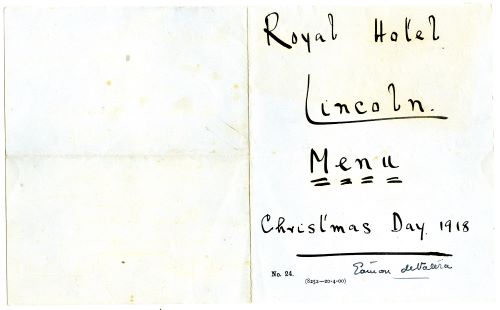
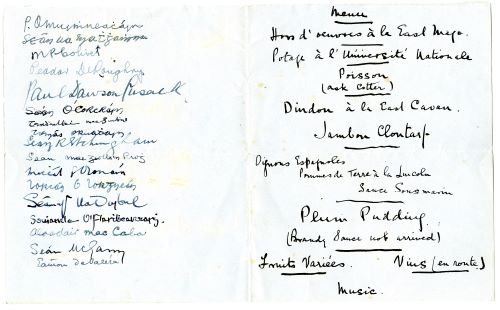
UCD P150/615 Papers of Éamon de Valera. Reproduced by kind permission of UCD-OFM Partnership
Coloured Christmas card depicting the Christmas tragedies ‘Sean’s Troubles’. Seán McGarry (IRB member) is shown with an out-size key in his hand with the captions ‘Xmas 1917 can’t get in’ and ‘Xmas 1918 can’t get out’. The text includes directions and comments in English and Irish in three different hands including Éamon de Valera’s. The directions in Irish concern sending a key and files and other measures and precautions for an escape.
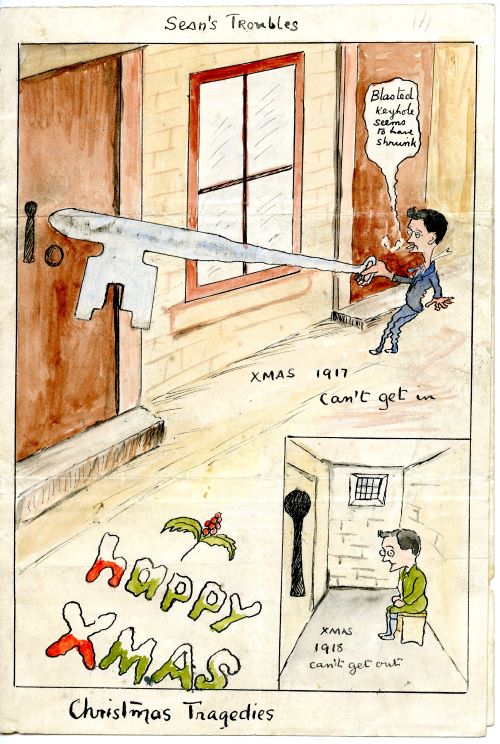
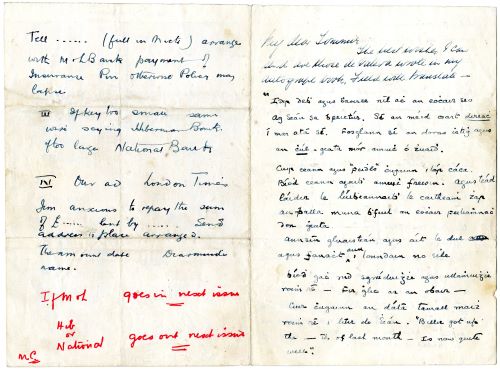
LETTER FROM TERENCE MACSWINEY IN BRIXTON PRISON TO CATHAL BRUGHA, 1920
Terence James MacSwiney (1879–1920) was an Irish revolutionary whose martyrdom as a result of a prolonged hunger strike in October 1920 has been cited as a major turning point in the Irish struggle for independence.
Born in Cork on 28 March 1879 to John MacSwiney and Mary MacSwiney (née Wilkinson), Terence MacSwiney was educated by the Christian Brothers at the North Monastery in Cork. He took a degree in mental and moral science at the Royal University of Cork [now University College Cork], graduating in 1907.
During this period, Terence MacSwiney developed his passion for poetry and literature becoming a founding member of the Cork Literary Society and the Cork Dramatic Society. Like many of his contemporaries, Terence MacSwiney harboured a love of the Irish language. He frequently signed his letters using the Irish language version of his name, Toirdhealbhach MacSuibhne, as he does in the letter below.
As his interest in cultural nationalism grew, so too did his active involvement in the political struggle for Irish independence. On 14 December 1913, he attended the inaugural meeting of the Irish Volunteers in Cork and was named a member of the Cork executive in 1914.
The events of Easter Week 1916 in Cork have been a source of contention in Irish history and MacSwiney carried feelings of guilt regarding his own role in the failure until his death. MacSwiney, along with Tomás MacCurtain, had been attempting to mobilise troops in Cork prior to Easter Sunday, 23 April 1916. However, the scuttling of the Aud and the countermanding orders subsequently received from Eoin MacNeill caused confusion among the Cork Volunteers. At the behest of the Bishop and the Lord Mayor of Cork, MacSwiney and MacCurtain ordered the Volunteers to surrender their arms to the civil authorities and ensured that no armed insurrection took place. MacSwiney was unaware of the extent of the plans for a Rising among members of the Irish Republican Brotherhood and news of the fighting in Dublin did not reach MacSwiney until late on Easter Monday.
Although the Cork branch of the Volunteers had surrendered their weapons, Terence MacSwiney was arrested on 3 May 1916. This marked the beginning of a series of regular periods of imprisonment at multiple facilities across Ireland and the United Kingdom until his final internment at Brixton Prison in 1920.
In 1918, Terence MacSwiney’s name was put forward in absentia as a candidate for mid-Cork in the General Election and was one of the seventy-three Sinn Féin candidates successfully elected. Following the landslide success of Sinn Féin, Dáil Éireann, the parliament of the Irish Republic was formed. Although he missed the first session of the new government in January 1919, owing to his imprisonment, Terence MacSwiney later became an active member of the Dáil. Following the assassination of Tomás MacCurtain, Lord Mayor of Cork, by members of the Royal Irish Constabulary, Terence MacSwiney took the helm of the Cork No. 1 Brigade and was appointed the new lord mayor of the city.
In August 1920, Terence MacSwiney was arrested for what would prove to be the final time. During his trial, he signalled the beginning of his hunger strike and was handed down a sentence of two years’ imprisonment. He was transported to Brixton Prison in late August where his physical condition had already begun to deteriorate. Throughout the hunger strike, there were recurring accusations and reports that he was taking nourishment during his alleged fast. These reports were fervently denied by the MacSwiney family. Nevertheless, the strike continued to garner international attention and sparked debate on whether or not the British Government should release hunger strikers and the morality of “self-sacrifice”.
Terence MacSwiney died on the 25 October 1920. News of his death sparked a global reaction, particularly in Ireland, England and the United States, prompting an outpouring of both support and criticism of the hunger striker. His body was removed to St George’s Roman Catholic Cathedral in Southwark and was subsequently transported to Dublin for a public memorial service before finally being returned to his native Cork. Thousands came to pay their respects to the former Lord Mayor of Cork as his body lay in state at Cork City Hall. He was buried at St Finbarr’s cemetery, Cork.
The prolonged guilt felt by MacSwiney regarding his role in the failure of the Rising in Cork is perhaps most evident in a letter he sent from Brixton prison to Cathal Brugha on 30 September 1920. The friendship between the two men is highlighted within the collection, particularly in the letter below and in a letter sent in 1928 from Brugha’s wife Caitlín Brugha [née Kingston] to Etienette Beuque, a biographer of Terence MacSwiney, which discusses their relationship (UCDA P48c/75). Terence MacSwiney’s only daughter, Máire, would also go on to marry Ruairí Brugha, son of Cathal and Caitlín Brugha.
The letter below provides a glimpse into the mindset of Terence MacSwiney in the final weeks of his life. He acknowledges his own impending demise but expresses optimism regarding the cause of Irish independence. He tells Brugha that he feels final victory in their pursuit of freedom and that “those who are most needed will survive to direct it”; praying that Brugha himself will be among the survivors. It also illustrates MacSwiney’s sense of spirituality as he refers to those who do not survive helping the cause in “unseen but powerful ways”.
Perhaps the most poignant comment of the letter is the declaration, “Ah Cathal, the pain of Easter Week is finally dead at last”. In the words of Alfred O’Rahilly, MacSwiney felt as though he had been deprived of the “glory and martyrdom” of 1916 and his self-sacrifice at Brixton prison meant that he had “won his place forever in the hearts of Irish men and women” (UCDA P48b/610).
UCDA P48b/416 Papers of Terence MacSwiney: Holograph letter from Terence MacSwiney in Brixton prison to Cathal Brugha, 30 September 1920.
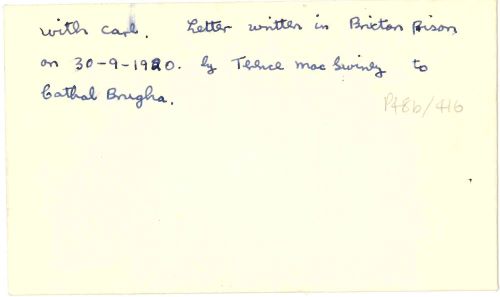
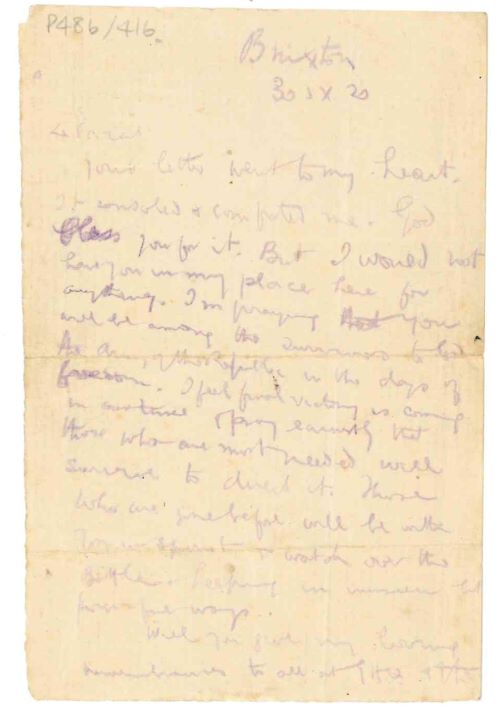
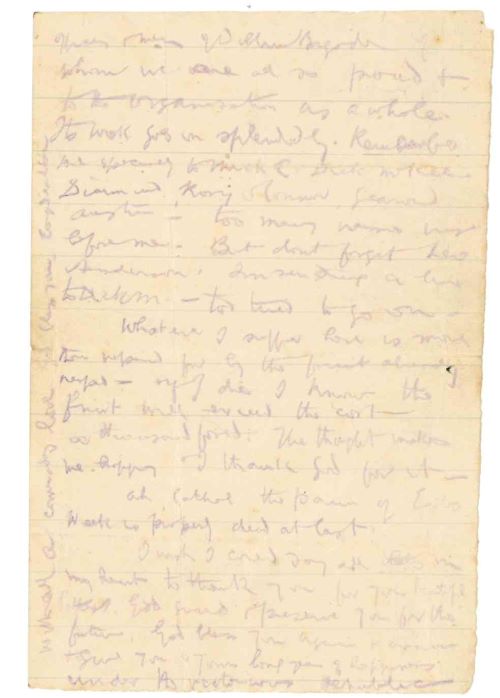
Brixton
30 IX 20
A Cathal,
Your letter went to my heart, it consoled and comforted me. God bless you for it. But I would not have you in my place here for anything. I’m praying that you will be among the survivors to lead the [army] of the Republic in the days of freedom. I feel final victory is coming in our time and pray earnestly that those who are most needed will survive to direct it. Those who are gone before will be with you in spirit to watch over the battle and helping them in unseen but powerful ways.
Will you give my loving remembrance to all at G.H.Q. and the officers and men of the [?] Brigade of whom we are all so proud. Remember me specifically to Mick C., Dick [McKie], Diarmuid, Rory O’Connor, Gearoid, Austin – too many names are before me. But don’t forget [Lei] Henderson. I am sending a line to Dick M. – too tired to go on –
Whatever I suffer here is more than repaid for by the fruit already reaped– if I die I know the fruit will exceed the cost a thousand fold. The thought makes me happy and I thank God for it.
Ah Cathal the pain of Easter Week is dead at last.
I wish I could say all that’s in my heart to thank you for your beautiful letters. God guard and preserve you for the future. God bless you again and again and give you and yours the long years and happiness under the victorious Republic.
With all a comrade’s love. God bless you. Toirdhealbhach.
DESCRIPTION BY MICHAEL MACWHITE OF LIFE AT THE FRONT DURING WORLD WAR I, 1916
Michael MacWhite (1882–1958) had one of the most extraordinary careers in the public service of independent Ireland. Born in Reenogreena, near Glandore in West Cork, MacWhite became a civil servant, a journalist, a French Foreign Legionnaire and most significantly, Ireland’s first career diplomat. Thirsting for adventure, MacWhite travelled extensively, teaching in Scandinavia, fighting in the First Balkan War and then the Great War before returning home to assist the new Irish Free State.
The eighth of nine children of John White and Mary McCarthy, his only formal education was at the local national schools of Reenogreena and Andfield. At the age of seventeen MacWhite successfully completed the British Civil Service exam in Dublin. It was during his stay in Dublin that MacWhite first met Arthur Griffith at a Celtic Literary Society meeting. From this moment until his death in 1922, Griffith and MacWhite became close friends with the Sinn Féin founder exerting significant influence on MacWhite’s life.
In 1900 MacWhite moved to London to take employment as a banking clerk. This move signalled the beginning both of MacWhite’s enthusiasm for travel and indeed his involvement with the politics of Irish nationalism. MacWhite noted that the inclination to travel arose from ‘the mystery and melancholy’ of the Atlantic which had ‘passed into the blood of the people by the shore’ in Cork [1]. Within a year of his departure he had become Secretary of the Irish National Club and by 1903, MacWhite was President of the London branch of Cumann na nGaedheal. In 1905 he left London and for a number of years travelled all over Europe, teaching English in Copenhagen, Aarhus and Christiania (Oslo). Following an extensive tour of Germany in 1909 MacWhite arrived home to Cork to establish the first branch of Sinn Féin in Skibbereen and Dunmanway with his friend Seán MacDiarmada, a national organiser for the Irish Republican Brotherhood.
MacWhite returned to London and in July 1912 was offered two positions as a newspaper correspondent, one in Rio de Janeiro and the other in Sofia. ‘As ill-luck would have it’, he later wrote, he chose the latter and within a month of his arrival, the First Balkan War broke out [2]. MacWhite enlisted in the Bulgarian army and was soon wounded in action some four kilometres from Adrianople (Edirne). After three weeks in hospital, MacWhite returned to ‘the theatre of war’ to face a Black Sea winter, occasional shelling and the reality of men dying, not only from combat but as a result of typhoid and cholera which were ‘rampant’ [3]. On 11 February 1913, after some negotiation, he boarded a French steamer and ‘bid an unconventional farewell to the Bulgars and Serbs, their discords and their jealousies’ [4].
On arriving in France, MacWhite soon enlisted in the French Foreign Legion and by May 1913, he was stationed in Sidi-bel-Abbés, Algeria. During World War I, MacWhite fought in France, Turkey and Greece and was wounded at the battle of Gallipoli. He was later awarded the Croix de Guerre three times for his valour in combat and attained the rank of sergeant. Dated 11 October 1916, this month’s key document is an account from MacWhite while fighting with the French Foreign Legion in Greece during World War I. The piece provides a dark and powerful insight of life in the trenches and demonstrates the physical and psychological torment which the soldiers endured on a daily basis. The romanticisation and exhortation of battle which existed prior to the commencement of the Great War is gone and replaced with the reality of warfare. Anchored in ‘a metre of mud’ with ‘faces brutalised by fatigue and misery’ MacWhite contemplates the arbitrary nature of a soldier’s fragile existence as the prospect of death ‘sits in every watching post and with his thrilling chant accompanies every shell.’ The ‘stinking corpses’ from which ‘crawling things’ protrude surround the men as they search ‘for the sleep that never comes.’ A century later, MacWhite provides a stark reminder of the horrors of the Great War questioning, ‘Can there be a heaven? Would not hell be a paradise to this?’
In 1918 MacWhite, now promoted to the rank of captain, was selected to lead a French military mission to raise the Fourth Liberty Loan. The party toured ninety-two towns and states in New York State with MacWhite noting how he suffered from ‘being embraced and kissed on both cheeks by enthusiastic Frenchmen among the crowds at every stop’ [5].
MacWhite arrived in Ireland on furlough in January 1919. The nationalist struggle for independence had altered considerably since MacWhite had last been on Irish shores. Indeed he had heard about the 1916 Rising, and the execution of MacDiarmada, from a piece of newspaper several months old, which was wrapped around the rations served to him while on duty with the French army in the region of Epirus in Greece during the Great War [6]. With the Paris Peace Conference looming, the newly formed Dáil Éireann recognised MacWhite’s potential as a foreign representative noting his fluency in French and familiarity with the country itself. In March 1920 MacWhite joined the Irish legation to the Peace Conference as secretary under the leadership of Seán T. Ó Ceallaigh.
In September 1921, MacWhite was appointed as representative of Dáil Éireann to Switzerland on the establishment of the League of Nations in Geneva and on 17 June 1923 assumed the position of Free State Permanent Representative to the League. Admission to the international organisation was central to the country’s transformation on the continent and in time, at home as well. The League offered status, sovereignty and equality and was the basis for foreign policy in the new state. From his post in Geneva, MacWhite played a crucial role in orchestrating the Free State’s entry on the world stage and in safeguarding the nation’s reputation on the continent until 1928.
In March 1929, MacWhite replaced Timothy A. Smiddy as Minister Plenipotentiary and Envoy Extraordinary to the United States. His time in Washington was distinguished by the number of social engagements which he attended among the forty-four American states he visited. When asked why he left the post, MacWhite replied ‘Not even the strongest man could stand the pace of the social swirl of Washington, seven dinners plus seven luncheons plus seven receptions on an average every week’ [7]. In 1938 MacWhite was posted to Rome as Irish Minister to Italy, accredited to the King of Italy. Throughout World War II, MacWhite reported to the Department of External Affairs on both the personal challenges he faced including frequent apartment searches, tampering with diplomatic pouches and indeed the horror of life in wartime Rome, especially mass killings, poverty and deportations. In March 1950, MacWhite retired with the personal rank of Ambassador. In correspondence with writer, Sean Ó Faoláin, he reflected:
"I am laying down the wand of office with no regrets. I have got as much out of life as any man could hope for. I have travelled a long distance from a thatched house on the top of File-na-Shouk, a mile or so south of Glandore, to the Palaces of Kings and Presidents and to hold my own against them, is I suppose, something to brag about [8]."
Colm Madden
Colm Madden is a PhD candidate / History tutor in Mary Immaculate College, Limerick and a post primary English and History teacher. His study interests centre on the career of Michael MacWhite, the Irish diplomatic service and foreign policy in the early twentieth century.
Twitter: @Madden_Colm
Email: colm.madden@mic.ul.ie
[1] Draft partial autobiography entitled ‘Reflections and Recollections’, c.1950s (UCDA, Michael MacWhite Papers, P194/660).
[2] MacWhite to John Devoy (c. 1913), in William O’Brien and Desmond Ryan (eds) Devoy’s Postbag Volume II: 1880-1928 (Dublin, 1979), p. 419
[3] Ibid.
[4] Ibid.
[5] Irish Times, 26 November 1949
[6] Text of the introductory address delivered by Michael Tierney, 9 Jul. 1953 (UCDA, MacWhite Papers, P194/641).
[7] Irish Times, 26 November 1949
[8] MacWhite to Seán Ó Faoláin, 2 March 1950 (UCDA, MacWhite Papers, P194/583)
UCDA P194/7 Papers of Michael MacWhite: Description by Michael MacWhite of life at the Front during World War I, 11 October 1916. Application to consult the collection must be made to the depositor. Details of the procedure may be had from UCDA.
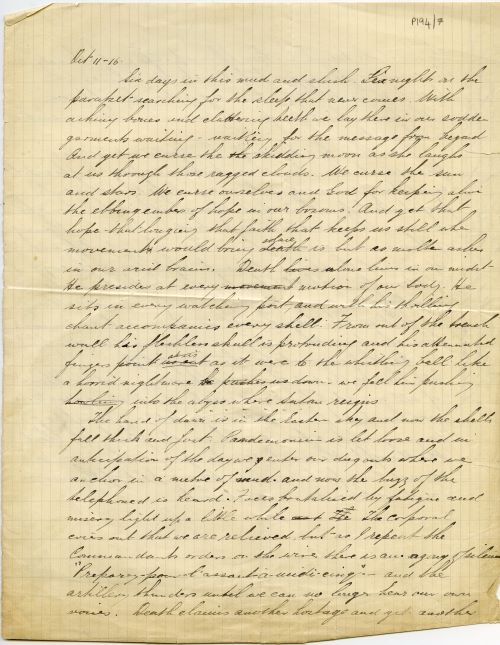
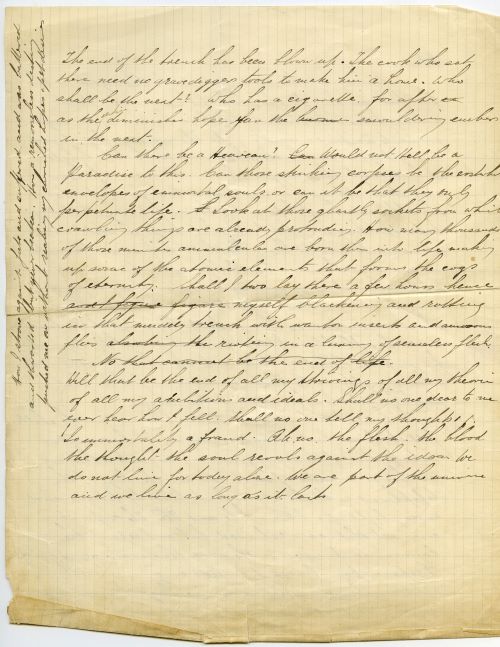
Oct 11 – 16
Six days in this mud and slush. Six nights on the parapet searching for the sleep that never comes. With aching bones and clattering teeth we lay there in our sodden garments waiting – waiting for the message from beyond. And yet we curse the skulking moon as she laughs at us through those ragged clouds. We curse the sun and stars. We curse ourselves and God for keeping alive the ebbing embers of hope in our bosoms. And yet that hope, that longing, that faith that keeps us still when movements would bring solace is but as molten ashes in our arid brains. Death alone lives in our midst. He presides at every motion of our body. He sits in every watching post and with his thrilling chant accompanies every shell. From out of the trench wall his fleshless skull is protruding and his alienated fingers point as it were to the whistling bell like a horrid nightmare. We feel him pushing into the abyss where Satan reigns.
The hand of dawn is in the eastern sky and now the shells fall thick and fast. Pandemonium is let loose and in anticipation of the day we enter our dugouts where we anchor in a metre of mud. And now the buzz of the telephone is heard. Faces brutalised by fatigue and misery light up a little while the corporal cries out that we are relieved but as I repeat the commandant’s orders on the wire there is an agony of silence. “Preparez-pour-l’assaut-á-midi-cinq” – and the artillery thunders until we can no longer hear our own voices. Death claims another hostage and yet another. The end of the trench has been blown up. The cook who sat there need[s] no gravedigger’s tools to make him a home. Who shall be the next? Who has a cigarette for after as the [] diminishes hope fan the smouldering embers in the next.
Can there be a Heaven? Would not Hell be a paradise to this? Can those stinking corpses be the erstwhile envelopes of immortal souls or can it be that they only perpetuate life. Look at those ghastly sockets from which crawling things are already protruding. How many thousands of those minute animalcular are born then with life making up some of the atomic elements that forms the cogs of eternity. Shall I too lay there a few hours hence myself blackening and rotting in that muddy trench with wanton insects and amorous flies [revelling] in a luxury of senseless flesh. No that cannot be the end of life.
Will that be the end of all my strivings, of all my [theories], of all my ambitions and ideals? Shall no one dear to me ever hear how I fell. Shall no one tell my thoughts? Is immortality a fraud? Ah, no, the flesh, the blood, the thought, the soul rebels against the idea. We do not live for today alone. We are part of the universe and we live as long as it lasts.
On the left hand margin on page 2:
How I strove against fate and suffered and was battered and thwarted but never beaten. How a remorseless destiny pushed me on without realising my cherished hopes & pet desires.
TOM KETTLE'S FIELD MESSAGE BOOK [1916]
Thomas Michael Kettle (1880–1916) was a graduate of UCD, where he took a degree in philosophy. He was called to the bar in 1905 and elected Nationalist MP for East Tyrone in 1906. He resigned his seat in 1910 having been appointed to the Professorship of National Economics in UCD the previous year. He was admired as a poet, journalist, scholar, orator and politician.
In 1913 he joined the Irish Volunteers on their formation, and was in Belgium to procure arms when the First World War broke out. He took a commission in the Royal Dublin Fusiliers. After the Easter Rising and the murder of Francis Sheehy-Skeffington he asked to be sent to the Front. He was killed on the eve of the Battle of Ginchy on the Somme, 9 September 1916. His body was never recovered.
Kettle’s Field Message Book contains printed instructions on field operations, handwritten notes on battle procedures, a fragment of a poem beginning, ‘It will be well to leave them the masoned walls’ and a draft letter to a newspaper editor, outlining the arguments in favour of Irish recruitment.
UCDA LA34/406 Papers of Tom Kettle: Field Message Book.
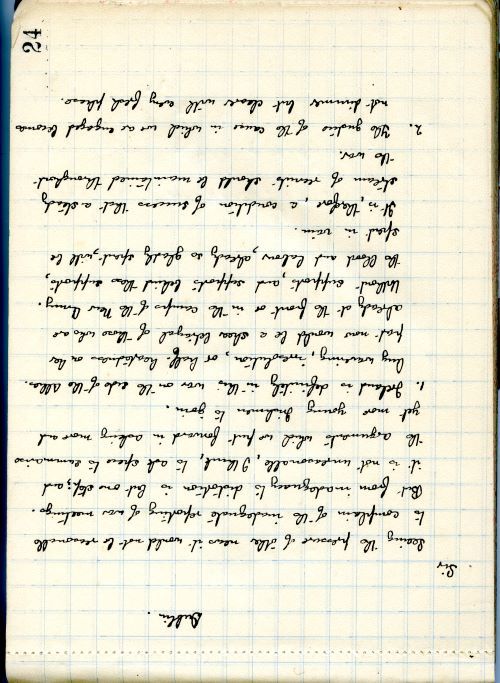
Dublin
Sir
Seeing the pressure of other news it would not be reasonable to complain of the inadequate reporting of war meetings. But from inadequacy to distortion is but one step; and it is not unreasonable, I think, to ask space to summarise the arguments which we put forward in asking more and yet more young Irishmen to join.
1. Ireland is definitely in this war on the side of the Allies. Any wavering, irresolution, or half-heartedness on her part now would be a sheer betrayal of those who are already at the front or in the camps of the New Army. Without supports, and supports behind these supports, the blood and labour, already so gladly spent, will be spent in vain. It is, therefore, a condition of success that a steady stream of recruits should be maintained throughout the war.
2. The justness of the cause in which we are engaged becomes not dimmer but clearer with every fresh phase.
MINUTE BOOK OF THE BELGIAN REFUGEES’ COMMITTEE, 1914-15
The Minute Book of the Belgian Refugees' Committee records proceedings of meetings held at least weekly. Regular matters for consideration include arrangements for the reception and allocation of refugees; liaison with the Local Government Board for assistance in obtaining accommodation and defraying expenses; communication with local refugee committee; the circumstances of individual refugees; the general financial situation including fundraising; the payment of maintenance grants; the payment of regular accounts for accommodation, clothing, travel and food. More occasional considerations include the possibility of securing employment for refugees; specific problems encountered by refugee families; and sending undesirable refugees out of the country.
Conor Mulvagh has written a short essay on the History Hub putting the Minute Book in context. The essay includes transcriptions by Colm O'Flaherty.
UCDA P105 Minute Book of the Belgian Refugees’ Committee.
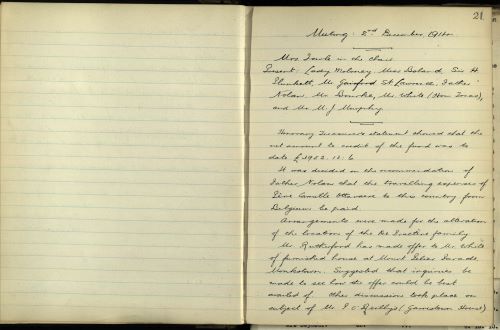
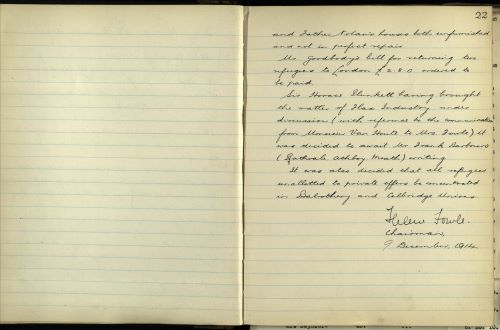
Meeting: 2nd December 1914
Mrs Fowle in the chair
Present: Lady Moloney, Miss Boland, Sir H. Plunkett, Mr. Gainford St. Lawrence, Father Nolan, Mr. Bourke, Mr. White (Hon. Treas), and Md. M. J. Murphy.
__
Honorary Treasurer’s statement showed that the net amount to credit of the fund was to date £3952:13:6.
It was decided on the recommendation of Farther Nolan that the travelling expenses of Père Camille Ottavere to this country from Belgium be paid.
Arrangments were made for the alteration of the location of the De Praetiere family.
Mr. Rutherford has made offer to Mr. White of furnished house at Mount Pelier Parade, Monkstown. Suggested that inquiries be made to see how the offer could be best availed of. Other discussion took place on subject of Mr. P. O’Reilly’s (Garristown House) and Father Nolan’s houses both unfurnished and not in perfect repair.
Sir Horace Plunkett having brought the matter of Flax Industry under discussion (with reference to the communication from Monsieur Van Houte to Mrs. Fowle) it was decided to await Mr Frank Barbour’s (Rathvale, Athboy, Meath) writing.
It was also decided that all refugees unalotted to private offers be concentrated in Balrothery and Celbridge Unions.
Helen Fowle.
Chairman
9 December, 1914
LETTERS CONCERNING BERNARD O’ROURKE'S IMPRISONMENT, 1916
Bernard O’Rourke (b.1874) born on 3 November 1874 to Patrick and Anne O’Rourke, his father owned a mill which Bernard inherited. He married Clare Clinton in 1907 and they lived at Gleneven, Inniskeen, County Monaghan. O’Rourke was active in local and national politics, a member of Monaghan County Council, 1905–25 and 1929–45; a Justice of the Peace, 1904–16; chairman of the Carrickmacross Board of Guardians, 1915–17, 1919 and 1922; a magistrate in the Dáil Éireann courts and a member of the Free State Senate, 1922–38.
He was imprisoned in Richmond Barracks, Dublin, in the aftermath of the Easter Rising. The letters below concern his imprisonment and his removal as a Justice of the Peace by the Lord Chancellor in June 1916, almost immediately after his release from detention.
UCDA P117/3, P117/35, P117/61, P117/64. Papers of Bernard O'Rourke. Letters about Bernard's imprisonment and release in 1916.
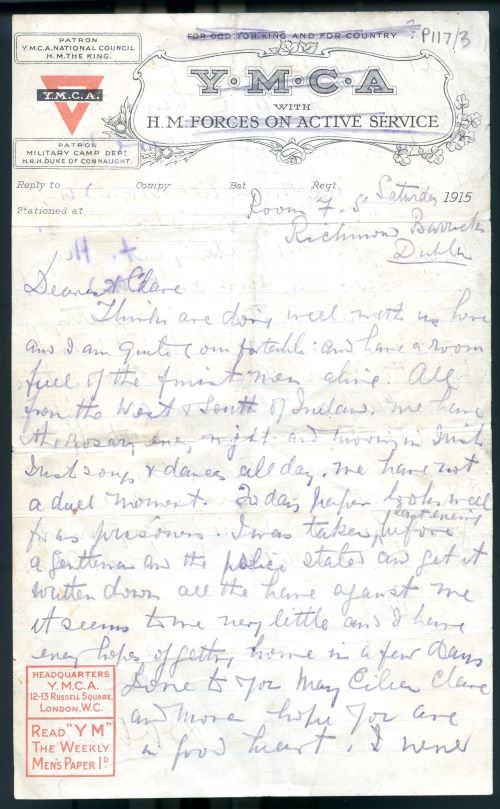
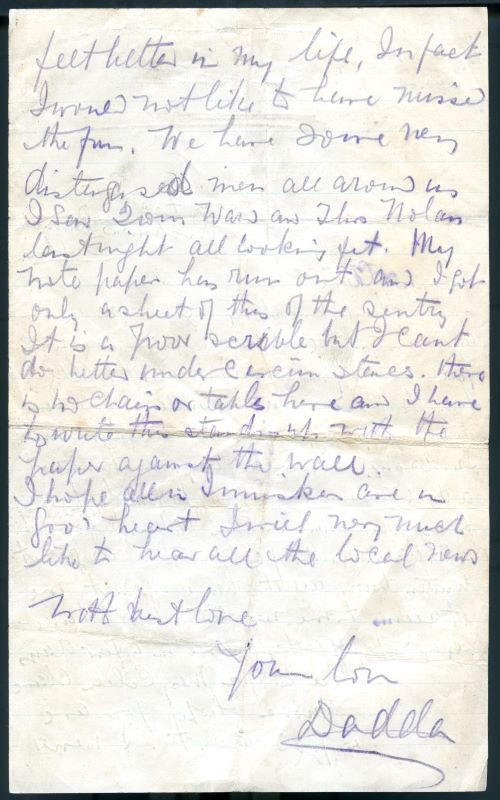
P117/3
[13 May 1916]
Richmond Barracks
Dublin
Dear Clare,
Things are doing well with us here and I am quite comfortable and have a room full of the finest men. All from the West and South of Ireland. We have the rosary every night and morning in Irish. Irish songs and dances all day. We have not a dull moment. Today['s] paper looks well for us prisoners. I was taken last evening before a gentleman and the police state[d] and got it written down all they have against me it seems to me very little and I have every hope of getting home in a few days. Love to you Mary, Eileen, Clare and [Monica] hope you are in good heart.
I never felt better in my life. In fact, I would not like to have missed the fun. We have some very distinguished men around us. I saw [John] [Ward] and [Thomas] Nolan last night all looking fit. My note paper has run out and I got only a sheet of this of[f] the Sentry. It is a poor scribble but I can't do better under circumstances. There is no chair or table here and I have to write this standing up with the paper against the wall.
I hope all in Inniskeen are in good heart. I will very much like to hear all the local news.
With best love
Your loving
Dadda
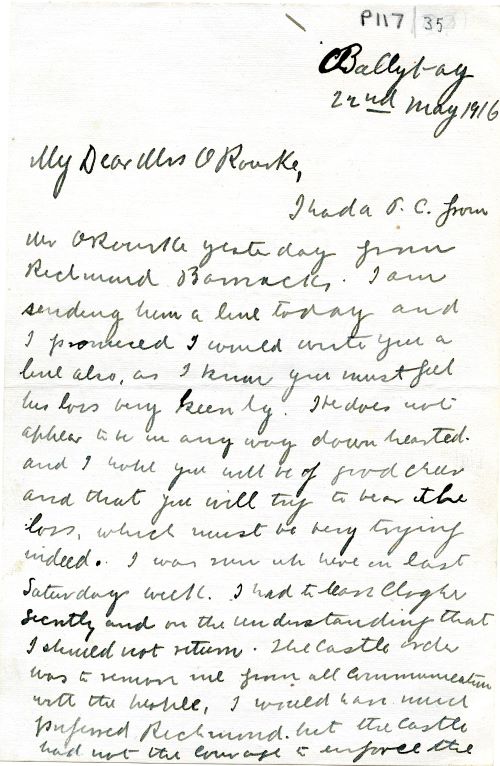
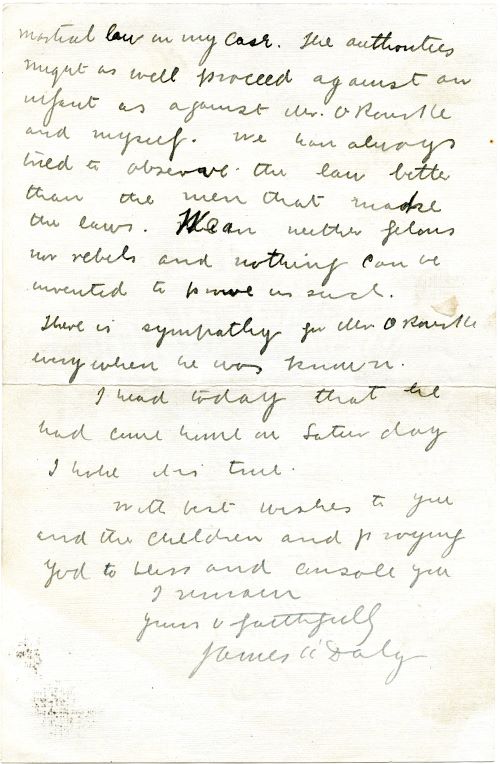
P117/35
22nd May 1916
My Dear Mrs O’Rourke
I had P.C. from Mr O’Rourke yesterday from Richmond Barracks. I am sending him a line today and I promised I would write you a line also as I know you must feel his loss very keenly. He does not appear to be in any way down hearted and I hope you will be of good cheer and that you will try to bear the loss; which must be very trying indeed. I was run up here on last Saturday week. I had to leave Clough secretly and on the understanding that I should not return. The Castle order was to remove me from all communication with the people. I would have much preferred Richmond but the Castle had not the courage to enforce the martial law in my case.
The authorities might as well proceed against an infant as against Mr O’Rourke, and myself. We have always tried to observe the law better than the men that made the laws. We are neither felons nor rebels and nothing can be invented to prove us such.
There is sympathy for Mr O’Rourke everywhere he was known.
I heard today that he had come home on Saturday. I hope it is true.
With best wishes to you and the children and praying God to bless and console you.
I remain
Yours faithfully,
James O’Daly
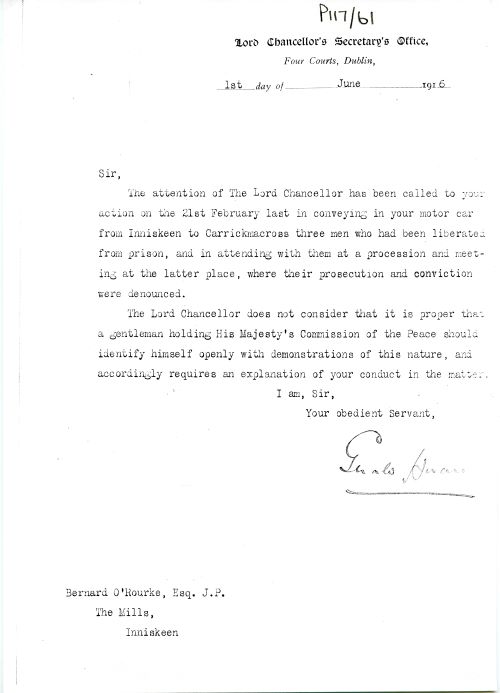
P117/61
Lord Chancellor’s Secretary’s Office
Four Courts,
Dublin
1st day of June 1916
Sir,
The attention of The Lord Chancellor has been called to your action on the 21st February last in conveying in your motor car from Inniskeen to Carrickmacross three men who had been liberated from prison, and in attending with them at a procession and meeting at the latter place, where their prosecution and conviction were denounced.
The Lord Chancellor does not consider that it is proper that a gentleman holding His Majesty’s Commission of the Peace should identify himself openly with demonstrations of this nature, and accordingly requires an explanation of your conduct in the matter.
I am, Sir,
Your obedient Servant,
Gerald Horan
Bernard O'Rourke, Esq. J.P.
The Mills,
Inniskeen
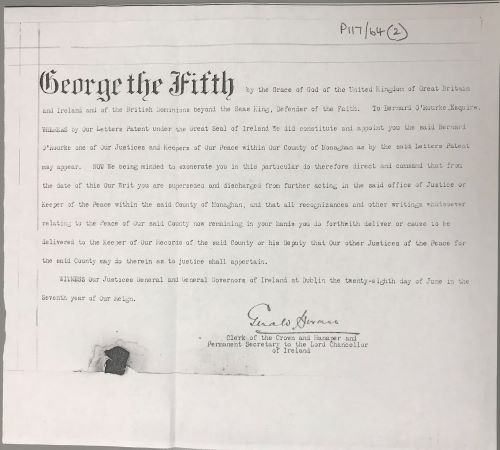
P117/64
Lord Chancellor's Office,
Four Courts.
Dublin
29th day of June 1916
Sir,
I am directed by the Lord Chancellor to acknowledge the receipt of your letter of the 26th inst. and to express his regret that you decline to make the statement required in my letter of the 20th inst. In the circumstances he deems it his duty to remove you from the Commission of the Peace for the County of Monaghan, and I am accordingly to forward you the enclosed Writ of Supersedeas exonerating you from further acting in that office.
I am Sir,
Your obedient Servant,
Gerald Horan
Bernard O'Rourke, Esq.
The Mills,
Inniskeen
Co. Monaghan
LETTERS RE IMPRISONMENT OF DESMOND FITZGERALD 1916
Born in London of Irish parents, Desmond FitzGerald learnt Irish at Gaelic League classes where he met Mabel Washington McConnell, a Belfast Presbyterian and nationalist. They married in 1911 and lived in Brittany for two years in the company of writers and artists. While in London FitzGerald had been a member of the Imagist group of poets which included Ezra Pound with whom he had a lifelong friendship. Mabel had acted for a time as secretary to George Bernard Shaw. They moved to the Kerry Gaeltacht in 1913 where Desmond became an organiser for the Irish Volunteers. He was expelled from Kerry on suspicion of signalling to German submarines, moved to Bray, Co. Wicklow and fought in the GPO in 1916. Imprisoned at Dartmoor and Maidstone, he was elected Sinn Féin MP for the Pembroke division of Dublin at the 1918 general election and released in 1919.
The letters below come from a larger sequence of letters in the Desmond and Mabel FitzGerald Papers concerning Desmond's imprisonment following the Easter Rising, 1916.
UCDA P80/1568, 1569, 1575, 1582, 1602. Papers of Desmond and Mabel FitzGerald.
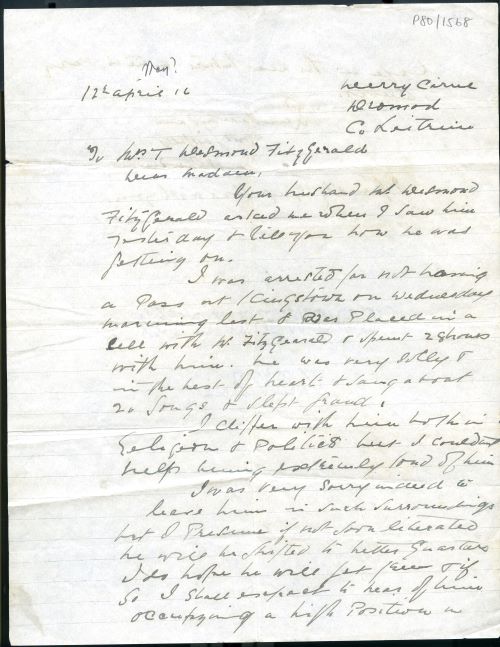
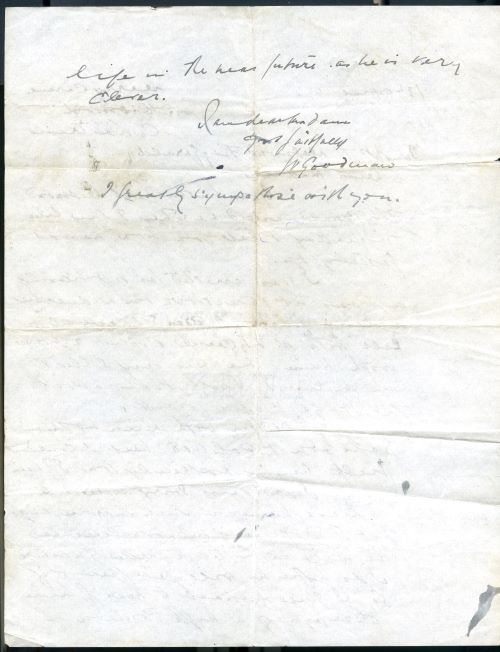
P80/1568
12th April [May?] 16
[]
Dromond
Co Leitrim
To Mrs T Desmond FitzGerald
Dear Madam,
Your husband Mr. Desmond FitzGerald asked me when I saw him yesterday to tell you how he was getting on.
I was arrested for not having a Pass at Kingstown on Wednesday morning last & was placed in a cell with Mr. FitzGerald & spent 28 hours with him. He was very jolly & in the best of heart & sang about 20 Songs & slept grand.
I differ with him both in religion & politics but I could not help being extremely fond of him.
I was very sorry indeed to leave him in such surroundings but I presume if not soon liberated he will be shifted to better quarters. I do hope he will get freed & if so I shall expect to hear of him occupying a high Position in life in the near future as he is very clever.
I am dear Madam
Yours faithfully
W Goodman
I greatly sympathise with you.
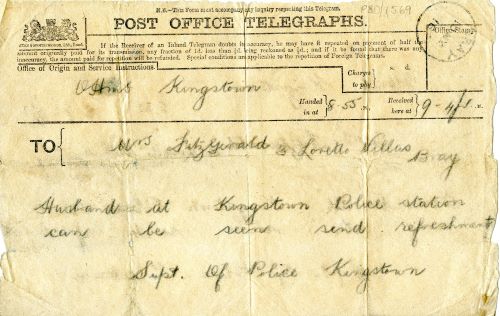
P80/1569
10 May 1916
To Mrs FitzGerald, Loretto Villas Bray
Husband at Kingstown Police station | can be seen send refreshments
Supt. Of Police Kingstown
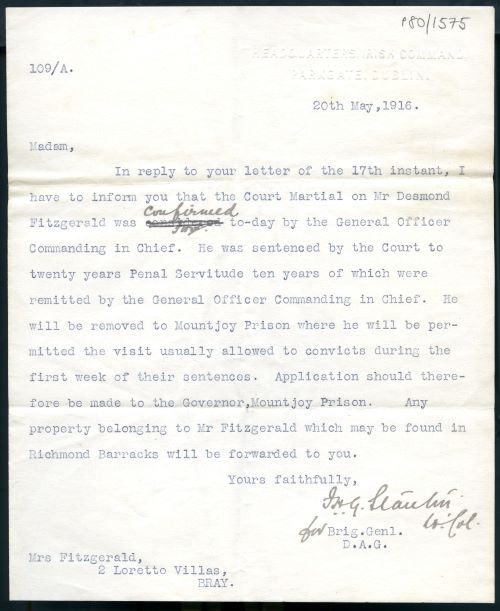
P80/1575
Headquarters, Irish Command,
Parkgate, Dublin
20 May, 1916.
Madam,
In reply to your letter of the 17th instant, I have to inform you that the Court Martial on Mr Desmond Fitzgerald was [confirmed] to-day by the General Officer Commanding in Chief. He was sentenced by the Court to twenty years Penal Servitude ten years of which were remitted by the General Officer Commanding in Chief. He will be removed to Mountjoy Prison where he will be permitted the visit usually allowed to convicts during the first week of their sentences. Application should therefore be made to the Governor, Mountjoy Prison. Any property belonging to Mr Fitzgerald which may be found in Richmond Barracks will be forwarded to you.
Yours faithfully,
[] for Brig[adier] Gen[era]l.
D.A.G.
Mrs Fitzgerald
2 Loretto Villas
Bray
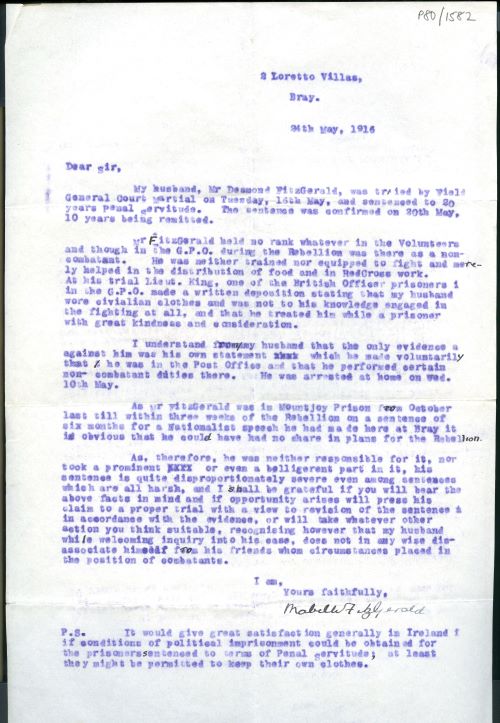
P80/1582
2 Loretto Villas,
24th May, 1916
Dear Sir,
My husband, Mr Desmond FitzGerald, was tried by Field General Court Martial on Tuesday, 16th May, and sentenced to 20 years penal servitude. The sentence was confirmed on 20th May, 10 years being remitted.
Mr Fitzgerald held no rank whatever in the Volunteers and though in the G.P.O. during the Rebellion was there as a non-combatant. He was neither trained nor equipped to fight and merely helped in the distribution of food and in Red Cross work. At his trial Lieut. King, one of the British Officer prisoners in the G.P.O. made a written deposition stating that my husband wore civialian (sic) clothes and was not to his knowledge engaged in the fighting at all, and that he treated him while a prisoner with great kindness and consideration.
I understand from my husband that the only evidence against him was his own statement which he made voluntarily that he was in the Post Office and that he performed certain non-combatant duties there. He was arrested at home on Wed. 10th May.
As Mr FitzGerald was in Mountjoy Prison from October last till within three weeks of the Rebellion on a sentence of six months for a Nationalist speech he had made here at Bray it is obvious that he could have had no share in plans for the Rebellion.
As, therefore, he was neither responsible for it, not took a prominent or even belligerent part in it, his sentence is quite disproportionately severe even among sentences which are all harsh, and I shall be grateful if you will bear the above facts in mind and if opportunity arises will press his claim to a proper trial with a view to revision of the sentence in accordance with the evidence, or will take whatever other action you think suitable, recognising however that my husband while welcoming inquiry into his case, does not in any wise disassociate himself from his friends whom circumstances places in the position of combatants.
I am,
Yours faithfully,
Mabel FitzGerald
P.S. It would give great satisfaction generally in Ireland if conditions of political imprisonment could be obtained for the prisoners sentenced to terms of Penal Servitude; at least they might be permitted to keep their own clothes.
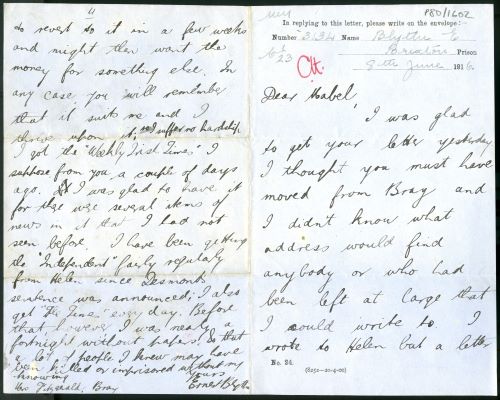
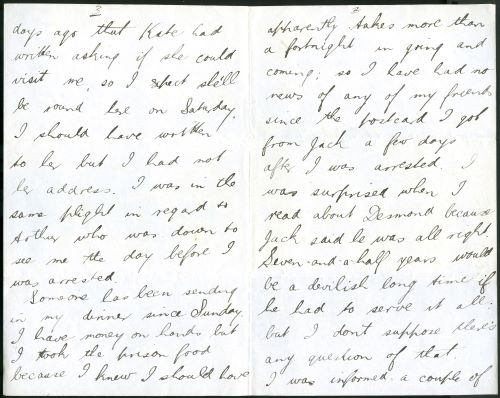
P80/1602
Brixton Prison
8th June 1916
Dear Mabel,
I was glad to get your letter yesterday. I thought you must have moved from Bray and I didn’t know what address would find anybody or who had been left at large that I could write to. I wrote to Helen but a letter apparently takes more than a fortnight in going and coming; so I have had no news of any of my friends since the postcard I got from Jack a few days after I was arrested. I was surprised when I read about Desmond because Jack said he was all right. Seven-and-a-half-years would be a devilish long time if he had to serve it all but I don’t suppose there’s any question of that.
I was informed a couple of days ago that Kate had written asking if she could visit me, so I expect she’ll be round here on Saturday. I should have written to her but I had not her address. I was in the same plight in regard to Arthur who was down to see me the day before I was arrested.
Someone has been sending in my dinner since Sunday. I have money on hand but I took the prison food because I knew I should have to revert to it in a few weeks and might then want the money for something else. In any case you will remember that it suits me and I thrive upon it. I suffer no hardship.
I got the “Weekly Irish Times” I suppose from you a couple of days ago. I was glad to have it for there were several items of news in it that I had not seen before, I have been getting the “Independent” fairly regularly from Helen since Desmond’s sentence was announced; I also get “The Times” every day. Before that, however, I was nearly a fortnight without papers. So that a lot of people I know may have been killed or imprisoned without my knowing.
Yours
Ernest Blythe
Mrs Fitzgerald, Bray
STUDIO PORTRAITS OF PATRICK AND WILLIE PEARSE
Eamon de Valera maintained commemorative files on the 1916 Proclamation of Independence and its signatories. His file on Patrick Pearse includes a studio portrait of Patrick Pearse aged 5. A file of photographs of the Pearse family includes a similar studio portrait of Pearse's brother William aged 3. Both photographs were given to President de Valera in 1967 by Máire and [Madeline] Macken.
UCDA P150/479 and 486. Photographs of Patrick and Willie Pearse. Papers of Éamon de Valera Reproduced by kind permission of UCD-OFM Partnership.
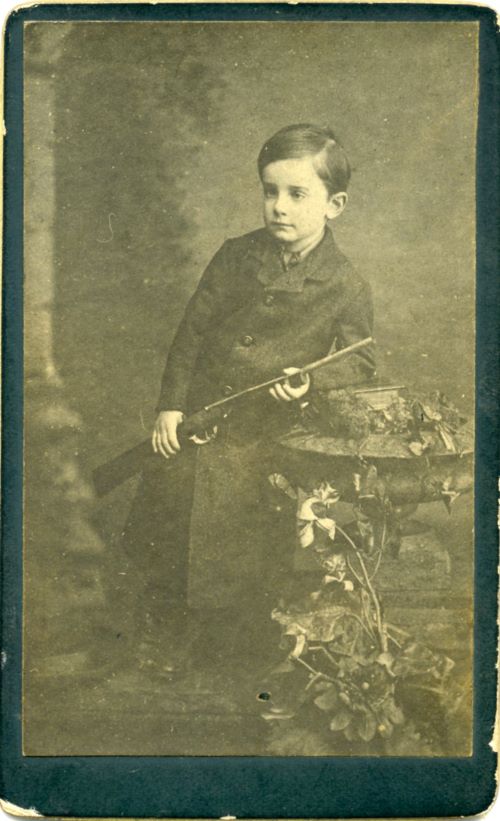
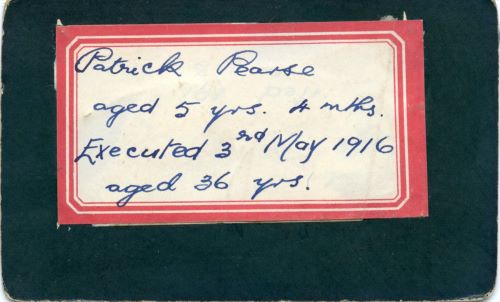
Patrick Pearse aged 5 yrs. 4 mths.
Executed 3rd May 1916 aged 36 yrs.
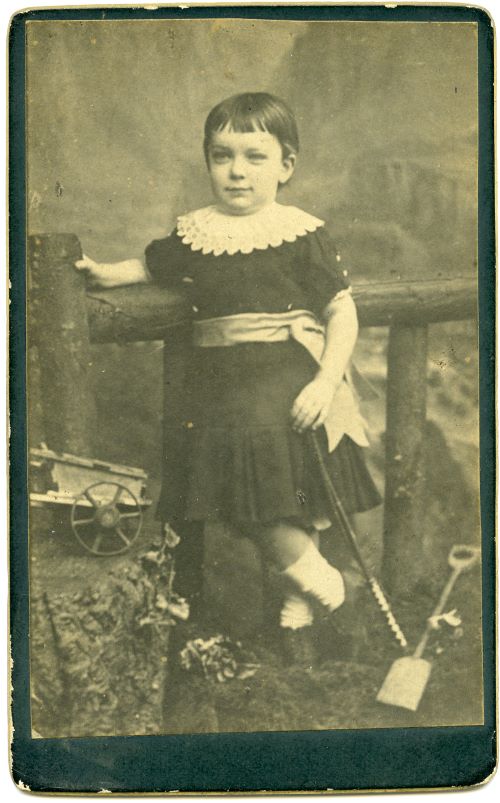
INVITATION TO JIM DOOGE TO CHAIR THE AD HOC COMMITTEE ON INSTITUTIONAL AFFAIRS
Ireland’s Presidency of the European Community coincided with a renewed interest amongst member states for further European integration. At a meeting at Fontainebleau, France in 1984, the decision was made to form the Ad Hoc Committee on Institutional Affairs, to have representatives from all member states convene and look at potential avenues and methods for European integration. Taoiseach, Garret FitzGerald decided to appoint Senator Jim Dooge to this Committee, not only as Ireland’s representative but as chairman. This was met with pressure from several other member states for the appointment of someone with a greater international profile, especially from West Germany, who pushed for the appointment of their former President, Karl Carstens.
Nonetheless Dooge remained in the position, and the Committee met throughout late 1984 and early 1985 before producing a final report, often referred to as the Dooge Report, in March 1985. This report is credited with paving the way for the Single European Act and the Maastricht Treaty, with many of its recommendations adopted and much of the language used in the Treaty being the same. Dooge later commented on the value of an engineering background in politics, based on the engineer's ability 'to assess problems, to focus on detail and work constructively towards a solution, despite setbacks’.
Below is the original signed letter from Taoiseach Garret FitzGerald to Senator Dooge in which he outlines the background to the Ad-Hoc Committee’s formation, explains the terms of reference and invites Dooge to ‘act as my representative and as Chairman of the Committee for the duration of its work’.
UCDA P270/42. Papers of Prof. Jim Dooge.
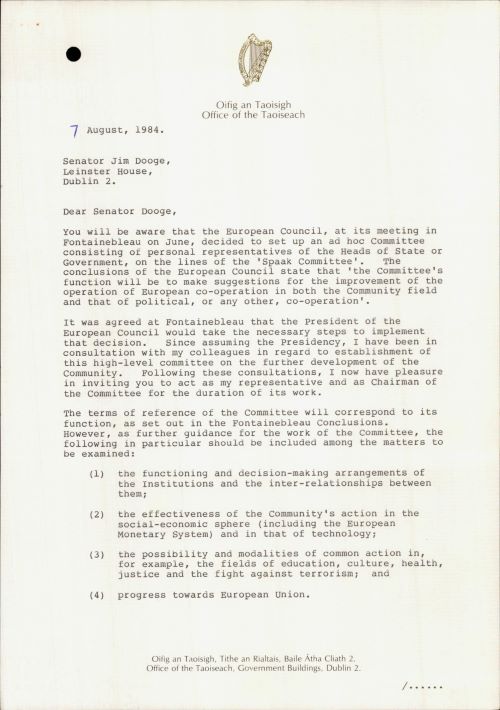
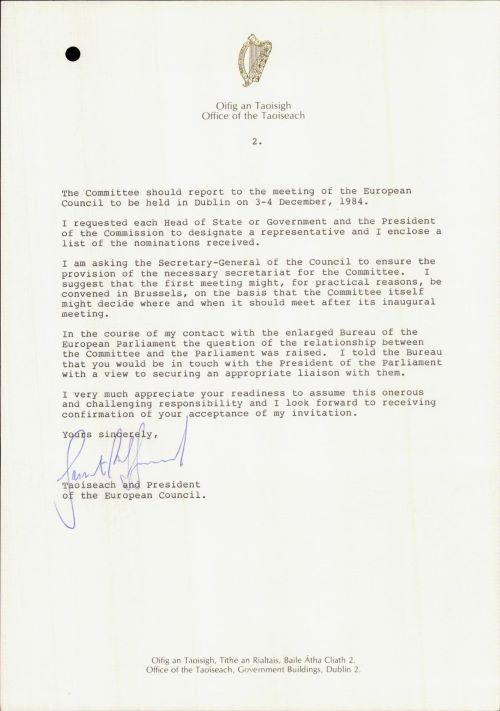
THE ORAM DIARIES
The Oram Diaries collection consists of two sets of diaries dating from 1854 to 1907 and from 1887 to 1919 relating to John and Arthur Oram, father and son farmers and land agents in Burrishoole, county Mayo.
The diaries record the day to day management of the estate including details about herd management, crop sowing and rotation and harvesting as well as the maintenance of the land, roads, access points, dwellings and outbuildings on the estate. There is also reference to the collection of rents from tenants, settling terms with existing and new tenants, drawing up leases, negotiating with the tenants regarding arrears and attending the Assizes.
Many of the entries also detail the management of livestock attending the markets and indicating the prices for the buying and selling of animals.
As land agents and members of the landed middle class John and Arthur Oram served on various committees including acting on behalf of the Board of Conservators seeing to the fishing rights on the estate and other local fisheries, the Vestry committee overseeing the management of the local church and the incumbency of the local school. Arthur Oram’s diaries include references to his work on the Railway Committee, the Drainage Committee and association with the Congested Districts Board and Land Commission.
Although many of the entries are brief, often consisting of a single line, the diaries also refer to national and international events, current affairs including agrarian unrest in Ireland, famine and emigration during the years 1862–64, the 1865 ‘Fenian’ conspiracy, the beginning of the Land League in1879 and the shooting dead of Lord Cavendish, Chief Secretary of Ireland and Thomas Henry Burke, Permanent Undersecretary in the Phoenix Park in 1882. The diaries also refer to notable meteorological and astronomical events including a total eclipse of the sun on 22 December 1870.
The pages of the diary illustrated below are by John Oram who was born in November 1824 at Castle Cary in Somerset. Through an acquaintance with Captain Wyndham John was offered, and accepted, the position of managing Wyndham’s estate at Burrishoole, county Mayo. In 1853 John Oram moved his young family to the west of Ireland where they would live for the next twenty years. He continued to farm and carry out his agency work at Burrishoole and surrounding townlands until September 1881 when he returned to live in Somerset in England. He died in 1907.
The pages from John Oram’s diary for the end of the year 1865 and the beginning of 1866 illustrated below are characteristic of the content of his diaries.
P258/3 The Oram Diaries.
His summary of the year 1865 concludes that it '… was on the whole the finest season for the last ten years on the Western coast the interior suffered from drought and turnips generally from mildew—all livestock did well—oats & potatoes very good and the finest weather for haymaking and harvest—remarkable for the Fenian conspiracy towards the end.'
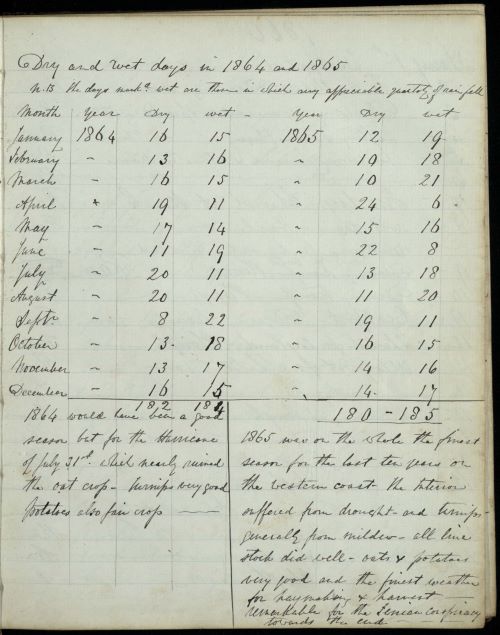
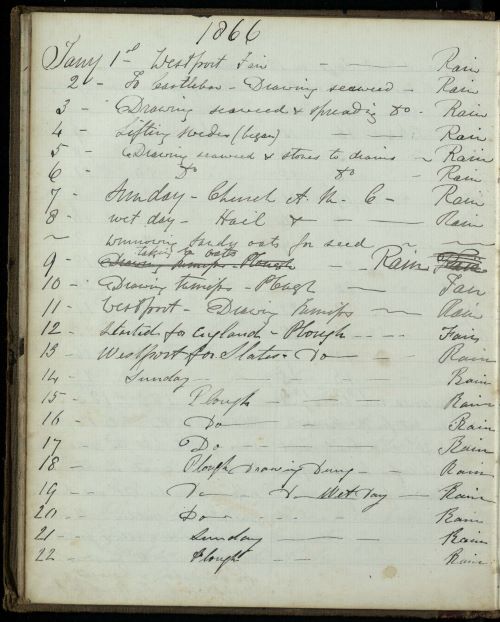
BRONOWSKI CHRISTMAS CARDS
Jack Sweeney was curator of the Harvard Poetry Room and his wife, Máire MacNeill (daughter of Eoin MacNeill) was a folklorist who worked for the Irish Folklore Commission and later taught in the Department of Celtic Studies at Harvard. The collection of their papers deposited in UCD Archives, consists mostly of letters to Jack and Máire from a large number of poets, playwrights, artists and critics, concerning the progress of their own work and its publication. They also discuss developments in contemporary culture and letters, Irish writers and literature, their views of the work of other writers, arrangements for public readings, news of mutual friends, and personal and social affairs and travels.
The letters sometimes include additional items. Examples include photographs by noted photographers Henri Cartier-Bresson (1908–2004) [LA52/48] and Alvin Langdon Coburn (1882–1966) [LA52/56] and prints of wood and copper engravings by artist and poet David Jones (1895–1974) [LA52/173]. As the correspondence is largely conducted amongst friends, the collection also includes cards of various kinds. A selection of Christmas cards from the renowned polymath, Jacob Bronowski (1908–74) and his wife, sculptor and artist, Rita Bronowski née Coblentz (1917–2010) is reproduced below. Each of the five cards consists of original art by Rita and original poems by Jacob (Bruno). In a BBC interview with Michael Parkinson broadcast in 1974, Jacob Bronowski commented that while he no longer wrote poetry for publication, he wrote one poem a year which he printed on Christmas cards for his friends and which commented on the year’s events.
UCDA LA52/41. Bronowski Christmas Cards to John L. (Jack) and Máire MacNeill Sweeney.
©2015 The Rita Bronowski Trust. Used by permission.
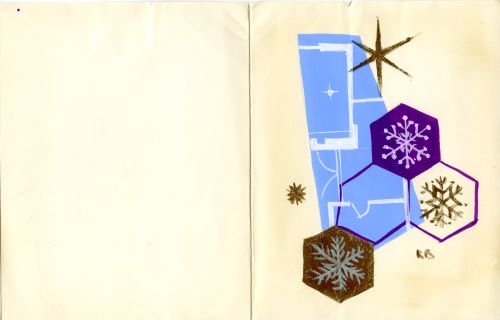
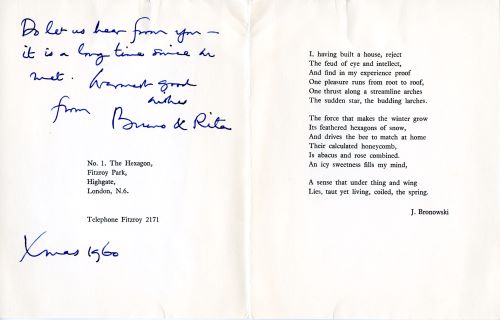
'Do let us hear from you - it is a long time since we met. Warmest good | wishes | from | Bruno & Rita | ... Xmas 1960'
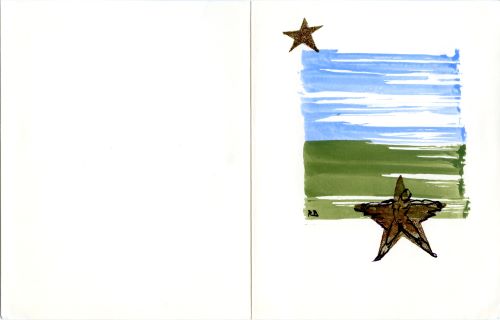
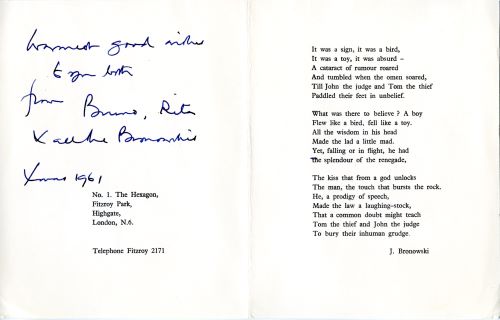
'Warmest good wishes | to you both | from | Bruno, Rita | & all the Bronowskis | Xmas 1961 | ...'
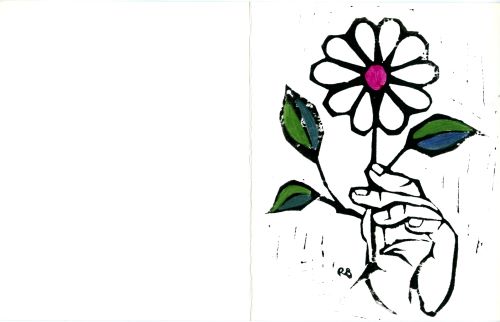
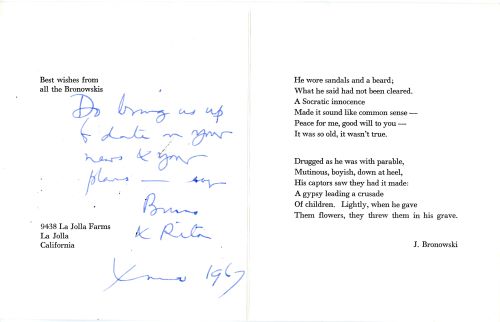
'Best wishes from | all the Bronowskis | Do bring us up | to date on your | news & you | plans — [ ] | Bruno | & Rita | ... | Xmas 1967'
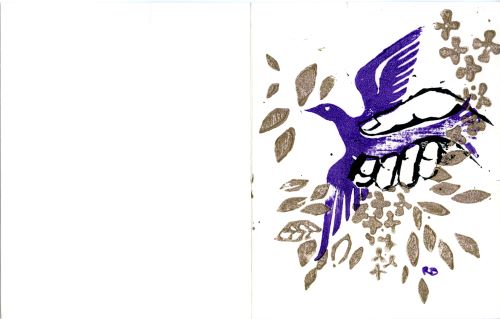
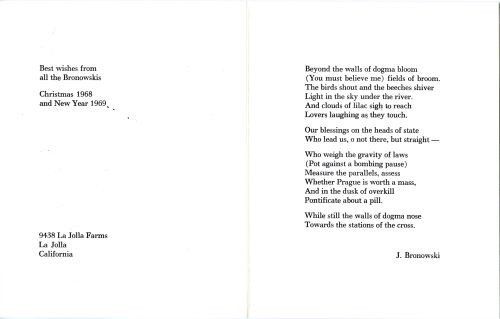
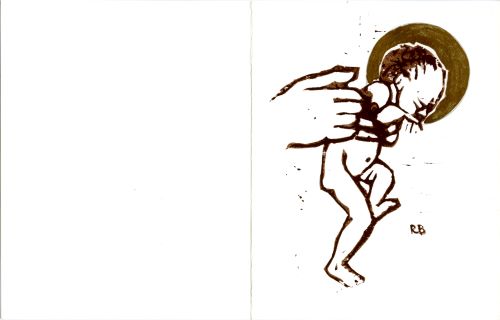
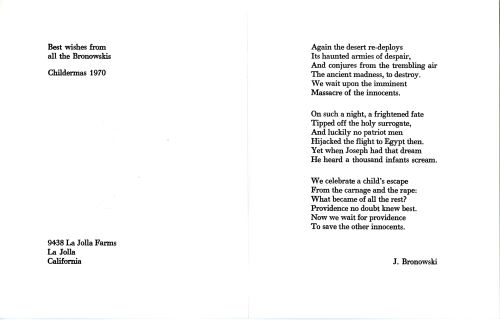
CHILDHOOD IN DERRY: BRIAN FRIEL REMEMBERS
Irish broadcasting began on 1 January 1926 with 2RN in Dublin. Under various pieces of legislation and with the addition of a television service, it eventually became known as Raidió Teilifís Éireann (RTÉ).
The Talks Office was established in 1939, with poet, broadcaster and for a while, Director of the Abbey Theatre, Roibeard Ó Faracháin (1909–84) as its first head. He was responsible for talks both in English and Irish. This office was renamed ‘Talks and Features’ in 1945, and ‘General Features Office’ in 1947. In that year, Ó Faracháin became Controller of Programmes, and the writer and broadcaster, Francis MacManus (1909–65) replaced him as General Features Officer until 1965.
Complemented by the Scriptwriters’ Office—from 1953 under the headship of writer, journalist, and scriptwriter, Philip Rooney (1907–62)—and aided by personnel from the Outside Broadcasting Office who operated the recording van from 1947, the General Features Office produced talks and features. Features were an amorphous genre including short plays, interviews, documentaries, and often included sound material recorded around the country. The General Features Office invited and commissioned a large proportion of their talks from writers external to RTÉ and scripts from over 270 authors are extant.
The RTÉ Radio Talk Scripts in English collection (P260), contains six scripts by the late Irish playwright, Brian Friel (1929–2015) broadcast between 1957 and 1964. In the script reproduced below, Friel reminisces about his family’s move to Derry ‘in the year 1939, when the world that our fathers knew began to disintegrate’ and how he came to love the city.
Three collections of RTÉ Radio Scripts—the Irish-language Talk Scripts (P259), English-language Talk Scripts (P260), and Radio Drama and Variety Scripts (P261)—were transferred from RTÉ custody to UCD Archives in July 2011 as part of the UCD-RTÉ Partnership.
RTÉ Radio Talk Scripts in English, UCD Archives, P260/509 © 2015 by RTÉ. Used by permission.
UCDA P260/509. 'Childhood in Derry' by Brian Friel, 28 January 1964.
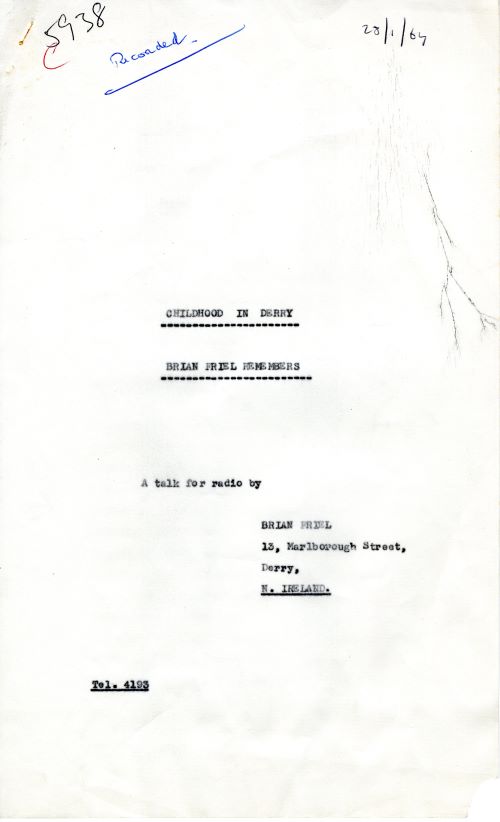
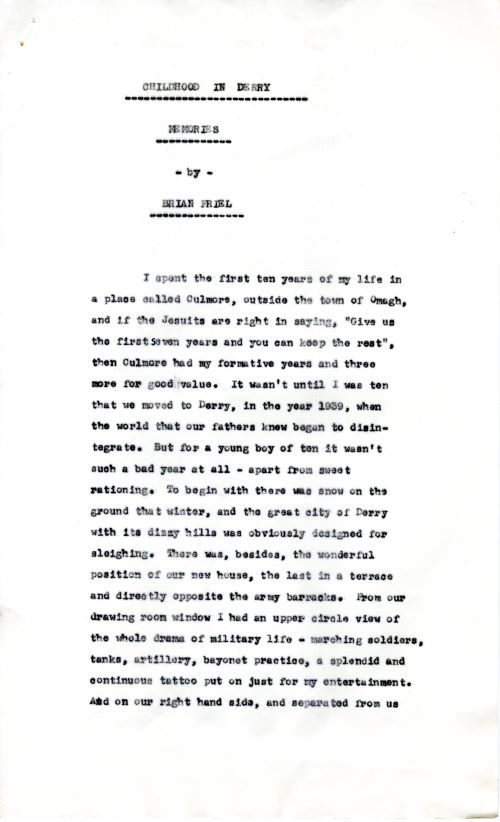
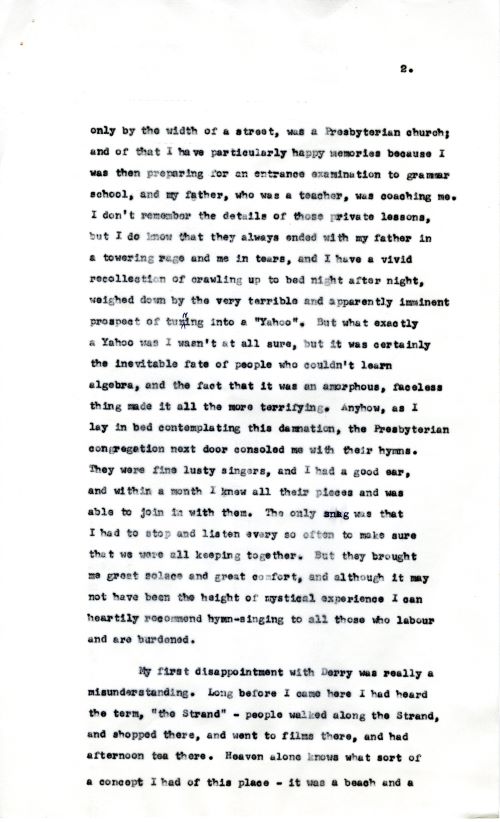
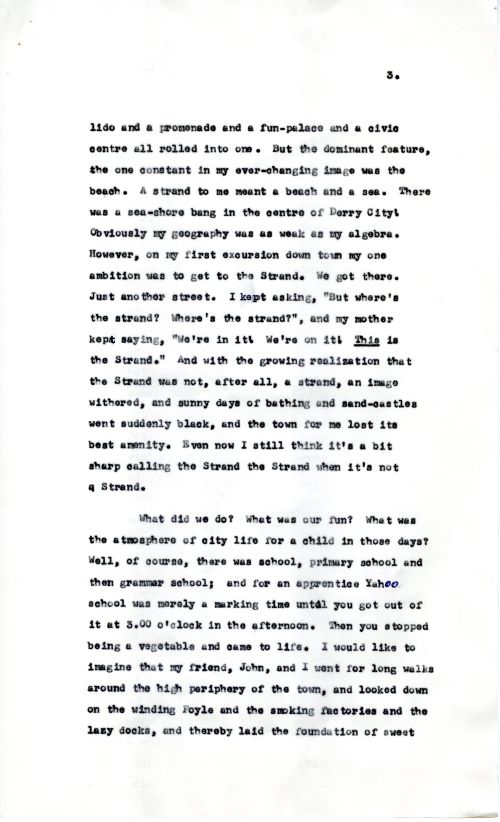
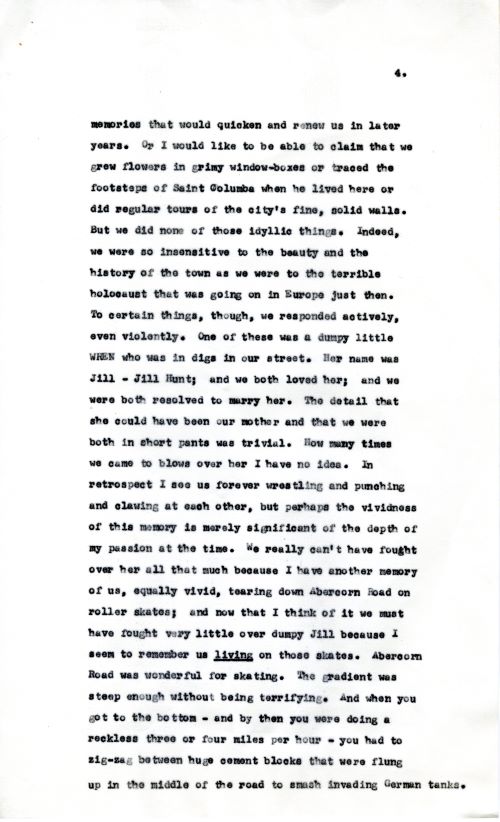
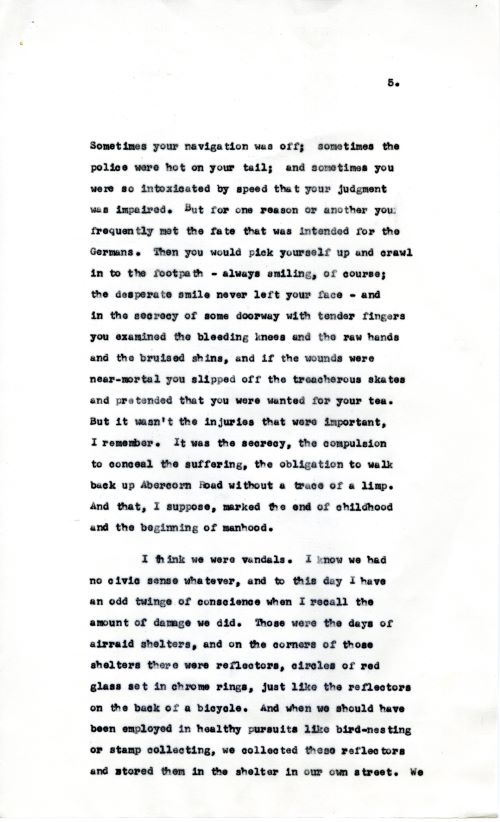
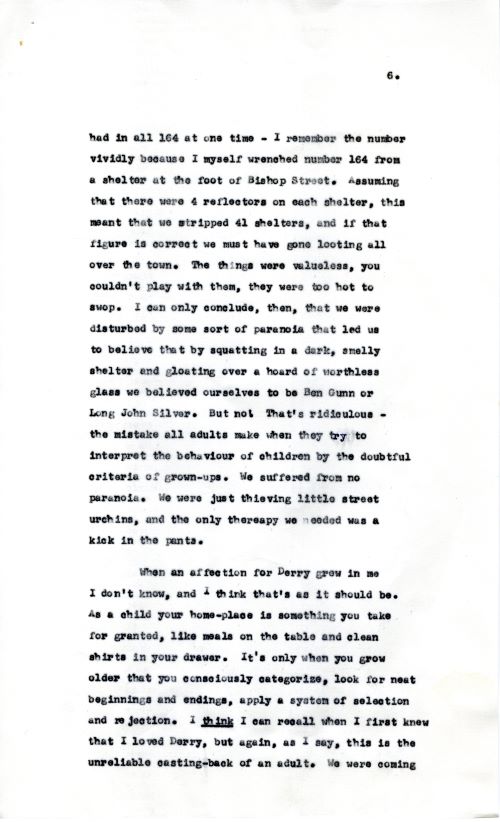
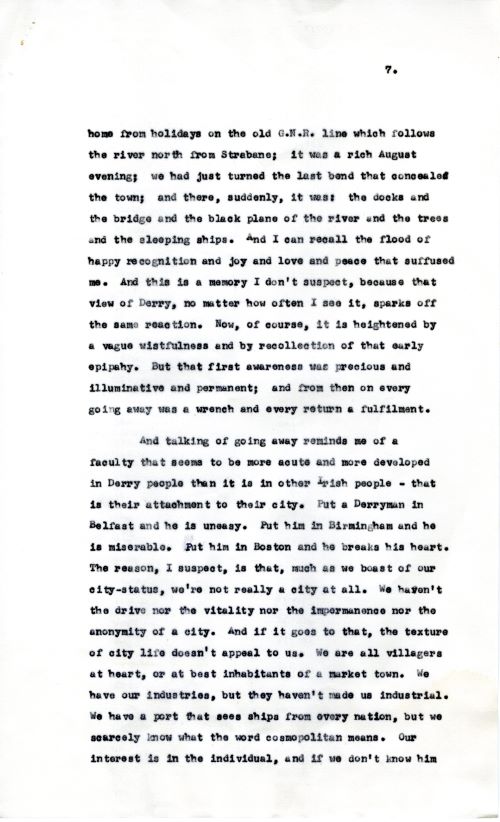
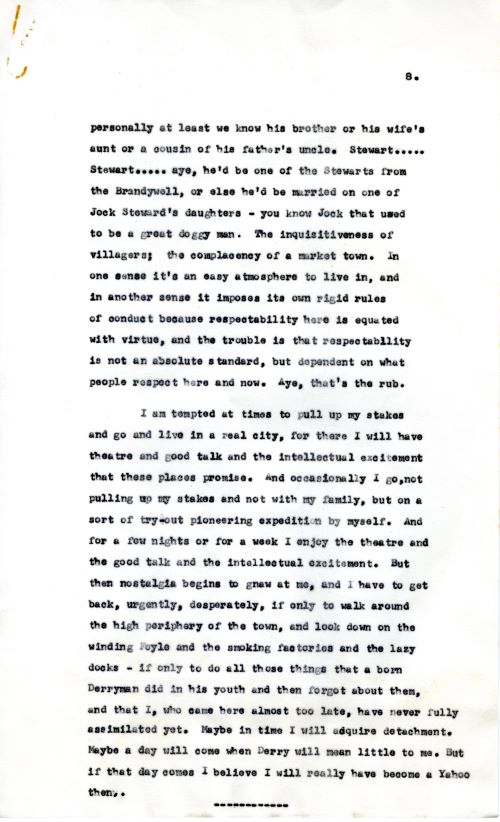
GOVERNING BODY MINUTE BOOKS 1914–16
The UCD Governing Body Minute Books record matters concerning the governance and functioning of the university. They also reflect events happening in the country and the wider world. The minute books for the period 1914–18 record the impact World War I had on the university. The minutes of the meeting of 10 November 1914 note that the President (Denis J. Coffey, 1865–1945) appointed Robert O’Dwyer (1862–1949) to take up the duties of the recently appointed Professor of Music, Heinrich Bewerunge (1862–1923), who was ‘detained in Germany owing to the war.’ [GV2/3] The meeting of 26 October 1915 [GV2/4] records that a resolution be communicated to the University Senate stating ‘that circumstances have rendered the discharge of [Bewerunge’s] duties impossible’ and that his office be declared vacant. The minutes of the meeting of 10 November 1914 note an application for leave of absence by Professor Thomas Kettle (1880–1916) so that he may ‘accept a commission in the Irish Division of the Expeditionary Force’. [GV2/3] The meeting of 26 October 1915 records ‘with great regret the death of Professor T.M. Kettle, Lieutenant in the Dublin Fusiliers, who had been killed at the Battle of Guillemont on Sept 9th.’ More broadly, the Governing Body Minute Books for the period discuss the contributions that the university may make towards the war effort, including the setting up of an officer training corps. The minutes of the meeting of 14 March 1916 [GV2/4] discuss the setting up of a committee to send works of literature to the Irish Troops.
There is only one reference to events in Ireland during WWI. The meeting of 23 May 1916 [GV2/4] refers to ‘Recent Disturbances’ and considers ‘the position of members of the College Staff now under arrest.’
Images from UCD Governing Body Minute Books, GV2/3 and GV2/4, reproduced by kind permission of UCD Governing Authority. Images scanned by UCD Digital Library.
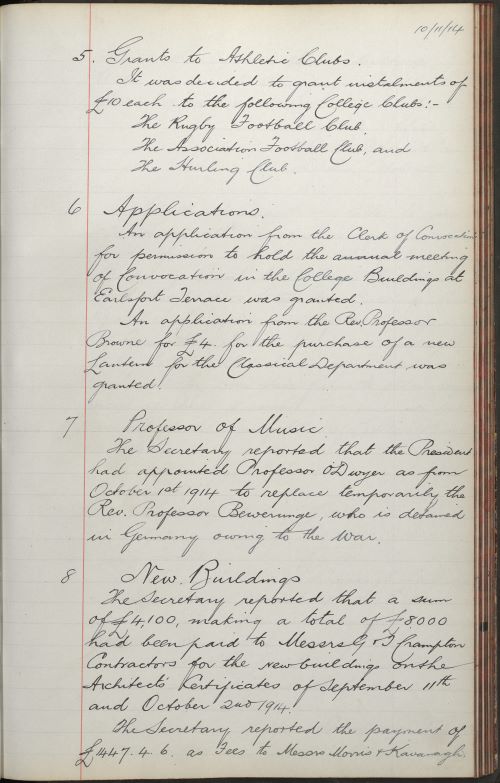
GV2/3 Meeting of 10 November 1914
7. Professor Music
The Secretary reported that the President had appointed Professor O’Dwyer as from October 1st 1914 to replace temporarily the Rev. Professor Bewerunge, who is detained in Germany owing to the War.
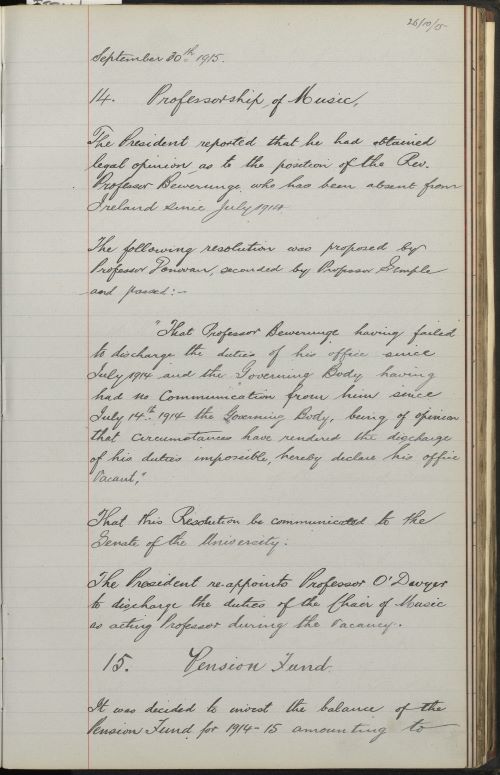
GV2/4 Meeting of 26 October 1915
14. Professorship of Music
The president reported that he had obtained legal opinion as to the position of the Rev. Professor Bewerunge who has been absent from Ireland since July 1914.
The following resolution was proposed by Professor Donovan, seconded by Professor Semple and passed:-
“That Professor Bewerunge having failed to discharge the duties of his offices since July 1914 and the Governing Body having had no communication from him since July 14th, 1914 the Governing Body, being of opinion that circumstances have rendered the discharge of his duties impossible, hereby declare his office vacant.”
That this Resolution be communicated to the Senate of the University.
The President re-appoints Professor O’Dwyer to discharge the duties of the Chair of Music as acting Professor during the vacancy.
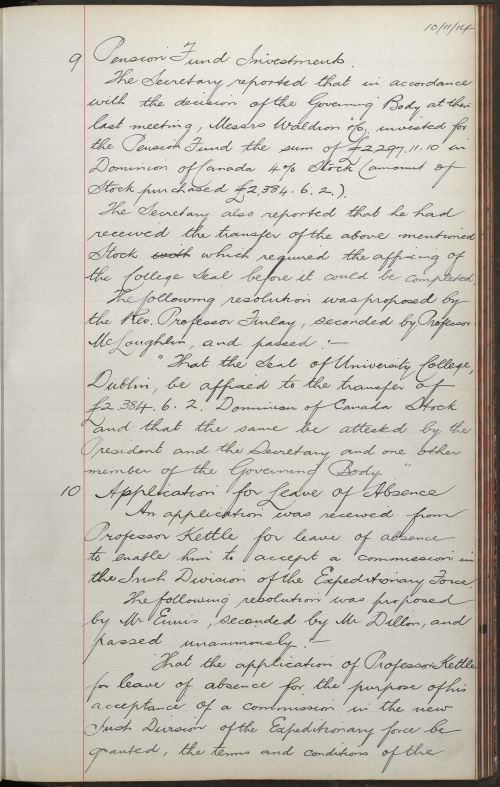
GV2/3 Meeting of 10 November 1914
10. Application for Leave of Absence
An application was received from Professor Kettle for leave of absence to enable him to accept a commission in the Irish Division of the Expeditionary Force.
The following resolution was proposed by Mr Ennis, seconded by Mr Dillon, and passed unanimously:-
“That the application of Professor Kettle for leave of absence for the purpose of his acceptance of a commission in the new Irish Division of the Expeditionary force be granted, the terms and conditions of the financial arrangements as to the appointment of a temporary substitute to be settled by the President, after due consideration of the terms granted in similar cased by other Universitites in the United Kingdom.”
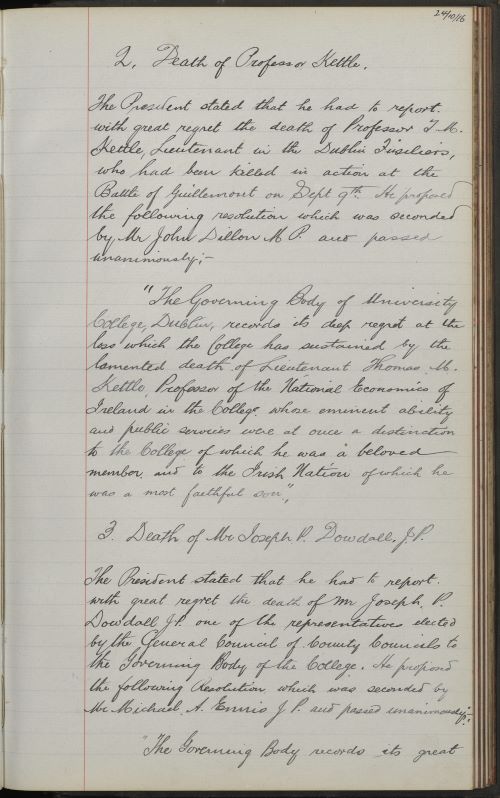
GV2/4 Meeting of 24 October 1915
2. Death of Professor Kettle.
The President stated that he had to report with great regret the death of Professor T.M. Kettle, Lieutenant in the Dublin Fusiliers, who had been killed in action at the Battle of Guillemont on Sept 9th. He proposed the following resolution which was seconded by John Dillon MP and passed unanimously:-
“The Governing Body of University College, Dublin, records its deep regret at the loss which the College has sustained by the lamented death of Lieutenant Thomas M. Kettle, Professor of the National Economics of Ireland in the College, whose eminent ability and public service were at once a distinction to the College of which he was a beloved member and to the Irish Nation of which he was a most faithful son.”
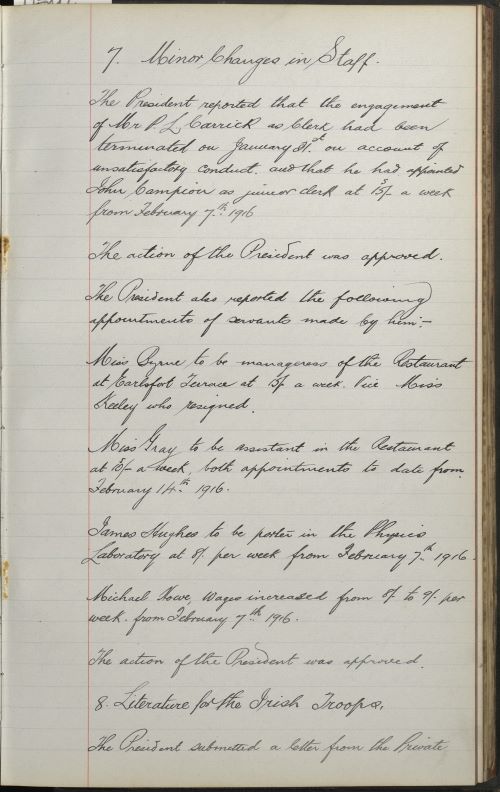
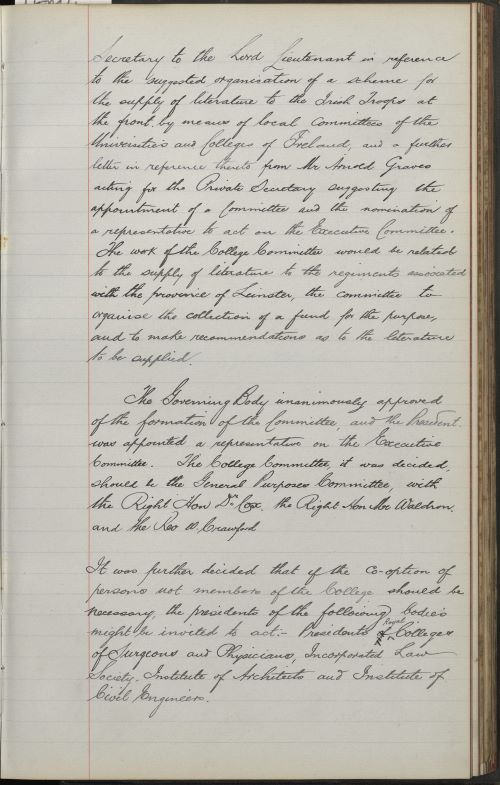
GV2/4 Meeting of 14 March 1916
8. Literature for the Irish Troops.
The president submitted a letter from the Private Secretary to the Lord Lieutenant in reference to the suggested organisation of a scheme for the supply of literature to the Irish Troops at the front by means of local committees of the Universities and Colleges of Ireland, and a further letter in reference thereto from Mr Arnold Graves acting for the Private Secretary suggesting the appointment of a Committee and the nomination of a representative to act on the Executive Committee. The work of the College Committee would be related to the supply of literature to the regiments associated with the province of Leinster, the committee to organise the collection of a fund for the purpose, and to make recommendations as to the literature to be supplied.
The Governing Body unanimously approved of the formation of the Committee, and the President was appointed representative on the Executive Committee. The college Committee, it was decided, should be the General Purposes Committee, with the Right Hon Dr Cox, the Right Hon Mr Waldron and the Rev W. Crawford.
It was further decided that if the co-option of persons not members of the College should be necessary, the presidents of the following bodies might be invited to act:- Presidents Royal College of Surgeons and Physicians, Incorporated Law Society, Institute of Architects and Institute of Civil Engineer[s].
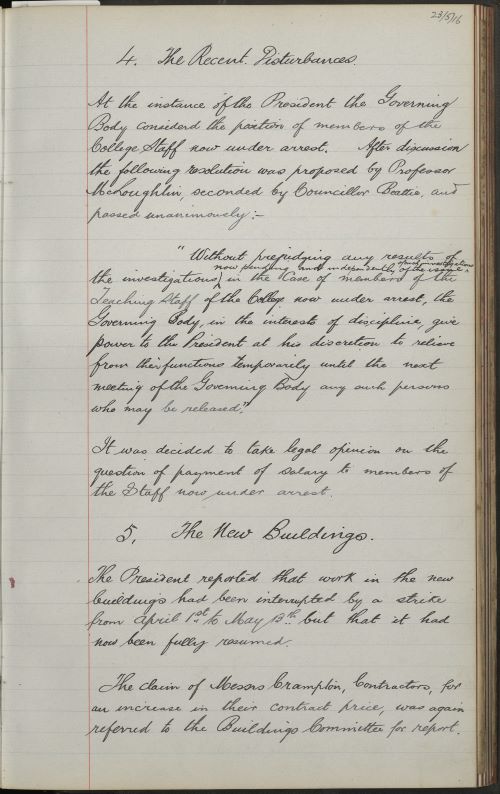
GV2/4 Meeting of 23 May 1916
4. The Recent Disturbances.
At the instance of the President the Governing Body considered the position of members of the College Staff now under arrest. After discussion the following resolution was proposed by Professor McLoughlin, seconded by Councillor Beattie, and passed unanimously:-
“Without prejudging any results of the investigations now pending and independently of the issue of such investigations in the Case of members of the Teaching Staff of the College now under arrest, the Governing Body, in the interests of discipline, give power to the President at his discretion to relieve from their functions temporarily until the next meeting of the Governing Body any such persons who may be released.”
It was decided to take legal opinion on the question of payment of salary to members of the Staff now under arrest.
LETTER FROM PAMELA TRAVERS TO VERA AND JOSEPH MAUNSELL HONE (1942)
By 1940, Joseph Maunsell Hone, W.B. Yeats’ first biographer, and his wife Vera were raising several of their grandchildren in Dublin. In financial difficulties, the Hones offered family friend Pamela Travers the opportunity to care for the youngest boys, twins Camillus and Anthony.
Travers, the Australian-born author of the Mary Poppins series of books, decided on arrival at the Hones’ home to take just one of the boys, Camillus, whom she renamed Camillus Travers Hone. Camillus was unaware of the existence of his siblings or his true parentage until his twin, Anthony, sought him out at Travers’ London home when the boys were seventeen.
In this letter, written when Camillus was still a toddler, Travers urges Joseph and Vera Hone to help facilitate her full adoption of the boy. She had brought Camillus to New York, where the two stayed for the duration of the war.
UCDA P229/163. Letter from Pamela Travers to Vera and Joseph Maunsell Hone (1942).
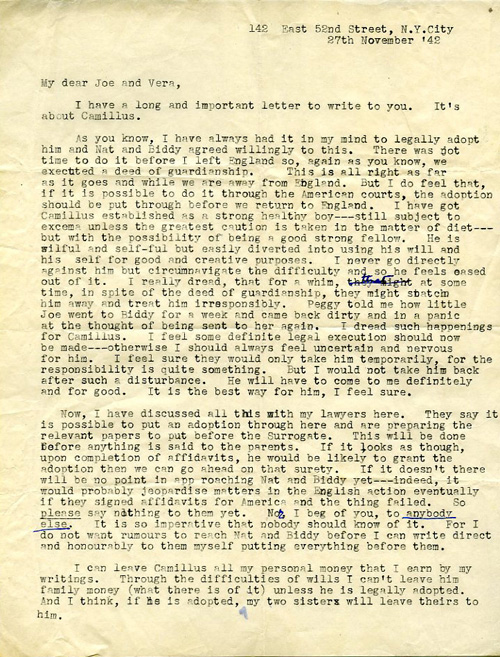
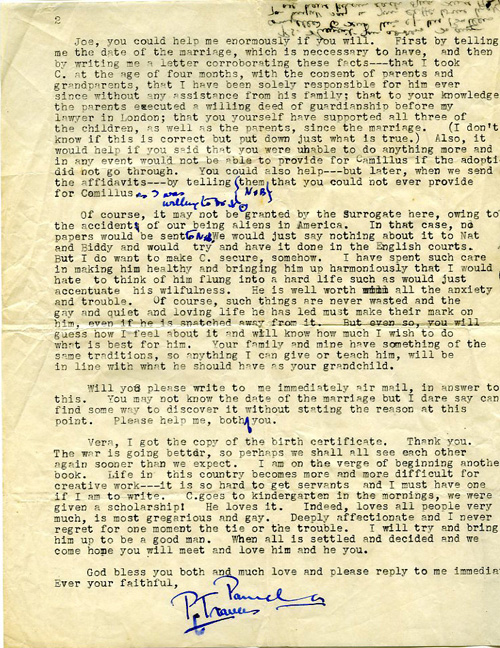
NOTE FROM PATRICK HILLERY TO EDWIN FITZGIBBON CONCERNING CEARBHALL Ó DÁLAIGH (1974) AND REPLIES
The sudden death of Ireland’s President Erskine H. Childers on 17 November 1974 gave rise to phone calls a number of days later by the Irish Government to Patrick Hillery in Brussels in an attempt to reach Cearbhall Ó Dálaigh, Ireland’s Judge on the European Court of Justice.
Hillery had already strongly resisted the suggestion that he would be the agreed candidate for the presidency.
On 27 November Hillery hastily scribbles a note to his chef de cabinet, Edwin FitzGibbon asking him to get a number for Ó Dalaigh but that this should not be let known.
FitzGibbon was not available and other members of Hillery’s staff had left for the evening leaving Neville Keery, deputy chef de cabinet making unsuccessful attempts to get contact details for the Judge. In a second, follow up note Keery writes in his reply to Hillery ‘Keep saying No!’ reflecting the continuing pressure being put on Hillery to agree to allow his name to be put forward as a potential candidate.
Ó Dalaigh was inaugurated as President on 19 December 1974. His term of office came to an end when he resigned on 22 October 1976. He was succeeded by Patrick Hillery. A full transcription ca be read below.
UCDA P205/73. Note from Patrick Hillery to Edwin FitzGibbon concerning Cearbhall Ó Dálaigh (1974) and replies.
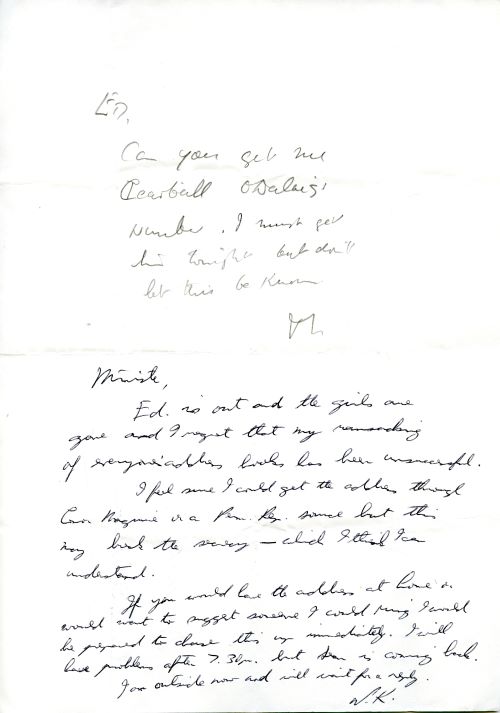
‘Ed
Can you get me Cearbhall O Dalaigh’s number. I must get him tonight but don’t let this be known. PH
Minister,
Ed is out and the girls are gone and I regret that my ransacking of everyone’s address books has been unsuccessful.
I feel sure I could get the address through Conor Maguire or a Perm. Rep. source but this may lack the secrecy—which I think I can understand.
If you would have the address at home or would want to suggest someone I could ring I would be prepared to chase this up immediately. I will have problems after 7.30pm but Seán is comingback. I am outside now and will wait for a reply. N.K.’
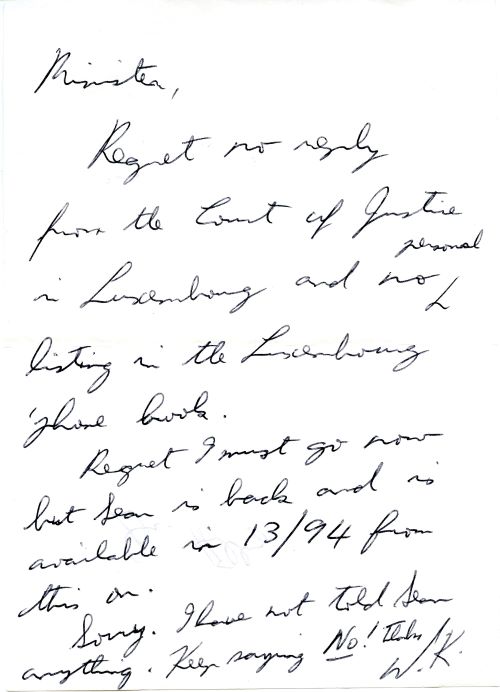
‘Minister,
Regret no reply from the Court of Justice in Luxembourg and no personal listing in the Luxembourg phone book. Regret I must go now but Seán (Ó hEigeartaigh) is back and is available in 13/94 from this on. Sorry. I have not told Seán anything. Keep saying No! Thanks N.K.'
LETTER FROM EZRA POUND TO DESMOND FITZGERALD
The papers of Desmond and Mabel FitzGerald contain not only much of significance documenting Desmond’s ministerial career and the emergence and establishment of an independent Irish state, but a great deal relating to their private lives and their wide circle of friends. This circle included many writers, artists and intellectuals such as W.B. and George Yeats, George Bernard Shaw, Paul Henry, Oliver St John Gogarty, and Ezra Pound.
FitzGerald had known Pound from his time in London before 1911 and had introduced him to the group of Imagist poets which included F.S. Flint, T.E. Hulme, Edward Storer and Richard Aldington.
In this letter to FitzGerald, then Minister for External Affairs in the Free State government, written from Rapallo, Italy on 5 November 1926, Pound solicits a contribution for the new review he is setting up. The review, Exile, was published during 1927-8. Pound had moved from Paris to Rapallo in 1924 and was to remain there for the following twenty years.
The letter is characterised by Pound’s eccentric onomatopoeic or emphatic spelling such as ‘drrroppp’ and 'absolootly' and his at times cryptic references such as the paragraph concerning the League of Nations - the ‘nice pulpit in Geneva’ - or ‘That little brochure you left me’; and his mocking and jocular reference to FitzGerald’s ministerial status. His treatment of the stellar figures of Anglo-Irish writing is uncompromising. ‘Shaw is spoof. Joyce’s new stuff is too highly specialised’.
Desmond was forced to decline the invitation due to the weight of other commitments; though a suspicion that this excuse was both convenient and diplomatic would not be unwarranted.
UCDA P80/1207. Papers of Desmond and Mabel FitzGerald.
© 2015 by Mary de Rachewiltz and the Estate of Omar S. Pound. Used by permission.
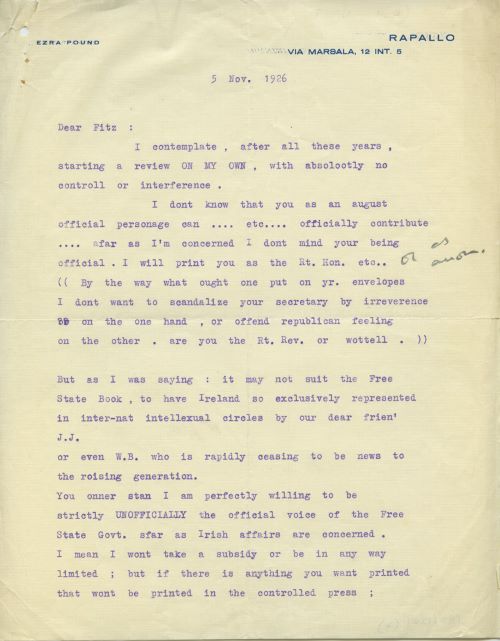
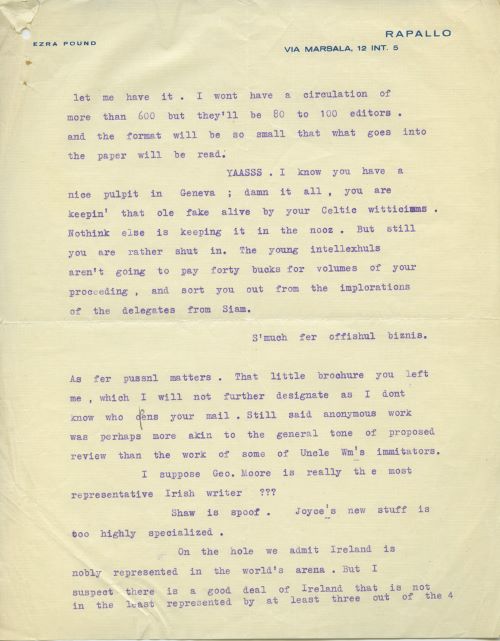
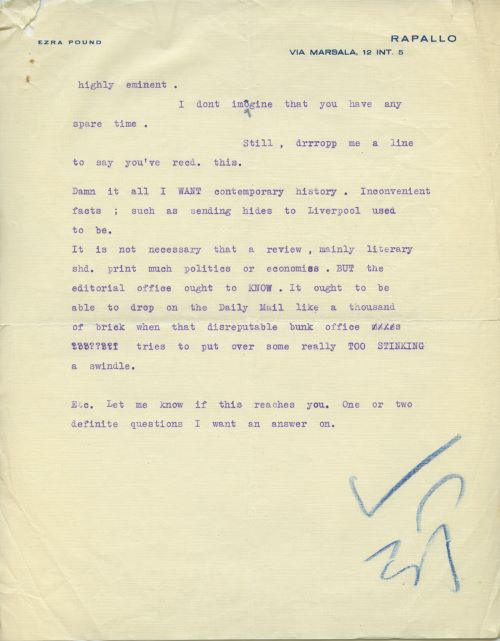
1916 ‘Half-Proclamation’
The literary composition of the Proclamation of the Republic is generally attributed to Pádraic Pearse with amendments by James Connolly and Thomas MacDonagh. It was composed and printed in Liberty Hall, the headquarters of the Irish Transport and General Workers Union and the location of the Military Council’s meetings to plan the Rising. It was printed on an antiquated Wharfedale Double Crown printing press by printer Christopher Brady and compositors Liam O’Brien and Michael Molloy.
They received the text of the document on Sunday 23 April and began to set up the type. They quickly realised they did not have sufficient type to print the whole Proclamation in a single pass and would have to print the document in two halves. Having printed c.1,000 copies of the top half, they re-set the type to print the second part on the bottom half of the same sheets. The printing was completed around 1.00 am on Monday 24 April.
When British troops occupied the building in late April, they found the press still set up to print the bottom half of the Proclamation. They proceeded to print a number, presumably as souvenirs. This ‘Half-Proclamation’ is one of those. It was displayed in the library of Scoil Mhuire, Gorey, County Wexford, for many years where it was assumed to be a copy. In 2006 it was authenticated as an original Half-Proclamation and has since been fully restored.
UCDA P225. Courtesy of the Board of Management, Scoil Mhuire, Gorey.
